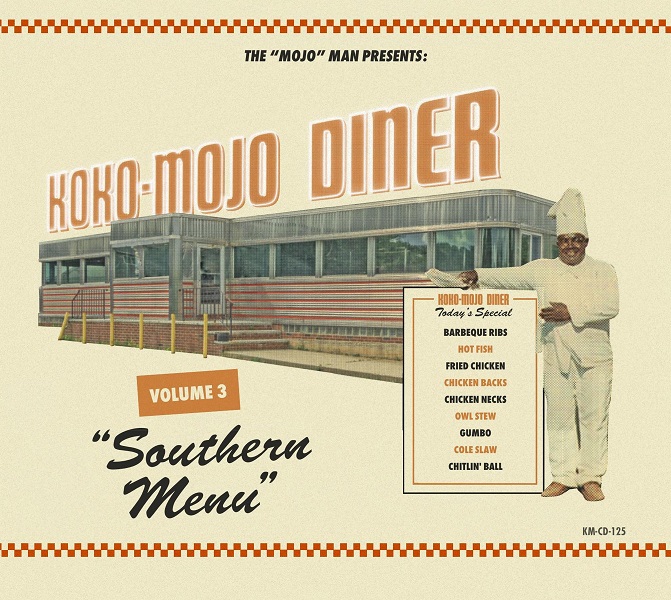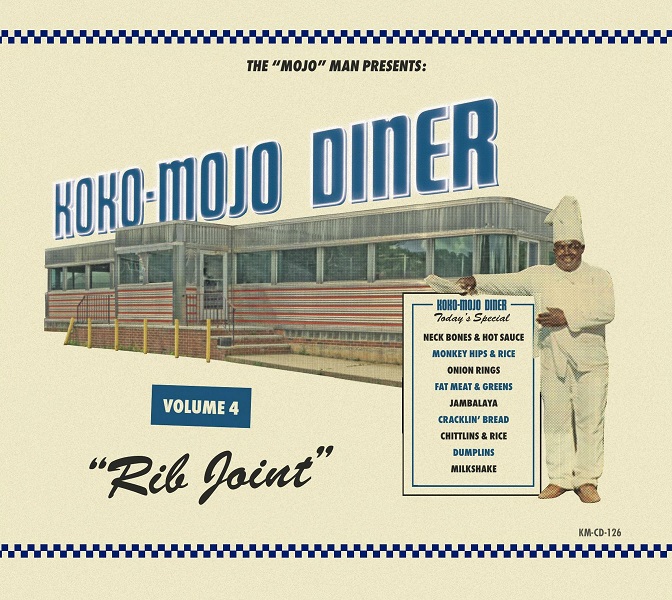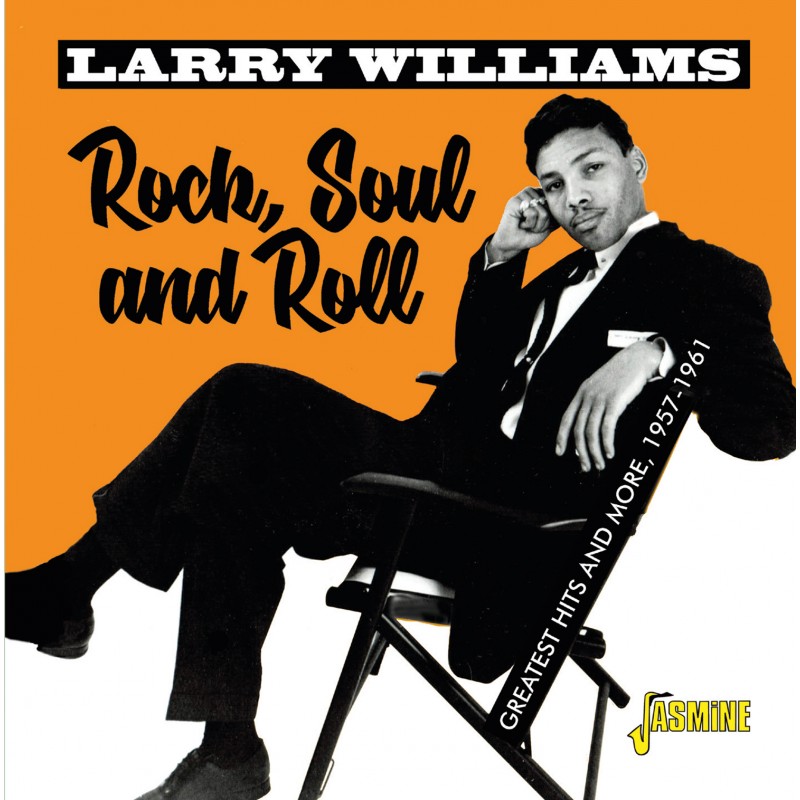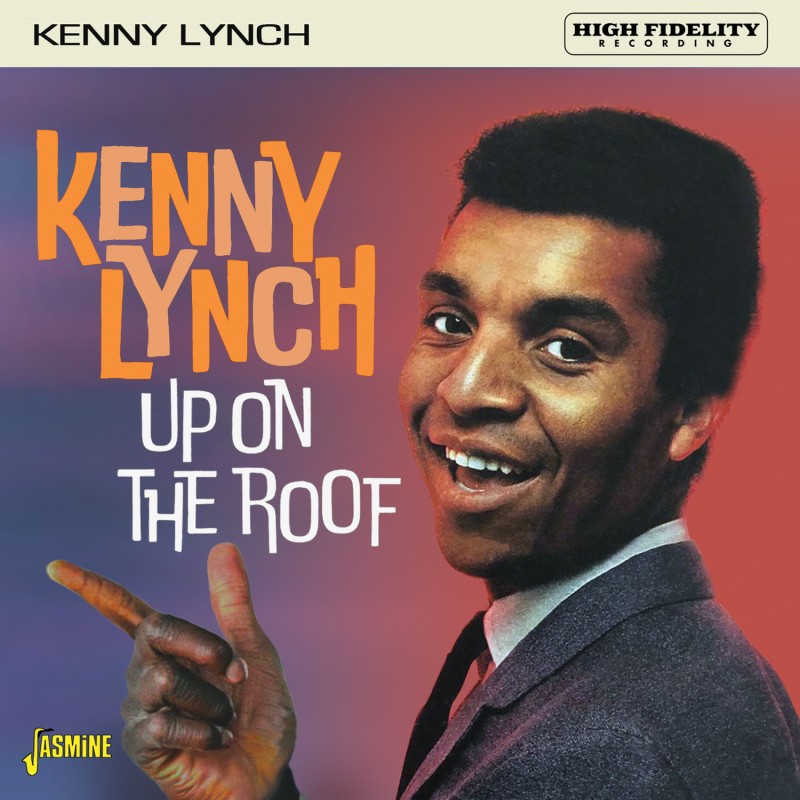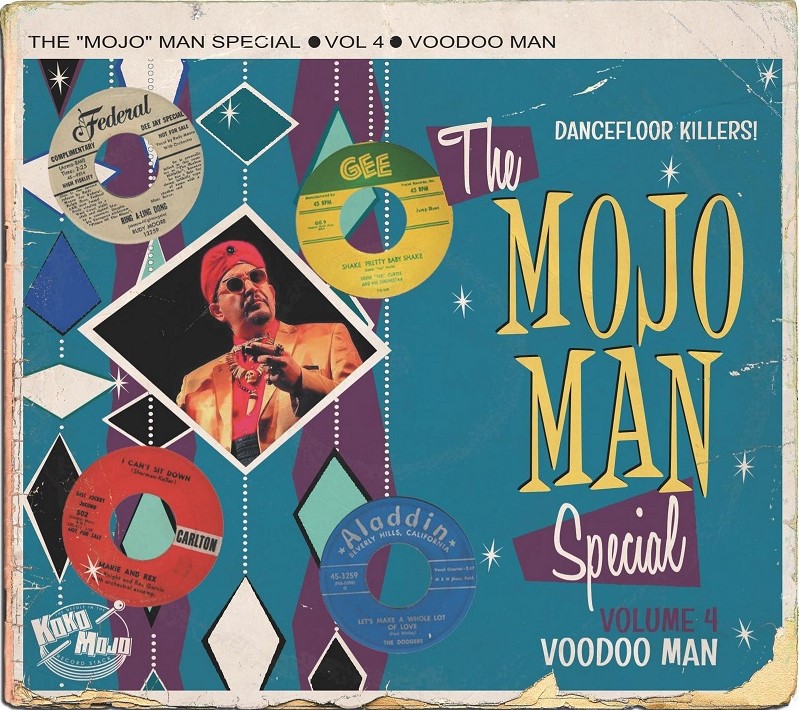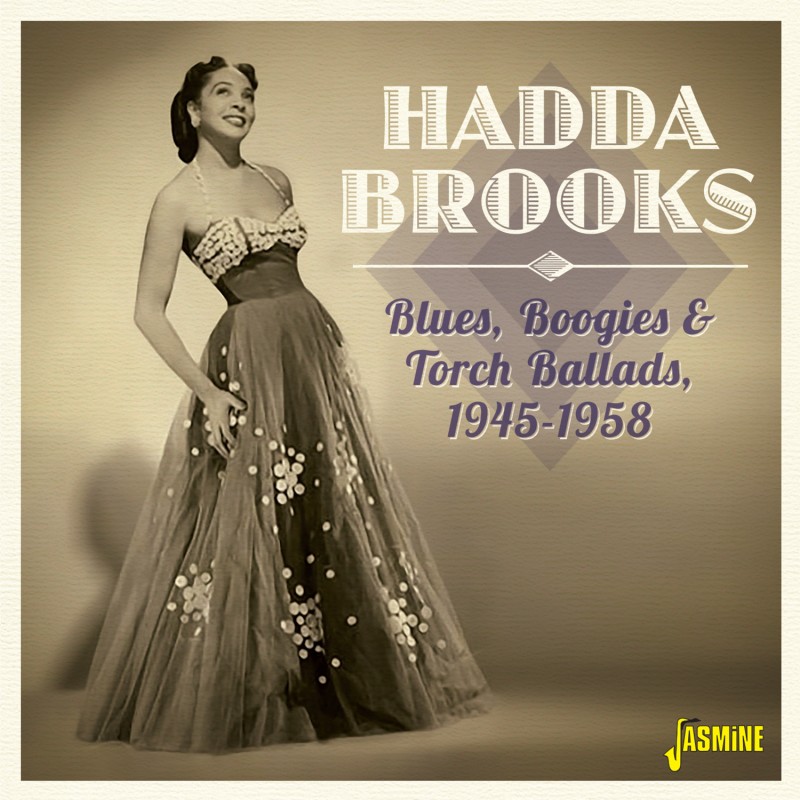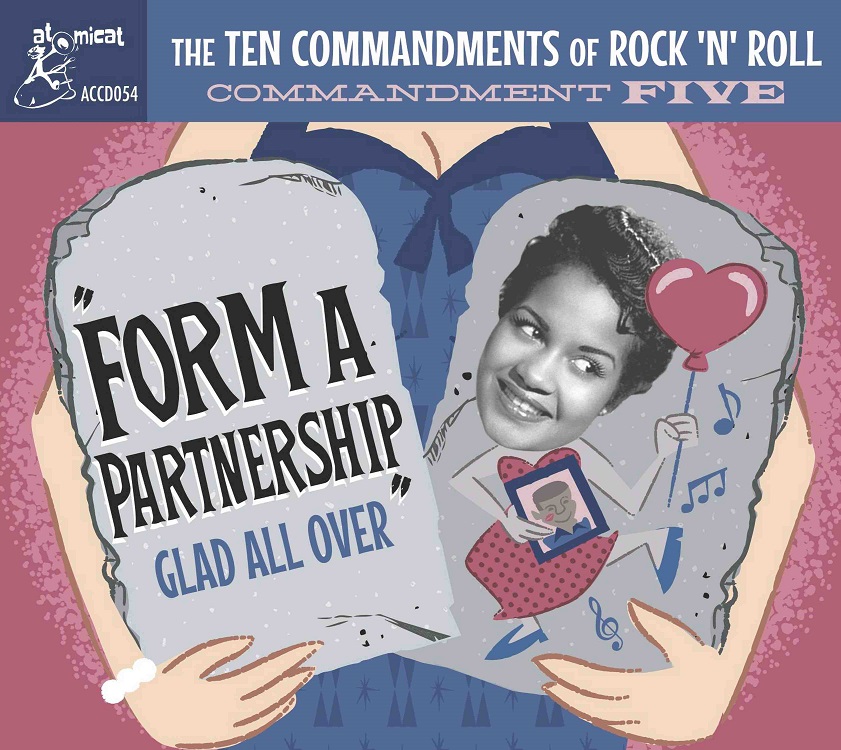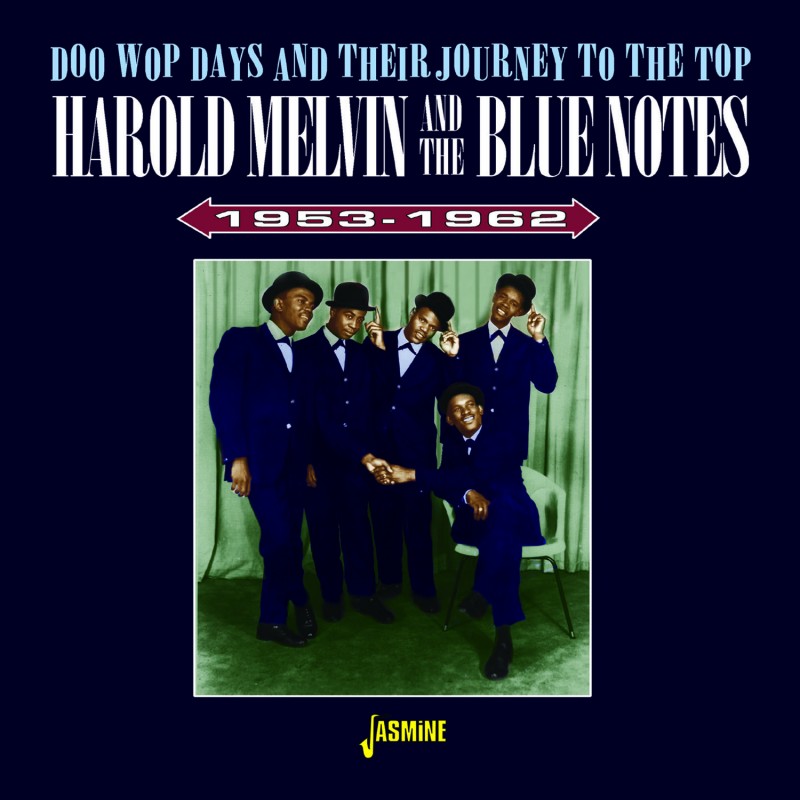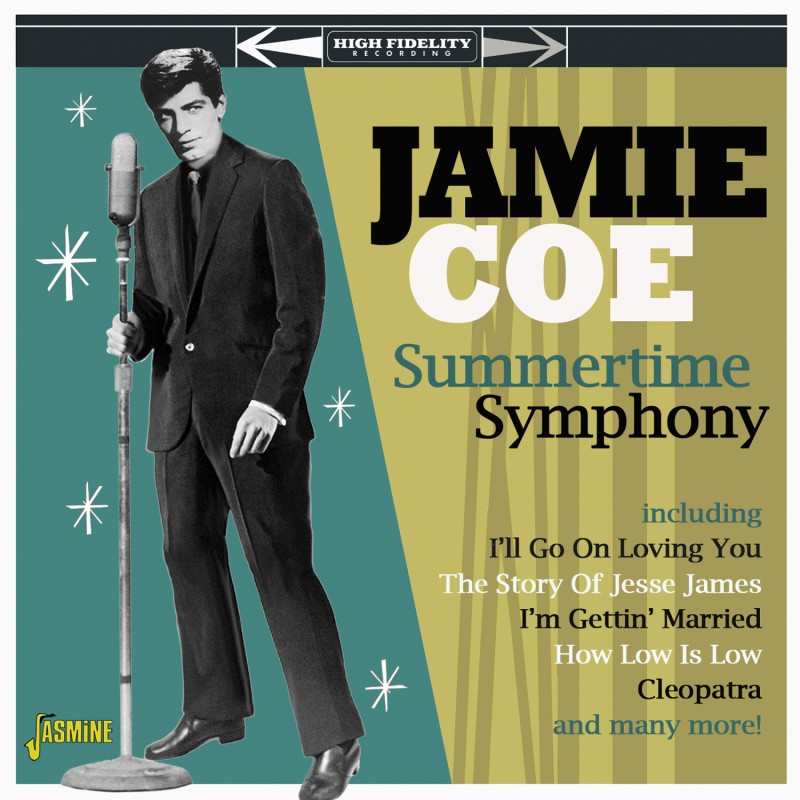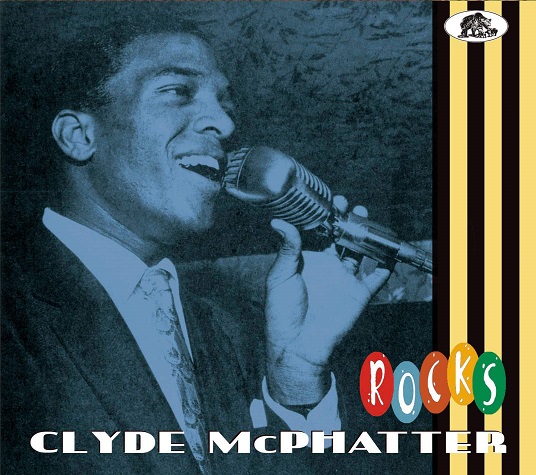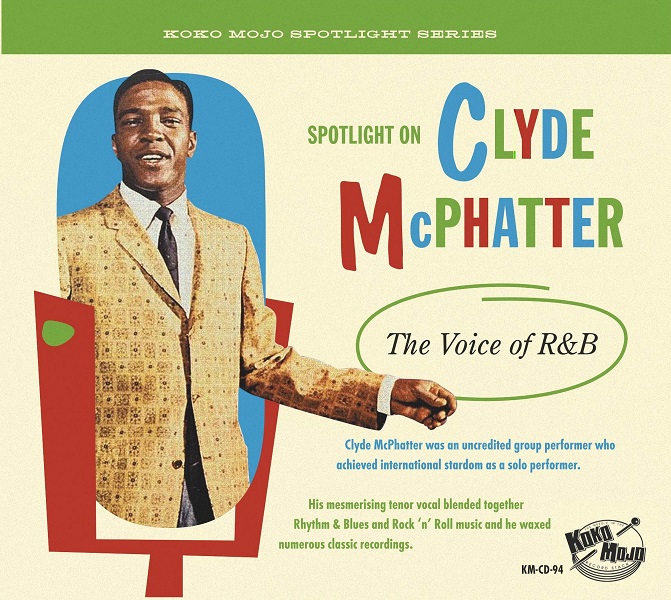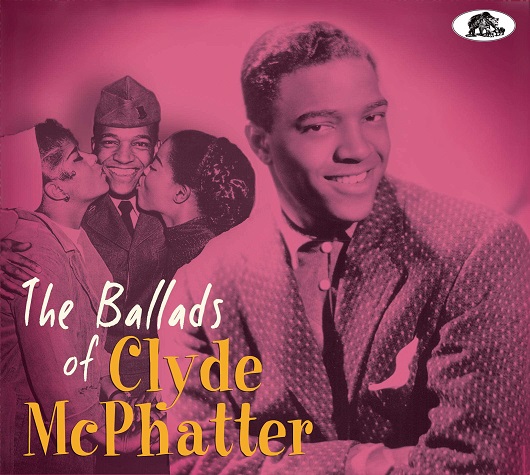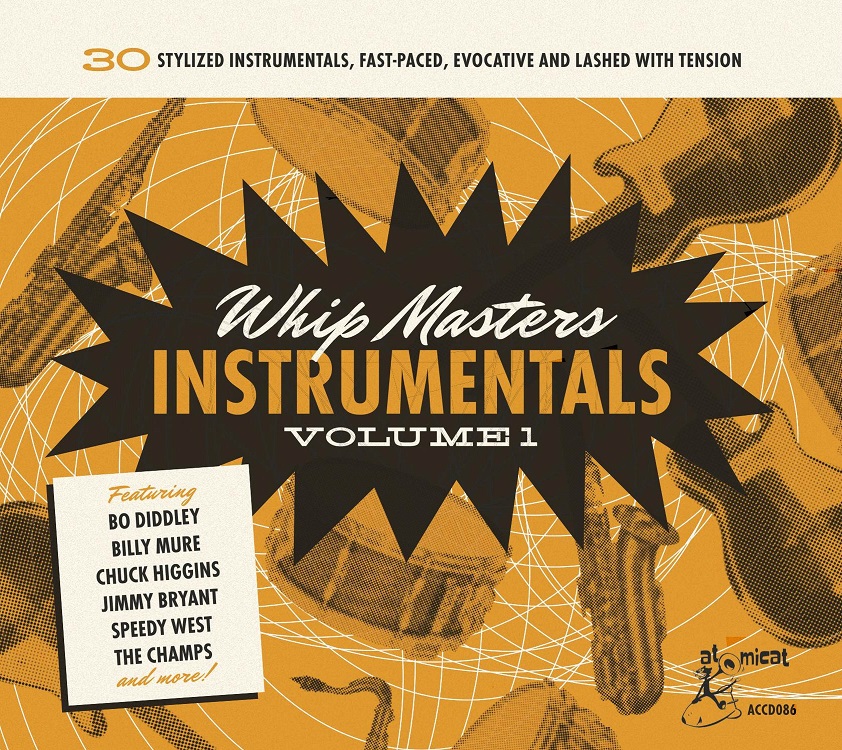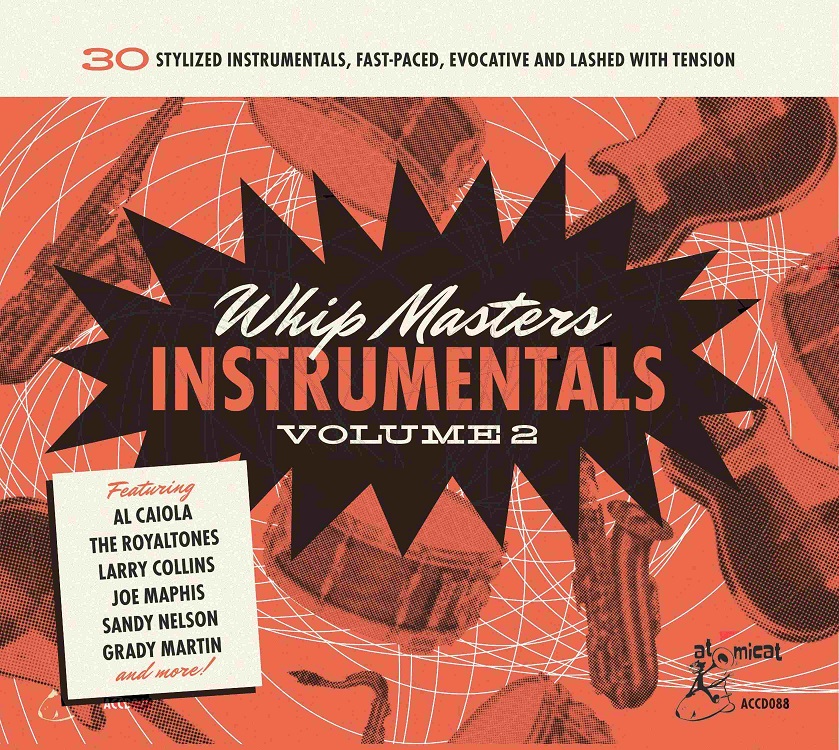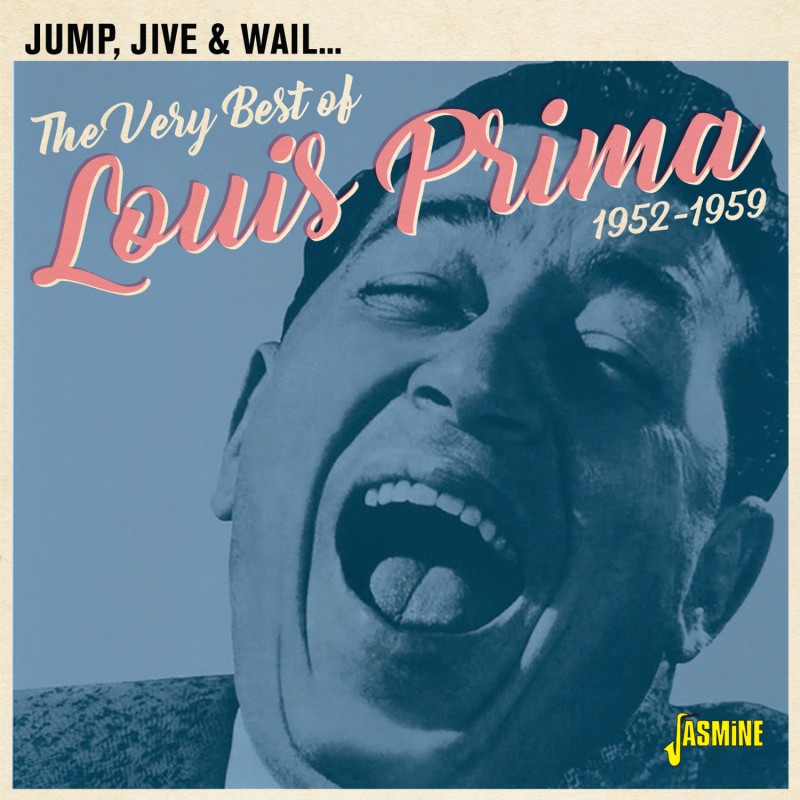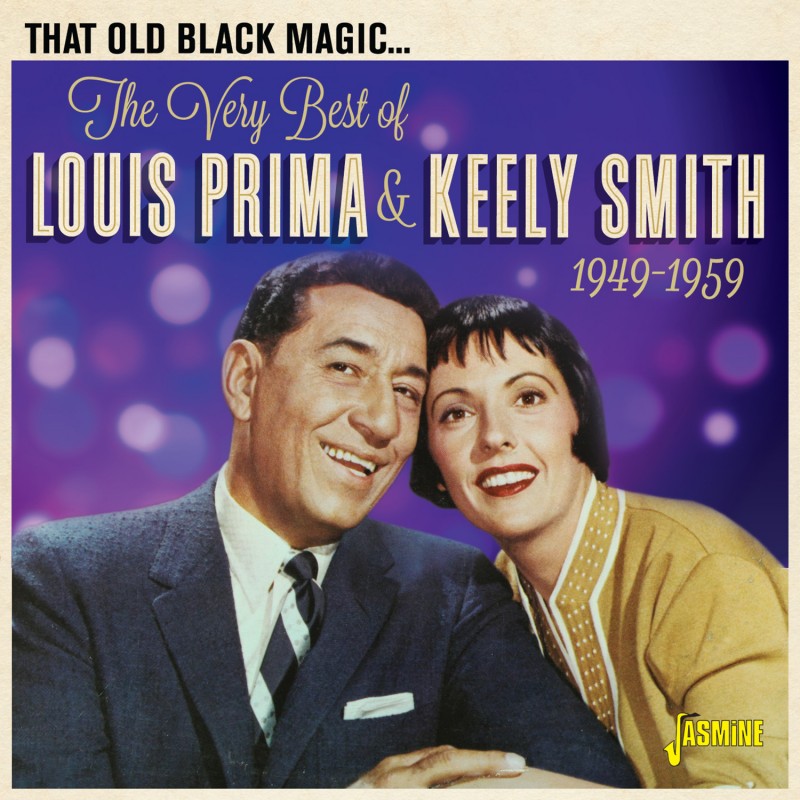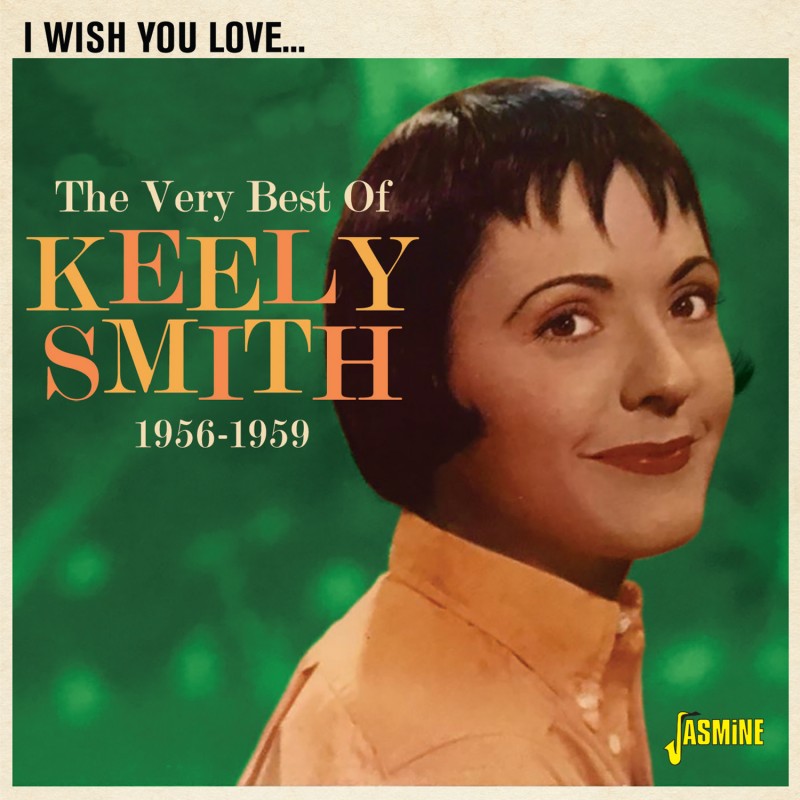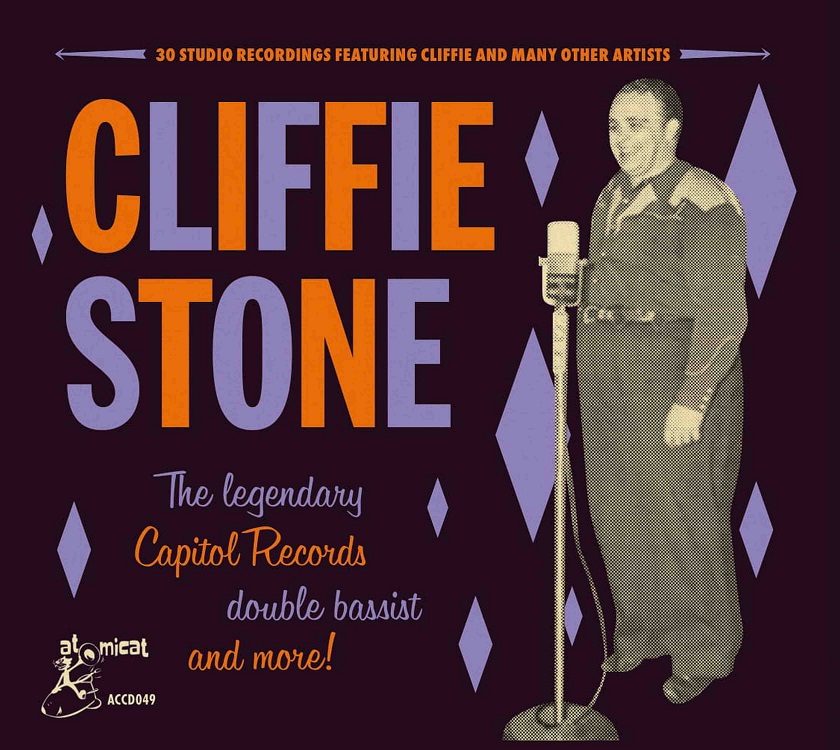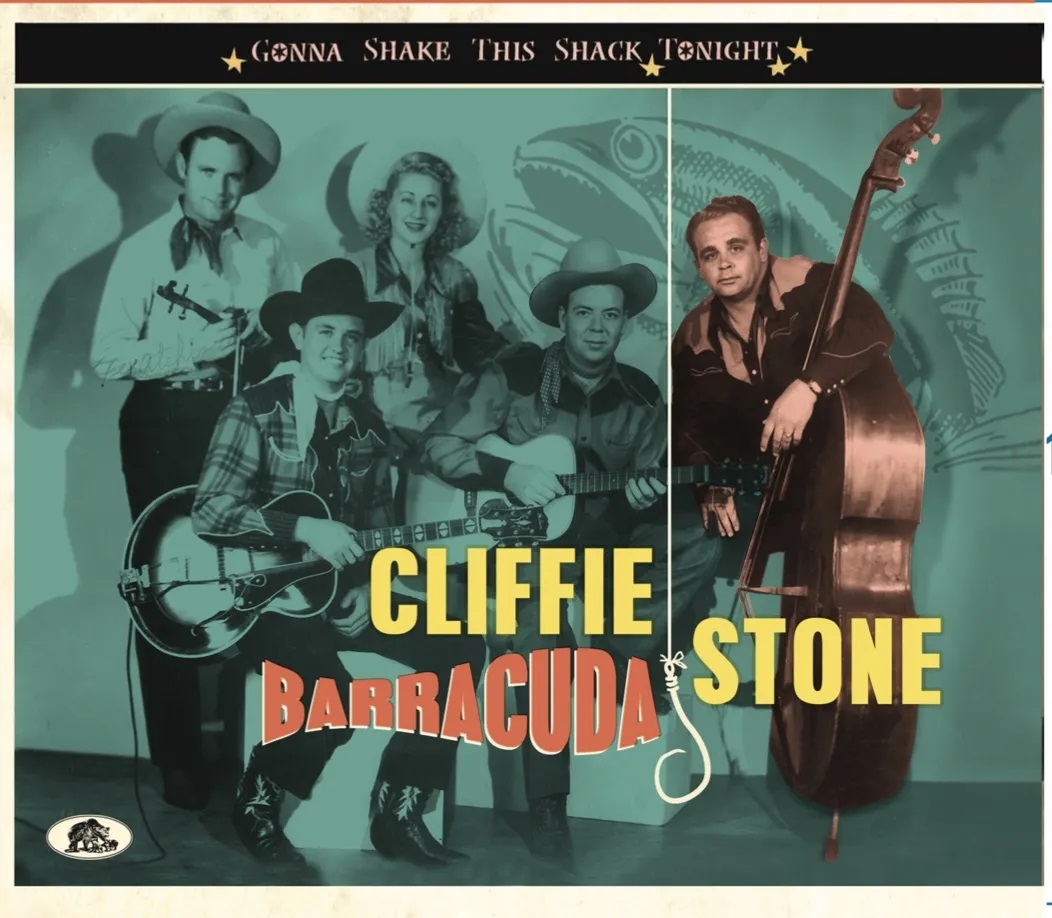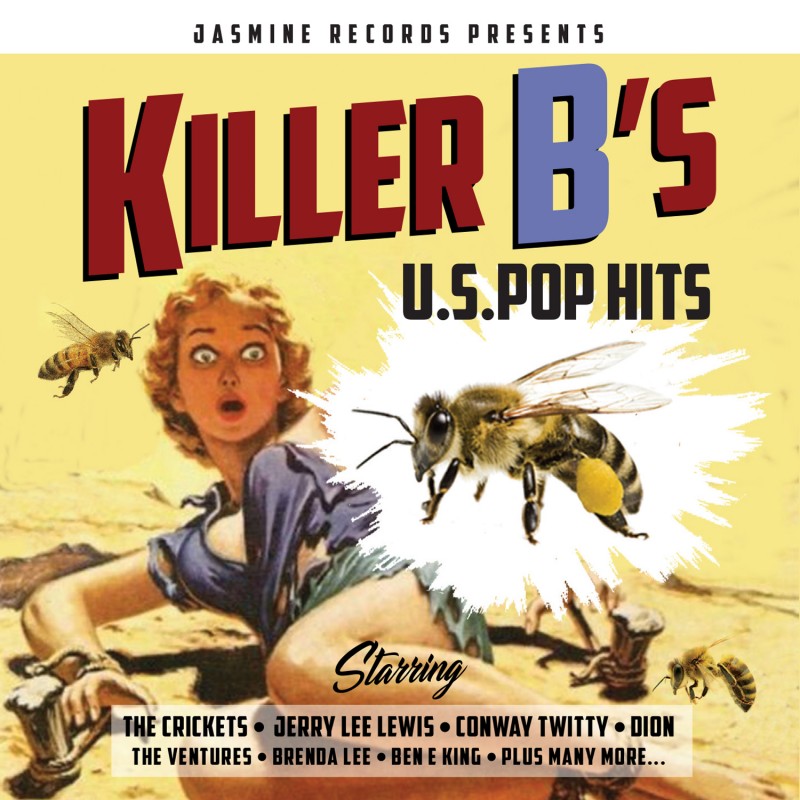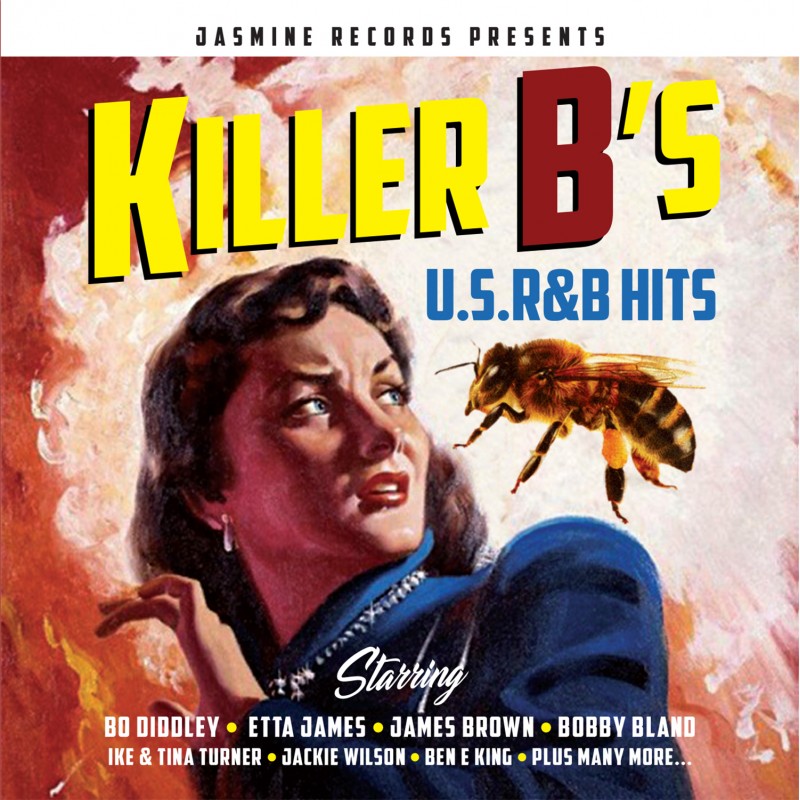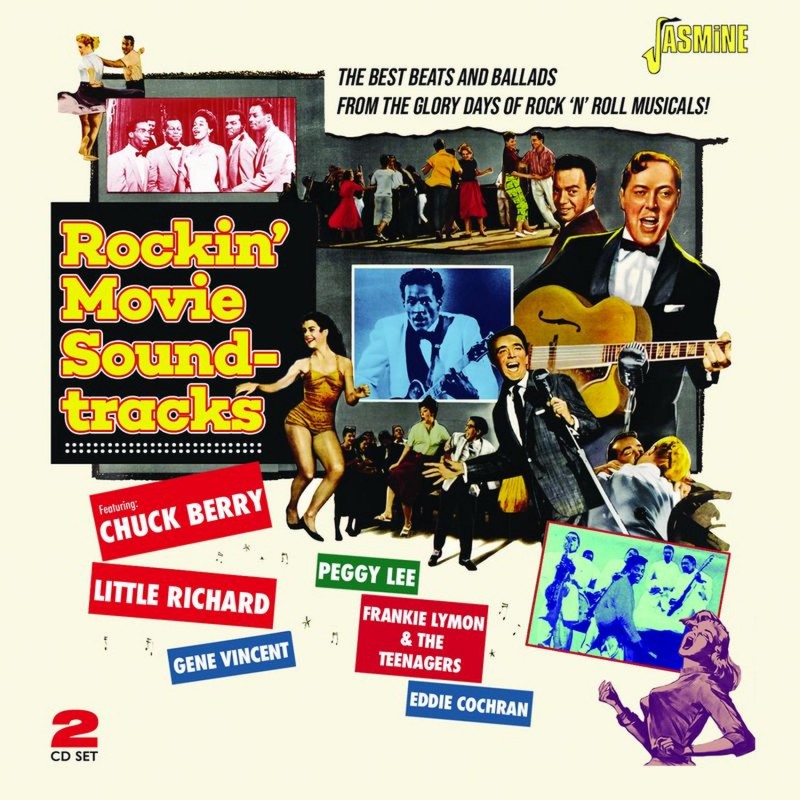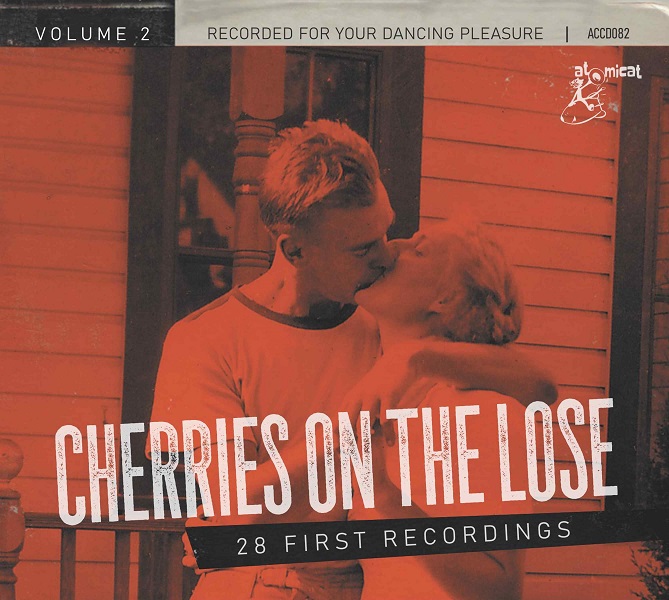
Je
recente release (muziek, boek of wat dan ook) gerecenseerd op onze website?
Stuur deze dan naar de hoofdredactie! |
30 juni 2021
![]()
CD Recensies
 |
DON'T
PLAY THAT SONG/ BEN E. KING
Stand By Me! Spanish Harlem! Don't Play That Song (You Lied)! De in
2015 op 76-jarige leeftijd overleden Ben E. King begon zijn carrière
als leadzanger van The Drifters nadat Clyde McPhatter solo ging (al
zong King uiteindelijk slechts op een dozijn Drifters songs maar daar
zat wel Save The Last Dance For Me tussen), wat hem geen windeieren
opleverde. De CD bevat 30 solo tracks waarvan er in 2012 al zestien
op de Jasmine JASCD202 Ben E. King & the Drifters dubbel-CD Dance
With Me 1958-1961 stonden. Stand By Me, zijn eerste millionseller
Spanish Harlem en Don't Play That Song (You Lied) staan uiteraard
op deze greep uit King's solo werk 1959-1962 dat de A en B kant van
al zijn solo singles tot en met 1962 + de volledige Don't Play That
Song LP uit 1962 bevat, samen met nog veel meer mooie, fijngevoelige
poppareltjes van componisten als Gerry Goffin & Carole King, Jerry
Leiber & Mike Stoller, Doc Pomus, Mort Shuman en Phil Spector,
vaak met pizzicato gitaar, backing vocals, rijke strijkersarrangementen
en uiteraard King's uit de gospel gegenereerde hemelse honingstem
als Brace Yourself, Show Me The Way, het Save The Last Dance For Me-achtige
First Taste Of Love (in twee versies, de single edit in mono en de
15 seconden langere LP versie in stereo), Young Boy Blues, Ecstasy,
Yes, Too Bad, I Promise Love, I'm Standing By, Walking In The Footsteps
Of A Fool, Tell Daddy, het op cha cha cha verankerde Auf Wiedersehn
My Dear en het zelfs van harp voorziene On The Horizon. Naast een
theelepeltje rock 'n' roll (het op Brook Benton & Dinah Washington
geënte duet A Help-Each-Other Romance met LaVern Baker, de andere
kant van die duetsingle uit 1960 is de gospel How Often met orgel)
horen we ook enkele crooners (Souvenir Of Mexico) en covers van andermans
hits als Dream Lover, Will You Love Me Tomorrow, It's All In The Game,
Jerry Butler's He Will Break Your Heart en de standards Moon River,
de Latijns-Amerikaanse shuffle Amor (de Italiaanse versie staat hier
niét op) en het van Etta James Bekende At Last. Een foutloos
stukje popgeschiedenis! Info: www.jasmine-records.co.uk
(Frantic Franky) Stand By Me! Spanish Harlem! Don't Play That Song (You Lied)! Ben E. King who died in 2015 at the age of 76 began his career as lead singer of The Drifters after Clyde McPhatter went solo (though King ended up singing only on a dozen Drifters songs but these do include Save The Last Dance For Me) which sure paid off. The CD contains 30 solo tracks, sixteen of which were already on the 2012 Jasmine JASCD202 Ben E. King & the Drifters double CD Dance With Me 1958-1961. Stand By Me, his first million-seller Spanish Harlem and Don't Play That Song (You Lied) are just three of the standout tracks on this selection of King's solo work 1959-1962 which features not only both sides of all his solo singles up to 1962 and the complete 1962 Don't Play That Song LP, but many more wonderful, sensitive pop gems by composers such as Gerry Goffin & Carole King, Jerry Leiber & Mike Stoller, Doc Pomus, Mort Shuman and Phil Spector, often with pizzicato guitar and backing vocals wrapped in rich string arrangements, showcasing King's gospel-smoothened heavenly honey voice in for example Brace Yourself, Show Me The Way, the Save The Last Dance For Me-styled First Taste Of Love (in two versions, the single edit in mono and the 15 seconds longer LP version in stereo), Young Boy Blues, Ecstasy, Yes, Too Bad, I Promise Love, I'm Standing By, Walking In The Footsteps Of A Fool, Tell Daddy, the cha cha cha based Auf Wiedersehn My Dear and the harp-laden On The Horizon. Besides a teaspoon of rock 'n' roll (the Brook Benton & Dinah Washington inspired duet A Help-Each-Other Romance with LaVern Baker, the other side of this 1960 duet single is the gospel How Often with organ) we also hear a couple of crooners (Souvenir Of Mexico) and covers of other people's hits like Dream Lover, Will You Love Me Tomorrow, It's All In The Game, Jerry Butler's He Will Break Your Heart and the standards Moon River, the Latin American shuffle Amor (the Italian version is not on here) and At Last, made famous by Etta James. A flawless chapter in pop music history! Info: www.jasmine-records.co.uk (Frantic Franky) |
HOOTS
MON/ LORD ROCKINGHAM's XI Lord Rockingham's XI waren in 1958-1959 de huisband van Oh Boy, het eerste rock 'n' roll programma op de Britse TV waarin Cliff Richard en Marty Wilde vaste prik waren maar ook toerende Amerikaanse artiesten als Conway Twitty en Brenda Lee passeerden, en het waren de speciaal voor dit programma samengestelde Lord Rockingham's XI die er de solo artiesten begeleidden. Als de hoes van de CD u bekend voorkomt: ze is gebaseerd op de live LP Jack Good's Oh Boy uit 1958. De groep onder leiding van arrangeur Harry Robinson bestond uit studiomuzikanten en hoewel de groep werd opgeheven in 1959 toen Oh Boy stopte (deels door het protest van de echte adellijke familie Rockingham tegen het gebruik van hun naam) brachten ze van 1958 tot 1962 vijf singles uit die nu op deze CD staan, samen met de vijf fake live tracks (gillende tieners alom) van hun EP Jack Good Presents Lord Rockingham’s XI From Oh Boy waarvan twee nummers hier ook in studio versie op staan. Die 15 nummers vormen hun complete output, de reünie LP The Return Of Lord Rockingham uit 1968 niet te na gesproken. Hun enige hit was Hoots Mon, een gezellige instrumental met twee tenorsaxen en twee baritonsaxen die unisono de melodie toeteren, een orgeltje en gesproken nonsensicale intermezzo’s met een Schots accent dat ook terugkomt in sommige andere nummers. Het geheel doet bij momenten denken aan The Piltdown Men maar dan zonder pauken: gezellige, vrolijke instrumentals soms gebaseerd op tango, mambo of chachacha ritmes (The Squelch, Lady Rockingham I Presume, What The Butler Saw, Lord Rockingham's Lament), soms aangekleed in een horror jasje (Lord Rockingham Meets The Monster), soms met een orgeltje. Benny Hill avant la lettre! Twee nummers, Newcastle Twist en Rockingham Twist, krijgen het typische twist ritme mee. Vijftien tracks is wat mager voor Jasmine CD’s en daarom worden ze aangevuld met maar liefst 21 bonustracks, grotendeels instrumentals in dezelfde stijl van spin-off projecten en individuele groepsleden zoals Jack Good's Fat Noise, Rex & the Minors (tenorsaxofonist Rex Morris), orgeliste Cherry Wainer (de Dave "Baby" Cortez cover The Happy Organ, olé toestanden in Valencia, de Tequila kopie Cerveza origineel van Boots Brown (pseudoniem van jazz trompettist Shorty Rogers), haar piepende Red River Rock cover) en Don Lang tenorsaxofonist Red Price (Week End, het niezende The Sneeze, het James Bond-achtige Theme From Danger Man en Blackjack). Voor de goede orde zijn er ook een paar gezongen twisten (Backscratcher, It's The Twis(h)t, Son Of Twist van The Harry Robinson Crew), een enkele keer staat er een popnummer tussen (Harry Robinson's XV's Heavy Date) of gaat het richting sixties met Cherry Wainer's Money (That's What I Want) orgel cover. Piepende sax en orgeltjes vaak doorspekt met domme uitdrukkingen alom oftewel Frolic Diner op zijn Engels! Info: www.jasmine-records.co.uk (Frantic Franky) Lord Rockingham's XI were in 1958-1959 the house band of Oh Boy, the first rock 'n' roll show on British TV starring both regulars like Cliff Richard and Marty Wilde as well as touring American artists such as Conway Twitty and Brenda Lee, and it was Lord Rockingham's XI, especially formed for the occassion, who accompanied the solo artists. If the cover of the CD looks familiar: it's based on the 1958 live LP Jack Good's Oh Boy. The group led by arranger Harry Robinson consisted of studio musicians and although the group disbanded in 1959 when Oh Boy stopped (partly due to the protest by the descendants of the real Lord Rockingham) they released five singles from 1958 to 1962 which are now on this CD, along with the five fake live tracks (screaming teenagers go wild) from their EP Jack Good Presents Lord Rockingham's XI From Oh Boy, two tracks of which are also on here in a regular studio version. Those 15 songs constitute their complete output, except for the 1968 reunion LP The Return Of Lord Rockingham. Their only hit was Hoots Mon, a fun instrumental with two tenor saxes and two baritone saxes honking the melody in unison, an organ and spoken nonsense interjections with a Scottish accent which also turns up in other songs. The sound is sometimes reminiscent of The Piltdown Men but without the timpani: enthusiastic, cheerful instrumentals occasionally based on tango, mambo or cha cha rhythms (The Squelch, Lady Rockingham I Presume, What The Butler Saw, Lord Rockingham's Lament), sometimes disguised as horror (Lord Rockingham Meets The Monster), sometimes with an organ. Benny Hill avant la lettre! Two songs, Newcastle Twist and Rockingham Twist, have the typical twist rhythm. Fifteen tracks is not a lot for Jasmine CDs, so these are supplemented by no less than 21 bonus tracks, mostly instrumentals in the same style from spinoff projects and individual group members like Jack Good's Fat Noise, Rex & the Minors (tenor sax player Rex Morris), organ player Cherry Wainer (the Dave "Baby" Cortez cover The Happy Organ, olé olé in Valencia, the Tequila copy Cerveza originally by Boots Brown (pseudonym of jazz trumpeter Shorty Rogers), her squeaky Red River Rock cover) and Don Lang tenor sax player Red Price (Week End, the sneezing The Sneeze, the James Bond-styled Theme From Danger Man and Blackjack). There's a couple of vocal twist tunes too (Backscratcher, It's The Twis(h)t, Son Of Twist by The Harry Robinson Crew), the occasional pop song (Harry Robinson's XV's Heavy Date) and a nod towards the sixties with Cherry Wainer's Money (That's What I Want) organ cover. Squeaking saxes and organs often interspersed with dumb shoutouts: Frolic Diner in Great Britain! Info: www.jasmine-records.co.uk (Frantic Franky) |
23 juni 2021
![]()
CD Recensies
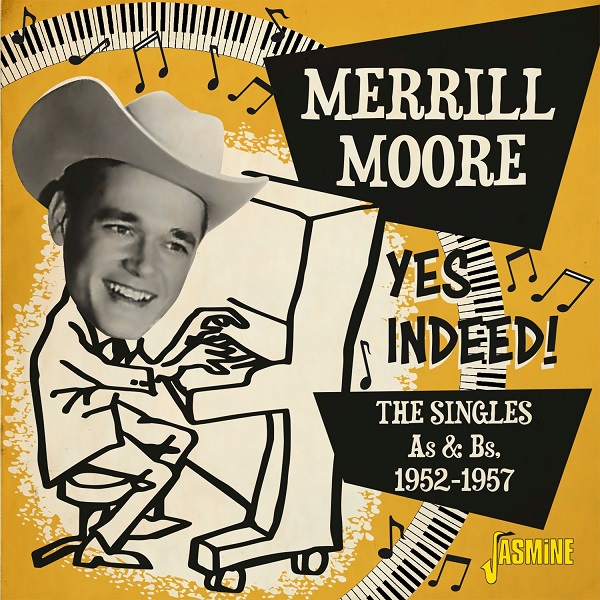 |
YES
INDEED, THE SINGLES As & Bs 1952-1957/ MERRILL MOORE Pianist Merrill E. Moore werd van de ene dag op de andere een rock 'n' roll held toen eind jaren' 60 begin jaren '70 in Engeland 14 van zijn fifties opnames werden gebundeld op de LP Bellyful Of Blue-Thunder, een plaat die in de rock 'n' roll scene zo succesvol was dat er al snel een vervolg kwam, Rough-House 88. Die 2 x 14 songs staan nu op deze CD die in chronologische volgorde beide kantjes van al zijn singles, 78 toeren en EP’s bevat, aangevuld met drie origineel onuitgebrachte nummers tot in totaal 33 tracks in mono. De CD begint met rustige ouderwetsche country boogie waarin Moore's tingel tangel piano wordt ondersteund door fiddle en elektrische country gitaar picking (Corrina Corrina, Big Bug Boogie), maar wordt al snel onweerstaanbaar gezellige op western swing geënte honky tonkende boogie woogie met een voortdenderende linkerhand die niet meer stopt, in perfecte harmonie met die fijne country arrangementen erachter. Moore nam op voor Capitol Records (hij speelde piano op Wanda Jackson's Let's Have A Party!) en dan weet u hoe goed dit klinkt begeleid door het kruim der studiomuzikanten als Jimmy Bryant, Speedy West en Billy Strange, en gezongen met dezelfde enthousiaste energie die ook Bill Haley bezat - Moore's warme, laconieke stem lijkt trouwens wat op die van Haley. Je zou zijn op de boogie pianisten van de jaren '40 gebaseerde muziek ook kunnen omschrijven als een country uitvoering van de GI jive, de tegenhanger van Amos Milburn, Roy Brown en Wynonie Harris. Red Light, Bell Bottom Boogie, Snatchin' And Grabbin', Fly Right Boogie, Rock-Rockola, (It's A) One Way Door, Hard Top Race, Cooing To The Wrong Pigeon, de Julia Lee cover Gotta Gimme What'cha Got, de Bob Wills cover She's Gone, de Johnny Bond cover Barrellhouse Bessie, Tuck Me To Sleep In My Old 'Tucky Home, Buttermilk Baby, Nursery Rhyme Blues: je kan haast alle titels hier opnoemen en misschien is het officiëel geen rock 'n' roll maar je kan er wel zalig op jiven. Instrumentals zijn Nola (in twee versies, de single versie en de iets snellere versie met een hogere pitch die mogelijk per ongeluk op een EP stond) en de jaren '20 standaard Sweet Jennie Lee. Yes Indeed (ook in twee niet zo erg verschillende versies) is gospel boogie, en klassiekers waar Moore zijn tanden in zet zijn Rock Island Line, King Porter Stomp, Cow Cow Boogie met bluesy gitaar, (Five Foot Two, Eyes Of Blue) Has Anybody Seen My Gal, en Freddie Slack's Down The Road Apiece en The House Of Blue Lights. Moore zelf had er naar verluidt een rothekel aan dat zijn muziek rock 'n' roll werd genoemd (hij kon dan ook slechts zelden overtuigd worden in Europa op rock 'n' roll festivals te komen spelen vóór hij in 2000 op 76-jarige leeftijd overleed aan kanker), wat niet wegneemt dat hij er ongewild zelf een fascinerende exponent van was. Merrill E. Moore's extroverte muziek klinkt bijna 70 jaar later nog even vrolijk, en da's geen klein bier. Wij die niet van klein bier houden en altijd voor halve liters kiezen zijn grote fan. Alle 33 goed! Wie de Bear Family dubbelCD Boogie My Blues Away uit 1990 heeft bezit alle 33 tracks al, de 28 track Boptone CD Bellyful Of Blue-Thunder (uit 2007?) wordt hier volledig hernomen, en er is maar één track verschil met de Acrobat CD The House Of Blue Lights uit 2008. Info: www.jasmine-records.co.uk (Frantic Franky)
Pianist Merrill E. Moore became an overnight rock 'n' roll hero when in the late 1960s early 1970s 14 of his fifties recordings were bundled on the British LP Bellyful Of Blue-Thunder, an LP that was so successful in the rock 'n' roll scene that a sequel, Rough-House 88, soon followed. Those 2 x 14 songs are now on this CD which contains in chronological order both sides of all his singles, 78 RPMs and EPs, supplemented by three originally unreleased songs totalling 33 tracks in mono. The CD kicks off with calm old-fashioned country boogie in which Moore's brothel piano is backed by fiddle and electric country guitar picking (Corrina Corrina, Big Bug Boogie), but quickly becomes irresistibly cozy western swing inspired honky tonk boogie woogie with a thundering left hand that doesn't stop, in perfect harmony with the fine country arrangements behind it. Moore recorded for Capitol Records (he played on Wanda Jackson's Let's Have A Party!) and then you know how good this sounds accompanied by the cream of the crop of studio musicians like Jimmy Bryant, Speedy West and Billy Strange, and sung with the same enthusiastic energy that Bill Haley possessed - Moore's warm, laconic voice is reminiscent of Haley's by the way. You could also describe his 1940s boogie based music as a country adaptation of the GI jive, the counterpart of Amos Milburn, Roy Brown and Wynonie Harris. Red Light, Bell Bottom Boogie, Snatchin' And Grabbin', Fly Right Boogie, Rock-Rockola, (It's A) One Way Door, Hard Top Race, Cooing To The Wrong Pigeon, the Julia Lee cover Gotta Gimme What'cha Got, the Bob Wills cover She's Gone, the Johnny Bond cover Barrellhouse Bessie, Tuck Me To Sleep In My Old 'Tucky Home, Buttermilk Baby, Nursery Rhyme Blues: I could list almost all the titles here and maybe officially they're not rock 'n' roll but you can effortlessly jive to them. Instrumentals are Nola (in two versions, the single version and the slightly faster, higher pitched version that may have appeared on an EP by mistake) and the 1920s standard Sweet Jennie Lee. Yes Indeed (also in two not so very different versions) is gospel boogie, and classics Moore made completely his own include Rock Island Line, King Porter Stomp, Cow Cow Boogie with bluesy guitar, (Five Foot Two, Eyes Of Blue) Has Anybody Seen My Gal, and Freddie Slack's Down The Road Apiece and The House Of Blue Lights. Moore himself reportedly hated it when his music was called rock 'n' roll (indeed he could rarely be persuaded to play at rock 'n' roll festivals in Europe before passing away of cancer in 2000 at the age of 76) but unwillingly became a fascinating exponent of it. Merrill E. Moore's extroverted music still sounds as cheerful as it did almost 70 years ago, and that's no small feat. We are big fans. All 33 tracks are excellent! Those who have the 1990 Bear Family double CD Boogie My Blues Away already own all 33 tracks, the 28 track Boptone CD Bellyful Of Blue-Thunder (from 2007?) is included here in its entirety, and there's only one track difference with the 2008 Acrobat CD The House Of Blue Lights. Info: www.jasmine-records.co.uk (Frantic Franky) |
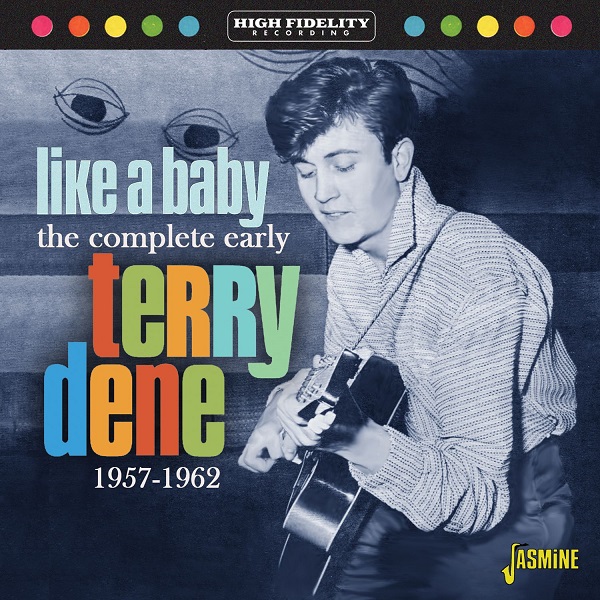 |
LIKE
A BABY/ TERRY DENE In de Britse rock 'n' roll zaten net onder de Cliff Richard's, Billy Fury's, Marty Wilde's, Adam Faith's en Tommy Steele's een hele reeks mindere goden waar je niet meteen veel nummers op kan plakken. Wie zich altijd afvroeg wat Terry Dene, net als elke Britse rocker in die dagen ontdekt in de 2i's koffiebar in Londen, in zijn mars had toen hij in 1957 op zijn achttiende werd gelançeerd als de nieuwe Tommy Steele, kan terecht bij deze royale Complete Early Terry Dene 1957-1962 die 32 tracks bevat, niet alleen beide kantjes van al zijn Decca singles en EP’s waaronder de vier songs uit zijn film The Golden Disc (1957), maar ook de moeilijker te vinden drie singles die hij post-Decca uitbracht op Oriole en Aral waaronder het gedreven The Feminine Look. De muziek is géén wilde rock 'n' roll maar rustige ingetogen poprock met backing vocals zoals Seven Steps To Love, Lucky Lucky Bobby, het uptempo Green Corn, het ragtime The Man In The Phone Booth en de Sal Mineo cover Start Movin' (In My Direction). Nog een paar covers zijn Marty Robbins' bekende A White Sport Coat (And A Pink Carnation), Elvis' bluesy Like A Baby, Bob Luman's This Is The Night en Jack Scott's Baby She's Gone op marsritme. Daartussen steken uiteraard veel sentimentele ballades die mikten op de tienermarkt zoals Can I Walk You Home, het plechtige The Golden Age en het door exotica beïnvloede Teenage Dream (ook van Marty Robbins), maar toch ook een paar sympathieke rockers, zij het steeds met die vermaledijde achtergrondkoortjes, zoals C'Min And Be Loved en Come And Get It. Het klinkt allemaal heel Amerikaans maar wordt helaas al snel platte pop zoals A Boy Without A Girl, There's No Fool Like A Young Fool, het Ave Maria-achtige I've Come Of Age, de crooner Charm en de cha cha cha Lover Lover. Dene's carrière ging al snel bergaf wegens te veel alcohol, baldadig gedrag en agressie, en toen hij zijn legerdienst moest vervullen werd hij na twee maanden ontslagen wegens mentale en psychische problemen. Zijn muziekcarrière raakte nooit meer uit het slop en in 1964 ging hij de religieuze tour op als evangelist en nam hij enkele gospel albums op alvorens in de jaren '70 en '80 te comebacken. Ik vind Dene niet bepaald een geweldig zanger omdat zijn bereik vrij beperkt is en dit is zoals gezegd niet de wildste rock 'n' roll aller tijden, wel een interessant tijdsdocument eerder bestemd voor de oldies liefhebber dan voor de rock 'n' roll verzamelaar, boordevol kwaliteits jukebox muziek die aantoont dat het niet enkel Move It was in die dagen. Een voorbeeld van gemiste kansen? Oordeelt u zelf! Terry Dene is nu 82 jaar. Info: www.jasmine-records.co.uk (Frantic Franky)
Just below the Cliff Richard's, Billy Fury's, Marty Wilde's, Adam Faith's and Tommy Steele's British rock 'n' roll consisted of an army of lesser gods who one can not always immediately associate with any particular songs. If you always wondered what Terry Dene, like every British rocker in those days discovered in the 2i's coffee shop in London, had up his sleeve when he was launched in 1957 at the age of eighteen as the next Tommy Steele, check out this generous 32 track Complete Early Terry Dene 1957-1962 containing not only both sides of all his Decca singles and EPs including the four songs from his film The Golden Disc (1957), but also the harder to find three singles he released post-Decca on Oriole and Aral including the driving The Feminine Look. The music is not wild rock 'n' roll but calm introspective pop rock with backing vocals such as Seven Steps To Love, Lucky Lucky Bobby, the uptempo Green Corn, the ragtime The Man In The Phone Booth and the Sal Mineo cover Start Movin' (In My Direction). Other covers include Marty Robbins' well known A White Sport Coat (And A Pink Carnation), Elvis' bluesy Like A Baby, Bob Luman's This Is The Night and Jack Scott's Baby She's Gone set to a marching rhythm. There are of cours several sentimental ballad aimed at the teenage market such as Can I Walk You Home, the solemn The Golden Age and the exotica influenced Teenage Dream (another Marty Robbins cover), but also a couple of sympathetic rockers, albeit always with those dreaded backing vocals, such as C'Min And Be Loved and Come And Get It. Everything sounds very American but unfortunately quickly turns into flat pop music like A Boy Without A Girl, There's No Fool Like A Young Fool, the Ave Maria-like I've Come Of Age, the crooner Charm and the cha cha cha Lover Lover. Dene's career quickly went down the drain due to too much alcohol and aggressive behavior, and when he was called up for military service he was discharged after two months due to mental and psychological problems. His career never got off the ground again and in 1964 he went religious, became an evangelist and recorded a few gospel albums before attempting several comebacks in the seventies and eighties. IMHO Dene is not a particularly great singer as his range is quite limited and as said this is not the wildest rock 'n' roll of all time, which makes the CD an interesting time document that will probably please more the oldies fan than the rock 'n' roll collector, as it's packed with quality jukebox music that shows it wasn't just Move It in those days. An example of missed opportunities? Judge for yourself! Terry Dene is now 82 years old. Info: www.jasmine-records.co.uk (Frantic Franky) |
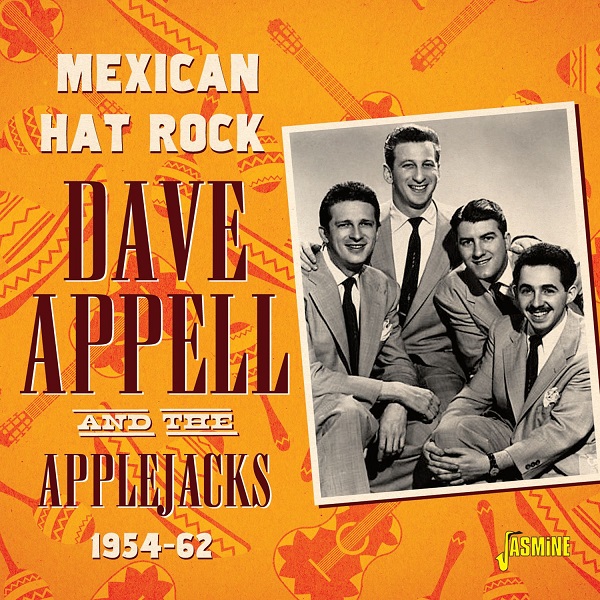 |
MEXICAN
HAT ROCK 1954-62/ Het bekendste nummer van Dave Appell & the Applejacks is de instrumental Mexican Hat Rock, een leuke bewerking van de Mexicaanse hoedendans (de sombrero’s vliegen de lucht in) vermengd met het kinderliedje Mary Had A Little Lamb, maar zoals altijd gaat daarachter veel meer schuil, zoals deze Best Of met 33 mono opnames oorspronkelijk verschenen op Tone-Craft, President, Decca en vooral Cameo Records getuigt. De in 2014 op 92-jarige leeftijd overleden Dave Appell begon zijn carrière in de jaren '30 als jazzgitarist en was in de jaren' 50 actief als arrangeur, bandleider en producer voor Cameo-Parkway Records. Hij zat in 1956 in de rock 'n' roll film Don’t Knock The Rock (zijn twee nummers uit de film staan op deze CD), begeleidde Charlie Gracie op Butterfly, Fabulous en Ninety-Nine Ways, en hij schreef Let’s Twist Again, Limbo Rock (2 x Chubby Checker), Wild One, Swinging School (2 x Bobby Rydell) en Bristol Stomp (The Dovells). Meer dan wij kunnen zeggen! Dave Appell & the Applejacks kwamen uit Philadelphia waar wel meer orkesten de big beat serveerden, denk maar aan Bill Haley en de minder bekende rock 'n' roll pionier Mike Pedicin. De CD begint met calypso door een groot dansorkest (Smarter) en uiterst dansbare swingende variété pop (Sweet Patootie Pie), maar op zijn best leunt Appell's muziek aan bij Boyd Bennett en Freddie Bell, big band rock 'n' roll met veel blazers en veel vocalisten, maar steeds met een drumstel dat de maat aangeeft in Ookey Ook, Ring Around My Baby, The Love Express, Teenage Meeting (Gonna Rock It Up Right), The Rock And Roll Story en Country Dance, ook al gaat het tempo soms naar beneden (Stop Red Light, Chitter Chatter Baby, Ooh Baby Ooh, het striptease nummer Applejack). Al die nummers klinken krèk hetzelfde, maar ze klinken wel allemaal goed! De CD bevat uiteraard veel grappige of als u er niet van houdt domme instro’s als Cherry Valley, Circle Dance, Rocka-Conga en Bunny Hop, en ook het film noir Theme From The Untouchables, de standaard Am I Blue en de bekende instrumental Night Train krijgen zo'n bunny hop dan wel stroll behandeling, zij het dat ze lang niet allemaal zo goed zijn als de Mexican Hat Dance. Love In The Jungle is googa mooga jungle gekte met Hawaiiaanse steel gitaar, Dinner With Drac is de instrumentale backing track zonder zang van horror host John Zacherley's Dinner With Drac, en Mexican Hat Twist is de Mexican Hat Dance in een medley met Let's Twist Again en Bristol Stomp, wat Appell uiteraard kon maken omdat hij mede-componist was van die nummers. Die stem op Let's Continental kan trouwens toch alleen maar Chubby Checker zijn, niet? Meer mainstream gerichte instrumentale achtergrond muziekjes ten koste van een swinger als Honey Bunch die hier niét op staat zijn September Song (het begon mis te gaan toen de naam Dave Appell & the Applejacks veranderde in Dave Appell & his Orchestra), de dixieland ragtimes Any Time en Struttin' In The Summertime, en Theme From The Young Ones dat niets met Cliff Richard te maken heeft. Helemààl schmaltz is Appell's trombone/clavecimbel cover van Dean Martin's Memories Are Made Of This. In Happy Jose gaat Appell de Herb Alpert & the Tijuana Brass tour op gecombineerd met Kana Kapila nonsens. In concreto betekent dit dat ik de tweede helft van de CD middelmatig vind, in tegenstelling tot de eerste helft die ik erg goed vind. Het hangt met andere woorden zoals immer af van je eigen smaak en verwachtingen. In elk geval zullen de jivers onder u werk hebben! Info: www.jasmine-records.co.uk (Frantic Franky)
Dave Appell & the Applejacks are best known for the instrumental Mexican Hat Rock, a fun adaptation of the Mexican hat dance (the sombreros fly into the air) mixed with the children's song Mary Had A Little Lamb, but as always there is much more to it than just that, as this Best Of with 33 mono recordings originally released on Tone-Craft, President, Decca and mostly Cameo Records attests. Dave Appell who died in 2014 at the age of 92 began his career in the 1930s as a jazz guitarist and was arranger, bandleader and producer for Cameo-Parkway Records in the 1950s. He was in the 1956 rock 'n' roll film Don't Knock The Rock (his two songs from the film are on this CD), accompanied Charlie Gracie on Butterfly, Fabulous and Ninety-Nine Ways, and wrote Let's Twist Again, Limbo Rock (2 x Chubby Checker), Wild One, Swinging School (2 x Bobby Rydell) and Bristol Stomp (The Dovells). More than we can say! Dave Appell & the Applejacks came from Philadelphia where they were not the only orchestra serving up the big beat, think of Bill Haley and the lesser known rock 'n' roll pioneer Mike Pedicin. The CD starts with calypso performed by a big dance orchestra (Smarter) and highly danceable swinging variety pop (Sweet Patootie Pie), but at its best Appell's music leans heavily toward Boyd Bennett and Freddie Bell, big band rock 'n' roll with lots of horns and lots of vocalists, but always with a drum kit that sets the beat in Ookey Ook, Ring Around My Baby, The Love Express, Teenage Meeting (Gonna Rock It Up Right), The Rock And Roll Story and Country Dance, even if the tempo sometimes goes down (Stop Red Light, Chitter Chatter Baby, Ooh Baby Ooh, the striptease number Applejack). All those tunes sound exactly the same, but they all sound good. The CD obviously contains many silly or if you don't like them dumb instros like Cherry Valley, Circle Dance, Rocka-Conga and Bunny Hop, and also the film noir Theme From The Untouchables, Am I Blue and the well known instrumental Night Train get a bunny hop stroll treatment, but unfortunately not all of them are as good as the Mexican Hat Dance. Love In The Jungle is googa mooga jungle craziness with Hawaiian steel guitar, Dinner With Drac is the instrumental backing track without vocals of horror host John Zacherley's Dinner With Drac, and Mexican Hat Twist is the Mexican Hat Dance in a medley with Let's Twist Again and Bristol Stomp, which Appell could do without legal problems since he co-wrote those songs. And that voice on Let's Continental can only be Chubby Checker, no? More mainstream instrumental background tunes are September Song (it started to go wrong when the name Dave Appell & the Applejacks was replaced by Dave Appell & his Orchestra), the dixieland ragtimes Any Time and Struttin' In The Summertime, and Theme From The Young Ones which has nothing to do with Cliff Richard. Utter schmaltz is Appell's trombone/clavichord cover of Dean Martin's Memories Are Made Of This. In Happy Jose Appell combines Herb Alpert & the Tijuana Brass with Kana Kapila nonsense. Which means that I find the second half of the CD mediocre, as opposed to the first half which I like a lot. In other words: as always it depends upon your own taste and expectations. In any case the jivers among you will need rubber legs! Info: www.jasmine-records.co.uk (Frantic Franky) |
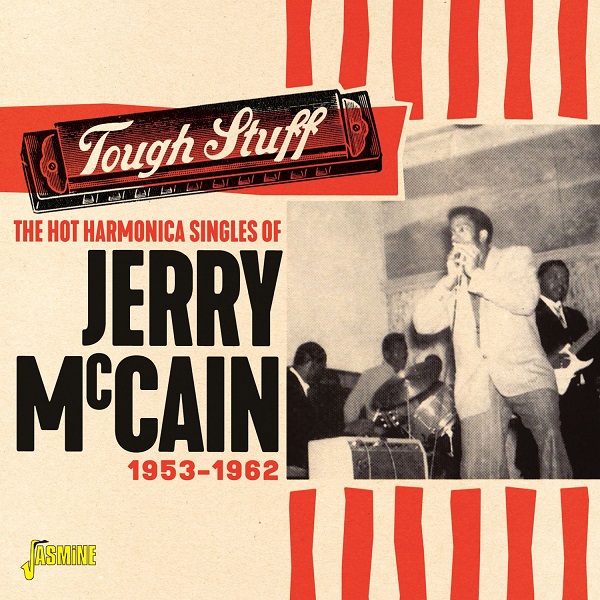 |
TOUGH
STUFF, THE HOT HARMONICA SINGLES OF/ JERRY McCAIN Deze CD bevat 25 mono tracks van mondharmonica mens Jerry McCain op Trumpet, Excello, Rex en Okeh van 1953 tot 1962. Zijn debuut East Of The Sun / Wine-O-Wine was in 1953 klaaglijke mondharmonica blues die als 't ie op tempo komt en een drumbeat meekrijgt de aanzet vormt tot rockende rhythm 'n' blues (Stay Out Of Automobiles, Middle Of The Night, Courtin' In A Cadillac, You Don't Love Me No More), al is dat in principe gewoon de versnelde uitvoering van trage, harde electrische blues als Love To Make Up, Crazy 'Bout That Mess, If It Wasn't For My Baby, Things Ain't Right en het I'm A Man-achtige That's What They Want waarin zelfs de woorden "mannish boy" voorkomen. Staat er ook rock 'n' roll op? Nauwelijks, al is Bad Credit zonder mondharmonica redelijk, komt de mondharmonica rocker Run Uncle John Run met zijn stop/start structuur aardig in de buurt, en boogiet The Jig's Up zonder mondharmonica op een Little Richard Lucille tempo. Het rockende hoogtepunt is uiteraard de populaire bluesbopper My Next Door Neighbor in de single versie, niet in de wildere demo versie. Trying To Please begint als een Love Me Tender-achtige trage maar wordt dan eerst één zin rhumba en dan keiharde rhythm 'n' blues bop, en Groom Without A Bride waarin hij met belletjes doch zonder mondharmonica voor het altaar staat en Listen Young Girls in Slim Harpo stijl zijn verrassend gevoelige ballades. She's Tough, ook in die slepende Slim Harpo stijl, werd eind jaren' 70 wereldberoemd in de coverversie van The Fabulous Thunderbirds. Red Top met begeleiding van Floyd Cramer, Grady Martin en Boots Randolph is een instrumentale mondharmonica twist die méér twist dan het gezongen Twist '62, en de CD eindigt met enerzijds traditionele mondharmonica blues (het instrumentale Steady) en anderzijds funky early sixties instrumentaaltjes als Popcorn met de Anita Kerr Singers als vrouwenkoortje en het zelfs van een vioolarrangement voorziene Jet Stream. En waar zijn Geronimo Rock 'n' Roll, Rock 'n' Roll Ball, I Need Somebody To Love, Turn Your Tamper Down, I'm A Ding Dong Daddy From A Rock 'n' Roll City, Cutie Named Judy en de instrumental Choo Choo Rock, die verschroeiende bluesboppers die wij voor het eerst hoorden begin jaren '80 op Choo Choo Rock, de White Label LP waarop wij kennis maakten met Jerry McCain? Dat waren van 1955 tot 1957 bij McCain thuis opgenomen demos voor Excello die hier niét opstaan, naar wij aannemen een rechtenkwestie. Als u dat beduidend wilder dan het hier aangeboden materiaal zoekt: Discogs vermeldt verscheidene releases waar het op staat, zelfs op vinyl. McCain overleed in 2012 op 81-jarige leeftijd. Info: www.jasmine-records.co.uk (Frantic Franky)
This CD contains 25 mono tracks from harmonica man Jerry McCain recorded for Trumpet, Excello, Rex and Okeh from 1953 to 1962. His 1953 debut East Of The Sun / Wine-O-Wine was plaintive harmonica blues that when it gets up to speed and incorporates a drum beat sets the stage for rockin' rhythm 'n' blues (Stay Out Of Automobiles, Middle Of The Night, Courtin' In A Cadillac, You Don't Love Me No More), even though it's basically just a sped-up rendition of slow, hard electric blues like Love To Make Up, Crazy 'Bout That Mess, If It Wasn't For My Baby, Things Ain't Right and the I'm A Man sounding That's What They Want which even contains the words "mannish boy". Is there also rock 'n' roll on here? Hardly, although Bad Credit without harmonica is reasonable, the harmonica rocker Run Uncle John Run with its stop/start structure comes pretty close, and The Jig's Up without harmonica boogies at a Little Richard Lucille pace. The rockin' highlight is no doubt the popular blues bopper My Next Door Neighbor in the single version, not the wilder demo version. Trying To Please begins as a Love Me Tender slow before turning first into one phrase of rhumba and then into tough as nails rhythm 'n' blues bop, and Groom Without A Bride in which he stands at the altar with bells but without mouth harp and Listen Young Girls in Slim Harpo style are surprisingly sensitive ballads. She's Tough, also in that restrained Slim Harpo style, became world famous at the end of the 1970s in the cover version by The Fabulous Thunderbirds. Red Top on which McCain is accompanied by Floyd Cramer, Grady Martin and Boots Randolph is an instrumental harmonica twist that twists more than the vocal Twist '62, and the CD ends with both traditional harmonica blues (the instrumental Steady) and funky early sixties instrumentals such as Popcorn with the Anita Kerr Singers serving up a female choir and even a violin arrangement in Jet Stream. So, where are Geronimo Rock 'n' Roll, Rock 'n' Roll Ball, I Need Somebody To Love, Turn Your Tamper Down, I'm A Ding Dong Daddy From A Rock 'n' Roll City, Cutie Named Judy and the instrumental Choo Choo Rock, the scorching blues boppers we first heard in the early 1980s on Choo Choo Rock, the White Label LP that introduced us to Jerry McCain? Those were demos recorded at McCain's home from 1955 to 1957 for Excello that are not included here, we assume a matter of rights. If you're looking for that much wilder stuff than the material on offer here: Discogs lists several releases that include it, even on vinyl. McCain died in 2012 at the age of 81. Info: www.jasmine-records.co.uk (Frantic Franky) |
16 juni 2021
![]()
CD Recensies
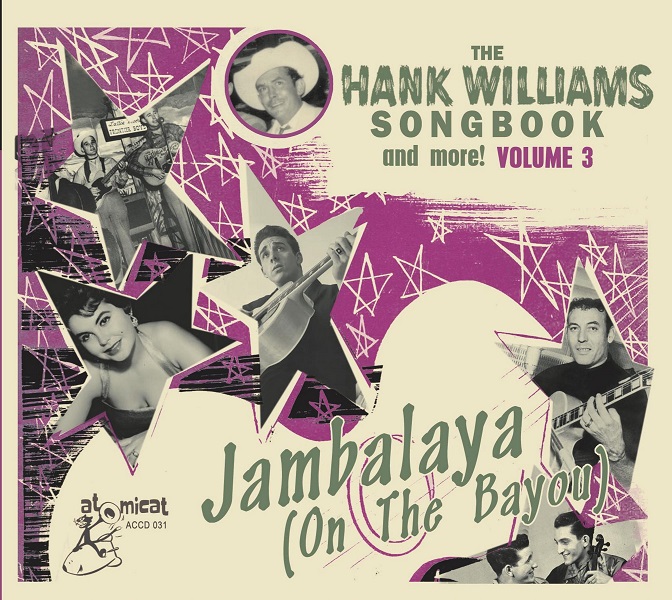 |
JAMBALAYA
(ON THE BAYOU): THE HANK WILLIAMS SONGBOOK AND MORE VOLUME 3
Het derde en laatste deel in deze Hank Williams cover reeks is extra
interessant omdat de CD in tegenstelling tot de eerste twee delen
die focusten op hillbilly ook aandacht besteedt aan de invloed die
de op nieuwjaarsdag 1953 overleden Hank Williams had op de opkomende
rock 'n' roll revolutie. Dat is uiteraard tegelijk een bewijs voor
de tijdloosheid van de songs van Hank Williams: zet er een beat op
en zijn muziek wordt probleemloos rock 'n' roll: Laura Lee Perkins'
I Just Don't Like This Kind Of Livin' is female rockabilly, Conway
Twitty zet de ballade You Win Again geheel naar zijn hand, en Carl
Perkins rockt in 1958 post-Sun met Hey Good Lookin'. Toch bevat de
30 track CD ook flink wat country boogie, zowel smooth (Eddie Dean's
Baby We're Really In Love), vlot swingend (Eddie Marshall & the
Trail Dusters' Honky Tonk Blues) als medium tempo, zeg maar country
bop, tot variété country toe (Ray Pilgrim's Lovesick
Blues). Twee van de beste nummers zijn naar mijn smaak Billy Mure's
uptempo instrumentale indianen op het oorlogspad versie van Ramblin'
Man door Billy Mure, en Kaw-Liga dat in de uitvoering van Rusty &
Doug Kershaw with Wiley Barkdull een heel ander en erg knap meerstemmig
arrangement krijgt. Rusty & Doug komen later nog terug met een
rock-a-bop cover van Why Don't You Love Me die in 1958 op de B-kant
van Hey Mae stond. Op het hoesje van de CD staat onder meer een foto
van Jack Scott maar door een foutje bij de mastering is zijn nummer
vervangen door Ricky Nelson, een beetje ongelukkig omdat Scott's gospel-achtige
rock 'n' roll cover van Hank Williams' I'm Satisfied veel minder bekend
is dan Nelson's rockabilly versie van My Bucket's Got A Hole In It
dat waarschijnlijk daardoor het enige nummer is dat in twee verschillende
versies op de CD staat. De CD toont evenwel niet enkel Hank Williams'
invloed op de rock 'n' roll, maar geeft ook aan dat Williams - en
dat wordt vaak over het hoofd gezien - evengoed zijn sporen naliet
in de zwarte muziek. Ondanks alle rassenscheiding in die dagen waren
ze niet gek: een goed liedje is een goed liedje, en als het blanke
publiek iets kocht was er geen enkele reden om aan te nemen dat je
het niet aan de zwarte medemens kon slijten. Voorbeelden hier zijn
de jivende doo-wop van The Pearls' Your Cheating Heart en de big band
swing van The Delta Rhythm Boys' I'll Never Get Out Of This World
Alive, terwijl Johnny "Guitar" Watson, toch voornamelijk
een blues artiest, in 1963 begeleid door de band van Johnny Otis een
mooie jazzy swingende Cold Cold Heart neerzette. 't Is eigenlijk gek,
maar een van de allerbekendste en populairste Hank Williams covers
is zwart, meer bepaald Fats Domino's gezellige Jambalaya, zo op en
top Fats dat je zou vergeten dat het een Hank Williams song is. Over
Jambalaya gesproken, Eddie Shuler' All Star Reveliers herwerkten dat
nummer met positief resultaat tot de onherkenbare cajun stomper Jambalaya
Boogie. En vóór u denkt dat The Louisiana Rounders de
melodie van Jambalaya stalen: hun Alons [sic] Kooche Kooche is veel
ouder, namelijk uit 1937, en één van de songs die de
inspiratiebron vormden voor Jambalaya! The
third and final instalment in this Hank Williams cover series is extra
interesting because unlike the first two parts which focused on hillbilly,
Volume 3 CD also pays attention to the influence that Hank Williams
who died on New Year's Day 1953 had on the emerging rock 'n' roll
revolution. This is of course also proof of the timelessness of Hank
Williams' songs: add a beat and without any problem his music becomes
rock 'n' rol: Laura Lee Perkins' I Just Don't Like This Kind Of Livin'
is female rockabilly, Conway Twitty effortlessly makes the ballad
You Win Again all his own, and Carl Perkins in 1958 rocks Hey Good
Lookin' post-Sun. Still the 30 track CD also contains quite a bit
of country boogie, be it smooth (Eddie Dean's Baby We're Really In
Love), casually swinging (Eddie Marshall & the Trail Dusters'
Honky Tonk Blues), medium tempo country bop or variety style (Ray
Pilgrim's Lovesick Blues). For my money two of the best songs here
are Billy Mure's uptempo instrumental indians on the warpath version
of Ramblin' Man, and Kaw-Liga which gets a very different but excellent
vocal arrangement by Rusty & Doug Kershaw with Wiley Barkdull.
Rusty & Doug return later with a rock-a-bop cover of Why Don't
You Love Me that in 1958 was on the B-side of Hey Mae. The CD features
Jack Scott on the cover but due to a mastering error his song was
replaced by Ricky Nelson, a bit unfortunate since Scott's gospel-like
rock 'n' roll cover of Hank Williams' I'm Satisfied is much less known
than Nelson's rockabilly version of My Bucket's Got A Hole In It which
probably as a result is the only song to appear on the CD twice in
two different versions. The CD not only shows Hank Williams' influence
on rock 'n' roll but also points out that Williams - which is often
overlooked - also left his mark on black music. In spite of all the
racial segregation in those days they were not stupid: a good song
is a good song and if the white audience bought it there was no reason
you couldn't sell it to the afro-american market. Examples here include
the jiving doo-wop of The Pearls' Your Cheating Heart and the big
band swing of The Delta Rhythm Boys' I'll Never Get Out Of This World
Alive, while Johnny "Guitar" Watson, primarily known as
a blues artist, in 1963 committed a cool jazzy swinging Cold Cold
Heart to wax accompanied by Johnny Otis' band. It's odd if you consider
that one of the best known and most popular Hank Williams covers is
black, more specifically Fats Domino's feel good Jambalaya, so 100
% Fats that you'd forget it's a Hank Williams song. Speaking of Jambalaya,
Eddie Shuler's All Star Revelers reworked it with positive results
as the unrecognizable cajun stomper Jambalaya Boogie. And before you
think that The Louisiana Rounders stole the Jambalaya melody: their
Alons [sic] Kooche Kooche is much older, going all the way back to
1937, and is in fact one of the songs that inspired Jambalaya! |
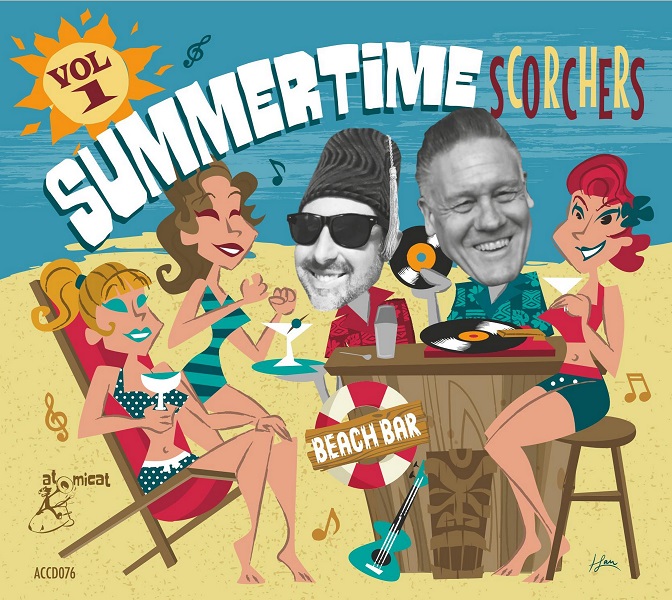 |
SUMMERTIME
SCORCHERS VOL 1 Op 21 juni begint de zomer en die kan alleen maar beter zijn dan die van vorig jaar nu alles langzaamaan lijkt te heropenen. Probeer het allemaal een beetje veilig te houden, mensen, en vooral dan de anti-vaxxers onder jullie, zodat na de zomer heel Europa weer niet opnieuw in lockdown moet. In elk geval: bij de zomer horen feestjes, bij feestjes hoort muziek, muziek mag alleen maar rock 'n' roll zijn, en wie geen DJ in zijn vriendenkring heeft legt gewoon deze CD op voor een portie zonnige zomermuziek. Voor wie zich altijd al afvroeg wie samensteller Mark Armstrong, Brits DJ woonachtig in Duitsland, nu eigenlijk is: zijn tronie staat rechts op de hoes, de figuur links is de Braziliaanse illustrator Henrique San die het artwork van deze CD verzorgde, en samen bouwen ze op het strand een feestje met enkele dames die er uit zien als Flintstones meisjes die na enkele cocktails flink onderuit zijn gegaan, hahaha. Tijd voor een Beach Party, en Bob Jaxon nodigt ons in de gelijknamige opener uit met blanke rock 'n' roll met opvallende Les Paul-achtige gitaar. Voor ons hoeft dat niet persé op het strand maar mag het het ook gewoon een Rock 'n' Roll Party zijn, bij Big Dave beschaafde rock 'n' roll swing met als ongewoon wapenfeit een orgelsolo. Party Time, aldus Sal Mineo die toont dat ie naast acteren, onder meer naast James Dean in Rebel Without A Cause, ook voldoende kon zingen om niet door de grond te moeten zakken van schaamte. Dat van die zomer is uiteindelijk slechts een excuus want als pintje bij paaltje komt vallen officieel slechts één derde van de 30 tracks onder dat thema, zoals daar zijn Jamie Coe's uiterst jive-bare Chuck Berry kopie Summertime Symphony, misschien wel de beste Chuck Berry kopie ooit, die klinkt als Surfin' USA van The Beach Boys zonder surf vocals maar mét Johnnie Johnson-styled piano. De CD bevat nog meer rock 'n' roll met grote productiewaarden, achtergrondkoortjes en alles erop en eraan zoals Johnny O'Neill's Beach Doll, altijd goed voor fun in het zand, net als Elvis' Slicin' Sand, zo'n typisch vlot Elvis nummer uit een beach film, in dit geval Blue Hawaii uit 1961. Hawaii is synoniem met zon, strand en tiki, en in het geval van The De Castro Sisters' Rockin' And Rollin' In Hawaii ook met big band rock 'n' roll swing. Queen Of The Beach is een vroege single uit 1959 van Carole King, toen vooral bekend als componiste (The Shirelles' Will You Love Me Tomorrow, Little Eva's The Loco-Motion, Bobby Vee's Take Good Care Of My Baby) en vanaf de jaren' 70 ook actief als singer-songwriter. Veel bekender, of in elk geval meer cult, is Rodney & the Blazers' Summertime Rock, een alles omver blazende instrumentale sax-/ gitaarversie van George Gershwin's Summertime. Er is nog instrumentaal werk met Let's Go Trippin', origineel surf van Dick Dale maar hier door Milt Rogers uitgevoerd in traditionelere gitaar/sax stijl. Everybody Out'ta The Pool blijft een geweldige uptempo gitaar/piano stroll door The Lifeguards, naar verluidt Bill Haley's Comets onder een schuilnaam zonder hun frontman. Een andere onweerstaanbare feestplaat is Freddy Cannon's Palisades Park met het geluid van roetsjbanen en genoemd naar het in 1971 gesloten pretpark in New Jersey. Een bekend nummer dat op zich niets met de zomer te maken heeft is Warren Smith's Sun rockabilly Rock 'n' Roll Ruby gecoverd als big band rock 'n' roll door Rusty Draper, en een andere Sun connectie (hebt u 'em? sun = zon = zomer) is de vlotte rock 'n' roll cover van Flip Flop And Fly door Billy Lee Riley in 1961 op het Home Of The Blues label gevestigd op Beale Street in Memphis. Er is Billy Adams' rockabillystomper You Gotta Have A Duck Tail (een fris zomerkopje is altijd meegenomen), rare rockabilly met Rudy Hayden & the Country Boys' Want Me A Woman, en er zijn stevige rockers met Harry Lee's You Don't Know, Jackie Cannon's Proof Of Your Love en Lou Josie's Breezin' Out. Stop is een geweldig begin jaren '60 nummer van Clyde McPhatter op de muziek van indianen op het oorlogspad. Geen flauw idee wat het met de zomer te maken heeft, maar het klinkt schitterend. Er zijn enkele meidengroepen (SPCLG (Society For The Prevention Of Cruelty To Little Girls) door The Society Girls, Maureen Gray's aanstekelijke Come On And Dance), maar evengoed doo-wop met The Paramounts en hun Girl Friend. Afsluiten doen we met Barry Etris' cover van Cliff Richard's The Young Ones, teen rock met - jawel - mariachi trompetten. Samen zijn dat 30 gevarieerde rock 'n' roll tracks 1955-1963 met een licht overwicht aan blanke dans rock 'n' roll (The Tyrones' Giggles, het Seventeen-achtige Cool Disk Jockey van Boyd Bennett, The Platters zoals u hen nog nooit hebt horen rocken in de jiver Hula Hop), en meer moet dat niet zijn als wij onze twintigste mojito achterover kappen en álle dames op Flintstones meisjes beginnen lijken. Info: www.vintagerockinroots.com (Frantic Franky)
Summer
officially begins on June 21 and it can only get better than last
year as the world slowly starts to reopen. Try to keep it safe, folks,
especially the anti-vaxxers among you, so that after the summer the
whole of Europe doesn't have to go in lockdown again. Anyway: summer
means parties, parties mean music, music can only be rock 'n' roll,
and if none of your friends wants to deejay just put on this CD for
non stop sunny summer music. If you've always wondered who is compiler
Mark Armstrong, British DJ living in Germany: his mug is on the right
side of the cover, the dude on the left is Brazilian illustrator Henrique
San who did the artwork for this CD, and together they are having
a party on the beach with some ladies who look like Flintstones girls
who had too much too drink, hahaha. Time for a Beach Party, and Bob
Jaxon invites us in the eponymous opening track with white rock 'n'
roll with striking Les Paul-like guitar. For us it doesn't necessarily
have to be on the beach, it might just as well be just a Rock 'n'
Roll Party, which in the case of Big Dave is civilized rock 'n' roll
swing with a surprising organ solo. Party Time, says Sal Mineo who
shows that besides acting, for example alongside James Dean in Rebel
Without A Cause, he could also sing enough not to embarrass himself.
The summer theme turns out to be only an excuse because when all is
said and done only one third of the 30 tracks officially fall under
that theme, for example Jamie Coe's extremely jive-able Chuck Berry
copy Summertime Symphony, perhaps the best Chuck Berry copy ever,
sounding like The Beach Boys's Surfin' USA without surf vocals and
with Johnnie Johnson-styled piano. The CD contains more rock 'n' roll
with big production values, backing vocals and all the trimmings like
Johnny O'Neill's Beach Doll, always good for fun in the sand, as well
as Elvis' Slicin' Sand, a typical quality Elvis beach movie song,
in this case from 1961's Blue Hawaii. Hawaii is synonymous with sun,
beach and tiki, and in the case of The De Castro Sisters' Rockin'
And Rollin' In Hawaii also with big band rock 'n' roll swing. Queen
Of The Beach is an early single by Carole King, in 1959 better known
as a composer (The Shirelles' Will You Love Me Tomorrow, Little Eva's
The Loco-Motion, Bobby Vee's Take Good Care Of My Baby) and from the
1970s on active as a singer-songwriter. Cult is Rodney & the Blazers'
Summertime Rock, an all-out blasting instrumental sax/guitar version
of George Gershwin's Summertime. There's another instrumental with
Let's Go Trippin', originally surf by Dick Dale but performed here
by Milt Rogers in a more traditional guitar/sax style. Everybody Out'ta
The Pool is a great uptempo guitar/piano stroll by The Lifeguards,
allegedly Bill Haley's Comets under an alias and without their frontman.
Another irresistible party record is Freddy Cannon's Palisades Park
featuring the sounds of rollercoasters and named after the New Jersey
amusement park that closed in 1971. |
|
|
KOKO-MOJO
DINER VOLUME 3: SOUTHERN MENU De eerste twee Koko-Mojo Diner CD’s vonden wij best te pruimen en dus laten we ook deel 3 en 4 niet aan ons voorbijgaan. Het recept is bekend: een 28 gangen menu zwarte rock 'n' roll in alle soorten, maten en genres over het belangrijkste onderwerp ter wereld, namelijk hoe snel dik te worden. Muziek mag dan wel binnenkomen langs de oren, de liefde van de man gaat nog steeds door de maag. Het bekendste nummer op Volume 3 is wellicht The Greasy Chicken van gepatenteerde viespeuk André Williams die nog een tweede keer de tafel afschuimt met Please Pass The Biscuits, de enige volbloed rocker is misschien Etta James' Shortnin’ Bread Rock. Voorts bevat de succulente selectie die niet alleen uw smaakpapillen zal strelen op Volume 3 en 4 onder meer New Orleans rock 'n' roll (The Counts' Hot Tamales, de mardi gras mambo van Dave Bartholomew's Shrimp And Gumbo), doo-wop (The Moroccos' Red Hots And Chili Mac, The Marylanders' Fried Chicken, Don & Juan's Chicken Necks, het gestoorde Gumbo van The Shades Of Rhythm featuring Bob Williams, Pizza Pie van de blank/zwarte Norman Fox & the Rob Roys, Marvin & Johnny met het vervolg op hun eigen Cherry Pie getiteld Second Helping Of Cherry Pie, The Marathons' Peanut Butter dat blijkbaar van de Cruisin' 1961 CD werd gehaald want de outro van dit nummer en daarmee de outro van Volume 4 is radiocommentaar van DJ Arnie Ginsburg op Radio WMEX uit Boston), rhythm 'n' blues boogie (Wynonie Harris' I Like My Baby’s Pudding, Cecil Gant's Owl Stew, King Porter's Chitlin’ Ball, Stick McGhee's Southern Menu, Eddie “Lockjaw” Davis' Mountain Oysters), GI jive (Fats Waller's All That Meat And No Potatoes, The Guy Brothers' I Like Barbecue, Savannah Churchill's Fat Meat Is Good Meat, Louis Jordan's Chicken Back, Cab Calloway's Everybody Eats When They Come To My House, Count Basie's instrumentale Ham ‘n’ Eggs), frolic diner (The Scamps' Enchilada, Nat Kendrick's Pig Eyes Part 1, Felix Garcia's Two Tacos, Ernie Freeman's Dumplins), rustige vocal harmony (The Three Riffs' Barbeque Ribs), instrumentale striptease saxers (Spot Barnett's Sweet Meats, Kid King’s Combo's Chocolate Sundae, Noble “Thin Man” Watts' Flapjack, Sam Price's Rib Joint), ska ritmes (Bulee Gaillard & his Southern Fried Orchestra's Eatin' With The Boogie, Mike Pedicin's Burnt Toast And Black Coffee), early sixties workouts (Skip Manning's Ham ‘n’ Eggs, Harold Burrage's You Eat Too Much), vibrafoon swing (Lionel Hampton's Ribs And Hot Sauce), semi-akoestische country blues (Washboard Sam's Barbecue, Jim Jackson's tekenfilm-achtige I Heard The Voice Of A Pork Chop, Brownie McGhee's Barbecue Any Old Time) die uitmondt in blues bop (Hop Wilson's Chicken Stuff), hongaarse dixieland swing (Pee Wee Hunt's Hunt’s Goulash) en popcorn noir (Titus Turner's Hungry Man, John Lee Hooker's Onions dat lijkt op Green Onions van Booker T. & the M.G.'s met een tekst, maar wel zelfgeschreven natuurlijk, net zoals Danny Bell & The Bell Hops' Chili With Honey eigenlijk gewoon Tequila is). Het bijzonderste nummer is They're Red Hot uit - jawel - 1936 van bluespionier Robert Johnson (hij die zijn ziel verkocht aan de duivel op de crossroads) dat zoniet muzikaal dan toch wel tekstueel enige gelijkenis vertoont met Billy "The Kid" Emerson en Billy Lee Riley. Tot daar aan toe, maar Bill Jennings & Jack McDuff's groovy jazz gitaar/orgel instro Cole Slaw is mogelijk te ver van uw eettafel. Nog jazz, zelfs Blue Note jazz, is Kenny Burrell's Chitlins Con Carne Part 1. Of u de shoarma muziek van Ralph Marterie's Shish Kebab, in 1957 een Top 10 hit in de Billboard Hot 100, goed vindt zal dan weer afhangen van hoe graag u looksaus lust. Nog meer shoarma rock 'n' roll is de geheel onverdachte Titus Turner's cover van Jambalaya. Geen idee of er nog CDs gaan komen in deze reeks of dat dit de laatste twee zijn, maar wij hebben er voorlopig nog geen indigestie van. Info: www.vintagerockinroots.com en daar vragen naar chefkok Little Victor Mac. (Frantic Franky)
We
dug the first two Koko-Mojo Diner CDs, so we're not gonna say "no"
to parts 3. The recipe is familiar, a 28 course menu of black rock
'n' roll in all shapes, sizes and genres about the most important
subject in the world: how to get fat fast. Music may enter through
the ears, but the way to a man's heart is still through his stomach.
The best known song on Volume 3 is The Greasy Chicken by patented
sleazebag André Williams who comes around again for dessert
with Please Pass The Biscuits, the only full blooded rocker is perhaps
Etta James' Shortnin' Bread Rock. Volume 3 and 4's succulent selection
that will not only delight your taste buds includes New Orleans rock
'n' roll (The Counts' Hot Tamales, the mardi gras mambo of Dave Bartholomew's
Shrimp And Gumbo), doo-wop (The Moroccos' Red Hots And Chili Mac,
The Marylanders' Fried Chicken, Don & Juan's Chicken Necks, the
deranged Gumbo from The Shades Of Rhythm featuring Bob Williams, Pizza
Pie from the black and white Norman Fox & the Rob Roys, Marvin
& Johnny with the sequel to their own Cherry Pie entitled Second
Helping Of Cherry Pie, The Marathons' Peanut Butter which was apparently
lifted from the Cruisin' 1961 CD because the outro of this song and
thus the outro of Volume 4 is radio commentary by DJ Arnie Ginsburg
on Radio WMEX from Boston), rhythm 'n' blues boogie (Wynonie Harris'
I Like My Baby's Pudding, Cecil Gant's Owl Stew, King Porter's Chitlin'
Ball, Stick McGhee's Southern Menu, Eddie "Lockjaw" Davis'
Mountain Oysters), GI jive (Fats Waller's All That Meat And No Potatoes,
The Guy Brothers' I Like Barbecue, Savannah Churchill's Fat Meat Is
Good Meat, Louis Jordan's Chicken Back, Cab Calloway's Everybody Eats
When They Come To My House, Count Basie's instrumental Ham 'n' Eggs),
frolic dinner (The Scamps' Enchilada, Nat Kendrick's Pig Eyes Part
1, Felix Garcia's Two Tacos, Ernie Freeman's Dumplins), relaxed vocal
harmony (The Three Riffs' Barbeque Ribs), instrumental striptease
saxes (Spot Barnett's Sweet Meats, Kid King's Combo's Chocolate Sundae,
Noble "Thin Man" Watts' Flapjack, Sam Price's Rib Joint),
ska rhythms (Bulee Gaillard & his Southern Fried Orchestra's Eatin'
With The Boogie, Mike Pedicin's Burnt Toast And Black Coffee), early
sixties workouts (Skip Manning's Ham 'n' Eggs, Harold Burrage's You
Eat Too Much), vibraphone swing (Lionel Hampton's Ribs And Hot Sauce),
semi-acoustic country blues (Washboard Sam's Barbecue, Jim Jackson's
cartoon-like I Heard The Voice Of A Pork Chop, Brownie McGhee's Barbecue
Any Old Time) that turns into blues bop (Hop Wilson's Chicken Stuff),
Hungarian dixieland swing (Pee Wee Hunt's Hunt's Goulash) and popcorn
noir (Titus Turner's Hungry Man, John Lee Hooker's Onions which sounds
like Green Onions by Booker T. & the M.G.'s with lyrics, but self-written
of course, just like Danny Bell & The Bell Hops' Chili With Honey
is actually Tequila). The most remarkable song is They're Red Hot
from - yes indeed - 1936 by blues pioneer Robert Johnson (he who sold
his soul to the devil at the crossroads) which if not musically then
at least textually bears some resemblance to Billy "The Kid"
Emerson and Billy Lee Riley. So far so good, but Bill Jennings &
Jack McDuff's groovy jazz guitar/organ instro Cole Slaw may be too
far removed from your dinner table. Also jazz, even Blue Note jazz,
is Kenny Burrell's Chitlins Con Carne Part 1. Whether you dig the
shoarma music of Ralph Marterie's Shish Kebab, a Billboard Hot 100
Top 10 hit in 1957, will depend on how much you like garlic sauce.
Even more shoarma rock 'n' roll is the completely unsuspicious Titus
Turner's cover of Jambalaya. No idea if there will be more CDs in
this series or if these are the last two, but for now we don't have
an indigestion yet. |
9 juni 2021
![]()
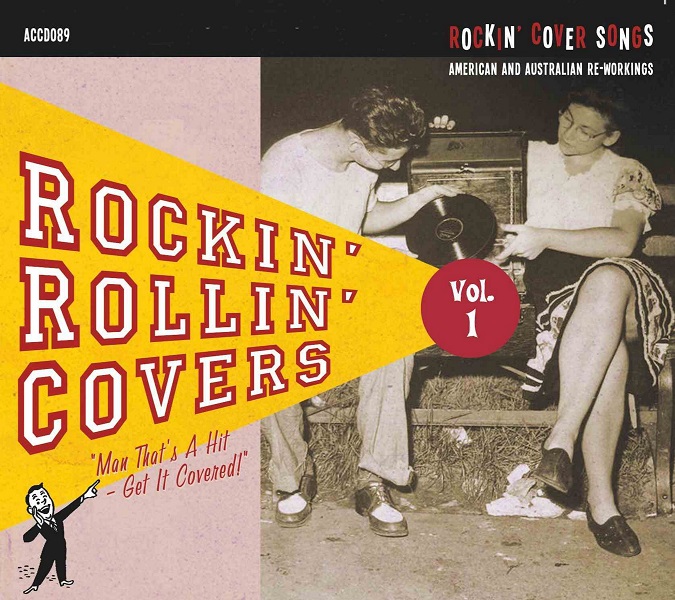 |
ROCKIN'
ROLLIN' COVERS VOL. 1
Van originals bestaat er slechts één echte originele
versie, maar covers kan je blijven opspitten en dat maakt het zo leuk.
Samensteller Mark Armstrong zocht er hier 30 bij elkaar en je moet
al uit goeden huize komen om die allemaal te kennen, laat staan te
hebben. Géén slappe opvullertjes made in Europa, schreeuwt
de promo, maar alleen Amerikaanse en Australische covers uit de tijdspanne
1952-1963. En Nieuw-Zeelandse, want daar kwamen The Keil Isles vandaan
wiens Boogie Boy white rock klinkt in vergelijking met Gene Vincent's
gepolijste origineel Be Bop Boogie Boy. Rock Me My Baby kent u als
een gedreven rocker van Buddy Holly, de versie van Dorothy Collins
is variété rock 'n' roll, en Rusty York komt een maatje
te kort om Peggy Sue te evenaren. This Little Girl Of Mine zal u wellicht
kennen van The Everly Brothers maar is eigenlijk van brother Ray Charles.
Hier hebben we recht op de krakende teenrock versie van The Half Brothers.
Een ander Everly Brothers nummer dat niet van de broertjes is is het
door Titus Turner geschreven Hey Doll Baby waarvan de eerste opname
gebeurde door The Clovers. De uitvoering hier door Ray & Lindy
uit 1957 is duidelijk geïnspireerd op Don en Phil. Titus Turner
zelf zou het pas opnemen in 1961! The Everly Brothers coverden ook
Little Richard's Lucille en Rip It Up maar zijn Long Tall Sally hebben
ze nooit opgenomen terwijl dat nummer toch door waarlijk iederéén
is gezongen. De versie hier door Johnny Otis is een noot voor noot
cover met ook vocaal een verbazingwekkende Little Richard imitatie.
Een andere onwaarschijnlijke soundalike is ene Ed Hardin die in One
Broken Heart For Sale zijn innerlijke Elvis channelt - dit moet wel
een budget cover geweest zijn, zoals de naam van het label, Hit Records,
al aangeeft. Big Joe Turner heeft veel originals op zijn naam maar
zijn gladgevijlde jive classic Corrine Corrina behoort daar niet toe,
want die gaat terug tot eind jaren '20 en is mogelijk zelfs een traditional.
Ook Hearts Made Of Stone is vaak gecoverd en de versie van The Fontane
Sisters klinkt als The Andrews Sisters in een zedig fifties cocktailjurkje.
Tot de covers die bekender zijn dan hun origineel behoort Tommy Blake's
Sun rockabilly classic Flat Foot Sam, oorspronkelijk van de zwarte
TV Slim in een beetje een Fats Domino stijl. Nog meer Sun is Warren
Smith's Ubangi Stomp door coveraar bij uitstek Jerry Lee Lewis, zijn
Rock 'n' Roll Ruby als uptempo rockabilly door Ted Daigle en Roy Orbison's
Down The Line als Ricky Nelson-billy. Post-Sun is Carl Perkins anno
1958 op Columbia met zijn rock 'n' roll interpretatie van Curtis Gordon's
semi-akoestische rockabilly Sittin' On Top Of The World. PS: Na lezing van deze recensie nam Mark Armstrong contact met ons op om de puntjes op de -i te zetten, en hij nam de moeite ons een aantal label shots te bezorgen die aantonen dat er destijds vaak - bewust of onbewust - niet al te nauw of correct werd omgesprongen met composer credits en er regelmatig andermans credits werden geclaimd, wat het mysterie rond I Ain't Givin' Up Nothing enkel verdiept. Johnny Olenn's Sally Let Your Bangs Hang is wat hem betreft tekstueel een vrije bewerking van de Bill Cox & Cliff Hobbs song, en dus wel degelijk een cover. Waarvan acte, waaraan wij graag nog toevoegen dat dat nu juist het leuke is aan dat graven in die covers. Bedankt Mark, en we kijken uit naar de volgende berg CD’s die je ongetwijfeld al aan het bekokstoven bent!
There
is only one first recording of a song, but you can keep digging up
covers and that's what makes covers so much fun. Compiler Mark Armstrong
collected 30 covers here and you're a lucky fellow if you know them
all, let alone have them all. No European fillers, the publicity claims,
but only American and Australian reworkings from 1952-1963. And from
New Zealand, because that's where The Keil Isles came from whose Boogie
Boy sounds white rock compared to Gene Vincent's polished original
Be Bop Boogie Boy. Rock Me My Baby is a great Buddy Holly rocker,
but Dorothy Collins' version is variety rock 'n' roll, and Rusty York
turns out to be a size short to court Peggy Sue. This Little Girl
Of Mine we know from The Everly Brothers but is actually from brother
Ray Charles. Here we're entitled to the crackling teen rock version
by The Half Brothers. Another Everly Brothers song not by the brothers
themselves is Hey Doll Baby written by Titus Turner and first committed
to wax by The Clovers. The 1957 version here by Ray & Lindy was
clearly inspired by Don and Phil. Titus Turner himself would not record
it until 1961! The Everly Brothers also covered Little Richard's Lucille
and Rip It Up but they never recorded his Long Tall Sally, a song
done by virtually everyone. The version here by Johnny Otis is a note-for-note
cover with also vocally an amazing Little Richard imitation. Another
incredible soundalike is one Ed Hardin channeling his inner Elvis
in One Broken Heart For Sale - this must have been a budget cover
as the name of the label, Hit Records, suggests. Big Joe Turner has
many originals to his name but his smooth jive classic Corrine Corrina
is not one of them, as it dates back to the late 1920s and may even
be a traditional. Hearts Made Of Stone has also been covered many
times and The Fontane Sisters' version sounds like The Andrews Sisters
in a decent 1950s cocktail dress. Among the covers that are more famous
than their original is Tommy Blake's Sun rockabilly classic Flat Foot
Sam, originally from black artist TV Slim in a bit of a Fats Domino
style. More Sun is provided in the form of Warren Smith's Ubangi Stomp
by cover artist par excellence Jerry Lee Lewis, Smith's Rock 'n' Roll
Ruby done as an uptempo rockabilly ditty by Ted Daigle and Roy Orbison's
Down The Line as Ricky Nelson-billy. Post-Sun is Carl Perkins in 1958
on Columbia with his rock 'n' roll interpretation of Curtis Gordon's
semi-acoustic rockabilly Sittin' On Top Of The World. PS: After reading this review Mark Armstrong contacted us to put the record straight, going through the trouble to include several label shots that show that at the time - consciously or unconsciously - composer credits were not handled carefully or correctly with people regularly claiming other writers' credits, which only adds to the mystery surrounding I Ain't Givin' Up Nothing. He considers Johnny Olenn to have borrowed the lyrics for his Sally Let Your Bangs Hang from the Bill Cox & Cliff Hobbs song, thus making it a cover. Duly noted, to which we like to add that this is exactly what makes digging into these covers so much fun. Thanks for taking the time Mark, and we're looking forward to the next truckload of CDs you're undoubtedly already cooking up! |
 |
ROCK
AND ROLL FLOOZY 1
Afgaande op hoes en titel verwachtte ik me aan zangeressen maar dat
is niet het geval: Good For Nothing Woman zoals de CD officieus heet
bevat volgens de achterflap "28 rockabilly en rock 'n' roll tracks
in jive, stroll en bop tempo, focussend op minder bekende artiesten
en songs". Dat geldt voor heel veel Atomicat reeksen maar is
wat deze CD betreft inderdaad de nagel op de kop want de paar bekende
namen die er op staan worden nu eens niet vertegenwoordigd door hun
bekendste songs. U moet immers al een serieuze fan zijn van Bobby
Vee om zijn vinnige gitaarinstrumental Flyin’ High in huis te
hebben, en dat geldt ook voor Johnny Rivers' stroll The Customary
Thing of Don Woody's Not I, veel minder in brede kring verspreid dan
zijn You're Barking Up The Wrong Tree, Bird Dog of Make Like A Rock
'n' Roll maar daar absoluut niet voor onderdoend. Toch zal het er
een beetje van afhangen hoeveel oude LP’s en CD’s u in
de kast hebt steken want bijna alle nummers stonden eerder al op White
Label, Collector, Buffalo Bop, Pan American, Saturday Night On Bop
Street, Grab This And Dance, Madness Invasion, Big Noise From The
Planet Bop, Killer Dillas, At The Rockhouse, The Chicken Are Rockin',
El Toro Collectors Choice, Wild Wild Rockin' en andere reeksen, wat
u gelijk een goed idee geeft wat hier muzikaal op het spel staat.
Wally Hughes' rockabilly stomper Convertible Car, Eddy Bell &
the Bel-Aires' uitstekende Lone Ranger rocker The Masked Man (Hi Yo
Silver), Wesley Reynolds's geflipte raket rocker Trip To The Moon
en Kip Tyler's nog steeds fantastische, dreigende She's My Witch zijn
zeker niet onbekend wegens al veelvuldig gecompileerd. Een stuk of
drie songs had ik nog nooit gehoord. Ik zeg dit niet om te pronken
met mijn kennis, maar om erop te wijzen dat wie veel van die reeksen
in huis heeft mogelijk een flink deel van de 28 tracks hier al heeft,
al moet u al een hardcore verzamelaar zijn om ze allemáál
te hebben. Nieuwe verzamelplaten met enkel "nieuw" materiaal
worden uiteraard mega zeldzaam (White Gospel Bangers en The Last Bastions
Of Rock 'n' Roll op Idle Cherub Records zijn de recentste) en als
we het positief willen uitdrukken kunnen we stellen dat deze CD, en
hopelijk ook de volgende vier volumes want dit wordt een reeks van
vijf, een soort Best Of is van alles wat ervoor kwam.
Based
upon the titel and the front cover illustration I was expecting female
singers but I was wrong: Good For Nothing Woman as the CD is unofficially
called contains according to the back cover "28 rockabilly and
rock 'n' roll tracks focussing on the lesser known artists and songs
in the jive, stroll and bop tempos". This of course goes for
several Atomicat series but rings especially true for this CD because
the few known names on here are for once not represented by their
most popular songs. You have to be a dedicated Bobby Vee fan to have
his nifty guitar instrumental Flyin' High in heavy rotation, and the
same goes for Johnny Rivers' stroll The Customary Thing or Don Woody's
Not I, much less widely circulated than his You're Barking Up The
Wrong Tree, Bird Dog or Make Like A Rock 'n' Roll but definitely not
inferior. Still it will depend on how many old LP’s and CDs
you have on your shelves because almost all of the songs have previously
appeared on White Label, Collector, Buffalo Bop, Pan American, Saturday
Night On Bop Street, Grab This And Dance, Madness Invasion, Big Noise
From The Planet Bop, Killer Dillas, At The Rockhouse, The Chicken
Are Rockin', El Toro Collectors Choice, Wild Wild Rockin' and other
series, which gives you a pretty good idea of what we're talking about
here musically. Wally Hughes' rockabilly stomper Convertible Car,
Eddy Bell & the Bel-Aires' excellent Lone Ranger rocker The Masked
Man (Hi Yo Silver), Wesley Reynolds' freaked out rocket rocker Trip
To The Moon and Kip Tyler's still fantastic sounding, menacing She's
My Witch are certainly not unfamiliar since they have been frequently
compiled. About three songs I had never heard before. I'm not saying
this to show off my knowledge, but to point out that those of you
who own many of these series may already have a good deal of the 28
tracks on offer, though you obviously have to be a hardcore collector
to have them all. New compilation albums with only "new"
material are becoming increasingly rare (White Gospel Bangers and
The Last Bastions Of Rock 'n' Roll on Idle Cherub Records spring to
mind as the most recent) and to put it more positively we could say
that this CD, and hopefully the next four volumes as well because
this will be a series of five, is like a Best Of everything that came
before. |
2 juni 2021
![]()
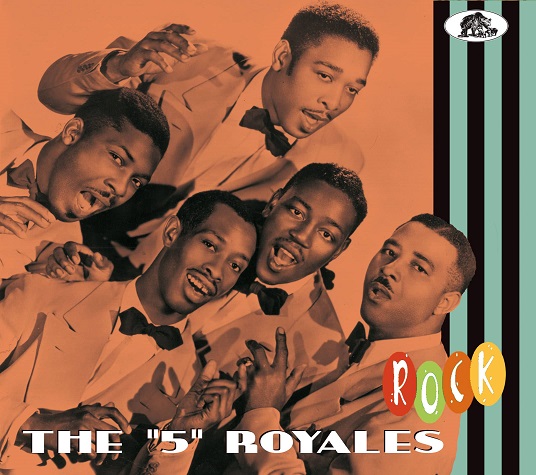 |
ROCK/ THE "5" ROYALES
Mijn favoriet "5" Royales nummer is The Real Thing uit 1958
wegens inderdaad, euh, de real thing, namelijk een aanstekelijke drive
en schitterende unisono samenzang, niet alleen in het refrein maar
het hele nummer lang, gladgeschaafd door jarenlang oefenen. Nog zo
eentje in dezelfde stijl hier is het door Ray Charles en Ike &
Tina Turner gecoverde Tell The Truth, en de CD doet zijn titel voorts
eer aan middels een flinke lading rock 'n' roll, doo-wop en jive als
I Ain't Getting Caught, (Baby) Take All Of Me, You Know I Know, What's
That, Mine Forevermore en het door zowel James Brown als Mick Jagger
gecoverde Think, gepuurd uit de omvangrijke output van The "5"
Royales - hun vierdubbele Real Gone CD The Complete Singles 1952-1962
met alle mogelijke "5" Royales vertakkingen bevat zo maar
eventjes 99 tracks! In tegenstelling tot sommige andere CD’s
in Bear Family's Rocks reeks waarin soms medium tempo werk en rockaballads
worden gesmokkeld is het hier van aanvang tot einde van de rappe,
met doo-wop en rock 'n' roll gedistilleerd uit de gospel waaruit The
"5" Royales ontsproten (Monkey Hips And Rice, Baby Don't
Do It), in den beginne vooral gebaseerd op jump blues swing (All Righty,
I Do, Laundromat Blues), soms met de prominente rhythm 'n' blues gitaar
van de lichtelijk fantastische Lowman Pauling (The Slummer The Slum,
It Hurts Inside), soms op strolltempo (Don't Give No More Than You
Can Take met zijn hypnotiserende gitaar), soms beïnvloed door
novelty (het indianenverhaal Mohawk Squaw), soms beïnvloed door
Caraïbische muziek en mambo (I Need Your Lovin' Baby), en uitmondend
in early sixties jivers (Messin' Up, I Could Love You, Goof Ball)
en early soul (I Want It Like That, (Something Moves Me) Within My
Heart, Catch That Teardrop). Ik wil u hier niet vervelen door álle
songtitels op te lijsten, maar het is duidelijk dat de groep vanaf
het begin in 1951 tot het definitieve einde in 1966 excelleerde in
alle stijlvormen waarmee de doo-wop zich conformeerde aan de evolutie
van de zwarte vocale muziek. Dit alles staat niet-chronologisch kris
kras door elkaar wat bij 31 tracks de broodnodige variatie geeft.
Het enige echt bekende nummer is The "5" Royales' originele
versie van Right Around The Corner, bij ons in 1985 Yaki Taki Oowah
van De Gigantjes. My
favorite "5" Royales song is The Real Thing from 1958 as
it's indeed, err, the real thing, a catchy drive and beautiful unison
vocals not only in the chorus but throughout the entire song, honed
by years of practice. Another one in the same style here is Tell The
Truth, covered by Ray Charles and Ike & Tina Turner, and the CD
certainly lives up to its title with a truckload of rock 'n' roll,
doo-wop and jive such as I Ain't Getting Caught, (Baby) Take All Of
Me, You Know I Know, What's That, Mine Forevermore and Think (covered
by both James Brown and Mick Jagger), culled from The "5"
Royales' extensive output - their Real Gone 4 CD The Complete Singles
1952-1962 with all possible "5" Royales spin offs contains
no less than 99 tracks! Unlike some of the other CDs in Bear Family's
Rocks series which sometimes smuggle in medium tempo work and rockaballads,
here it's pedal to the metal from start to finish with doo-wop and
rock 'n' roll distilled from the gospel from which The "5"
Royales came (Monkey Hips And Rice, Baby Don't Do It), at first based
primarily on jump blues swing (All Righty, I Do, Laundromat Blues),
sometimes with the prominent rhythm 'n' blues guitar of the utterly
fantastic Lowman Pauling (The Slummer The Slum, It Hurts Inside),
sometimes at a strolling pace (Don't Give No More Than You Can Take
with its hypnotic guitar), sometimes influenced by novelty (the Native
American tale Mohawk Squaw), sometimes influenced by Caribbean music
and mambo (I Need Your Lovin' Baby), and culminating in early sixties
jivers (Messin' Up, I Could Love You, Goof Ball) and early soul (I
Want It Like That, (Something Moves Me) Within My Heart, Catch That
Teardrop). I don't want to bore you by listing all the song titles,
but it's clear that from its emergence in 1951 until the definitive
end in 1966 the group mastered all the stylistic forms with which
doo-wop as a genre conformed to the evolution of black vocal music.
All these tunes are on here non-chronologically which adds a welcome
variety when you're talking 31 tracks. The most famous song is probably
The "5" Royales' original version of Right Around The Corner
which you might know as Yaki Taki Oowah. |
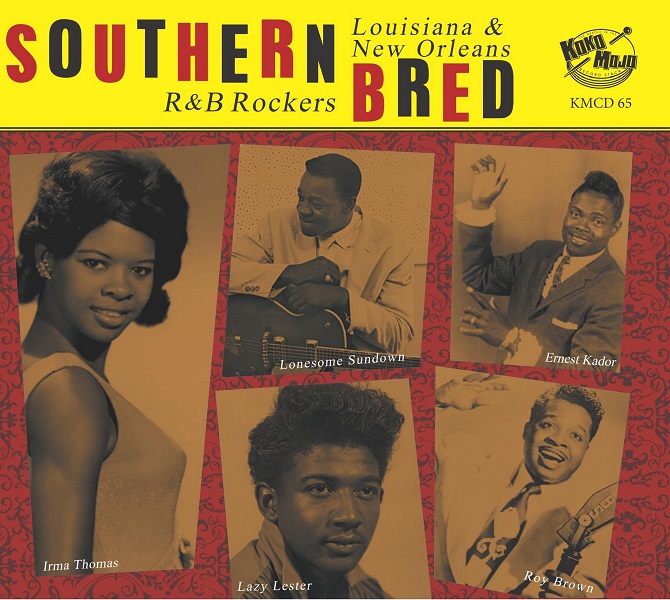 |
SOUTHERN
BRED:
Dit is de derde Southern Bred CD die de muzikale loep richt op Louisiana
en New Orleans, de grootste stad in de staat Louisiana maar niet de
hoofdstad, want dat is Baton Rouge. Beide zijn havensteden (de haven
van Zuid-Louisiana strekt zich 87 kilometer lang uit langs de Mississippi
rivier tussen New Orleans en Baton Rouge), maar New Orleans is uiteraard
dé muziekstad van de twee, ook al omdat ze daar weten wat feesten
is, denk maar aan het jaarlijkse mardi gras carnaval. De titelloze
en niet van een volume nummering voorziene Southern Bred CD’s
lijken zo hard op elkaar dat je al goed moet uitkijken dat je geen
twee keer dezelfde koopt. Sommige verzamelaars geven ze dan maar zelf
titels en naar deze, intussen al de vijftiende Southern Bred, wordt
soms gerefereerd als I Hate To See You Go naar het gelijknamige nummer
van Little Walter uit 1955. De in Louisiana geboren Little Walter
is een grote naam in de Chicago blues en I Hate To See You Go is inderdaad
mondharmonica blues en geen rock 'n' roll maar heeft wel een venijnig
stekende bluesbop angel waarvan ik me kan inbeelden dat de fanatici
er een stevig eind op kunnen wegboppen. Little Walter komt nog een
tweede keer langs met I Got To Go, mondharmonica bluesrock maar dit
keer geen bluesbop. Het bluesgehalte van deze CD valt gelukkig erg
goed mee want de nadruk ligt op zwarte rock 'n' roll van alle markten
thuis. Dat betekent vooral door rhythm 'n' blues jive beïnvloedde
rock 'n' roll met veel blazers (Blind Billy Tate's Love Is A Crazy
Thing, Smiley Lewis' Goin' To Jump And Shout, de immer vrolijke Roy
Brown reeds in 1950 met I Feel That Young Man's Rhythm), waarbij ook
wordt teruggegaan tot die rhythm 'n' blues jive zelf zoals in het
vocal harmony doo-woppende Later Baby van Fat Man Matthews & the
Four Kittens. In deze muziek zitten logischerwijs vaak rhythm 'n'
blues gitaren zoals in Rudy Green's No Need Of Your Crying en Edgar
Blanchard's instrumentale Let's Get It, en Mickey Champion's Good
For Nothin' Man is op zijn (of haar) beurt jazzy female rhythm 'n'
blues. Clarence “Gatemouth” Brown's Boogie Uproar, een
pittige gitaar instrumental met piano en trompet en flarden Down By
The Riverside, werd in 1980 in Engeland gecoverd door The Blue Cats
op hun titelloze debuut LP. Typische opgewekte New Orleans rock 'n'
roll is Calvin Spears' Come On Home, Charles Williams' So Worried
en The Gondoliers' charlestonnende You Call Everybody Darling. Nog
zo'n charleston rocker is Do Baby Do, in 1955 de eerste solo single
van Ernest Kador, de echte naam van Ernie K. Doe die in 1961 zou scoren
met Mother In Law. U merkt het: zoals op alle Koko Mojo CDs is samensteller
Mark Armstrong's selectie ook dit keer erg gevarieerd, want we horen
ook zowel rockende doo-wop (Joe The Grinder van The Hawks) als zwarte
rock 'n' roll met een stevige kick (Drifting Charles' Evil Hearted
Woman, Jay Nelson's Raise Some San) zij aan zij met swing, bijvoorbeeld
de onwaarschijnlijke Jackson Sloan soundalike Oscar McLollie met Take
Your Shoes Off Pop. Ook de semi-akoestische blues is een inspiratiebron
en zolang die nummers maar uptempo zijn is het okee voor ons, in onderhavig
geval Lonesome Sundown's I'm A Mojo Man. Als die blues dan ook nog
eens uptempo rockt tovert Lazy Lester's I'm A Lover Not A Fighter
(hier de Excello single versie uit 1958, niet de één
jaar oudere origineel onuitgegeven versie) een brede grijns op onze
tronie. Onverwoestbare klassiekers zijn Huey “Piano” Smith's
Don't You Just Know It, Roy Montrell's door The Stray Cats als Wild
Saxophone gecoverde That Mellow Saxophone en Richard Berry's door
Big Sandy gecoverde Yama Yama Pretty Mama. Richard Berry komt nog
twee keer langs start maar ontvangt geen geld met twee erg verschillende
nummers, Heaven On Wheels dat naast The Coasters heeft gelegen en
het al naar de sixties neigende I Want You To Be My Girl. Dat van
die sixties geldt evenzeer voor A Good Man van de latere soul queen
Irma Thomas, in 1960 een van haar allereerste singles maar die soul
zit er al wel degelijk in. Guitar Gable's Congo Mongo is dan weer
instrumentale rock 'n' roll mambo exotica.
This is the third Southern Bred pointing the musical magnifying glass
on Louisiana and New Orleans, the largest city in the state of Louisiana
but not the capital, that's Baton Rouge. Both are port cities (the
port of South Louisiana stretches 87 miles along the mighty Mississippi
between New Orleans and Baton Rouge), but New Orleans is obviously
the music city of the two, not least because they know how to throw
a darn good party, just think of the annual mardi gras carnival. The
untitled non-volume Southern Bred CDs are so similar that you have
to be careful not to buy the same one twice. Some collectors therefor
designate them with titles themselves and this one, Southern Bred
15 already, is sometimes referred to as I Hate To See You Go after
the 1955 Little Walter song of the same name. Louisiana-born Little
Walter is a big name in Chicago blues and I Hate To See You Go is
indeed harmonica blues and not rock 'n' roll but does have a vicious
blues bop sting that I can imagine fanatics can bop to for hours on
end. Little Walter drops by a second time with I Got To Go, harmonica
blues rock but no blues bop this time. Fortunately the CD's blues
content is limited and the emphasis is on black rock 'n' roll in all
possible styles, meaning mostly rhythm 'n' blues jive-influenced rock
'n' roll with lots of horns (Blind Billy Tate's Love Is A Crazy Thing,
Smiley Lewis' Goin' To Jump And Shout, the ever cheerful Roy Brown
as early as 1950 with I Feel That Young Man's Rhythm), also going
back to rhythm 'n' blues jive itself as in the vocal harmony doo-wopping
Later Baby by Fat Man Matthews & the Four Kittens. Logically this
music often contains rhythm 'n' blues guitars as in Rudy Green's No
Need Of Your Crying and Edgar Blanchard's instrumental Let's Get It,
while Mickey Champion's Good For Nothin' Man is jazzy female rhythm
'n' blues. Clarence "Gatemouth" Brown's Boogie Uproar, an
inspired guitar instrumental with piano and trumpet and snippets of
Down By The Riverside, was covered in the UK by The Blue Cats in 1980
on their self titled debut LP. Typical upbeat New Orleans rock 'n'
roll is Calvin Spears' Come On Home, Charles Williams' So Worried
and The Gondoliers' charleston influenced You Call Everybody Darling.
Another charleston rocker is Do Baby Do, in 1955 the first solo single
by Ernest Kador, the real name of Ernie K. Doe who would score in
1961 with Mother In Law. As on all Koko Mojo CDs compiler Mark Armstrong's
selection is very varied, and we also hear both rockin' doo-wop (The
Hawks' Joe The Grinder) and black rock 'n' roll with a savage kick
(Drifting Charles' Evil Hearted Woman, Jay Nelson's Raise Some San)
side by side with swing, for example the amazing Jackson Sloan soundalike
Oscar McLollie's Take Your Shoes Off Pop. Semi-acoustic blues is also
an inspiration and as long as that is uptempo it's fine with us, in
this case Lonesome Sundown's I'm A Mojo Man. And when the blues starts
rockin' Lazy Lester's I'm A Lover Not A Fighter (here the 1958 Excello
45 version, not the one year older originally unreleased version)
puts a wide grin on my face. Indestructible classics include Huey
"Piano" Smith's Don't You Just Know It, Roy Montrell's That
Mellow Saxophone which was covered by The Stray Cats as Wild Saxophone
and Richard Berry's Yama Yama Pretty Mama which was covered by Big
Sandy. Richard Berry passes Go again two times more but does not collect
200 $ with two very different songs, Heaven On Wheels which sounds
like it was hatched next to The Coasters and I Want You To Be My Girl
which leans toward the sixties. The sixties influence also applies
to future soul queen Irma Thomas' A Good Man, in 1960 one of her very
first singles but the soul is already present. Guitar Gable's Congo
Mongo is instrumental rock 'n' roll mambo exotica. |
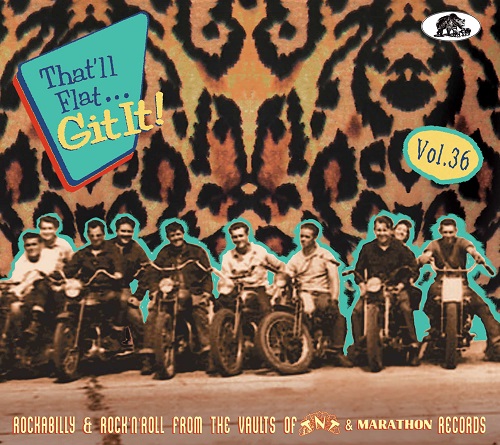 |
THAT’LL
FLAT GIT IT Vol. 36:
Hoewel ze ook blues van Lightnin' Hopkins en polka uitbrachten werd
TNT Records uit San Antonio, Texas in 1953 opgericht als hillbilly
label, waar al snel verandering in kwam toen de rock 'n' roll losbarstte.
TNT was niet bepaald een groot label maar een aantal van de 34 tracks
1955-1961 hier zullen u toch niet onbekend in de oren klinken. De
bekendste nummers zijn de debuutsingle van Ray Campi, de semi-akoestische
rockabilly classics Catapillar/ Play It Cool, maar ook The Traits
en Johnny Olenn hebben hun sporen nagelaten in de rock 'n' roll geschiedenis.
Johnny Olenn zat in 1956 in de film The Girl Can't Help It maar veroverde
vooral een plekje in ons hart toen hij in de jaren '80 werd opgevist
door de Nederlander Mac Bouvrie en een LP en verschillende singles
uitbracht op diens Mac label (B). Sally Let Your Bangs Hang (een eigen
compositie, niet het Maddox Brothers nummer), in 1955 Olenn's debuutsingle
die hij twee jaar later zou heropnemen voor zijn Liberty Records LP,
is variété rock 'n' roll gebaseerd op rhythm 'n' blues
swing. The Traits waren de groep van Roy Head en de CD bevat drie
kantjes van hun vijf TNT singles die verschenen als The Traits, dus
nog zonder Roy Head's naam erbij, terwijl hij het toch was die als
frontman vanaf 1965 zou uitgroeien tot een van de grootste blue eyed
soul rockers van de jaren '60. One More Time en Live It Up zijn zwierige
gedreven blanke gitaar rock 'n' roll, terwijl Don't Be Blue een bluesy
stroll met mondharmonica is. "Gedreven" is een adjectief
van toepassing op veel van de stuff hier met vurige blanke rock 'n
'roll attacks zoals het door blazers aangedreven wild om zich heen
toeterende Here I Come van Jimmy Dee & the Offbeats, op de CD
vertegenwoordigd met zes tracks waaronder het door Doug Sahm, Freddie
Fender (onder zijn echte naam Baldemar Huerta in het Spaans als Enriqueta)
en The Trashmen gecoverde Henrietta. I Feel Like Rockin' met Doug
Sahm op leadgitaar en het niet onbekende You're Late Miss Kate laten
in het saxwerk duidelijk de invloed van de muziek van Little Richard
horen, maar alle zes zijn ze even goed. Zowel You're Late Miss Kate
als Henrietta stonden in 1997 al op That'll Flat Git It Vol. 5: Rockabilly
& Rock 'n' Roll From The Vaults Of Dot Records omdat ze beide
door Dot op nationaal niveau werden heruitgebracht. Even opgehitst
als Jimmy Dee zijn de ook al stevig in het rond blazende Blue Notes
(I Love Her) en de onstuimige teenbilly Little Jeanie van The Delatones
die nog een tweede single uitbrachten op TNT die hier jammer genoeg
niet opstaat, want het refrein van die volledig in het Engels gezongen
doo-wop ballade bevat één Nederlandse zin die de titel
vormt van die single, namelijk Ik Heb Je Lief. Het nummer is geen
vertaling van een bestaand liedje maar een eigen compositie van de
groepsleden die allemaal Amerikaanse namen hebben, dus heeft er iemand
enig idee hoe die Ik Heb Je Lief in Texas terecht kwam? Nog meer gedreven
rock 'n' roll? Ga uw gangen met Bill Morrison's Set Me Free en Baby
Be Good! Chuck Goddard's Living Myself To Death is een sympathieke
piano rocker en Cecil Moore & the Notes leveren met Trapped een
dreigende stroll af, maar hun okee rocker I Got It Bad is niet spectaculair.
Er is echobilly met zangeres Dottie Jones (Honey Honey), bluegrassbilly
met de novelty Shut Your Big Fat Mouth van Joe B. & Charlie Davis,
door Johnny Cash geïnspireerde western-abilly met Ray Stone's
mooie China Doll, en boppin' hillbilly met Sandy Ford's Cat Man Boogie
(gepend door John Boren Axton, de jongste zoon van Heartbreak Hotel
mede-auteur Mae Axton), Jimmie Burton's Wild River, Jerry Dove &
his String Dusters' Pink Bow Tie (zang: Bill Massey) en I Ain't Got
Room To Rock van Glenn Reeves (die de demo van Heartbreak Hotel inzong
maar niet meeschreef aan dat nummer omdat hij de titel te dom vond)
dat zelfs een boppende sax in huis heeft. Ook country boogie kon TNT
blijkbaar prima slijten, getuige No Song To Sing, een vroege single
van de latere country ster Bill Anderson, Curley Lipham's Start Step
Stop Chop, het mooie My Ship Of Dreams van Leon Payne (componist van
Jim Reeves' I Love You Because en Hank Williams' Lost Highway en They'll
Never Take Her Love From Me), en Betty Barnes' middelmatige Pepinest
Pettinest Pappy. Evenmin de beste van de klas was Ray Liberto, de
oudere broer van Vivian Liberto, in 1954 de eerste echtgenote van
Johnny Cash. Je zou denken dat Liberto dan wel bij Sun Records zou
binnenraken, maar nee hoor. Nou, ik zou hem op basis van de aan swamp
pop schatplichtige piano boogie met platte sax Wicked Wicked Woman
evenmin een platencontract geven, waarbij het uiteraard niet helpt
dat het nummer zo dof klinkt. Zijn stop/start boogie I Want You To
Love Me Tonight klinkt meer New Orleans dan Texas maar is niet beter.
Even
though they also released blues by Lightnin' Hopkins and polka, TNT
Records based in San Antonio, Texas was founded in 1953 as a hillbilly
label, which quickly changed when rock 'n' roll broke loose. TNT was
not exactly a major label but some of the 34 tracks 1955-1961 here
will not sound unfamiliar. The best known tracks are Ray Campi's debut
45, the semi-acoustic rockabilly classics Catapillar / Play It Cool,
but also The Traits and Johnny Olenn have left their mark on rock
'n' roll history. Johnny Olenn was in the 1956 film The Girl Can't
Help It and enjoyed a revival when he was rediscovered by Mac Bouvrie
(NL) in the 1980s and released an LP and several singles on Bouvrie's
Mac label (B). His 1955 debut 45 here, Sally Let Your Bangs Hang (his
own composition, not the Maddox Brothers song) which he would re-record
two years later for his Liberty Records album, is variety rock 'n'
roll based on rhythm 'n' blues swing. The Traits were Roy Head's group
and the CD contains three sides from their five TNT singles that appeared
as The Traits without Roy Head's name on them, even though it was
Head who as their frontman in 1965 would become one of the greatest
blue eyed soul rockers of the 1960s. One More Time and Live It Up
are dazzling white guitar rock 'n' roll, while Don't Be Blue is a
bluesy stroll with mouth harp. "Dazzling" is an adjective
which applies to much of the stuff here with fierce white rock 'n'
roll attacks like the horn driven wild blowing Here I Come by Jimmy
Dee & the Offbeats, represented on the CD with six tracks including
Henrietta which was covered by Doug Sahm, Freddie Fender (under his
real name Baldemar Huerta in Spanish as Enriqueta) and The Trashmen.
I Feel Like Rockin' with Doug Sahm on lead guitar and the not unfamiliar
You're Late Miss Kate clearly show the influence of Little Richard's
music in the sax attacks, but all six are equally good. Both You're
Late Miss Kate and Henrietta were already on That'll Flat Git It Vol.
5: Rockabilly & Rock 'n' Roll From The Vaults Of Dot Records back
in 1997 as they were both reissued by Dot on a national level. Just
as excited and exciting as Jimmy Dee are the also briskly blasting
Blue Notes (I Love Her) and the rambunctious teenbilly Little Jeanie
by The Delatones who released a second 45 on TNT which unfortunately
is not included here, as the chorus of that doo-wop ballad contains
one sentence in Dutch which forms the title of that 45, namely Ik
Heb Je Lief. The song is not a translation of an existing song but
a composition by the group members who all have American names, so
does anyone have any idea how that Dutch sentence ended up in Texas?
You want more dazzling rock 'n' roll? Go ahead on with Bill Morrison's
Set Me Free and Baby Be Good! Chuck Goddard's Living Myself To Death
is a nice piano rocker and Cecil Moore & the Notes deliver a menacing
stroll with Trapped, but their okay rocker I Got It Bad is not spectacular.
There's echobilly with singer Dottie Jones (Honey Honey), bluegrass
billy with Joe B. & Charlie Davis' novelty Shut Your Big Fat Mouth,
Johnny Cash inspired western-abilly with Ray Stone's beautiful China
Doll, and boppin' hillbilly with Sandy Ford's Cat Man Boogie (penned
by John Boren Axton, the youngest son of Heartbreak Hotel co-author
Mae Axton), Jimmie Burton's Wild River, Jerry Dove & his String
Dusters' Pink Bow Tie (vocals: Bill Massey) and I Ain't Got Room To
Rock by Glenn Reeves (who sang on the Heartbreak Hotel demo but didn't
co-write that song because he thought the title was too silly) which
even features a boppin' sax. TNT apparently also did a lot of country
boogie, as evidenced by No Song To Sing, an early 45 by future country
star Bill Anderson, Curley Lipham's Start Step Stop Chop, the lovely
My Ship Of Dreams by Leon Payne (composer of Jim Reeves' I Love You
Because and Hank Williams' Lost Highway and They'll Never Take Her
Love From Me), and Betty Barnes' mediocre Pepinest Pettinest Pappy.
Also not the sharpest knife in the drawer was Ray Liberto, the older
brother of Vivian Liberto who in 1954 became Johnny Cash's first wife.
You'd think this would have been Liberto's way into Sun Records, but
nope. Well, I wouldn't sign him to a record deal on the basis of the
swamp pop influenced piano boogie with flat sax Wicked Wicked Woman
either, and it doesn't help that the sound is so muffled. His stop/start
boogie I Want You To Love Me Tonight sounds more New Orleans than
Texas but fares no better. |
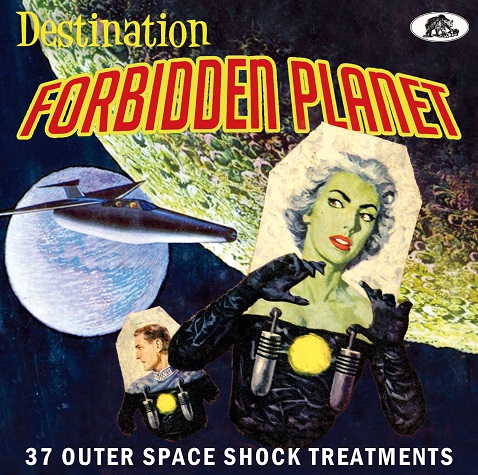 |
DESTINATION
FORBIDDEN PLANET
Forbidden Planet uit 1956 is een van de bekendste en beste SF films
uit de jaren '50 en deze thema CD is geheel gewijd aan science fiction.
Sci fi was in de jaren '50 erg populair in films en literatuur, enerzijds
ter vervanging van de oubollig wordende Universal horror films uit
de jaren '30 en de gothische griezelliteratuur die terugging tot de
negentiende eeuw, en anderzijds gevoed door de dreiging van de koude
oorlog, de space race tussen de Amerikanen en de Russen, en de UFO’s
die alomtegenwoordig waren in het luchtruim nadat het Amerikaanse
leger in 1947 claimde in Roswell, New Mexico een neergestorte vliegende
schotel te hebben geborgen, om dat bericht onmiddellijk weer tegen
te spreken - het was immers slechts een weerballon, weet u wel. Leuk:
als je het CD doosje opendoet staat op de CD het label gedrukt van
de Belgische Ronnex single Flying Saucers van Freddy Sunder, maar
daarover straks meer. Sommige van deze Bear Family thema CD’s
nemen het muzikaal niet zo nauw maar deze is puur rock 'n' roll met
een drietal zijstapjes naar de swing. Alle soorten rock 'n' roll komen
aan bod met big band swing jive (Destination Twenty-One Hundred And
Sixty-Five van The Cues met Jimmy Breedlove in de gelederen), Freddie
Montell's big band stroll (Ooey Gooey) Green Cheese, de jive van Don
Lang's Red Planet Rock, de teen rocker en Connie Francis cover Robot
Man van zangeres Jamie Horton, de flinke rock 'n' roll brok First
Man On Mars van Jackie Fautheree, de desperate echo rock 'n' roll
van Billy Mize's Planet Named Desire, dé outer space-abilly
bij uitstek Knocked Out Joint On Mars van Buck Trail, en uiteraard
dé UFO rockabilly classic bij uitstek, Flying Saucers Rock
'n' Roll van Billy Lee Riley en zijn kleine groene mannetjes. Zelfs
Louis Prima klom aan boord van de SF raket door een piepende satelliet
toe te voegen aan zijn Beep Beep. Het valt trouwens op dat de helft
van de nummers voorzien zijn van spacey geluidseffecten als piepende
satellieten, opstijgende raketten of op zijn minst een enorme echo
op de gitaar die de ruimtelijke oneindigheid moet suggereren. Welk
thema je ook aanboort, je vindt er altijd doo-wop songs over, en hier
zijn dat Johnny Greco's Rocket Ride, The Jive Five's People From Another
World en The Larks' big band jivende Rockin' In The Rocket Room. Dit
soort CD’s bevat ook steevast veel instrumentals omdat je op
een instrumental in principe eender welke titel kan plakken en het
volstond om er een paar geluidseffecten aan toe te voegen om de SF
context te accentueren: Winifred Atwell's Spaceship Boogie is een
uptempo tingel tangel piano boogie, Teacho & his Students' Rock-et
is een uptempo gitaar-/ saxstroll, Jimmie Haskell's Rockin' In The
Orbit (Space Satellite) is big band swing, Andy Dio & the Hi-Ways'
Satellite is uptempo big band boogie met piano, gitaar, trompet en
versnelde smurfenstemmetjes, Tony Hatch's Out Of This World is het
twangy thema van de gelijknamige niet bewaarde (er schijnt nog één
van de 13 afleveringen te bestaan) Britse TV reeks uit 1962 gepresenteerd
door horror icoon Boris Karloff, Billy Mure's Guitars In Space is
een rockende gitaarboogie met invloed van klassieke muziek, en nog
zo'n supersonische snarentovenaar is jazzgitarist George Barnes die
Moon Rocket opnam onder het pseudoniem Dean Hightower om zijn goede
reputatie niet te verbranden. Tot de instrumentale categorie zónder
SF sounds behoren de heavy surf van The Gamblers' Moon Dawg , Dave
& the Detomics' Detomic Orbit (uit 1965 maar dat is er niet aan
te horen) koppelt een rhythm 'n' blues gitaar aan een Johnny &
the Hurricanes orgeltje, en Pat & the Satellites klinken in Jupiter-C
als Link Wray die Be-Bop-A-Lula speelt met een Duane Eddy sax (King
Curtis!) thrown in the mix. Gelachen mag er met Bill Buchanan's The
Thing, hoempapa novelty met smurfenstemmetjes op een marsritme, en
er is nog meer gekheid op een stokje met Nervous Norvus' The Fang.
Je hoort believers als argument voor de betrouwbaarheid van UFO meldingen
wel eens hameren op het feit dat die ongeïdentificeerde vliegende
voorwerpen ook gezien worden door niet-verdachte ooggetuigen als piloten
en politieagenten, en naar analogie met die theorie zou je evenzeer
kunnen stellen dat UFO’s bestaan omdat er ook over werd gezongen
door serieuze artiesten als de volkomen respectabele Ella Fitzgerald
met het soft swingende beetje Andrews Sisters-achtige Two Little Men
In A Flying Saucer en Judy Garland die Purple People Eater covert
in crooner stijl op haar live LP At The Grove uit 1958. Jazzgitarist
Freddy Sunder was een Belg die vanaf 1953 rockende swing en boogie
opnam voor het Belgische Ronnex label met pionierende 78 toeren platen
als Calling Car Boogie. Ik herinner me zijn naam nog uit de tijd dat
Sunder dirigent was van het BRT Jazzorkest van de Vlaamse televisie
van 1981 tot de ontbinding in 1990. Ja, zo oud ben ik al, lieve lezertjes!
Zijn Flying Saucers hier uit 1955 is aanstekelijke soft jazz swing.
Forbidden
Planet from 1956 is one of the most popular and best SF films of the
1950s and this thematic CD is entirely devoted to science fiction.
Sci fi was very popular in movies and literature in the 1950s, on
the one hand replacing the Universal horror films from the 1930s that
were quickly becoming old fashioned and the gothic horror literature
that dated back to the nineteenth century, while on the other hand
fueled by the threat of the cold war, the space race between the Americans
and the Russians, and the UFOs that were ubiquitous in the skies after
the US military claimed to have recovered a crashed flying saucer
in Roswell, New Mexico in 1947, only to immediately retract that report
- after all it was just a weather balloon, you know. Some of these
Bear Family theme CDs musically go into all directions but this one
sticks to rock 'n' roll with three side steps into swing. All types
of rock 'n' roll are covered with big band swing jive (Destination
Twenty-One Hundred And Sixty-Five by The Cues whose personnel included
Jimmy Breedlove), Freddie Montell's big band stroll (Ooey Gooey) Green
Cheese, Don Lang's jiver Red Planet Rock, Jamie Horton's teen rocker
and Connie Francis cover Robot Man, Jackie Fautheree's hefty rock
'n' roll chunk First Man On Mars, the desperate echo rock 'n' roll
of Billy Mize's Planet Named Desire, Buck Trail's outer space-abilly
par excellence Knocked Out Joint On Mars, and of course the ultimate
UFO rockabilly classic, Flying Saucers Rock 'n' Roll by Billy Lee
Riley & his Little Green Men. Even Louis Prima boarded the SF
rocket by adding a beeping satellite to his Beep Beep. It's notable
that half of the songs feature spacey sound effects like beeping satellites,
rockets taking off, or at least a huge echo on the guitar suggesting
the infinity of space. Whatever the theme you'll always find doo-wop
songs about it, and here they are Johnny Greco's Rocket Ride, The
Jive Five's People From Another World and The Larks' big band jiving
Rockin' In The Rocket Room. This type of CD also always features a
lot of instrumentals because you could basically stick any title onto
an instrumental and it was enough to add a few sound effects to accentuate
the SF context: Winifred Atwell's Spaceship Boogie is an uptempo honky
tonky piano boogie, Teacho & his Students' Rock-et is an uptempo
guitar / sax stroll, Jimmie Haskell's Rockin' In The Orbit (Space
Satellite) is big band swing, Andy Dio & the Hi-Ways' Satellite
is uptempo big band boogie with piano, guitar, trumpet and sped up
chipmunk voices, Tony Hatch's Out Of This World is the twangy theme
from the 1962 British TV series of the same name presented by horror
icon Boris Karloff which has not been preserved for posteriority (apparently
only one of the 13 episodes survives), Billy Mure's Guitars In Space
is a rockin' guitar boogie influenced by classical music, and another
supersonic string wizard is jazz guitarist George Barnes who recorded
Moon Rocket under the pseudonym Dean Hightower so as not to ruin his
reputation. The instrumental category without SF sounds includes the
heavy surf of The Gamblers' Moon Dawg, Dave & the Detomics' Detomic
Orbit (from 1965 but you can't tell) couples a rhythm 'n' blues guitar
with a Johnny & the Hurricanes organ, and Pat & the Satellites'
Jupiter-C sounds like Link Wray playing Be-Bop-A-Lula with a Duane
Eddy sax thrown (King Curtis!) in the mix. Less serious is Bill Buchanan's
The Thing, polonaise novelty with chipmunk voices to a marching band
rhythm, and there's more mayhem with Nervous Norvus' The Fang. Believers
sometimes use the fact that unidentified flying objects are also seen
by serious eyewitnesses like pilots and police officers as an argument
for their existence, and by analogy one could argue that UFOs exist
because respected artists sang about them, such as Ella Fitzgerald
with the soft swinging Andrews Sisters-esque Two Little Men In A Flying
Saucer and Judy Garland who covered Purple People Eater in crooner
style on her 1958 live LP At The Grove. Jazz guitarist Freddy Sunder
was a Belgian who from 1953 onwards recorded rockin' swing and boogie
for Ronnex Records (B) with pioneering 78 RPM platters like Calling
Car Boogie. I remember his name from the time Sunder was conductor
of the Flemish television's BRT Jazz Orchestra from 1981 until its
dissolution in 1990. Yes, I am that old, dear readers! His Flying
Saucers from 1955 here is catchy soft jazz swing. |
26 mei 2021
![]()
Vinyl Recensies
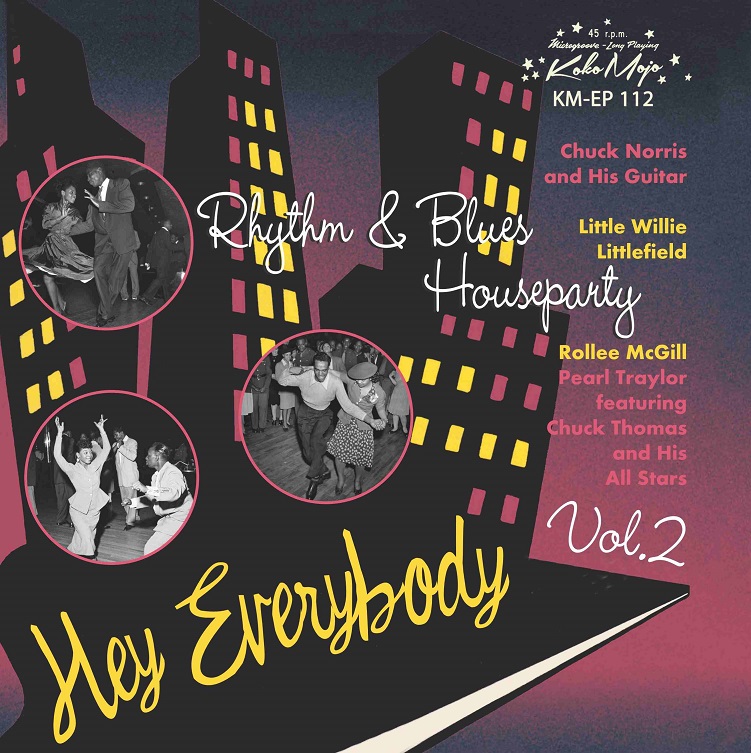 |
HEY
EVERYBODY:
2020 saw the release of My Babe KM-EP 108, volume 1 of this various artists vinyl EP with the common denominator that the four songs were covers. That is not the case now, although there is definitely a link between the four tracks on volume 2. If you know that link purely on the basis of the song titles and the artists then you know more about the black roots of rock 'n' roll than we do! Volume 2 contains three tracks from 1950 + one from 1955 and opens with Chuck Norris' Hey Everybody, medium tempo black stop/start pré-rock 'n' roll with horns, piano and rhythm 'n' blues guitar, the kind of song where the first time you think "nothing special" but after hearing it five times the addiction kicks in. The only known artist is pianist Little Willie Littlefield who recorded the original version of Kansas City in 1952 under the title KC Loving. Hit The Road here is two years older, faster than Chuck Norris' Hey Everybody, and boogies nicely along against the background of a small arsenal of horns and a rhythm 'n' blues guitar that pours more gasoline on the fire. Rollee McGill's Rhythm Rockin' Blues, the only 1955 track, is essentially the exact same music with a boogie-ing piano and horns blowing against each other but played tighter with a straight ahead drumbeat, a more rockin' guitar and a bumping baritone sax. Rock 'n' roll! Final track Come On Daddy (Let's Go Play Tonight) by female singer Pearl Traylor, again from 1950, obviously sounds a few years older and is more rhythm 'n' blues boogie oriented with a full band consisting of horns, piano and guitar, basically again the same ingredients as the first two songs but the prominent trumpet makes for a more rhythm 'n' blues big band rendition. The link between the four songs is that they all feature Chuck Norris on guitar, and the accompanying orchestra on Come On Daddy, Chuck Thomas & his All Stars, is again Chuck Norris. A second link, in common with volume 1, is that the four tracks are very worthwhile - if you dig what I call rhythm 'n' blues, namely the black precursor of rock 'n' roll, with one real rock 'n' roll song on top, unlike volume 1 which despite the title contained no rhythm 'n' blues but doo-wop and medium tempo big band swing jive. Info: www.vintagerockinroots.com (Frantic Franky) |
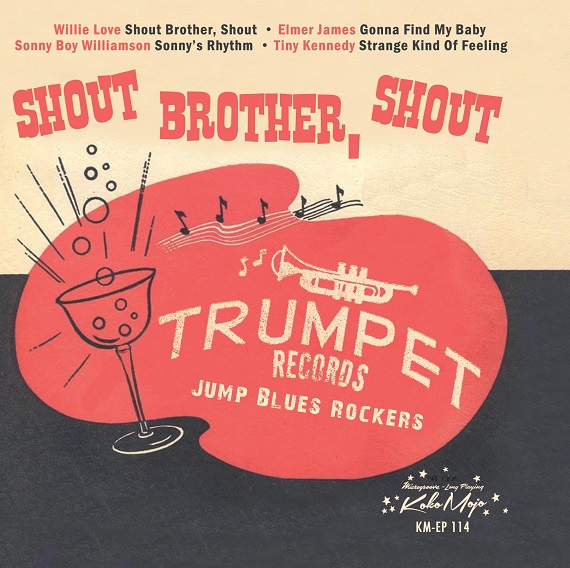 |
SHOUT
BROTHER SHOUT Vinyl EP met vier nummers uitgebracht op Trumpet Records, een klein platenlabel gevestigd in Jackson, Mississippi dat bestond van 1951 tot 1956 en vooral bluesballades, jump blues, boogie woogie, rhythm 'n' blues en gospel uitbracht, met als bekendste nummer misschien Elmore James' originele Dust My Broom. Daarnaast was Trumpet ook het eerste label dat mondharmonicaspeler Sonny Boy Williamson II opnam en hij is een van de artiesten op deze EP. Willie Love's Shout Brother Shout (1953) heeft als hoofdinstrument een boogie piano, wordt begeleid door een platte sax en een drumstel dat er maar wat op los mept, en ik hoor veel handclaps op de maat: de informele setting van een gospel in de kerkgemeenschap. Het nummer is inderdaad een jam-achtige kruis(ig)ing tussen rockende rhythm 'n' blues en gospel, totaal pretentieloos maar juist daardoor bezit het een ontwapenende charme. Dit is een alternatieve versie, misschien een eerste, nog niet zo gestroomlijnde opwarming? Elmer James' Gonna Find My Baby is primitieve semi-akoestische blues maar dan elektrisch versterkt. Ik hoor een elektrische gitaar, een dof plukkende contrabas en een friemelende mondharmonica (Sonny Boy Williamson II). Elmer James is een pseudoniem, niet van Elmore James maar van Arthur "Big Boy" Crudup die de originele versie opnam van de door Elvis op Sun Records gecoverde songs That's All Right (1946) en My Baby Left Me (1950), maar deze Gonna Find My Baby (1952) kon niet verder verwijderd zijn van die twee nummers. Het is één van de twee alternatieve takes met prominentere mondharmonica die bij weten voor het eerst verschenen in 2001 op een Japanse CD. Sonny Boy Williamson II mag ook zelf in het spotlicht treden met de uptempo mondharmonica instrumental Sonny's Rhythm (1953) tegen een achtergrond van blazers en piano die ook weer die jubelende gospelsfeer hebben - de mondharmonica zelf niet - met solos op sax en op rhythm 'n' blues gitaar, en uiteindelijk sax, gitaar en mondharmonica die elkaar in een duel de loef proberen af te steken. Op het hoesje van deze EP staat vermeld "jump blues rockers", maar mijn inziens de enige echte jump blues rocker is Tiny Kennedy's Strange Kind Of Feeling dat u wellicht kent van de snellere rocka-hillbilly versie van Eddie Dugosh. Stel u zijn Strange Kinda Feeling voor met blazers en gezongen door een blues shouter en u hebt een idee hoe het hier klinkt. Het nummer werd trouwens opgenomen in de Sun studio, al valt dat er niet aan te horen - verbazingwekkend hoe ze acht muzikanten daar hebben binnen gekregen want met zoveel spelen en zingen ze hier mee. Kennedy, een zwaargewicht als ik zijn foto bekijk, nam het nummer drie jaar later opnieuw op voor RCA sublabel Groove in een meer Big Joe Turner gerichte stijl, maar dit is de originele Trumpet versie uit 1952. Samenvatting: geen rock 'n' roll uitgezonderd Strange Kind Of Feeling, maar pure onversneden rhythm 'n' blues en gospel. Info: www.vintagerockinroots.com (Frantic Franky) Vinyl
EP with four tracks from Trumpet Records, a small label based in Jackson,
Mississippi that existed from 1951 to 1956 and released mostly blues
ballads, jump blues, boogie woogie, rhythm 'n' blues and gospel, its
most famous song probably being Elmore James' original Dust My Broom.
Trumpet was also the first label to record harmonica player Sonny
Boy Williamson II and he is one of the artists on this EP. The main
instrument on Willie Love's Shout Brother Shout (1953) is a boogie
piano accompanied by a flat sounding sax and a drummer who's just
whacking away, and I hear a lot of handclaps on the beat - the informal
setting of a gospel in the church community. Indeed the song sounds
like a jam session between rockin' rhythm 'n' blues and gospel, totally
unpretentious but for that very reason the song benefits from a disarming
charm. This is an alternative version, perhaps a first, not yet so
streamlined warm up? Elmer James' Gonna Find My Baby is primitive
semi-acoustic blues but electrically amplified. I hear an electric
guitar, a muffled double bass and a harmonica blowing its way through
(Sonny Boy Williamson II). Elmer James is a pseudonym, not of Elmore
James but of Arthur "Big Boy" Crudup who recorded the original
versions of both That's All Right (1946) and My Baby Left Me (1950)
as covered by Elvis at Sun Records, but this Gonna Find My Baby (1952)
couldn't be further removed from those two songs. It is one of two
alternate takes with more prominent mouth harp that to our knowledge
first appeared on a Japanese CD in 2001. Sonny Boy Williamson II steps
into the spotlight with his uptempo harmonica instrumental Sonny's
Rhythm (1953) against a backdrop of horns and piano that again display
that jubilant gospel atmosphere - the harmonica itself does not -
with solos on sax and on rhythm 'n' blues guitar before the sax, guitar
and harmonica try to outdo each other in a duel. The cover of the
EP states "jump blues rockers", but in my opinion the only
real jump blues rocker is Tiny Kennedy's Strange Kind Of Feeling which
you may know from the faster rocka-hillbilly version by Eddie Dugosh:
imagine his Strange Kinda Feeling with horns and sung by a blues shouter
and you have an idea what it sounds like here. The song was recorded
at the Sun studio by the way, though you can't tell by the sound,
and it's amazing how they managed to squeeze eight musicians in there
because that's how many of them play and sing on this. Kennedy, a
heavyweight by the look of his picture, re-recorded the song three
years later for RCA sublabel Groove in a more Big Joe Turner oriented
style, but this is the original Trumpet version from 1952. Summary:
no rock 'n' roll except Strange Kind Of Feeling, but pure unadulterated
rhythm 'n' blues and gospel. |
![]()
CD Recensies
|
|
ROCK,
SOUL AND ROLL/ LARRY WILLIAMS Larry Williams was de Bad Boy van de rock 'n' roll, niet alleen omdat hij een nummer met die titel heeft maar vooral omdat hij bijverdiende als pooier, iets te recreatief omsprong met het gebruik en de verkoop van drugs, daardoor vanaf 1961 anderhalf jaar in de cel zat, en zich in 1980 op zijn 44ste een kogel door het hoofd schoot. Of werd ie dan toch vermoord? Zonde van het talent, luister maar naar de 30 tracks op deze CD die al zijn Specialty en Chess singles tot aan zijn celstraf bevat en vergelijkbaar is met de in 2017 verschenen Acrobat CD The Complete Releases 1957-1961 die nog twee LP tracks extra bevat, Make A Little Love en de Lloyd Price cover Lawdy Miss Clawdy. Of vraag het anders aan The Beatles die Slow Down, Dizzy Miss Lizzy en Bad Boy coverden (en John Lennon, de rockendste Beatle, coverde dan nog eens apart Bony Moronie en Dizzy Miss Lizzy), en Beatles rivalen The Rolling Stones coverden het minder bekende door Roddy Jackson samen met Sonny Bono gecomponeerde She Said Yeah. Williams had in 1957 één single uit op Specialty Records toen hun kip met de gouden eieren Little Richard voor het zingen de kerk inging en Williams werd in allerijl geherpositioneerd als zijn vervanger, en zijn tweede single Short Fat Fannie bevatte naast referenties naar andere rock 'n' roll hits niet toevallig de gevleugelde zinsnede “I was slippin' and slidin' with Long Tall Sally”. De prijsstieren zijn hier uiteraard Short Fat Fannie, de jiver Bony Moronie (hier op de correcte snelheid, niet de foutief versnelde versie die in Engeland verscheen), de rock 'n' roll screamers Slow Down en Dizzy Miss Lizzy met piano en saxofoons geschreeuwd met een overslaande stem die op het punt staat te breken, en de Coasters-achtige stroll Bad Boy met zijn diepe "he's a bad boy" die verdacht veel lijkt op "he's a bird" uit Bird Dog van The Everly Brothers. Opgewekte New Orleans rockers zijn You Bug Me Baby, The Dummy, Peaches And Cream en She Said Yeah, medium tempo pianowerk met een leger luie blazers is Hootchy-Koo, en High School Dance en de Lloyd Price cover Just Because (Williams was een neef van Lloyd Price) zijn typische moerassige New Orleans ballades. Het heeft allemaal ook veel weg van de in Zuidwest-Louisiana en Zuidoost-Texas mateloos populaire swamp pop, bijvoorbeeld de ballade I Was A Fool. En hoe zit het met die soul uit de titel? Het medium tempo Let Me Tell You Baby (melodiegewijs een trage Dizzy Miss Lizzy) van Williams' debuutsingle, nochtans uit 1957 en voorzien van een bluesy gitaar, is verrassend genoeg inderdaad vroege soul, maar het zijn vooral de latere Specialty singles en de Chess singles zoals de poprock nummers Steal A Little Kiss, Get Ready, Baby Baby, Like A Gentleman Oughta, Oh Baby, I Hear My Baby, Fresh Out Of Tears, I Can't Stop Lovin' You (niet het Ray Charles nummer) en het op een vraag/antwoord gospel patroon gebaseerde Give Me Love die inderdaad flirten met wat de soul zou gaan worden, en hoewel dat geen Slow Down's zijn blijven ze door hun frisheid aangenaam om terug te horen. Ook in ballades als Teardrops en het van een dwarsfluit voorziene My Baby's Got Soul zit dat al voor een stuk. De occasionele sixties rocker (Lawdy Mama) en doorslagjes (horen we in Little School Girl en het poppy Ting-A-Ling niet opnieuw Dizzy Miss Lizzy? ) ontbreken echter niet. Wat vanwege de rechten wel ontbreekt zijn destijds onuitgebrachte Specialty rockers als de Little Richard cover Heeby Jeebies en northern soul tracks als Too Late (een duet met Johnny "Guitar" Watson) uit 1967. Van zwarte rock 'n' roll naar teen rock en early soul, da's zo'n beetje de samenvatting van deze CD waarvan de tweede helft nagenoeg volledig tot die tweede en derde categorie behoort. Wie het daar niet zo voor heeft is beter af met de Larry Williams CDs op Ace die zich specialiseren in het Specialty werk en ook heel wat onuitgegeven materiaal en alternatieve takes bevatten. Hou er ook rekening mee dat de Chess tracks een wat minder scherpe geluidskwaliteit hebben. Info: www.jasmine-records.co.uk (Frantic Franky)
Larry Williams was the Bad Boy of rock 'n' roll, not only because he has a song with that title but mainly because he pimped on the side, was a bit too recreational in the use and sale of drugs, as a result got himself in 1961 an 18 month jail sentence, and shot himself through the head in 1980 at the age of 44. Or was it murder after all? Shame as he had a lot of talent, just listen to the 30 tracks on this CD containing all his Specialty and Chess singles up to his prison sentence and comparable to the 2017 Acrobat CD The Complete Releases 1957-1961 which contains two more LP tracks, Make A Little Love and the Lloyd Price cover Lawdy Miss Clawdy. Or ask The Beatles who covered his Slow Down, Dizzy Miss Lizzy and Bad Boy (and John Lennon, the rockinest Beatle, separately covered Bony Moronie and Dizzy Miss Lizzy), while Beatles rivals The Rolling Stones covered the lesser known She Said Yeah composed by Roddy Jackson and Sonny Bono. In 1957 Williams had one single out on Specialty Records when their goose with the golden eggs Little Richard went religious and Williams was hastily repositioned as his replacement, so it's probably no coincidence that his second single Short Fat Fannie included the line "I was slippin' and slidin' with Long Tall Sally" in addition to several other references to other rock 'n' roll hits. The prize cows here are obviously Short Fat Fannie, the jiver Bony Moronie (here at the correct speed, not the sped-up version that appeared in England), the rock 'n' roll screamers Slow Down and Dizzy Miss Lizzy with piano and saxophones shouted with a voice about to break, and the Coasters-like stroll Bad Boy with its deep "he's a bad boy" that sounds suspiciously like "he's a bird" from The Everly Brothers' Bird Dog. Upbeat New Orleans rockers are You Bug Me Baby, The Dummy, Peaches And Cream and She Said Yeah, medium tempo piano with an army of lazy horns is Hootchy-Koo, and High School Dance and the Lloyd Price cover Just Because (Williams was a cousin of Lloyd Price) are typical swampy New Orleans ballads. It's all also very similar to the swamp pop that was immensely popular in Southwest Louisiana and Southeast Texas, for example the ballad I Was A Fool. So what about the soul mentioned in the title? The medium tempo Let Me Tell You Baby (melody-wise a slow Dizzy Miss Lizzy) from Williams' debut single, although from 1957 and featuring a bluesy guitar, sounds indeed surprisingly early soul, but it's mainly the later Specialty singles and the Chess singles such as the pop rock numbers Steal A Little Kiss, Get Ready, Baby Baby, Like A Gentleman Oughta, Oh Baby, I Hear My Baby, Fresh Out Of Tears, I Can't Stop Lovin' You (not the Ray Charles song) and the question/answer gospel pattern based Give Me Love that flirt with what would become soul. While not Slow Down's they're still pleasant to hear again because of their freshness. You can also hear it in ballads like My Baby's Got Soul with flute and Teardrops. The occasional sixties rocker (Lawdy Mama) and copycats (can't we hear Dizzy Miss Lizzy in Little School Girl and the poppy Ting-A-Ling? ) are not absent either. What is missing due to the copyrights are originally unreleased Specialty rockers like the Little Richard cover Heeby Jeebies and northern soul tracks like Too Late (a duet with Johnny "Guitar" Watson) from 1967. From black rock 'n' roll to teen rock and early soul, that's more or less the summary of this CD of which the second half belongs almost entirely to the second and third category. If you're not into that, you're better off with the Larry Williams CDs on Ace that specialize in the Specialty recordings and contain a wealth of unreleased material and alternative takes. Also keep in mind that the Chess tracks here have a somewhat poorer sound quality. Info: www.jasmine-records.co.uk (Frantic Franky) |
|
|
KISSES
SWEETER THAN HONEYCOMB/ In januari 2021 hebben wij uitgebreid aandacht besteed aan het overlijden op 87-jarige leeftijd van Jimmie Rodgers, hitmaker van Honeycomb (een cover trouwens, het origineel is een vier jaar ouder B-kantje in Frankie Laine westernstijl van crooner Georgie Shaw) en Kisses Sweeter Than Wine, twee onweerstaanbare lichtvoetige poppareltjes en daarmee perfecte teen rock. Wat we toen vooral onthielden was dat Rodgers daarna voornamelijk folk zong, dus we waren ten zeerste benieuwd naar deze CD, met zijn royale 32 tracks slechts een heel beperkte selectie uit Rodgers' bijzonder omvangrijke discografie die meer dan 20 Top 100 noteringen bevat. De eerste verrassing is Rodgers' debuutsingle uit 1956 (hier bij ons weten voor het eerst op CD, staat zelfs niet op de in 2015 verschenen Acrobat dubbel CD The Complete US & UK Singles As & Bs 1957-62), want I Won't Sing Rock 'n' Roll is hele ouderwets klinkende piano cocktail variété vermengd met boogie woogie en een oubollige dubbele sax solo die vreemd genoeg gaat over het feit dat je hem niet moet vragen rock 'n' roll te zingen omdat "go cat go zijn soul tormenteert". Geen idee wat de achtergrond was maar het is veelzeggend qua standpunt in het licht van wat zou volgen. De B-kant klinkt nog ouderwetscher: I Always Knew had evengoed uit het variété ten tijde van de tweede wereldoorlog kunnen stammen. Dat hier met Oh Oh I'm Falling In Love Again en Bimbombey enkele nummers in de stijl van Honeycomb en Kisses Sweeter Than Wine opstaan is logisch, maar de meeste nummers situeren zich in de brave teen rock (Make Me A Miracle, Are You Really Mine, I'm Never Gonna Tell), de pop (Ring-A-Ling-A-Lario) en de ballades (Secretly, Because You're Young, When Love Is Young). Soms zit daar een western sfeertje in (The Wizard, Girl In The Wood, Wonderful You, TLC Tender Love And Care, Waltzing Mathilda) maar ik hoor vokaal ook echos van Harry Belafonte's calypsos. The Long Hot Summer is het thema uit de gelijknamige Paul Newman film en klinkt inderdaad als easy listening pop filmmuziek. Rodgers nam ook kerstmuziek op maar het enige kerstliedje hier is de uptempo kinder popsong Wistful Willie, en van zijn gospels horen we enkel Just A Closer Walk With Thee waarin Elvis weerklinkt, Joshua Fit The Battle O' Jericho en het uptempo Woman From Liberia dat klinkt als een sneller Kisses Sweeter Than Wine. Deze muzikale smeltkroes evolueert inderdaad naar wat later de folk zou worden, maar dan een op maat van de popmarkt gesneden her-interpretatie van de semi-akoestische vokale hoogstandjes van The Weavers (originele uitvoerders van Kisses Sweeter Than Wine), The Kingston Trio en The Brothers Four, niet zoals de western epossen van Johnny Horton en niet zoals wat Bob Dylan later zou neuzelen. Wat niét op de CD staat is Rodgers' Bo Diddley (geen Bo Diddley cover maar gebaseerd op het kinderliedje Hush Little Baby), zijn croonerversie van Love Letters In The Sand, de softrocker Froggy Went A-Courtin', St. James Infirmary en Rhumba Boogie. Niets daarvan is onmisbaar, maar die nummers hadden hier zeker in de plaats gemogen van sommige van de toch vrij standaard pop songs, want de CD zoals ie nu is nodigt hniet uit tot het verder exploreren van Rodgers' oeuvre. Dit is kwaliteit, maar in een genre ver verwijderd van rock 'n' roll waar je echt wel voor moet zijn. Alleen had dat hoesje wat mooier gekund. Info: www.jasmine-records.co.uk (Frantic Franky)
In January 2021 we extensively covered the death at the age of 87 of Jimmie Rodgers, hitmaker of Honeycomb (a cover by the way, the original being a four year older Frankie Laine styled B-side by crooner Georgie Shaw) and Kisses Sweeter Than Wine, two irresistible lighthearted pop gems and therefor perfect teen rock. What I mostly remember from our obituary is that Rodgers later specialised in folk music, so we were rather curious about this CD, with its generous 32 tracks representing only a very limited selection from Rodgers' extremely extensive discography that includes more than 20 Top 100 entries. The first surprise is Rodgers' debut single from 1956 (here to our knowledge for the first time on CD, it's not even on Rodgers' 2015 Acrobat double CD The Complete US & UK Singles As & Bs 1957-62), as I Won't Sing Rock 'n' Roll is very old fashioned sounding piano cocktail variety mixed with boogie woogie and a corny double sax solo that is oddly enough about the fact that you shouldn't ask him to sing rock 'n' roll because "go cat go torments my soul". No idea what the background was but it says a lot in terms of what was to follow. Its B-side sounds even more old fashioned: I Always Knew might as well have been recorded in the variety shows at the time of the second world war. Less of a surprise is that with Oh Oh I'm Falling In Love Again and Bimbombey the CD contains a couple of Honeycomb and Kisses Sweeter Than Wine styled songs, but the bulk is civilised teen rock (Make Me A Miracle, Are You Really Mine, I'm Never Gonna Tell), pop (Ring-A-Ling-A-Lario) and ballads (Secretly, Because You're Young, When Love Is Young). Sometimes these have a western vibe (The Wizard, Girl In The Wood, Wonderful You, TLC Tender Love And Care, Waltzing Mathilda) but vocally I also hear touches of Harry Belafonte's calypsos. The Long Hot Summer is the theme from the Paul Newman film of the same name and does sound like easy listening pop film music. Rodgers also recorded christmas music but the only christmas song here is the uptempo children's pop song Wistful Willie, and of his gospels we only hear Just A Closer Walk With Thee which echoes Elvis, Joshua Fit The Battle O' Jericho and the uptempo Woman From Liberia which is like a faster Kisses Sweeter Than Wine. This musical melting pot indeed evolves into what would later become folk, but folk in the form of a re-interpretation aimed at the pop market of the semi-acoustic vocal stylings of The Weavers (original performers of Kisses Sweeter Than Wine), The Kingston Trio and The Brothers Four, not like Johnny Horton's western epics and not like what Bob Dylan would mumble. What is not on the CD is Rodgers' Bo Diddley (not a Bo Diddley cover but based on the children's song Hush Little Baby), his crooner version of Love Letters In The Sand, the soft rocker Froggy Went A-Courtin', St. James Infirmary and Rhumba Boogie. None of these are indispensable, but they would have been a welcome change for some of the fairly standard pop songs here, because unfortunately the CD as it is does not induce further exploration of Rodgers' oeuvre. This is quality, but in a genre far removed from rock 'n' roll which one really has to appreciate. And the cover would have benefitted from a cool photo. Info: www.jasmine-records.co.uk (Frantic Franky) |
|
|
UP
ON THE ROOF/ KENNY LYNCH Ik ken de in 2019 op 81-jarige leeftijd aan kanker overleden Kenny Lynch alleen van zijn verschijning in de Britse horror film Dr. Terror's House Of Horrors uit 1965 met Christopher Lee en Peter Cushing waarin hij twee liedjes zingt. Eén daarvan, de beschaafd swingende crooner Give Me Love, staat op deze CD en dat is wat me over de streep trok, ook al staat het andere, de calypso Everybody's Got Love, hier niét op. Voor de rest wist ik enkel dat Lynch in Engeland een aantal hits scoorde en daar een jarenlange succesvolle muziekcarrière aan overhield, maar dat het was het dan ook. Alle nummers hier, al dan niet met vioolpartijen, vallen onder de noemer van wat ik Cliff Richard pop noem, popmuziek zoals ze begin jaren '60 niet enkel door Cliff Richard maar door zowat alle Engelse zangers en zangeressen aan de lopende band werd gefabriceerd, de tijd toen The Beatles en The Rolling Stones eraan zaten te komen terwijl de eerste generatie Britse rockers niet beter wist dan op de swingende variété pop tour te gaan, niet alleen Cliff Richard maar ook Billy Fury, Tommy Steele, Adam Faith, John Leyton, Shane Fenton, noem ze maar op. Twee covers hier die u een idee geven van die muziekstijl: Up On The Roof van The Drifters en het minder bekende Slowcoach, een medium tempo western swing accordeon crooner van Pee Wee King. Strolling Blues is geen stroll en geen blues maar pure pop voorzien van een Floyd Cramer piano, en mensen into muziekfilms kennen uit Just For Fun (1963) misschien Lynch's Crazy Crazes dat Chubby Checker, Little Eva, de hully gully en de madison vernoemt en met zijn orgeltje net als Puff (Up In Smoke) de vroege psychedelische sixties vooraankondigt. It Had Better Be A Wonderful Lie en I'm Not That Sort Of Girl (dat laatste op een twist melodie) zijn novelty met een plat Londens (denk ik) cockney accent die me dan weer doen denken aan een Cliff Richard film als Summer Holiday, dat soort humor. Jammer genoeg ontbreekt You Can Never Stop Me Loving You, niet omdat dat zo'n fantastisch nummer is maar omdat we dan beide kantjes van zijn eerste negen His Master's Voice singles 1960-1962 netjes op een rijtje hadden gehad. Ook zijn debuutsingle Splish Splash uit 1958 ontbreekt. Bert Weedon's Twist Me Pretty Baby uit 1962 met Lynch op zang en "shouts" (zo stond het op het label) had sympathiek geweest maar die staat dan weer op de recente C'Mon Let's Do The British Twist various artists Jasmine CD. Een interessante cover die ontbreekt omdat het jaar 1964 in Engeland nog niet out-of-copyright is is Stand By Me, net als Lynch's Twist And Shout copie getiteld Shake And Scream. Conclusie: met rock 'n' roll heeft deze CD niets te maken, maar wie houdt van die jaren '60 popstijl zal hier veel plezier aan beleven. Info: www.jasmine-records.co.uk (Frantic Franky)
I know Kenny Lynch who died of cancer in 2019 at the age of 81 only from his appearance in the 1965 British horror film Dr. Terror's House Of Horrors with Christopher Lee and Peter Cushing in which he performs two songs. One of them, the civilized swinging crooner Give Me Love, is on this CD and that's what got me hooked, even though the other, the calypso Everybody's Got Love, is not on here. Other than that all I knew was that Lynch had a couple of hits in England which led to a successful music career that lasted for years. All the songs here, with or without violin parts, fall under the heading of what I call Cliff Richard pop, pop music as it was produced in large quantities in the early sixties not only by Cliff Richard but by all the English singers, the time when The Beatles and The Rolling Stones were on their way while the first generation of British rockers only sang swinging variety pop music, not just Cliff Richard but the whole lot of them: Billy Fury, Tommy Steele, Adam Faith, John Leyton, Shane Fenton, you name it. Two covers here to give you an idea of that music style: Up On The Roof from The Drifters and the lesser known Slowcoach, a medium tempo western swing accordion crooner by Pee Wee King. Strolling Blues is neither stroll nor blues but pure pop featuring a Floyd Cramer piano, and people into music films may remember Lynch's Crazy Crazes from Just For Fun (1963) which references Chubby Checker, Little Eva, the hully gully and the madison and with its organ announces the early psychedelic sixties, just like Puff (Up In Smoke). It Had Better Be A Wonderful Lie and I'm Not That Sort Of Girl, the latter to a twist tune, are novelty with a cockney (I think) accent which reminds me of movies like Cliff Richard's Summer Holiday, that type of comedy. Unfortunately You Can Never Stop Me Loving You is missing, not because it's such a great song but because then we would have had both sides of Lynch's first nine His Master's Voice singles 1960-1962 neatly lined up. Also missing is his 1958 debut single Splish Splash. Bert Weedon's 1962 Twist Me Pretty Baby with Lynch on vocals and "shouts" (that's what the label said) would have made a nice addition but is included on the recent C'Mon Let's Do The British Twist various artists Jasmine CD. A interesting cover that's missing because the year 1964 is not yet out-of-copyright in England is Stand By Me, as well as Lynch's Twist And Shout copy titled Shake And Scream. Conclusion: this CD has nothing to do with rock 'n' roll, but those who love sixties pop will find lots to enjoy. Info: www.jasmine-records.co.uk (Frantic Franky) |
|
|
THE
MOJO MAN SPECIAL VOLUME 4: VOODOO MAN Nummer vier in deze reeks die de zwarte rock 'n' roll fêteert zoals geselecteerd door Little Victor alias Victor Mac, een man die als de Beale Street Bopper zelf grossiert in fifties styled blues maar een goeie neus heeft voor àlle soorten zwarte muziekjes. Hij is ook de samensteller van de Koko-Mojo en de Boss Black Rockers reeksen, en deze Mojo Man Special wordt zo'n beetje gepromoot als zijn grand cru. Dat betekent in de eerste plaats veel uptempo zwarte rock 'n' roll en doo-wop met Rudy Moore (Ring A-Ling Dong, de debuutsingle uit 1956 van dé Rudy Ray Moore), Eddie “Tex” Curtis (Shake Pretty Baby Shake), The Dodgers (Let’s Make A Whole Lot Of Love), Mac Sims (Driving Wheel), Floyd Dixon (Oooh Little Girl) en het door Mike Sanchez gecoverde Women And Cadillacs van The Nite Riders. Mid-tempo werk is er van Priscilla Bowman (Don’t Come In Here) en Lou Mac (Slow Down), en ook de zwarte early sixties komen aan bod met King Coleman (Crazy Feeling), Oscar Boyd (When Things Get A Little Better), de stroll The Voodoo Man van The Kingsfive en het ook al in voodoo handelende Mo Jo Hanna van Henry Lumpkin. In het medium tempo van veel blazers voorziene Whatcha Gonna Do When Your Baby Leaves You creëert Chuck Willis een Hit The Road Jack sfeertje, en een gelijkaardig sfeervol popcorn noir nummer is Little Willie John's My Nerves. Meer door de overkant van de spoorweg beïnvloede bluesgerichte klanken zijn het semi-akoestische My Little Baby van Little Shy Guy & the Hot Rods met mondharmonica en toch rockend, en de bluesrock van Jimmy Reed's Shame Shame Shame. I Can’t Sit Down van Marie & Rex is variété rock 'n' roll gedoopt in gospel, en The Dixie Hummingbirds' Bedside Of A Neighbor is echt rockende gospel boogie. Oriental Nightmare van het gemengd blank-zwarte combo Rodney & the Blazers is een oosters (de melodie, het gebruik van een gong) geïnspireerde instrumentale sax-gitaar stroll die het meer moet hebben van de sfeer dan van alles als een orkaan omver te blazen zoals hun bekendere Summertime Rock. Vreemde eenden in de bijt zijn de orgel work out Hully Gully Now van Big Bo & the Arrows (vocal: Little Smitty) uit 1962, eigenlijk Feelin' Good van Junior Parker met een andere tekst en een Wooly Bully groove. Sterker: Sam The Sham moest in 1965 een en ander wijzigen aan Wooly Bully omdat het anders te véél leek op Hully Gully Now maar hield toch de "watch it, watch it now" er in. Op die Hully Gully Now kan kan je evengoed ska dansen, Jamaicaans ritme dat ook in het Coasters-achtige Hard Times van The Majestics zit. Zelfs Muddy Waters gaat een potje skanken in Muddy Waters Twist, een sixties twist zonder bluesgitaar maar met een orgeltje. Tot daar aan toen, maar zangeres Annie Ross met het jazz nummer Twisted is net iets te ver van ons bed. Dansvloer killers zoals op het hoesje staat zou ik deze CD niet noemen, maar wie op zoek is naar zwarte obscuriteiten komt met deze 24 tracks 1953-1963 absoluut aan zijn party trekken. Info: www.vintagerockinroots.com (Frantic Franky)
Number four in this series celebrating black rock 'n' roll as selected by Little Victor aka Victor Mac, the man who under the guise of the Beale Street Bopper specialises in fifties styled blues but has a deep knowledge of àll black music genres. He is also the compiler of the Koko-Mojo and Boss Black Rockers series, and this Mojo Man Special series is pretty much promoted as his grand cru. That means first and foremost lots of uptempo black rock 'n' roll and doo-wop with the likes of Rudy Moore (Ring A-Ling Dong, the 1956 debut single by the one and only Rudy Ray Moore), Eddie "Tex" Curtis (Shake Pretty Baby Shake), The Dodgers (Let's Make A Whole Lot Of Love), Mac Sims (Driving Wheel), Floyd Dixon (Oooh Little Girl) and The Nite Riders' Women And Cadillacs as covered by Mike Sanchez. Medium tempo material is offered by Priscilla Bowman (Don't Come In Here) and Lou Mac (Slow Down) while the early sixties black music scene is covered with King Coleman (Crazy Feeling), Oscar Boyd (When Things Get A Little Better), The Kingsfive's strollin' The Voodoo Man and Henry Lumpkin's Mo Jo Hanna who is also under a voodoo spell. The horn section of Chuck Willis' medium tempo Whatcha Gonna Do When Your Baby Leaves You creates a Hit The Road Jack atmosphere, and a similarly atmospheric popcorn noir number is Little Willie John's My Nerves. More blues oriented sounds from the other side of the tracks are the semi-acoustic My Little Baby by Little Shy Guy & the Hot Rods with harmonica yet still rockin', and the blues rock of Jimmy Reed's Shame Shame Shame. I Can't Sit Down by Marie & Rex is variety rock 'n' roll baptised in gospel, and The Dixie Hummingbirds' Bedside Of A Neighbor is real rockin' gospel boogie. Oriental Nightmare by the integrated black and white combo Rodney & the Blazers is an oriental (the melody, the use of a gong) inspired instrumental sax-guitar stroll that relies more on atmosphere than on blowing the house down like their better known Summertime Rock. Odd ones out are the organ workout Hully Gully Now by Big Bo & the Arrows (vocal: Little Smitty) from 1962, actually Junior Parker's Feelin' Good with different lyrics and a Wooly Bully groove. As a matter of fact Sam The Sham had to make some changes to his Wooly Bully in 1965 because it sounded too much like Hully Gully Now but kept the "watch it, watch it now". You could dance ska to Hully Gully Now as is has that Jamaican rhythm which is also present in the Coasters-like Hard Times by The Majestics. Even Muddy Waters goes skankin' in Muddy Waters Twist, a sixties twist without blues guitar but with an organ. So far so good, but Annie Ross' jazz number Twisted is a bit too far out of our comfort zone. I wouldn't call this CD dancefloor killers as it says on the cover, but if you are looking for obscure black tunes you will definitely find a lot to your liking in these 24 tracks 1953-1963.Info: www.vintagerockinroots.com (Frantic Franky) |
12 mei 2021
![]()
|
|
BLUES,
BOOGIES & TORCH BALLADS 1945-1958/
Ik leerde Hadda Brooks kennen in 1999 als gaste op het nummer You're
My Cadillac op Deke Dickerson's Million Dollar Sellers album. Dat
moet zo ongeveer haar allerlaatste opname geweest zijn want vier jaar
later overleed ze na een openhartoperatie op 86-jarige leeftijd na
een carrière die begon in 1945 en alle geluidsdragers overliep
van 78 toeren bakelieten fonoplaten tot MP3's. Brooks, een klassiek
opgeleide pianiste, nam haar eerste plaat op in 1945 en dat was tevens
de allereerste plaat die uitkwam op Modern Records dat toen zelfs
nog Modern Music Records heette en speciaal voor haar werd opgericht.
Dankzij het succes van háár platen kon Modern later
muziek uitbrengen van onder meer John Lee Hooker, Pee Wee Crayton,
BB King, Etta James, Howlin' Wolf, Johnny “Guitar” Watson,
Elmore James, Jesse Belvin, Joe Houston, Young Jessie, Etta James,
Oscar McLollie en Hank Thompson. Brooks was in haar lange en gevarieerde
carrière erg productief (om u een idee te geven: een halve
eeuw na haar debuut op Modern tekende ze een contract bij het door
overnemer Virgin Records gereactiveerde Modern) en is goed voorzien
in de re-issue markt - met name Ace biedt een aantal goeie Hadda Brooks
CD’s aan.
I first learned about Hadda Brooks in 1999 when
she guested on the song You're My Cadillac on Deke Dickerson's Million
Dollar Sellers album. That must have been about her very last recording
because four years later she died after open heart surgery at the
age of 86 after a career that began in 1945 and spanned all audio
playback forms from 78 RPM platters to MP3s. Brooks, a classically
trained pianist, made her first recordings in 1945, the very first
records released on Modern Records which was still called Modern Music
Records back then and was founded especially for her. Thanks to the
success of her records Modern later released music by John Lee Hooker,
Pee Wee Crayton, BB King, Etta James, Howlin' Wolf, Johnny "Guitar"
Watson, Elmore James, Jesse Belvin, Joe Houston, Young Jessie, Etta
James, Oscar McLollie and Hank Thompson! Brooks was very prolific
in her long and varied career (to give you an idea: half a century
after her debut on Modern she signed a contract with the reactivated
Modern acquired by Virgin Records) and has been well served on the
re-issue market - Ace Records in particular offers several excellent
Hadda Brooks CDs. This Jasmine CD brings together 27 Modern, London,
OKeh and Crown tracks 1945-1957 (not 1958) alternating between instrumental
and vocal tracks and kicks off with a couple of those very first recordings,
starting with the medium tempo Blusen The Boogie and speeding things
up with Swingin' The Boogie and Juke Box Boogie. Brooks is accompanied
by a small combo with guitar and drums (Variety Boogie, Lazy Boogie,
Hip Shakin' Boogie) and sometimes horns (Brooks Boogie with a snippet
of the Marseillaise, It Had To Be Brooks). Teen Age Boogie, although
from 1947, comes closest to rock 'n' roll but is basicly also "only"
a fast boogie woogie. All of these are variations on boogie woogie
and while I don't know enough about the genre to distinguish the subtly
different substyles, "inventive" is the word which describes
best Brooks' interpretations of the piano boogie in the wake of artists
like Albert Ammons, Pete Johnson and Meade Lux Lewis whose Honky Tonk
Boogie Hadda Brooks covers. |
|
|
FORM
A PARTNERSHIP, GLAD ALL OVER:
In mijn kleine catechismus was het vijfde gebod "dood niet, geef
geen ergernis" en in het Engels is het afhankelijk van je denominatie
"thou shalt not kill" of "honour thy father and thy
mother". Dat eerste thema had zeker een CD kunnen opleveren waar
je een moord voor zou plegen maar de openers van Form A Partnertship
zetten je ietwat op het verkeerde been (in mijn geval het middelste)
want Billy Brown's Look Out Heart (Here Comes Love) is een brave teenrocker
met een twangy fuzzy gitaar maar ook met een meidenkoortje, en ook
Chuck Reed's Let's Put Our Hearts Together is een cleane teenybopper
met backing vocals. Je zou ook kunnen zeggen dat die twee nummers
country goes pop of de hitstijl van Johnny Burnette zijn, met andere
woorden multi-interpreteerbaar. Roy Tyson's Oh What A Night For Love
is uptempo doo-wop maar ook heel poppy en er staat nog meer teenrock
op (Johnny Devlin's Heaven’s Plan, Dickie Pride's fluitende
Betty Betty) in alle vormen en maten van het type onschuld ontmoet
overgave, maar gelukkig ook veel andere dingen uit de klassieke rock
'n' roll (Mac Curtis' Say So), de klassieke Sun rockabilly (Carl Perkins'
Glad All Over), de teenbilly (The Barker Brothers' Hey Little Mama),
uptempo doo-wop staaltjes (The Solitaires' What Did She Say, The Mello
Tones' I'm Gonna Get (What I Came For Last Night), The Stratfords'
Promise Her Anything (But Give Her Love), The Spirals' Please Be My
Love), zwarte Louisiana jive (Tottles van Lenny Capello & The
Dots), de betere rock 'n' roll van zowel Johnny Preston (Kissin' Tree)
als Cliff Richard & the Shadows (I'm Gonna Get You) en nog meer
van dat soort rock 'n' roll zo scherp als een vers geslepen vlindermes
met Jimmy Isle & the Southlanders' Goin' Wild.
When
I went to sunday school the fifth commandment was, depending on your
denomination, "thou shalt not kill" or "honor thy father
and thy mother". The first could certainly have produced a CD
you'd kill for but the opening tracks of Form A Partnertship set you
off somewhat on the wrong foot, as Billy Brown's Look Out Heart (Here
Comes Love) is a goody teen rocker with a twangy fuzzy guitar but
also with a girl chorus, and Chuck Reed's Let's Put Our Hearts Together
is a clean teeny bopper with backing vocals. You could also say that
those two songs are country goes pop or the hit style of Johnny Burnette,
in other words they're multi-interpretable. Roy Tyson's Oh What A
Night For Love is uptempo doo-wop but also very poppy and there's
more teen rock here (Johnny Devlin's Heaven's Plan, Dickie Pride's
whistling Betty Betty) in all shapes and sizes (innocence meets surrender),
but thankfully also plenty of other stuff from classic rock 'n' roll
(Mac Curtis' Say So), classic Sun rockabilly (Carl Perkins' Glad All
Over), teen billy (The Barker Brothers' Hey Little Mama) and uptempo
doo-wop (The Solitaires' What Did She Say, The Mello Tones' I'm Gonna
Get (What I Came For Last Night), The Stratfords' Promise Her Anything
(But Give Her Love), The Spirals' Please Be My Love) to black Louisiana
jive (Tottles by Lenny Capello & The Dots), the best rock 'n'
roll by both Johnny Preston (Kissin' Tree) and Cliff Richard &
the Shadows (I'm Gonna Get You) and more rock 'n' roll sharp as switchblade
knife with Jimmy Isle & the Southlanders' Goin' Wild. |
|
|
DOO
WOP DAYS AND THEIR JOURNEY TO THE TOP 1953-1962/
Elke soul-, funk- en discogroep uit de jaren '70 had zijn roots in
de doo-wop, en zo ook Harold Melvin & the Blue Notes. De groep
ontstond in 1954 als The Blue Notes en deze CD traceert hun ontstaan,
waarbij de samenstellers ruiterlijk toegeven dat ze "niet al
te zeker zijn op hoeveel van de 25 tracks Harold Melvin hier daadwerkelijk
meezingt, maar in elk geval op de meerderheid". De reden daarvoor
is dat Melvin eigenlijk nooit echt de leadzanger van de groep was,
ook niet in hun succesvolste periode van 1972 tot 1979 want dat was
toen Teddy Pendergrass, en na Pendergrass' vertrek was het David Ebo
en geen van die twee doet mee op de hier verzamelde vroege singles.
Wanneer Melvin juist bij de groep kwam is ook onduidelijk, maar aangezien
hij werd geboren in 1939 was hij in 1954 15 jaar en dat lijkt toch
verdacht jong om er toen al bij te zijn geweest. Melvin overleed in
1997 op 57-jarige leeftijd en kan het dus zelf niet meer vertellen.
Nog sterker: de vier oudste songs hier hebben mogelijk niets met The
Blue Notes te maken. De zalig relaxte diepe doo-wop van Too Hot To
Handle is één kant van een single uit 1953 van een groep
genaamd The Blue Notes die mogelijk ándere Blue Notes zijn
(ommezijde If You'll Be mine staat niet op de CD, wel een origineel
onuitgebrachte opname van hen getiteld If My Heart Could Only Talk,
een vlotte jaren '50 versie van de honingzoete vocal harmony van The
Ink Spots), en ook van de single Why Fool Yourself/ Don't Tease Me
van Bernie Williams & the Scrubs is dat niet zeker. Bij de eerste
incarnatie van ónze Blue Notes zat inderdaad ene Bernard Williams,
maar is dat dezelfde? Voor de volledigheid en voor de zekerheid, zullen
we maar zeggen. De eerste 100 % echt zekere single van The Blue Notes,
If You Love Me (een vertaling van Edith Piaf's Hymne A L'Amour)/ There's
Something In Your Eyes Eloise uit 1956 staat uiteraard op de CD, maar
van Letters/ With This Pen uit datzelfde jaar van Todd Randall with
The Blue Notes is dan weer niet meer te achterhalen of Randall effectief
lid was van de groep of een solozanger die The Blue Notes die op hetzelfde
label zaten enkel gebruikte als begeleidingsband. De CD bevat verder
nog beide zijdes van zes andere Blue Notes singles waaronder het stratosferisch
hoog gezongen She Is Mine en het Phil Spector-achtige kerstliedje
Winter Wonderland met op de B-kant de veel ouder klinkende ballade
Oh Holy Night. Bonustracks zijn de origineel onuitgebrachte nummers
If It's Our Destiny, Devoted To You en de Coasters-achtige novelty
Hey Doc, een outtake van Blue Star zonder strijkers maar mét
piano arrangement die daardoor puurder klinkt met meer nadruk op de
stemmen en dat piano arrangement, net zoals de outtake van Pucker
Your Lips zonder strijkers meer nadruk legt op het stemmenwerk en
het mambo ritme. U geeft geen ene moer om de vroege geschiedenis van
Harold Melvin & the Blue Notes en wie hier nu wie is? Dan beschouwt
u dit toch gewoon als een patente potente CD die de hele evolutie
van de doo-wop illustreert van vocal harmony over typisch plechtige,
romantische en gevoelige doo-wop ballades (My Hero, The Letter), medium
tempo (Wagon Wheels, het aan The Platters herinnerende Retribution
Blues) en vrolijk uptempo rockend werk tot early sixties (A Good Woman)
en daarbij zelfs niét de early soul opgaat. Zorgeloos genieten
geblazen dus!
Every soul, funk and disco group of the 1970s had its roots in doo-wop, and so did Harold Melvin & the Blue Notes. The group formed in 1954 as The Blue Notes and this CD traces their genesis, with the compilers admitting they are "not too sure exactly how many of these 25 tracks actually feature Harold Melvin but at least we know it's the majority." The reason is that Melvin was never actually the lead singer of the group, not even in their most successful period from 1972 to 1979 when it was Teddy Pendergrass. After Pendergrass' departure David Ebo became the band's leadsinger and neither of them participates on the early singles collected here. Exactly when Melvin joined the group is also unclear, but since he was born in 1939 he was 15 in 1954 and that seems suspiciously young to have been there at that time. Melvin died in 1997 at the age of 57, so he can no longer tell us. Even more remarkable: the four oldest songs here may have nothing to do with The Blue Notes. The blissfully relaxed deep doo-wop of Too Hot To Handle is one side of a 1953 single by a group called The Blue Notes that may be other Blue Notes (the other side, If You'll Be Mine, is not on the CD, but there is an originally unreleased recording by them entitled If My Heart Could Only Talk, a smooth 1950s version of the sweet vocal harmony style of The Ink Spots), and also the single Why Fool Yourself / Don't Tease Me by Bernie Williams & the Scrubs may not feature The Blue Notes. The first incarnation of The Blue Notes indeed included a Bernard Williams, but is this the same guy? Guess these sides were included for the sake of completeness and just to make sure. The first 100 % certified single by our Blue Notes, If You Love Me (a translation of Edith Piaf's Hymn A L'Amour) / There's Something In Your Eyes Eloise from 1956 is of course on the CD, but of Letters / With This Pen from the same year by Todd Randall with The Blue Notes it is unknown if Randall was actually a member of the group or a solo singer who only used The Blue Notes who were on the same label as his back up band. The CD also contains both sides of six other Blue Notes singles including the stratospherically high sung She Is Mine and the Phil Spector-esque christmas song Winter Wonderland with the much older sounding ballad Oh Holy Night as its B-side. Bonus tracks are the originally unreleased songs If It's Our Destiny, Devoted To You and the Coasters-like novelty Hey Doc, an outtake of Blue Star without strings but with a piano arrangement which as a result sounds purer with more emphasis on the voices and that piano arrangement, just like the outtake of Pucker Your Lips without strings puts more emphasis on the vocal workout and the mambo rhythm. You don't care about the early history of Harold Melvin & the Blue Notes and who is who here? Then just consider this a powerful CD that illustrates the whole evolution of doo-wop from vocal harmony over typically solemn, romantic and sensitive doo-wop ballads (My Hero, The Letter), medium tempo (Wagon Wheels, the Platters styled Retribution Blues) and cheerful uptempo rockin' tunes to early sixties (A Good Woman) without going into early soul territory. Pure carefree enjoyment! Info: www.jasmine-records.co.uk (Frantic Franky) |
|
|
SUMMERTIME
SYMPHONY/ JAMIE COE
Jamie Coe's erfenis bestaat uit twee songs, de uiterst jive-bare Chuck
Berry kopie Summertime Symphony (misschien wel de beste Chuck Berry
kopie ooit, het klinkt als Surfin' USA van The Beach Boys maar dan
zonder surf vocals en mét Johnnie Johnson-styled piano) en
de al even vlotte en nog snellere rocker The Story Of Jesse James.
Wat heeft hij nog meer op zijn kerfstok? Coe werd in het verleden
geportretteerd op die oude LP met aan één kant Jamie
Coe en aan de andere kant The Phantom (alle tien Jamie Coe nummers
staan op deze CD), op de onvindbare door zijn intussen overleden manager
Marilyn Bond uitgegeven Amerikaanse CD A Long Time Ago, en op de Hydra
Records CD Havin' A Rockin' Summertime Symphony uit 2013 die niet
bepaald uitblinkt door zijn hifi kwaliteit. Tijd dus voor een CD op
Jasmine die beide zijdes bevat van zijn eerste acht singles waarvan
de eerste twee uitkwamen in 1959 op het door Bobby Darin opgerichte
Addison label: Coe werd ontdekt en gelanceerd door Bobby Darin en
Summertime Symphony werd zelfs geschreven door Bobby Darin, samen
met School Day Blues, de B-kant van Coe's tweede single, de enige
nummers van Darin's hand hier. Naast Summertime Symphony en The Story
Of Jesse James bevat de CD nog twee rockende verrassingen: die mysterieus-exotische
uptempo School Day Blues op Bossa Nova Baby ritme en een toffe fris
klinkende uptempo pop versie van Sanford Clark's The Fool. Een minder
verrassende cover is Huey "Piano" Smith's Don't You Just
Know It, hier omschreven als "unreleased 1962 demo" terwijl
de opname volgens mij wel degelijk op single verscheen ergens rond
1964 onder de naam van Coe's begeleidingsband The Gigolo's. De hoofdmoot
zijn evenwel de betere teen rock (There's Never Been A Night, Two
Dozen And A Half, How Low Is Low, het op tromgeroffel gezette Goodbye
My Love Goodbye) en highschool rock-a-ballads (There's Gonna Be A
Day, I'll Go On Loving You, Little Dear Little Darking, I'm Gettin'
Married), goed geschreven (tussen de haakjes staan grote namen als
Jeff Barry, Doc Pomus en Mort Shuman) en knap opgenomen waar productiegewijs
weinig valt op af te dingen (die bugel op The Story Of Jesse James!)
en daardoor aangenaam om te beluisteren als je in een John Leyton
mood bent. Die nummers gaan naarmate de jaren voortschrijden over
in pure pop (But Yesterday, Cleopatra (opgenomen in dezelfde periode
dat de Liz Taylor film werd gedraaid die in juni 1963 in de zalen
kwam), I've Got That Feeling Again) en pop ballades (Say You).
Jamie
Coe's legacy consists of two songs, the highly jive-able Chuck Berry
copy Summertime Symphony (perhaps the best Chuck Berry copy ever,
it sounds like Surfin' USA by The Beach Boys but without the surf
vocals and with Johnnie Johnson-styled piano) and the equally smooth
and even faster rockin' The Story Of Jesse James. What else does Coe
have up his sleeve? Coe has already been profiled on that old LP with
Jamie Coe on one side and The Phantom on the other (all ten Jamie
Coe songs are on this CD), on the impossible to find CD A Long Time
Ago issued in the States by his in the meantime deceased manager Marilyn
Bond, and on the Hydra Records CD Havin' A Rockin' Summertime Symphony
from 2013 that doesn't exactly excel in hi fi quality. High time for
a Jasmine CD containing both sides of his first eight singles of which
the first two were released in 1959 on the Addison label founded by
Bobby Darin: Coe was discovered and launched by Bobby Darin who even
wrote Summertime Symphony, together with School Day Blues, the flip
of his second 45, the only songs here penned by Darin. Besides Summertime
Symphony and The Story Of Jesse James the CD contains two more rockin'
surprises: that mysteriously exotic uptempo School Day Blues on a
Bossa Nova Baby rhythm and a cool fresh sounding uptempo pop version
of Sanford Clark's The Fool. A less surprising cover is Huey "Piano"
Smith's Don't You Just Know It, described here as an "unreleased
1962 demo", though as far as I'm aware this recording did appear
on a 45 sometime around 1964 released by Coe's backing band The Gigolo's.
The main bulk here is however the better type of teen rock (There's
Never Been A Night, Two Dozen And A Half, How Low Is Low, Goodbye
My Love Goodbye set to marching drums) and high school rock-a-ballads
(There's Gonna Be A Day, I'll Go On Loving You, Little Dear Little
Darking, I'm Gettin' Married), expertly written (in brackets are big
names like Jeff Barry, Doc Pomus and Mort Shuman) and quality recorded
with little to fault production-wise (listen to the bugle on The Story
Of Jesse James!) and therefore pleasant to listen to if you are in
a John Leyton mood. As the years go by these songs evolve into pure
pop (But Yesterday, Cleopatra (recorded around the same time the Liz
Taylor movie that hit theaters in June 1963 was shot), I've Got That
Feeling Again) and pop ballads (Say You). |
5 mei 2021
![]()
|
|
ROCKS/
CLYDE McPHATTER Toch merkwaardig: Bear Family en Koko Mojo brengen gelijktijdig CD’s uit van dezelfde artiest en dat is niet voor het eerst: ook hun CD’s van Cliffie Stone verschenen nagenoeg tegelijk, net als hun Duitse en Mexicaanse rock 'n' roll compilaties. Toeval, of meer? Net als velen onder u wellicht ken ik de hoofdrolspelers van beide platenfirma’s maar het is niet aan mij om te speculeren over de eventuele redenen achter de schermen, en al zeker niet om u daarover te informeren want die interne keuken is hun zaak. Mijn zaak is u zo goed mogelijk te informeren over de nieuwe releases, waarbij zeker dient vermeld dat dit de eerste keer is in de geschiedenis van Bear Family dat er van een artiest tegelijk een Rocks en een Ballads CD uitkomt. Het zegt veel over de in 1972 op amper 39-jarige leeftijd aan hart-, lever- en niercomplicaties en te veel sterke drank overleden Clyde McPhatter die misschien niet bovenaan ieders lijst van rock 'n' rol legendes staat maar wel degelijk zijn sporen meer dan verdiend heeft in een carrière die vijftien jaar besloeg en driedelig was: eerst leadzanger van The Dominoes, dan leadzanger van The Drifters en daarna solo, of zoals het zo mooi op Koko Mojo staat: McPhatter was een "uncredited group performer who achieved international stardom as a solo performer", en zo is het: in 1993 stond hij in Amerika op een postzegel! Meteen de puntjes op de i zetten: de muziek op deze CD’s is geen r 'n' b maar uit vocal harmony, doo-wop en jive opgetrokken zwarte rock 'n' roll en vooral poprock, zonder dat de muziek ook maar in het minst naar soul neigt gezongen met een soulvolle tenorstem die zo hoog kon gaan dat het soms wel een vrouwenstem leek, en gekenmerkt door het veelvuldig gebruik van melismes of notentrosjes, het zingen van verschillende noten in één lettergreep. Koko Mojo focust net zoals de Rocks CD op het uptempo werk en bevat twee nummers die ook op Ballads staan, maar als ik Rocks (34 Atlantic, MGM en Mercury tracks 1953-1962) vergelijk met Koko Mojo (32 Federal, Atlantic, MGM en Mercury tracks 1952-1963) tel ik zo maar eventjes 15 dubbels, dus bijna de helft, namelijk Don't Let Go, (You've Got Everything) From A To Z, Take A Step, covers van Fats Domino's I'm Gonna Be A Wheel Someday met een orgeltje, Ray Charles' What'd I Say en The Clover's Lovey Dovey, het Lovey Dovey-achtige Ta Ta, Let The Boogie Woogie Roll, Twice As Nice, Bip Bam, The Drifters' originele versie van het bij de rockabillies onder u als Sonny Burgess' Higher bekend staande What'cha Gonna Do, Come What May, de hits A Lover's Question en Lover Please, en de enige echte trage hier, Love Has Joined Us Together, een plechtig duet met Ruth Brown en een bijna kerstmis-achtige draak van een ballade. Met zoveel dubbels moeten we echter vooral de verschillen bekijken. Koko Mojo biedt drie nummers met The Dominoes (de doo-woppende jivers That's What You're Doing To Me en Have Mercy Baby en de stroll I'd Be Satisfied) en zes Drifters tracks, Bear Family biedt vijf Drifters songs aan waaronder Three Thirty Three maar géén Dominoes. Rock And Cry is Hawaiiaanse calypso, en mambo-ënde calypso horen we eveneens in de popcover van de oude standaard Heartaches (The Marcels hebben er een goeie doo-wop versie van), terwijl ook in de schuiver One Right After Another een Hawaiiaanse steel zit. Daarnaast hoor ik op Koko Mojo vooral vlotte poprock en highschool met violen zoals That's Enough For Me, All About Love, Happy Good Times en het zorgeloze Who's Worried Now. Koko Mojo bevat de twee versies van het door Elvis gecoverde Such A Night, zijnde de originele doo-woppende grofkorrelige versie met piano uit 1953 en de propere commerciëlere Mercury heropname uit 1961 met een achtergrondkoortje en blazers die een meer gestroomlijndere jiver is, Bear Family bevat enkel de heropname. Anderzijds staan op Bear Family de twee Money Honey's, de ook al door Elvis gecoverde Drifters original uit 1953 en de bluesier Mercury heropname uit 1962, en op Koko Mojo... geen enkele! Het bekende Drifters nummer Honey Love staat alleen op Koko Mojo maar de onverbiddelijke jiver Deap Sea Ball staat dan weer alleen op Bear Family. Typerend voor dit soort Best Ofs is de aanwezigheid van covers van andermans hits, en zo levert Koko Mojo What'd I Say, Eugene Church & the Fellows' Pretty Girls Everywhere (u kent het misschien van Big Sandy) en een beschaafde uitvoering van Honey Hush, waar Bear Family een enthousiast jivende Little Bitty Pretty One, een brave Rockin' Robin en een popversie van I'm Movin' On in de uitverkoop heeft. Daarnaast bevat Koko Mojo de Mercury heropname van Sixty Minute Man dat McPhatter al had opgenomen met The Dominoes maar dat op geen van beide CD’s staat omdat de leadzang niet van McPhatter maar van baszanger Bill Brown was.
Bear Family opent sterk met de schitterende eind 1962 opgenomen early
sixties rocker Can It Be Wrong met achtergrondkoortje maar ook met
stevige gitaar en mondharmonica en bevat nog meer vlot early sixties
werk met Up To My Ears In Tears, You're For Me, This Is Not Goodbye,
Thirty Days (niet die van Chuck Berry maar knappe popcorn noir), Hey
Love, Same Time Same Place, Since You've Been Gone en het vreemd genoeg
op recht uit een western afkomstige indianenmuziek gezette Stop, alsmede
gospel omgevormd tot poprock als I Do Believe, I Can't Stand Up Alone
en Climb That Mountain Of Love. Als ik de twee CD’s apart beluister
zonder de dubbels bevat Koko Mojo meer het oud klinkend werk en Bear
Family vooral early sixties, maar wel een betere sixties selectie,
al is dat laatste natuurlijk een kwestie van persoonlijke smaak. Je
muzikale voorkeur en je favoriete Clyde McPhatter songs zullen dus
zeker een rol spelen in je keuze, en wellicht kan ook de verpakking
raad brengen: heb je graag zo'n dik Bear Family boekje (30 pagina’s)
waar uiteraard een iets duurder prijskaartje aan vasthangt, of maal
je daar niet om en gaat het je louter om de muziek?
Quite remarkably Bear Family and Koko Mojo simultaneously release CD’s by the same artist, and not for the first time: their CD’s of Cliffie Stone also appeared almost at the same time, as did their German and Mexican rock 'n' roll compilations. Coincidence, great minds think alike, or is there more to it? Just like probably many amongst you I know the big boss men of both record companies but it is not up to me to speculate about the possible reasonings behind the scenes, and certainly not to inform you about them since that's their private business. My job is to inform you as best I can about the new releases, and it should certainly be mentioned that this is the first time in Bear Family history that they simultaneously unleashed a Rocks and a Ballads CD by the same artist, which says a lot about Clyde McPhatter who died in 1972 at the age of 39 from heart, liver and kidney complications and too much booze. He may not be at the top of everybody's list of rock 'n' roll legends but he certainly made his mark in a career that spanned fifteen years and was threefold: first as lead singer of The Dominoes, then as lead singer of The Drifters and finally solo, or as Koko Mojo eloquently puts it: McPhatter was an "uncredited group performer who achieved international stardom as a solo performer", and that is the gospel truth: in 1993 the US postal service issued a Clyde McPhatter stamp! Just to make things clear: the music on these CD’s is not r 'n' b but black rock 'n' roll and especially pop rock, based upon vocal harmony, doo-wop and jive, and while the music in itself is not even hinting at soul it's sung with a soulful tenor voice that could go so high that it sometimes sounded like a female voice, characterized by the frequent use of melismas or so-called vocal runs, singing while moving between several different notes in one single syllable.
|
5 mei 2021
![]()
Vinyl Recensies
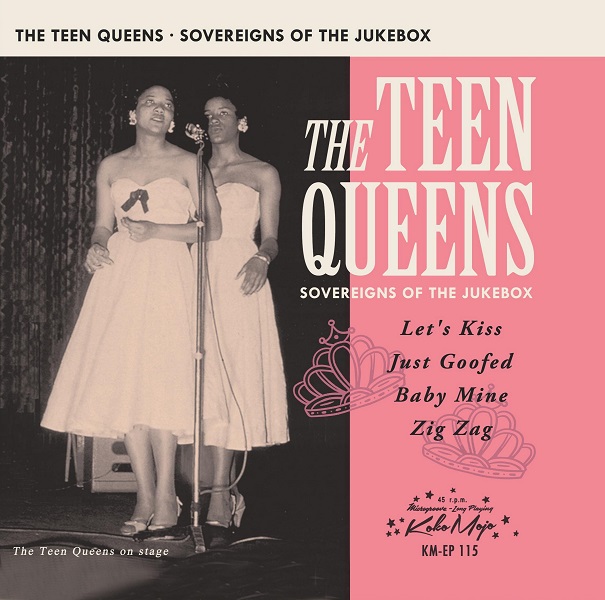 |
SOVEREIGNS
OF THE JUKEBOX/ Koko
Mojo Records bracht in het verleden in twee worpen van vijf tien EP’s
uit met telkens vier tracks van zwarte artiesten, nu verschijnen er
opnieuw vijf waarvan de bekendste naam die van The Teen Queens is.
The Teen Queens waren de zusjes Betty en Rose "Rosie" Collins,
nog tieners toen ze een hit scoorden met hun eind 1955 opgenomen debuutsingle
Eddie My Love. Die ballade staat niet op deze EP die vier uptempo
nummers bevat opgenomen voor RPM, het label waarop Eddie My Love uitkwam
en drie van de vier geschreven door dezelfde componisten verantwoordelijk
voor Eddie My Love, namelijk broer Aaron Collins van doo-wop groep
The Cadets (Stranded In The Jungle), arrangeur/producer Maxwell Davis
(saxofonist op Eddie My Love) en Sam Ling, pseudoniem van Saul Bihari,
mede-oprichter van de Modern/RPM/Crown groep platenlabels.
Koko Mojo Records previously released two batches of five EPs each
containing four tracks by black artists, and here's five more of which
the best known name is The Teen Queens. The Teen Queens were sisters
Betty and Rose "Rosie" Collins, still teenagers when they
scored a hit with their debut single Eddie My Love, recorded in late
1955. That ballad is not on this EP featuring four uptempo songs recorded
for RPM, the label on which Eddie My Love was released, with three
out of four written by the same composers responsible for Eddie My
Love, brother Aaron Collins of doo-wop group The Cadets (Stranded
In The Jungle), arranger/producer Maxwell Davis who played the sax
on Eddie My Love and Sam Ling, pseudonym of Saul Bihari, co-founder
of the Modern/RPM/Crown group of record labels. |
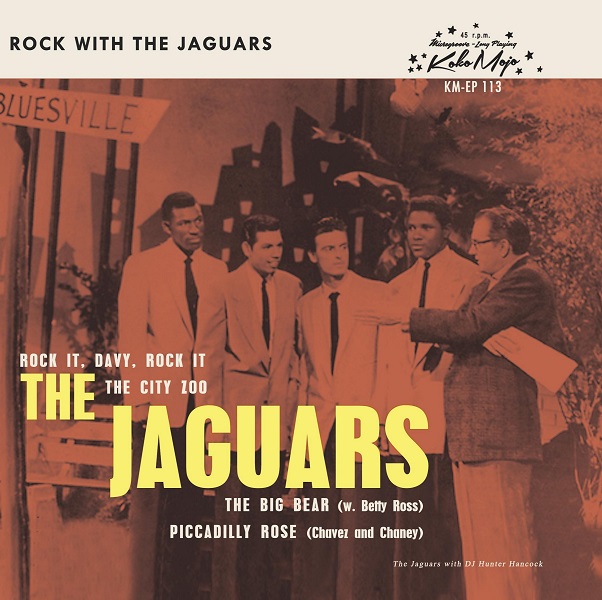 |
ROCK
WITH THE JAGUARS/ THE JAGUARS
Ik had nog nooit gehoord van The Jaguars, een doo-wop kwartet uit
Los Angeles die van 1955 tot 1961 een tiental singles uitbrachten.
De groep bestond uit twee Afro-Amerikanen, één Italo-Amerikaan
en één - tja, hoe noem je dat? - Latino-Amerikaan, en
hoewel dat er op zich niet toe doet omdat je het niet expliciet kan
horen is het in dit specifieke geval toch misschien mede verantwoordelijk
voor het opwindende geluid van The Jaguars.
I
had never heard of The Jaguars, a doo-wop quartet from Los Angeles
who released around ten singles from 1955 to 1961. The group consisted
of two Afro-Americans, one Italo-American and one - what do you call
it? - Latino-American, and while that in itself doesn't matter because
you can't hear it explicitly, in this particular case it may be partly
responsible for the exciting sound of The Jaguars. |
30 april 2021
![]()
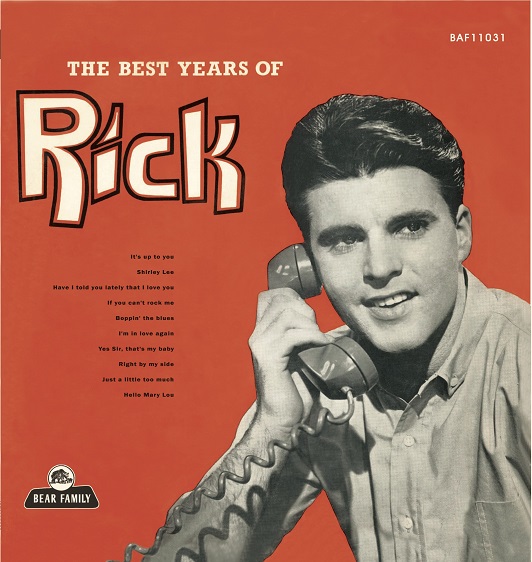 |
THE
BEST YEARS OF RICK/ RICK NELSON
De op 31 december 1985 op amper 45-jarige leeftijd bij een vliegtuigongeval
omgekomen Ricky Nelson verscheen al een keertje in Bear Family's gekleurde
10 inch reeks met de heruitgave op blauw vinyl van zijn Japanse Sing
Ricky Sing uit 1960. Nu is The Best Years Of Rick aan de beurt en
het speciale daaraan is dat dat de heruitgave op fluogeel vinyl is
(al was hetzelfde rood als de hoes misschien toepasselijker geweest)
van een 10 inch in 1961 verschenen in... Nederland! Aangezien de hele
hoes nauwkeurig is gereproduceerd (vergelijk met Discogs) wil dat
zeggen dat nagenoeg de volledige tekst op de achterkant, een anno
2021 haast schattig ouderwets aandoende promotionele biografie van
de Rickster in negen paragrafen, volledig in het Nederlands is, inclusief
spelfouten als "artisten", "platenerzameling"
en "guitaar". En dan krijgen wij nog eens extra binnenpretjes
als we bedenken dat pakweg een Japanner hier met even grote ogen naar
kijkt als wij naar de achterkant van die Japanse 10 inch! Handig voor
de verzamelaars onder u: de lijst van 20 "45 toeren Singles"
en drie "45 toeren EP’s" die achterop staat. Opvallend
is dat Nelson's achternaam niet op de voorzijde van de hoes staat
die alleen "Rick" vermeldt, niet "Ricky", wat
zo ongeveer klopt met de Ricky Nelson tijdlijn: op zijn 21ste verjaardag
mat hij zich in 1961 vanaf zijn zesde LP, het toepasselijk getitelde
Rick Is 21, het volwassener "Rick" aan.
Ricky
Nelson who passed away in a plane crash on December 31, 1985 at the
age of 45 already appeared once before in Bear Family's colored 10
inch series with the re-issue on blue vinyl of his 1960 Japanese Sing
Ricky Sing. Now the spotlight shines on The Best Years Of Rick and
what makes this record so special is that it's the re-issue on fluo
yellow vinyl (though the same red as the sleeve might have been more
appropriate) of a 1961 10 inch only released in Holland. Since the
entire sleeve is accurately reproduced (compare with Discogs) this
means that the liner notes on the back, a promotional Ricky Nelosn
biography, are entirely in Dutch, and we can imagine that a Japanese
buyer will look at this with exactly the same puzzled look as us staring
at the back of that Japanese 10 inch! Useful for the collectors among
you is the list of 20 Dutch "45 RPM Singles" and three "45
RPM EPs" on the back. It's noteworthy that Nelson's last name
is not on the front cover which only lists "Rick", not "Ricky",
which pretty much fits the Ricky Nelson timeline: from his 21st birthday
in 1961 onwards starting with his sixth and appropriately titled LP
Rick Is 21 he abbreviated his first name to the more mature "Rick".
|
![]()
CD Recensies
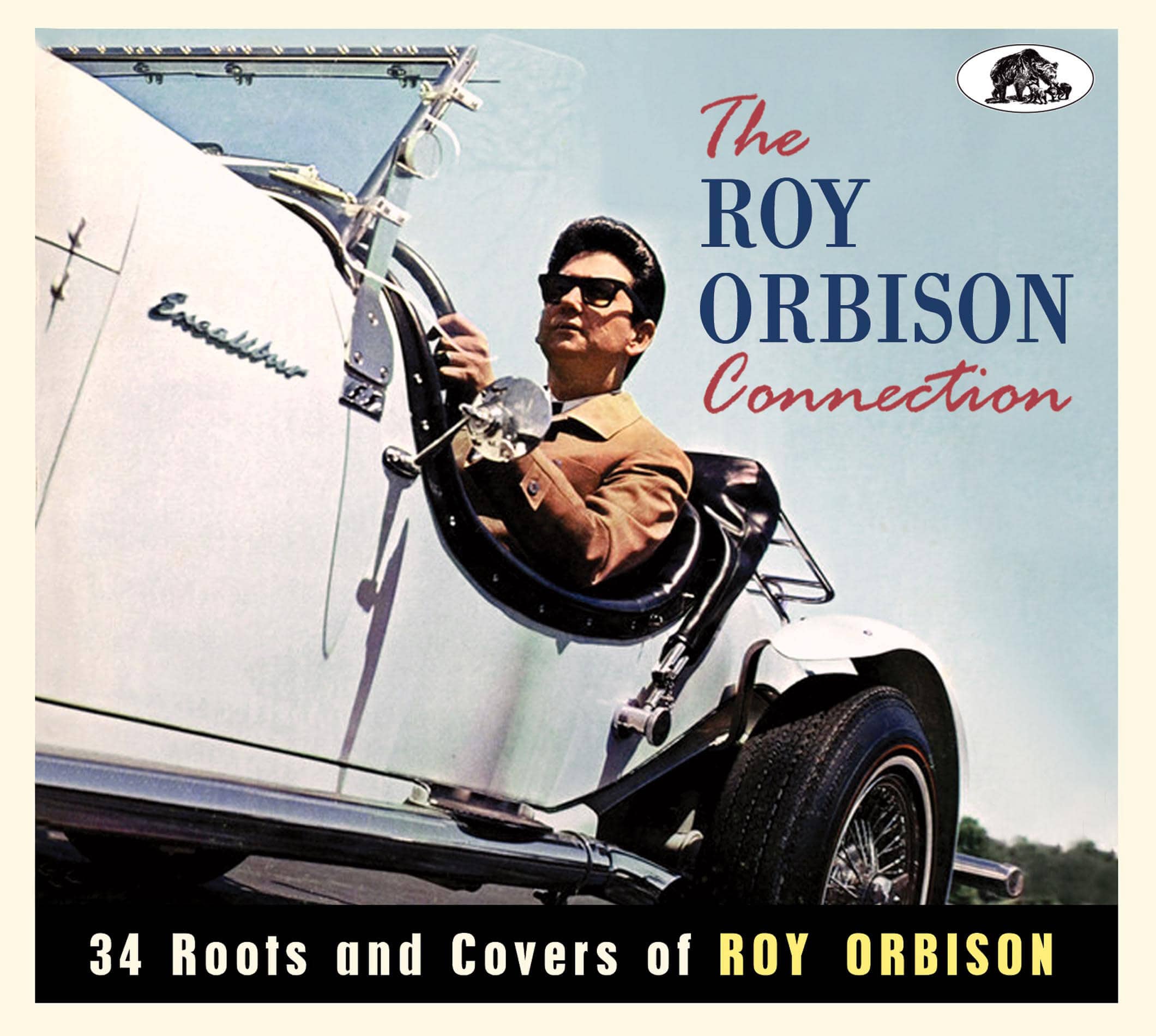 |
THE
ROY ORBISON CONNECTION
Een Roy Orbison CD zonder één noot opwellend uit Roy's
gouden keelgat, kan dat? Bear Family kan alles, en na Bill Haley en
twee keer Elvis is het de beurt aan The Big O voor 34 roots en covers.
Nu kan ik zo voor de vuist weg geen originals opnoemen van nummers
gezongen door Roy Orbison, zelf een begenadigd songschrijver: Pretty
Woman, Only The Lonely, Crying, Running Scared, In Dreams, Blue Bayou,
It's Over en Lana zijn allemaal van zijn eigen hand. De CD bevat dan
ook slechts een handvol originele uitvoeringen van songs later gezongen
door Roy Orbison, alsmede twee auteursversies: Willie Nelson's kerstliedje
Pretty Paper (hij schreef het maar nam het pas op in 1964, een jaar
ná Orbison) en Today's Teardrops (auteur Gene Piney twee jaar
na Roy Orbison). Originals zijn The Everly Brothers' Love Hurts, Dance
door Orbison's vaste co-composer Joe Melson en het door Orbison geschreven
Lana van zijn protegés The Velvets. Een oudere versie maar
niet de original is Mean Woman Blues door Jerry Lee Lewis - Elvis
was eerst. Een moeilijk geval is Claudette. De oudste versies zijn
twee Sun demo’s, dan kwam de grote hit van The Everly Brothers,
en Orbison nam het zelf pas echt op in 1965. Hier hoort u The Everly
Brothers alsmede de cover van Kris Jensen die trouw het Everly arrangement
volgt met (hoogstwaarschijnlijk) toenmalig Crickets zanger Earl Sinks
op duozang. De opmerkelijkste original is Johnny Cash's anderhalve
minuut durende demo van You're My Baby uit 1955, hier in de versie
in 1970 door producer Shelby Singleton overgedubd met elektrische
gitaar om het toch enigszins aanhoorbaar te maken.
A
Roy Orbison CD without a single note emanating out of Roy's golden
throat, is that possible? Bear Family can do anything, and after Bill
Haley and twice Elvis it's The Big O's turn for 34 roots and covers.
Offhand I can't think of any Roy Orbison originals not sung by Orbison
himself as he was a gifted songwriter: Pretty Woman, Only The Lonely,
Crying, Running Scared, In Dreams, Blue Bayou, It's Over and Lana
were all his own compositions. The CD therefore contains only a handful
of original performances of songs later sung by Roy Orbison, as well
as two author's versions: Willie Nelson's Christmas song Pretty Paper
(he wrote it but did not record it until 1964, one year after Orbison)
and Today's Teardrops (author Gene Piney two years after Roy Orbison).
Originals are The Everly Brothers' Love Hurts, Dance by Orbison's
regular co-composer Joe Melson, and Lana, an Orbison composition first
recorded by his protégés The Velvets. An older version
but not the original is Mean Woman Blues by Jerry Lee Lewis - Elvis
was first. A difficult case is Claudette. The earliest versions are
two Sun demos, then came the big Everly Brothers hit, while Orbison
didn't record it until 1965. Here we hear The Everly Brothers as well
as Kris Jensen's cover which faithfully follows the Everly arrangement
with (most likely) then Crickets singer Earl Sinks on duo vocals.
The most remarkable original is Johnny Cash's one-and-a-half minute
demo of You're My Baby, here in the version overdubbed with electric
guitar by producer Shelby Singleton in 1970 in order to make it more
listenable. |
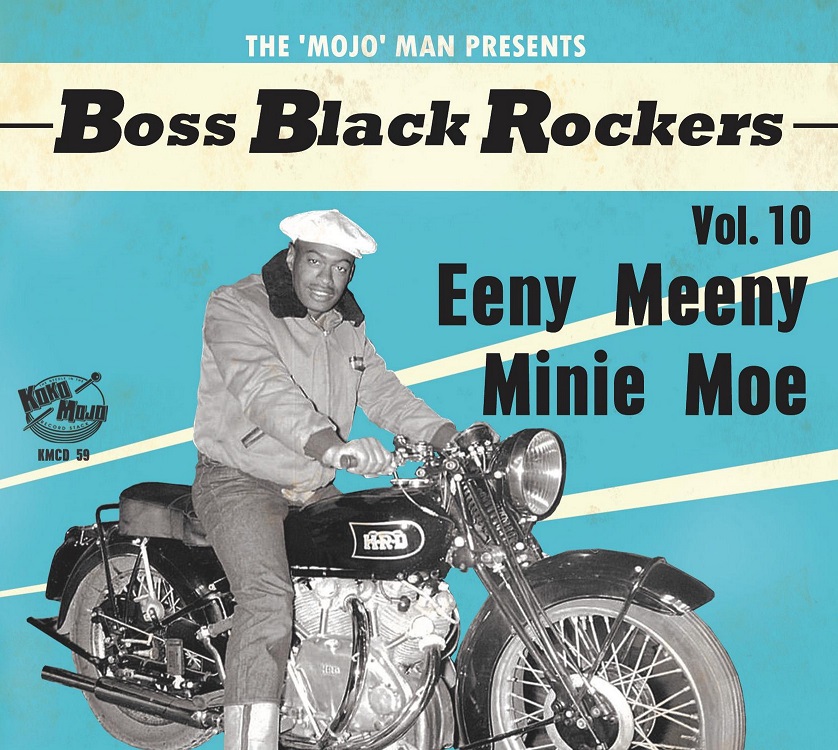 |
BOSS
BLACK ROCKERS VOL. 10: Koko Mojo brengt ze sneller uit dan wij ze kunnen recenseren en met Boss Black Rockers zitten ze al aan het tiende en laatste deel in de reeks. Da's jammer want die meer dan voorbeeldige reeks laat haar licht schijnen op de zwarte rock 'n' roll in al zijn verschijningvormen en samensteller Little Victor Mac heeft geen ongelijk als hij de reeks beschouwt als een hedendaagse versie van vinylreeksen als Stompin'. In concreto betekent dat voor de laatste maal 28 tracks die je niet elke dag hoort met een overdosis fris toeterende rock 'n' roll (Bob & Earl's You Made A Boo-Boo, Doc Starkes & the Nite Riders' Love Me Like Crazy, The Cadillacs' Holy Smoke Baby, Chuck Flamingo's Peepin’ Tom), Little Richard epigonen (Lester Robertson's Oh Babe) en niet aflatende stormrammen (Richie Richardson & the Jaguars' The Jump), maar evengoed fijne jive (Big Al Downing's Please Come Home, Red Smiley & the Vel-Tones' Jailbird), strollers (The Check Mates' Hey Mrs Jones Part 1) en Fats Domino klanken (Johnny Fuller's Sister Jenny). Over Fats Domino gesproken: Big Boy Myles & the Shaw-Wees' That Girl I Married beweegt haar heupen op door rhythm 'n' blues beïnvloede New Orleans pianoklanken met knetterende R 'n' B gitaar, een gumbo wind die ook waait door de originele versie van Messing With The Kid van Junior Wells uit 1960 op Chief Records. Ik heb altijd gelezen dat daar een één jaar oudere versie van componist Mel London van bestaat, maar ik geef toe dat ik die nog nooit ben tegengekomen, in tegenstelling tot de latere covers door zowat elke grote bluesnaam inclusief Junior Wells zelf. Nog een original is het van The Everly Brothers bekende Hey Doll Baby dat u nog nooit hebt gehoord als jive tenzij u The Clovers kent, en als u Get On The Right Track Baby alleen kent als verdeel en heers rockabilly door Joe Clay zal u aangenaam verrast opkijken als u Titus Turner's beschaafd swingende Lloyd Price-achtige origineel hoort. Een kloeke cover is Ernie Freeman's instrumentale Raunchy net een tikkeltje sneller dan Bill Justis, een cover die zogezegd géén cover is is Ray Sharpe's Gonna Let It Go This Time waarvoor duidelijk geluisterd werd naar Yakety Yak van The Coasters. Zo is ook Elton Anderson's I Love You eigenlijk Larry Williams' Slowdown met een andere tekst, en Jimmy Good's Watchdog doet mij heel erg denken aan het duidelijk oudere Route 90 van Clarence Garlow. Tja, al die zwarte melodieën borduurden natuurlijk allemaal voort op dezelfde basispatronen. Andere songs zijn dan niet weer wat je denkt: Dave "Baby" Cortez' Eeny Meenie Minie Moe is niet de rockabilly classic van Bob & Lucille. Eén schoonheidsfoutje: Wynonie Harris op zijn Louis Prima best in Bloodshot Eyes is volgens de info op de achterkant de King versie uit 1951 maar blijkt de wat softere heropname voor Roulette uit 1960. Maakt niet uit, want alle 28 na elkaar vormen ze de sterke afsluiter van een sterke reeks! Info: www.vintagerockinroots.com (Frantic Franky)
Koko Mojo brings 'em out faster than we can review 'em and lo and behold, this is already the tenth and last entry in the Boss Black Rockers series. That's a pity because it's a more than exemplary series spotlighting black rock 'n' roll in all its variations and compiler Little Victor Mac is dead on when he describes the series as a contemporary version of vinyl series like Stompin'. For the last time you get another 28 tracks you don't get to hear every day featuring an overdose of fresh honking rock 'n' roll (Bob & Earl's You Made A Boo-Boo, Doc Starkes & the Nite Riders' Love Me Like Crazy, The Cadillacs' Holy Smoke Baby, Chuck Flamingo's Peepin' Tom), would be Little Richard's (Lester Robertson's Oh Babe ) and concrete battering rams (Richie Richardson & the Jaguars' The Jump), but also fine jive (Big Al Downing's Please Come Home, Red Smiley & the Vel-Tones' Jailbird), strollers (The Check Mates' Hey Mrs Jones Part 1) and Fats Domino sounds (Johnny Fuller's Sister Jenny). Speaking of Fats Domino: Big Boy Myles & the Shaw-Wees' That Girl I Married moves her hips to rhythm 'n' blues influenced New Orleans piano sounds with crackling R 'n' B guitar, a gumbo wind also blowing through the original 1960 version of Junior Wells' Messing With The Kid on Chief Records. I've always read that there exists a one year older version by its composer Mel London, but I admit I've never come across it, unlike all the later covers by just about every major blues name including Junior Wells himself. Another original is Hey Doll Baby, well known by The Everly Brothers, which you've never heard as jive unless you know The Clovers, and if you know Get On The Right Track Baby only as Joe Clay's divide and conquer rockabilly you'll be pleasantly surprised to discover Titus Turner's civilized swinging Lloyd Price styled original. A beefy cover is Ernie Freeman's instrumental Raunchy just a tad faster than Bill Justis, a cover which is supposedly not a cover is Ray Sharpe's Gonna Let It Go This Time for which they clearly listened to The Coasters' Yakety Yak. Similarly, Elton Anderson's I Love You is actually Larry Williams' Slowdown with new lyrics, while Jimmy Good's Watchdog reminds me a lot of Clarence Garlow's obviously older Route 90. Well, all those black songs were of course inspired by the same basic patterns. Other songs are not what they seem: Dave "Baby" Cortez' Eeny Meenie Minie Moe is not Bob & Lucille's rockabilly classic. One small mistake for record collecting geeks: Wynonie Harris at his Louis Prima best in Bloodshot Eyes is according to the back cover supposed to be the 1951 King version but turns out to be the slightly softer 1960 re-recording for Roulette. Never mind, as all 28 tracks played in a row end this great series in great style. Info: www.vintagerockinroots.com (Frantic Franky) |
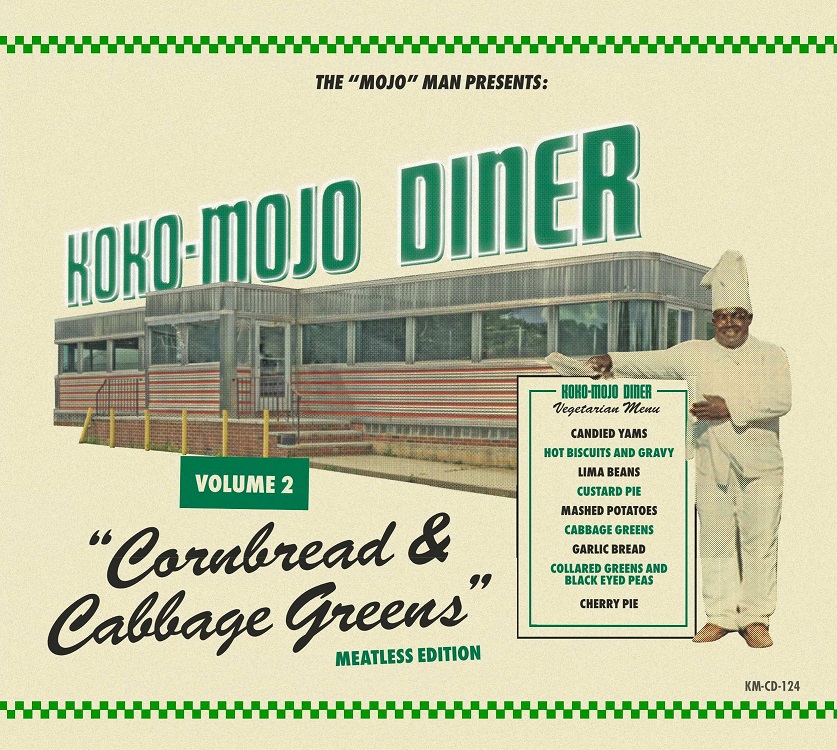 |
KOKO-MOJO
DINER VOLUME 2: Een hongertje naar goeie muziek? Dat kan u stillen met deel 2 in de Little Victor Mac Gaat Op Restaurant reeks waar de kok van dienst zelfs een "meatless edition" van maakte voor de vegetariërs onder u, of toch ongeveer want gravy is natuurlijk vette vleesjus, hahaha. De nadruk ligt op late fifties/early sixties en de CD bevat opvallend veel instrumentals (bijna de helft van de 28 tracks) maar waarlijk alle zwarte subgenres komen aan bod: swingende rock 'n' roll (de immer betrouwbare Wynonie Harris in Big Joe Turner modus in Git With The Grits, Louis Jordan's Beans And Cornbread, Ben Hughes' Sack, Joe Houston's Cornbread And Cabbage Greens, Eddy Ware's Lima Beans dat verdacht veel lijkt op de Chew Tobacco Rag met een nieuwe tekst over springbonen), sax honkers (Hal Singer's Corn Bread), strolls (Nat Kendrick & the Swans' (Do The) Mashed Potatoes Part 1), doo-wop ballades (Marvin & Johnny en hun om op te eten zoeteke Cherry Pie), meidenpop (Gravy (For My Mashed Potatoes) van Dee Dee Sharp), vegas grind (Felix & his Guitar's Chili Beans, The Intruders' Fried Eggs), frolic diner mondharmonica blues (B. Brown & his Rockin’ McVouts' Candied Yams), uptempo rockende early soul (Marvin Phillips & the Good Timers' Hot Biscuits And Gravy, Roy Lee Johnson's Black Pepper Make You Sneeze), primitieve stompers (Bill Parker's Sweet Potato), semi-akoestische bluesbop (Sonny Terry & Brownie McGee's Custard Pie Blues, hun tweede gang is de trage meer traditionele blues met fox chase mondharmonica Cornbread And Peas), maar evengoed risqué swing dubbelzinnigheden als I Didn't Like It The First Time (The Spinach Song) van de geweldig genaamde Julia Lee & her Boy Friends, vaudeville (Washboard Sam's Good Old Cabbage Greens) en vocal harmony swing (The Ink Spots' Do Nuts, Slim Gaillard's Potatoe Chips). Jody Williams' Moaning For Molasses is een swingende jazzblues instrumental en helemáál jazz is de Blue Note cocktail piano instrumental Collared Greens And Black Eyed Peas van Bud Powell. The Triumphs' Burnt Biscuits is een groovy orgel instro in de trend van Green Onions, en Funky Onions van Matthew Childs is dan weer een drukke early soul orgel/gitaar instro. Een menukaart om uw tanden in te zetten, ook al door de aanwezigheid van een aantal bekende muzikale master chefs met minder bekende nummers. Er volgen nog twee volumes. Smakelijk! Info: www.vintagerockinroots.com (Frantic Franky)
Hungry for good music? For appetizers use part 2 in the Little Victor Mac Goes Out For Diner series for which the cook even prepared a "meatless edition" for the vegetarians among you, sort of since gravy is of course a meat sauce, hahaha. The emphasis is on late fifties/early sixties and the CD contains a lot of instrumentals (almost half of the 28 tracks) but all black subgenres are covered: swinging rock 'n' roll (the always reliable Wynonie Harris in Big Joe Turner mode in Git With The Grits, Louis Jordan's Beans And Cornbread, Ben Hughes' Sack, Joe Houston's Cornbread And Cabbage Greens, Eddy Ware's Lima Beans which sounds suspiciously like the Chew Tobacco Rag with new lyrics about jumping beans), sax honkers (Hal Singer's Corn Bread), strolls (Nat Kendrick & the Swans' (Do The) Mashed Potatoes Part 1), doo-wop ballads (Marvin & Johnny serenade their sweet Cherry Pie), the girl group sound (Gravy (For My Mashed Potatoes) by Dee Dee Sharp), vegas grind (Felix & his Guitar's Chili Beans, The Intruders' Fried Eggs), frolic diner harmonica blues (B. Brown & his Rockin' McVouts' Candied Yams), uptempo rockin' early soul (Marvin Phillips & the Good Timers' Hot Biscuits And Gravy, Roy Lee Johnson's Black Pepper Make You Sneeze), primitive stompers (Bill Parker's Sweet Potato), semi-acoustic blues bop (Sonny Terry & Brownie McGee's Custard Pie Blues, their second course is Cornbread And Peas, a slow and more traditional blues with fox chase harmonica), but also risqué swing double entendres like I Didn't Like It The First Time (The Spinach Song) from the wonderfully named Julia Lee & her Boy Friends, vaudeville (Washboard Sam's Good Old Cabbage Greens) and vocal harmony swing (The Ink Spots' Do Nuts, Slim Gaillard's Potatoe Chips). Jody Williams' Moaning For Molasses is a swingin' jazz blues instrumental and real jazz is the Blue Note cocktail piano instrumental Collared Greens And Black Eyed Peas by Bud Powell. The Triumphs' Burnt Biscuits is a groovy organ instro in the style of Green Onions, while Funky Onions by Matthew Childs is an indeed funky early soul organ/guitar instro. A menu to sink your teeth into, also because of the presence of a number of familiar musical master chefs with lesser known songs. Two more volumes are to follow. Bon appetit! Info: www.vintagerockinroots.com (Frantic Franky) |
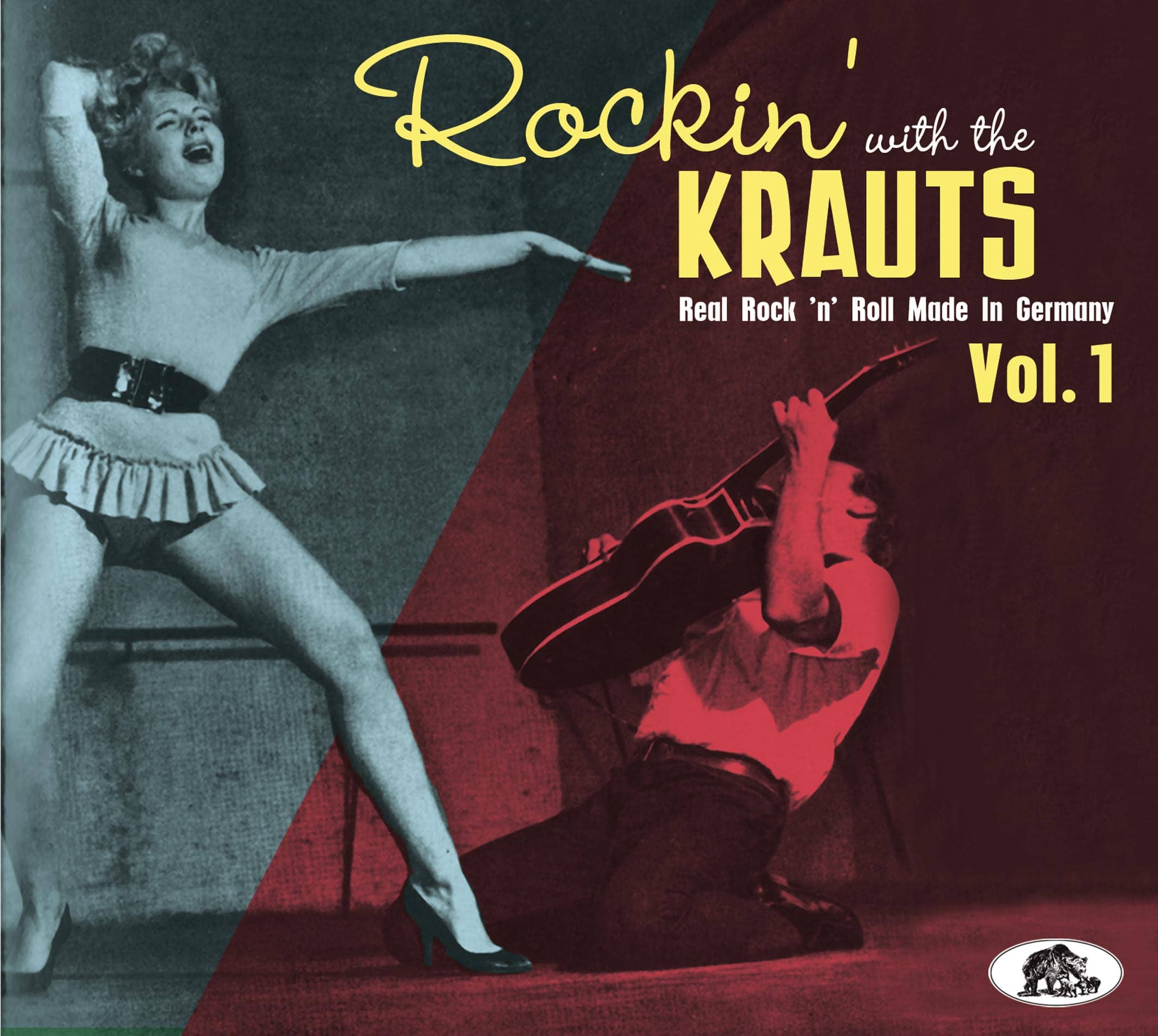 |
ROCKIN'
WITH THE KRAUTS VOL. 1
Toen de rock 'n' roll in de tweede helft van de jaren '50 internationaal
doorbaak gingen ook in Europa de sluizen open en elk land bracht zijn
eigen rock 'n' roll scene voort, ook Nederland, België, Frankrijk,
Italië en Duitsland. Het staartje van de Duitse rock 'n' roll
heb ik in mijn tienerjaren nog op de Duitse televisie gezien toen
Peter Kraus, Conny Froboess en Ted Herold nog regelmatig op het kleine
scherm kwamen, zij het vaak reeds in een oldies context, naast countrysterren
op hun retour die in de nadagen van hun carrière in Duitsland
nog het schoolgeld kwamen verdienen voor hun kleinkinderen. Zelfs
Janis Martin zag ik een keertje aangekondigd staan in het programmablad
maar dat bleek een operazangeres met dezelfde naam. Ja, ik heb in
die dagen heel wat Duitse variété shows gezien op TV.
Dat en Edgar Wallace films. Er zijn verschillende CD’s met rock
'n' roll made in Germany op de markt en eind vorig jaar bracht Atomicat
(D) nog twee Rockin' Schlager Party CD’s uit. Van die 2 x 32
tracks zijn er gelukkig slechts een handvol dubbels met deze Bear
Family CD die "the hard stuff, the real stuff - no 'Sugar Baby'
attitude but pure rock 'n' roll, twist rockers, beat rockers and hard
instrumentals" belooft.
When rock 'n' roll broke through internationally in the second half of the 1950s the floodgates opened in Europe as well and each country brought forth its own rock 'n' roll scene, including the Netherlands, Belgium, France, Italy and Germany. While in my teens I witnessed the last rock 'n' roll convulsions on German television with Peter Kraus, Conny Froboess and Ted Herold still regularly appearing on the small screen, albeit already often in an oldies context, alongside American country stars in the final days of their careers earning the money to put their grandchildren through school. One time I even saw Janis Martin announced in the TV guide but she turned out to be an opera singer with the same name. Yes, I saw a lót of German variety shows on TV in those days. That and Edgar Wallace movies. There are many CDs available of rock 'n' roll made in Germany and only late last year Atomicat (D) released two Rockin' Schlager Party CDs. Of those 2 x 32 tracks fortunately there's only a handful of duplicates with this Bear Family CD promising "the hard stuff, the real stuff - no 'Sugar Baby' attitude but pure rock 'n' roll, twist rockers, beat rockers and hard instrumentals". The CD contains 33 tracks 1957-1965 of which more than 20 are sung in the language of Goethe, in addition to about six songs in English and one track sung so incomprehensibly that I can't hear whether it's English or German. There's also three guitar instrumentals with a high, sharp sound like the rattling guitar rocker Starfighter's Theme by The Starfighters and the surprisingly modern sounding The Rocket's Slop by Frankie & the Rockets. About half of the CD are covers and while I understand the reasoning that the quickest way to a German hit was the German translation of American hits like Elvis' A Big Hunk O'Love (The Rocking Stars' Hey Baby), Little Richard's Ooh My Soul (The Rackets' Wie Du), Chuck Berry's No Particular Place To Go (Bernd Spier's Ohne Ein Bestimmtes Ziel), a heavy Drip Drop by The Drifters based on Dion's version (Pichi's Null Uhr Zehn), The Ronettes' Be My Baby (Suzanne Doucet's Sei Mein Baby) and Ernie Maresca's Shout Shout Knock Yourself Out (Schaut Schaut Das Ist Meine Braut by Fredy Brock, trumpeter in Max Greger's orchestra) I always wonder how um himmels willen they got their hands on in my opinion obscure songs like Billy Eldridge's Let's Go Baby (Paul Würges), Tico & the Triumphs' Motorcycle (Benny Quick's Motorbiene) and Jackie Lee Cochran's Buy A Car (Billy Sanders' Lass Sein) and whether the respective composers ever saw one pfennig in royalties. Other songs are not covers but clearly inspired: Ich Bin Kein Schöner Mann (self knowledge is the beginning of wisdom) by Billy Sanders, a Brit who ended up in Germany, is suspiciously similar to Wanda Jackson's Mean Mean Man. An originalkomposition in German is Rhythm 'n' Blues And Johnny by The German Blue Flames, and songs in English like The Starfighters' Lonnie Donegan inspired rock 'n' roll rendition of the folk traditional Lost John start appearing as the sixties progress. Frankie & the Rockets' instrumental Frankie's Twist is not a twist but a guitar boogie, The Six Tornados' remarkably black sounding Little Wallflower and The Gisha Brothers' own Ringeling and their cover I Want You To Be My Baby which goes back to Louis Jordan (the organ makes 'em sound like Joey Dee & the Starlighters) do have a twist rhythm, just like Der Liebestraum Als Twist, a twist version of Franz Liszt's classic piano work Liebestraum No. 3 not from 1950 but from 1850 by Charly Cotton & seine Twist-Makers. The CD includes familiar names like Ted Herold (Elvis' Little Sister as Little Linda, Dion's The Wanderer as Ich Bin Ein Wanderer) and Paul Würges (Mary Mary Lou, Die Boys Und Ihre Babies) but I doubt you ever heard Peter Kraus as wild as in Doll Doll Dolly, even if it is basicly a rocked-up schlager - let there be no doubt about it that the dreaded spectre of the schlager inevitably lurks around the corner on a regular basis such as in Nora Nova's Tintarella Di Luna-esque Männer Gibt's Wie Sand Am Meer. Musically the CD covers the whole gamut from the first primitive attempts (Fred Hollerbach with a 1960 budget cover of Peter Kraus' German translation of Fabian's Tiger that originally appeared on a flexi disc) to beat rock (The Original Team-Beats' cover of Rip It Up), Beach Boys (Fun Fun Fun Fun as Eine Reise Nach New York (Fein Fein Fein) by Mama Betty's Band), pop (Benny Quick's Denn Du Küsst So Heiss) and sixties rock 'n' roll (The Rattles' Bye Bye Johnny from 1964, The Rollicks' Sweet Little Rock 'n' Roller from 1965) even mixed with sixties rhythm 'n' blues (The Progressives' I Ain't Got You from 1965). Despite the sometimes commercial approach the songs often have an almost White Label-like raw or even simplistic sound and therefore this CD is definitely worth seeking out for the collector of both European rock 'n' roll and rock 'n' roll rarities in general. The illustrated CD booklet of 34 pages exhaustively describes the climate in which rock 'n' roll emerged in Germany in an almost academic way, but is unfortunately for us who uberhaupt only understand one word of German exclusively in German and not in English. Info: www.bear-family.com (Frantic Franky) |
21 april 2021
![]()
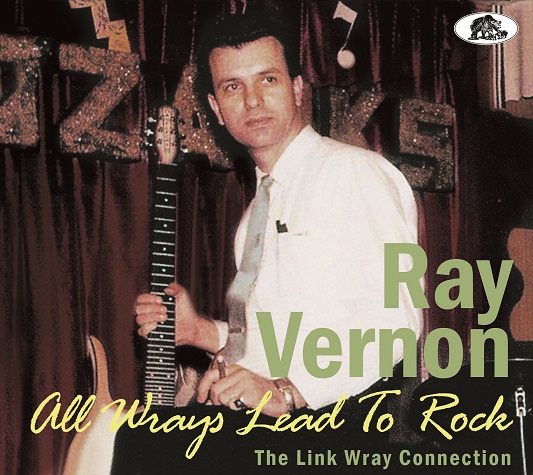 |
ALL
WRAYS LEAD TO ROCK/ RAY VERNON
Als de naam Ray Vernon u niets zegt dan is ondertitel "The Link
Wray Connection" de weggever: Ray Vernon is de artiestennaam
van Vernon Aubrey "Obie" Wray, de oudste broer en ritmegitarist,
pianist en later ook manager van powergitarist Link Wray. De Wrays
waren drie musketiers: één tegen allen en allen tegen
één, met jongste broer Doug op drums. Op alle degelijke
verzamelaars die elke onuitgebrachte valse noot ooit opgenomen door
Link Wray catalogeren (en dat waren héél veel noten
want het duurde erg lang voor de bron droog viel) staan wel een paar
nummers uitgebracht onder de naam Ray Vernon (of Lucky Wray, een ander
pseudoniem van hem) maar dit is bij ons weten de eerste keer dat er
een volledige CD aan hem wordt gewijd, al waren die Wrays één
pot nat en speelt Link Wray op vier nummers na mee op alle 35 tracks
hier, en u mag dan ook nu beginnen met meubels en huisraad vast te
nagelen. De tweede helft van de CD focust op Vern's activiteiten als
producer, de eerste helft op zijn eigen zangcarrière met een
selectie uit de onder zijn naam uitgebrachte singles, veelal sympathieke
rock 'n' roll zoals de rockabilly getinte gedreven Starday custom
release Teenage Cutie. Helemaal in den beginne probeerde Cameo Records
die pas hadden gescoord met Charlie Gracie's Butterfly Vern zelfs
te verkopen als tieneridool annex charmezanger aan de hand van de
medium tempo popballade Evil Angel met op de B-kant de gevoelige ballade
I'll Take Tomorrow Today. I'm Countin' On You was een geslaagde rocker,
maar van Vern's derde Cameo single, een cover van de Hank Williams
ballade Window Shopping, staat hier een vrij plat klinkende origineel
onuitgebrachte versie op, niet beter dan de reguliere single versie
die niét op de CD staat. Van de B-kant, de mooie en verrassend
melodieuze rocker I'll Be So Good To You horen we daarentegen zowel
de single versie als de origineel onuitgebleven heropname van enkele
maanden later. Rumble, Link's grootste hit, werd trouwens ook opgenomen
voor Cameo maar daar moesten ze er niets van weten en Link mocht de
tape meenemen voor 57 dollar. De rest is geschiedenis... Een derde
origineel onuitgebracht nummer opgenomen voor Cadence midden 1958
was de Tony & Joe cover The Freeze waaruit blijkt dat zelfs een
graantje pogen mee te pikken van een dansrage de Wrays niet vreemd
was. Die drie nummers zouden pas boven water komen in 2004 op de Rollercoaster
CD They're Outta Here Says Archie met spul opgenomen voor Cadence
dat ondanks het succes van Rumble Link Wray en alles waar hij voor
stond niet vond stroken met het keurige imago van Cadence voor wie
rock 'n' roll gelijk stond met The Everly Brothers, en daarom bleven
onder meer een volledige LP, follow up singles en alternatieve versies
in de kluis liggen, materiaal dat Link deels zou heropnemen voor Epic
Records. Nog een ander destijds onuitgebracht nummer is het geinig
doo-woppende Flirty Baby uit 1960 met de drie broers op zang en kikker
backings. Pretty Blue Eyes is opnieuw een sfeervolle popballade van
Vern daterend van eind 1958 met op de B-kant My Sugar Plum, een nummer
dat zich nog het best laat omschrijven als een Link Wray instrumental
met een gezongen tekst en een resultaat dat er mag wezen. Een laatste
door Vern gezongen nummer is Danger One Way Love uit 1961, een goeie
stroll. Typerend voor de verwarring betreffende all things Link zijn
de vier missing links hier waaronder ik minder bekende gitaar instrumentals
versta, twee singles die om contractuele redenen werden uitgebracht
onder Vern's naam - de broers maalden niet zo om contracten. Vendetta
is een archetypische dreigende Link Wray instrumental uit 1960, een
sleazy striptease stroller in Rumble stijl met extra sax, met op de
B-kant het snellere en van piano en vokale oh oh's voorziene melodieuze
twang meesterwerkje Roughshod met Duane Eddy sax. De tweede single
koppelde in 1962 het verschroeiende Big City After Dark aan de supersnelle
early sixties klinkende Bill Doggett cover Hold It.
If
the name Ray Vernon doesn't ring a bell subtitle "The Link Wray
Connection" makes it clear what this is about: Ray Vernon was
the stage name of Vernon Aubrey "Obie" Wray, the eldest
brother and rhythm guitarist, pianist and later manager of power guitarist
Link Wray. The Wrays were three musketeers: all for one and one for
all, with youngest brother Doug on drums. On all decent Link Wray
compilations cataloging every unreleased false note ever recorded
by Link Wray (and that was a lot of notes because it took a long time
before the source dried up) there are a couple of songs bearing the
name Ray Vernon (or Lucky Wray, another of his pseudonyms) but to
our knowledge this is the first time a full CD is dedicated to him,
although the Wrays were close and Link Wray plays on all but four
of the 35 tracks here so you know you better start nailing down your
furniture and household items. The second half of the CD focuses on
Vern's activities as a producer, the first half on his own singing
career with a selection of singles released under his name, mostly
remarkably clean rock 'n' roll like the rockabilly driven Starday
custom release Teenage Cutie. At the very beginning Cameo Records
who had scored with Charlie Gracie's Butterfly even tried to market
Vern as a teen idol with the medium tempo pop ballad Evil Angel coupled
with with the sensitive ballad I'll Take Tomorrow Today. I'm Countin'
On You was a decent rocker, but from Vern's third Cameo single, a
cover of the Hank Williams ballad Window Shopping, the CD offers an
uninspired originally unreleased version not better than the issued
single version which is not on the CD. From its B-side, the beautiful
and surprisingly melodic rocker I'll Be So Good To You we hear both
the single version and the originally unreleased re-recording from
a few months later. Rumble, Link's biggest hit, was also recorded
for Cameo but the powers in force at Cameo didn't want to hear about
it and Link was allowed to take the tape home for $ 57. The rest is
history... A third originally unreleased song recorded for Cadence
in mid 1958 was the Tony & Joe cover The Freeze, showing that
the Wrays were even willing to try to cash in on a dance craze. Those
three songs wouldn't surface until the 2004 Rollercoaster CD They're
Outta Here Says Archie with stuff recorded for Cadence who despite
the success of Rumble wouldn't have anything to do with Link Wray
and all he stood for as he didn't fit the clean cut image of Cadence
for whom rock 'n' roll equalled The Everly Brothers. Among other things
a full LP, follow up singles and alternate versions remained in the
vault, material that Link would partially re-record for Epic Records.
Another song unreleased at the time is the fun doo-woping Flirty Baby
from 1960 with the three brothers on vocals and frog backings. Pretty
Blue Eyes is an atmospheric pop ballad from 1958 with My Sugar Plum
on the B-side, the spectacular result of adding vocals to a typical
Link Wray instrumental melody. The last tune sung by Vern is Danger
One Way Love, a fine stroll from 1961. Typical of the confusion regarding
all things Link are the four missing links here by which I mean lesser
known guitar instrumentals, two singles released under Vern's name
for contractual reasons - the brothers didn't care much for contracts.
Vendetta is an archetypal ominous Link Wray instrumental from 1960,
a sleazy striptease stroller in Rumble style with extra sax, while
the faster B-side Roughshod with piano and vocal "oh oh"
interjections is a melodic twang masterpiece with Duane Eddy sax.
In 1962 the other single paired the scorching Big City After Dark
with the super fast early sixties sounding Bill Doggett cover Hold
It. |
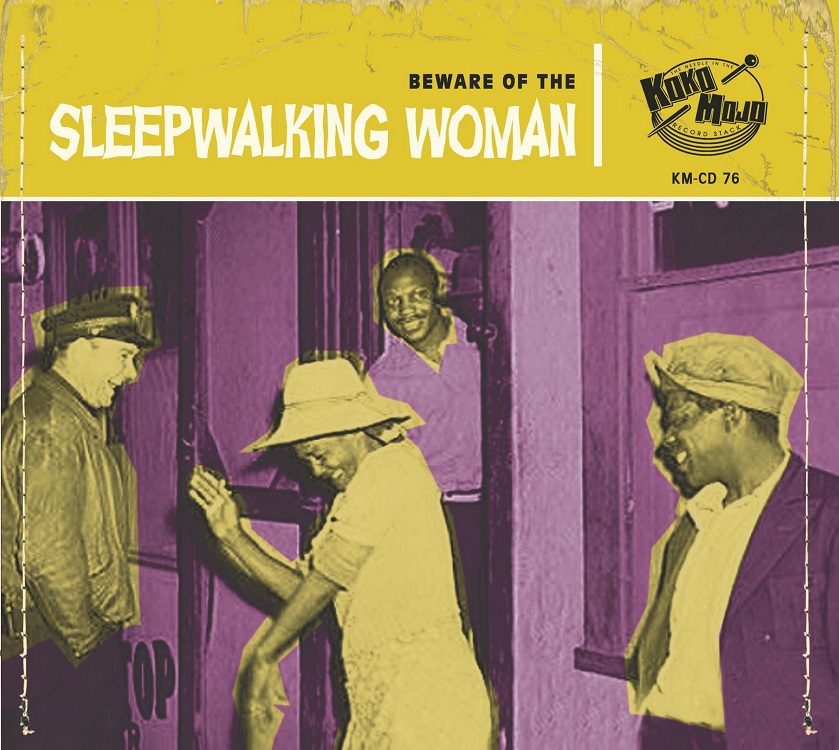 |
BEWARE
OF THE SLEEPWALKING WOMAN
Koko Mojo heeft al zoveel van deze CD’s uitgebracht zonder nummering
dat een normaal mens er het noorden bij verliest, maar volgens ons
die ze nog allemaal op een rijtje hebben (hoewel ze werken in ploegen)
moet dit nummer 29 in de reeks zijn en de vierde met novelty songs,
grappige of in elk geval grappig bedoélde liedjes want humor
is voor iedereen anders natuurlijk. Ik persoonlijk hou wel van novelty
songs en hier staan er opnieuw 28 op van zwarte origine, uitgezonderd
de blanke komiek Stan Freberg maar omdat die een zwart nummer covert
zag samensteller Little Victor Mac zijn huidskleur door de vingers.
Koko Mojo has already released so many of these CDs without a number that a normal person would lose his head, but according to us hardheads this must be number 29 in the series and the fourth with novelty songs, funny or at least songs intended to be funny because the definition of comedy is of course different for everyone. Personally I like novelty songs and here is another truckload of 28 of them except for white comedian Stan Freberg, but since he covers a black tune compiler Little Victor Mac turned a blind eye to his skin color. For starters we have Sonny Boy Williamson's The Goat, in itself a fairly standard blues with harmonica that is actually not funny at all: many songs here are not crude jokes aiming at making you roll all over the floor in a fit but more subtle and often just funny lyrics delivered in fast talking black fifties slang. Still, there are some patented nutcases on board like space age vocalist Yochanan with the chaotic Hot Skillet Mama in which the eccentric Sun Ra was involved, Esquerita screaming like if he were an opera singer on the piano boogie Esquerita And The Voola, and Two Old Sparrows by Dave & Bob, a duet between Dave "Baby" Cortez and Bob Kornegay in which they exchange phrases from other artists' hits to the tune of See You Later Alligator, some "lifted" from the original singles (Tequila by The Champs, Book Of Love by The Monotones) in the style of Buchanan & Goodman, while others they sing themselves like Sam Cooke's You Send Me, a hard rockin' Good Golly Miss Molly, and The Royal Teens' Short Shorts. Big Bob Kornegay is also The Man In The Phone Booth (Hello Baby) and Pig Meat Markham has troubles with the phone as well in Your Wires Have Been Tapped, a New Orleans dixieland rocker we've liked since it was featured on the 1991 vinyl LP Talkin' Trash: Greasy Rhythm 'n' Blues With Attitude '54-'63. Beatnik Blues by Huey "Piano" Smith & his Clowns is no blues but cozy black rock 'n' roll, as are Guitar Crusher's Itch With Me, Little Joe & the Moroccos' Bubble Gum, Bobby Freeman's exotic Sinbad and Bobby Hendricks' upbeat Psycho, a conversation between a psychiatrist and his patient that made the Billboard Hot 100 in 1960. Psycho was already on a Koko Mojo CD before, albeit not in this series. Wildman Jerry McCain keeps things remarkably civilized in The Jig's Up, while Count Yates acts like a monkey in Chimpanzee, as does Eddie Hill in Monkey Business. Stan Freberg hilariously covers Sh-Boom in the form of an entire recording session ("Hold it, you guys. This is a rhythm 'n' blues number. You gotta be careful or somebody is liable to understand what you're singing about. Do you want that to happen?) and Andre Williams' Bacon Fat is covered by Big Daddy & his Boys (for the third time Bob Kornegay), but the CD also contains two unexpected originals, Stranded In The Jungle by The Jayhawks before The Cadets and Boogaloo & his Gallant Crew's Cops And Robbers which was covered by Bo Diddley who tells dumb jokes himself in Say Man. Another familiar name is Katie Webster with an early recording, the decent medium tempo 1958 blues rocker Baby Baby that we already have on five other compilation albums, and there's more blues sounds with Smilin' Joe's Sleepwalking Woman and The Couplings' Dill Tickle which is fuelled by insane laughter. Shorty Long's terrific Burnt Toast And Black Coffee is popcorn noir, Dr. Horse's Jack That Cat Was Clean is a parody of crime jazz, and there's exotic doo-wop with The Delcos' Arabia. If you like doo-wop you're in the right place with Jack McVea with Al Smith & the Savoys' Chop Chop Boom, Marvin Baskerville with the Five Chestnuts' Chi Chi and T. Valentine's Little Lu-Lu Frog. And if you like completely nutty music and have nerves of steel this CD is perfect for listening while wearing your favorite straitjacket. Info: www.vintagerockinroots.com (Frantic Franky) |
|
|
WHIP
MASTERS INSTRUMENTALS VOLUME 1 Volume 2 schenkt aandacht aan indianen (Teddy & the Rough Riders' Tomahawk, Scalping Party van The Tornados (niet die van Telstar), Al Caiola's Stampede en Grace Tennessee & the American Spirits' Pow Wow) en meer frolic diner met The Royaltones' Tacos, Al Casey's The Stinger, Billy Davis & the Legends' Spunky Onions en zelfs van de geheel onverdachte Chet Atkins met Boo Boo Stick Beat. Er is jungle exotica met The Rim Shots' The Native Dance en er zijn rhythm 'n' blues gitaren met Ike Turner's groovy The Groove. Dit keer gaat de zweep erover met The Whip van The Originals en dubbelzinnigheden om op te strippen zijn The Beaver van Noble "Thin Man" Watts en The Stripper van het Music City Orchestra, een natuurgetrouwe cover van de klassieker van David Rose. Hoe laat je een bekend nummer anders maar toch hetzelfde klinken? Door het te coveren natuurlijk, zie ook Green Onions door het Dave Grundy Combo. Beide nummers zijn afkomstig van het platenlabel Hit Records dat alleen al door die naam verraadt een budget coverlabel te zijn geweest. The Flee-Rekkers komen nog een keertje langs met het sax/gitaar gebeuren Green Jeans en Volume 2 bevat meer bekende namen als Volume 1 met all time classic The Rockin' Gypsy van Larry Collins & Joe Maphis, Jet Harris met het twangy strollende film noir thema The Man With The Golden Arm dat even druk is als een film van Austin Powers, en Alan Freed die uiteraard geen ene noot speelde in Pushing maar alleen zijn naam verbond aan een swingend rhythm 'n' blues orkest (The Alan Freed Rock 'n' Roll Big Band) en vervolgens langs de kassa passeerde. The Champs gaan onverwacht funky in Panic Button, de bijdrage van de van Woo Hoo en Janis Will Rock bekende Rock-A-Teens bestaat uit de zenuwslopende standaard sax/gitaar rocker Oh My Nerves, en Grady Martin gaat goed fuzzy met het voor hem niet karakteristieke Good Good Good. Big Noise From The Jungle van drummer Sandy Nelson bevat meer sax en twangy gitaar als drums. Urban Zotel komt opnieuw langs met een moderne opname die een groot contrast vormt met zijn western swing bijdrage aan Volume 1 want met It's A Fuzz verkent hij de biker sounds van Davie Allen & the Arrows. Op Volume 2 staat ook een Nederlandse bijdrage: René and his Alligators met hun uptempo cover van Lonnie Mack's Wham uit 1963 dat met zijn metalige klank helemaal niet misstaat tussen zijn Amerikaanse soortgenoten. Volume 2 sluit af met een verbazingwekkend rockend nummer uit - hou u vast - 1938, de originele versie van Big Noise From Winnetka door contrabassist Bob Haggart en drummer Ray Bauduc en inderdaad een meesterwerkje van contrabas en drums. Voor wie het zich altijd mocht hebben afgevraagd: Winnetka is een (naar ik veronderstel erg luidruchtig) stadje in Illinois. Er volgt nog een derde volume, en de eerste twee zijn alvast aanraders voor wie houdt van gitaren zo scherp dat ze pijn doen aan de oren. Info: www.vintagerockinroots.com (Frantic Franky) Every bird sings his song and if you couldn't sing you started an instrumental band, it was that simple in the fifties, and thus the fifties became the golden age of the instrumental. The stock seems almost inexhaustible and here you'll find 2 x 30 more. Because of the title I expected - or rather hoped for - vegas grind, but that's not the case. Volume 1 contains for the most part the better white rock guitar boogies with or without extra piano (Traveler Rock by Dave's Travelers, Jack-Knife by The Pharaohs, Shady Lady by The Shades, the firecracker laden supersonically fast Firecrackers by Billy Mure's Supersonic Guitars) and equally white rock sax honkers with or without extra guitar (Rampage by The Rockaways, the scorching Sour Mash by Hank Moore, the hissing The Snake by The Tradewinds). Primitive guitar scatchers all around, like Lloyd Rowe who sounds like he's banging on a metal plate with a hammer in Jay Hodge's Goatsville and the omnipotent Bo Diddley with Bo's Bounce. In the end only The Frantics get whipped in The Whip as well as The Whips in the kebab exotica Yes Master. In guitar rocker Bijele by Yugoslavian group Strijele Strijele (I ain't joking, it's from a 1962 EP on which they covered Runaround Sue and Sealed With A Kiss in Yugoslavian and if you think that's terrible, console yourself with the sad fact that their version of The Wanderer sung in English is even worse) which reminds me of Johnny & the Hurricanes' Crossfire the drums sound like whips, and in the guitar rocker Whippy Wow by The Flamethrowers there is no whip. The thundering sax strip stroller Torture Rock by The Rockin' Belmarx also has a sexual connotation but Ray Ether's Slave Girl is despite its title a standard guitar instrumental, albeit a very good guitar instrumental. Tequila is an instrumental genre in itself and Volume 1 features two Tequila copies: Cerveza by Boots Brown & his Blockbusters and the Joe Meek production Bitter Rice by The Flee-Rekkers, while Jumping Bean by the one and only Champs themselves also contains some typical Tequila chord changes. Compiler DJ Mark Armstrong clearly chose to give an overview of all possible instrumental styles (except surf) because the CD also contains examples of sax strollers (Chuck Higgins' The Rooster), piano boogie woogie (Hadda Brooks' Teenage Boogie), big band rhythm 'n' blues honkers (Moon Dog Boogie by the Freddie Mitchell Orchestra, Joe's Hot House by Joe Houston, Leap Frog by the Chuck Alaimo Quartet), snappy uptempo late fifties/early sixties frolic diner fun (All Tore Up by The King's Henchmen and Cave Man Love by Space Man & the Rockets - the A-side of that 1958 single is a vocal version with sped up chipmunk voices), country fingerpicking (Flippin' The Lid by Speedy West & Jimmy Bryant) and western swing with Wade Ray & his Cow Town Five's Dipsey Doodle, a song you probably know in the vocal version by Bill Haley & the Comets who are on the CD with the guitar led Goofin' Around including a genius double bass break, perhaps the best instrumental Bill Haley & the Comets ever recorded. Volume 1 contains one modern song, Blastin' Off by graphic designer Urban Zotel who made the cover of this CD, also a western swing guitar/steel guitar duet. Volume 2 showcases native american themed tunes (Teddy & the Rough Riders' Tomahawk, Scalping Party by The Tornados (not the Telstar outfit), Al Caiola's Stampede and Grace Tennessee & the American Spirits' Pow Wow) and more frolic diner with The Royaltones' Tacos, Al Casey's The Stinger, Billy Davis & the Legends' Spunky Onions and even the above any suspicion Chet Atkins with Boo Boo Stick Beat. There's jungle exotica with The Rim Shots' The Native Dance and rhythm 'n' blues guitars with Ike Turner's groovy The Groove. This time it's The Originals who get whipped in The Whip and risqué titles to strip to are Noble "Thin Man" Watts' The Beaver and The Music City Orchestra's The Stripper, a note for note cover of David Rose's classic show tune. How do you make a familiar song sound different but at the same time almost exactly the same? By covering it of course, see and hear also Green Onions by The Dave Grundy Combo. Both songs come from the Hit Records label which by its name alone already proves to have been a budget cover label. The Flee-Rekkers make another appearance with the sax/guitar show stopper Green Jeans and Volume 2 features more familiar names than Volume 1 with all time classic The Rockin' Gypsy by Larry Collins & Joe Maphis, Jet Harris with the twangy strolling film noir theme The Man With The Golden Arm that's as chaotic as an Austin Powers movie, and Alan Freed who obviously didn't play a single note on Pushing, simply attached his name to a swinging rhythm 'n' blues orchestra calling it The Alan Freed Rock 'n' Roll Big Band, and then passed by the box office. The Champs sound unexpectedly funky in Panic Button, the contribution of The Rock-A-Teens who you know from Woo Hoo and Janis Will Rock consists of the nerve wrecking standard sax/guitar rocker Oh My Nerves, and Grady Martin goes fuzz with his uncharacteristic Good Good Good. Big Noise From The Jungle by drummer Sandy Nelson features more sax and twangy guitar than drums. Dutch contributors René and his Alligators are not out of place among their American counterparts with the metallic sound of their uptempo 1963 cover of Lonnie Mack's Wham. Volume 2 closes with an amazing rocking number from - hold on to your underwear - 1938, the original version of Big Noise From Winnetka by double bassist Bob Haggart and drummer Ray Bauduc and indeed a masterpiece of double bass and drums. In case you always wondered: Winnetka is a (presumably very noisy) small town in Illinois. Urban Zotel rocks by again with a modern recording that forms a big contrast with his western swing contribution to Volume 1 since It's A Fuzz explores the biker sounds of Davie Allen & the Arrows. A third volume is on its way, and the first two come highly recommended if you like guitars so sharp they hurt the ears. Info: www.vintagerockinroots.com (Frantic Franky) |
14 april 2021
![]()
Vinyl Recensie
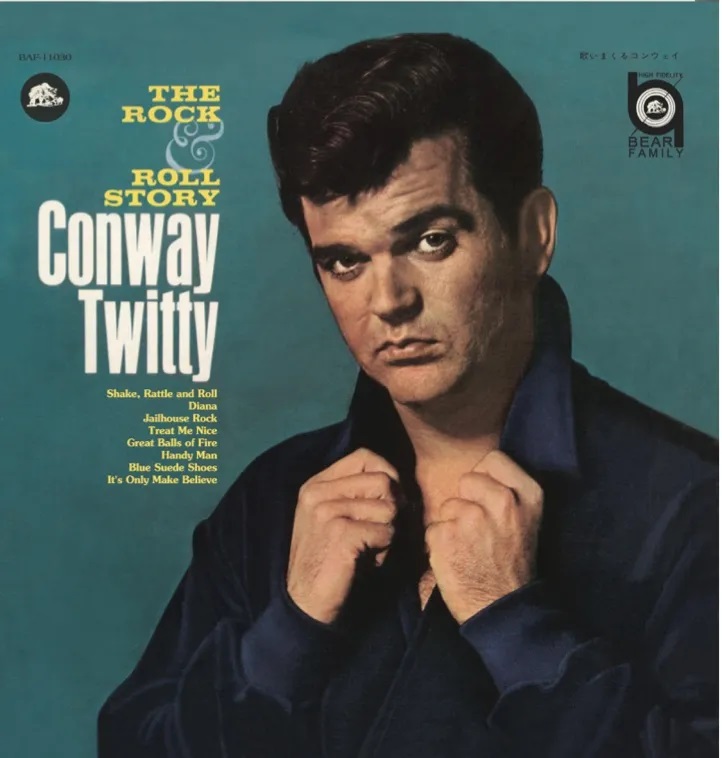 |
THE
ROCK & ROLL STORY/ CONWAY TWITTY
Bear Family bracht al een dertigtal platen uit in hun reeks 10 inch
heruitgaves op gekleurd vinyl en dit is de 1:1 reproductie van de
uiterst zeldzame Japanse 10 inch versie van The Rock & Roll Story,
eind 1960 in het kielzog van de hits It's Only Make Believe, Danny
Boy en Lonely Blue Boy reeds de vijfde LP van de in 1993 op 59-jarige
leeftijd overleden Conway Twitty. Je kan het je heden ten dage niet
voorstellen maar die LP bestond volgens een in de jaren '50 gangbare
praktijk volledig uit covers van andermans rock 'n' roll hits zoals
Shake Rattle And Roll, Great Balls Of Fire en als minst bekende nummer
Jimmy Jones' Handy Man, aangevuld met Twitty's eigen uit 1958 daterende
It's Only Make Believe, de derde keer reeds dat It's Only Make Believe
op een Conway Twitty LP stond! Naast Paul Anka's Diana is dat trouwens
de enige ballad hier. Die MGM LP verscheen ook in Japan (én
in Canada én in Brazilië én in Zuid-Afrika én
in Duitsland) en is sindsdien al een aantal keer heruitgebracht met
andere hoezen, maar dit is dus de Japanse 10 inch versie met acht
van de twaalf songs van de LP, want Reelin' And Rockin, Whole Lotta
Shakin' Goin' On, Splish Splash en The Girl Can't Help It stonden
niet op die 10 inch. Wel bevat de heruitgave vier andere bonussongs
waardoor het totaal aantal tracks opnieuw op twaalf komt. Twitty's
covers van die greatest hits of rock 'n' roll zijn goeie rockers maar
ingehouden, clean en proper gewassen achter de oren. Met Jailhouse
Rock, Treat Me Nice en een op Elvis geïnspireerd Blue Suede Shoes
werd duidelijk de Elvis kaart getrokken, niet verwonderlijk omdat
Elvis uiteraard de king was en omdat Twitty's stem gelijkenissen met
Elvis vertoont. Daarenboven werden de enige echte Jordanaires ingehuurd
om de backings te verzorgen, helaas ook een van de redenen waarom
het pure rock 'n' roll gehalte van deze covers wordt afgezwakt want
zij smeren een extra laagje stroop op de op zich uitstekende potpourri
van songs. De nummers klinken goed gerodeerd alsof Twitty ze al jaren
live zong, de arrangementen zijn okee, en Twitty geeft aan alle songs
zijn eigen draai door de tekst aan te passen en regelmatig zijn karakteristieke
kreun te laten vallen, maar toch zijn dit toch vrij generische uitvoeringen
even opwindend als een broodje tonijn zonder mayonaise. Wat de plaat
redt is Twitty's uitstekende zang (hij had ook toen al gouden longen,
zoveel is duidelijk) en het bij momenten vlijmscherpe gitaarwerk,
naar ik aanneem van Grady Martin aangezien dit werd opgenomen in Nashville
met het vaste A-Team, maar Floyd Cramer (piano) en Boots Randolph
(sax) doen helaas weinig meer dan hun plicht. Veelzeggend is dan ook
dat van deze plaat slechts vijf nummers op de Bear Family CD Conway
Rocks (BCD16670) staan en daarvan is er één de ballade
It's Only Make Believe en behoren er drie tot de bonustracks hier.
Die bonustracks zijn het fluitende Platinum High School, I Vibrate
(From My Head To My Feet), Long Black Train en nog meer Elvis met
een vingerknippend Heartbreak Hotel. Die werden alle vier met dezelfde
muzikanten opgenomen voor MGM tussen 1958 en 1960 en passen naadloos
in de context van de andere nummers, met Long Black Train en I Vibrate
(From My Head To My Feet) als positieve uitschieters wegens rockabilly
zonder achtergrondkoortje.
Up till now Bear Family released some thirty records in their series
of 10 inch re-issues on colored vinyl and this is the 1:1 reproduction
of the extremely rare Japanese 10 inch version of The Rock & Roll
Story, at the end of 1960 already Conway Twitty's fifth LP in the
wake of his hits It's Only Make Believe, Danny Boy and Lonely Blue
Boy. You can't imagine it nowadays but that LP consisted, according
to a common practice in the 1950s, entirely of covers of rock 'n'
roll hits by other artists such as Shake Rattle And Roll, Great Balls
Of Fire and Jimmy Jones' Handy Man as the least known tune, supplemented
by Twitty's own It's Only Make Believe from 1958, the third time It's
Only Make Believe made its way onto a Conway Twitty LP. Next to Paul
Anka's Diana that's the only ballad here. The MGM LP also appeared
in Japan (and in Canada and in Brazil and in South Africa and in Germany)
and has since been re-released several times with different covers,
but this is the Japanese 10 inch version with eight of the twelve
songs from the LP as Reelin' And Rockin', Whole Lotta Shakin' Goin'
On, Splish Splash and The Girl Can't Help It were not on the original
10 inch. The re-issue includes however four bonus songs bringing the
total number of tracks back to twelve. Twitty's covers of these greatest
hits of rock 'n' roll are good rockers but restrained, clean and washed
behind the ears. With Jailhouse Rock, Treat Me Nice and an Elvis inspired
Blue Suede Shoes they clearly pulled the Elvis trump card, no surprise
as Elvis was of course the king and Twitty's voice bears a resemblance
to Elvis. On top of that the one and only Jordanaires were hired to
provide the backings, unfortunately also one of the reasons why the
pure rock 'n' roll content of these covers is diluted because they
smear an extra layer of syrup on the in itself excellent mix of songs.
The songs themselves sound well practised as if Twitty had been singing
them live for years, the arrangements are okay, and Twitty puts his
own spin on all the songs by adjusting the lyrics and regularly dropping
his signature moan, but still these are rather generic versions about
as exciting as a tuna sandwich without mayonnaise. What saves the
day is Twitty's excellent vocals (even back then he had golden lungs,
that much is clear) and the at times razor sharp guitar work, I assume
by Grady Martin since this was recorded in Nashville with the regular
A-Team, but Floyd Cramer (piano) and Boots Randolph (sax) unfortunately
do little more than their duty. It's significant that only five of
the songs from this record are on Bear Family's Conway Rocks BCD16670
CD, and of those one is the ballad It's Only Make Believe and three
are among the bonus tracks here. The bonus tracks are the whistling
Platinum High School, I Vibrate (From My Head To My Feet), Long Black
Train and more Elvis with a fingersnapping Heartbreak Hotel. All four
were recorded with the same musicians for MGM between 1958 and 1960
and fit seamlessly into the context of the other songs, with Long
Black Train and I Vibrate (From My Head To My Feet) being positive
standouts because they're rockabilly without backing vocals. |
![]()
CD Recensies
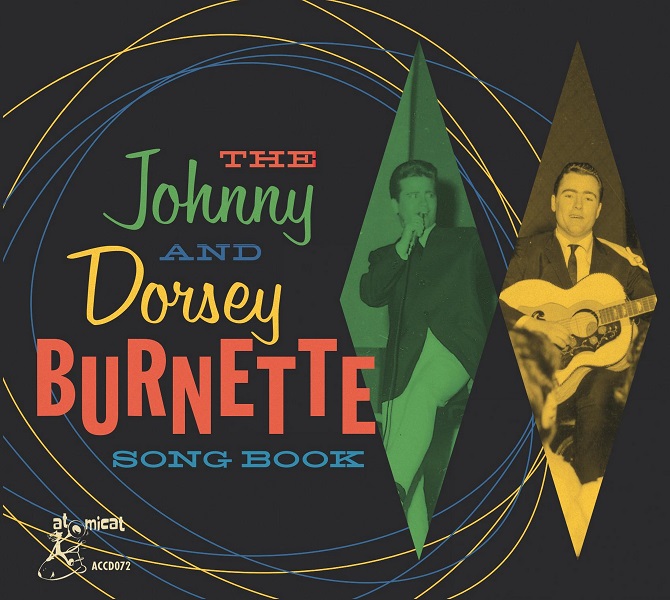 |
THE
JOHNNY AND DORSEY BURNETTE SONG BOOK
Johnny en Dorsey Burnette personifiëren op hun tweetjes zowat
de complete geschiedenis van de rock 'n' roll in een notendop van
hardcore rockabilly over highschool tot country. Dat ze niet alleen
songs voor zichzelf maar vooral ook voor andere artiesten schreven
is algemeen bekend en werd reeds gedocumenteerd op de driedelige Like
What We Wrote CD reeks in 2007-2010 verschenen op Hydra Records (D)
die deels overlapt met dit songboek: de helft van de songs hier staan
ook op Like What We Wrote. The Johnny And Dorsey Burnette Song Book
is dan ook gebaseerd op hetzelfde concept: samensteller DJ Mark Armstrong
selecteerde naast vier nummers van de broers samen of solo 26 Burnette
composities 1956-1963 uitgevoerd door andere artiesten. Een goeie
zaak is dat daarbij niet werd geopteerd voor de meest voor de hand
liggende uitvoeringen zoals Believe What You Say en Waitin' In School
door Ricky Nelson of Bertha Lou door Johnny Faire, maar voor veel
minder bekende versies zoals de primitieve Spaanstalige Bertha Lou
door Los Zodiac uit Peru, Believe What You Say door Little Tony &
his Brothers uit Italië en Waitin' In School door Frankie Lymon,
niet de enige zwarte artiest die maar wat graag de songs van de Burnette
broers gebruikte: op deze CD staat ook Roy Brown met Hip Shakin’
Baby en Be My Love Tonight. Het spelletje hierbij is natuurlijk je
te proberen in te beelden hoe deze songs zouden hebben geklonken door
de Burnettes zelf, want in een aantal van deze songs hoor je inderdaad
probleemloos Johnny en Dorsey klinken. Misschien hadden sommige songs
ook béter geklonken met Johnny en Dorsey, want ik mis soms
de productiewaarden van Liberty Records, het label waarop Johnny zijn
grootste successen scoorde. Andere songs klinken dan weer meer Ricky
Nelson als Johnny Burnette zoals Jackie Walker's Good Good Feelin',
wellicht omdat een tiental nummers hier verschenen op Imperial Records,
het label van Ricky Nelson, de eerste grote afnemer van de Burnettes
als songschrijvers, dus dubbelde James Burton misschien wel op gitaar.
Alles bij elkaar geeft dat een prima selectie ongefilterde rock 'n'
roll en rockabilly zoals - ik noem willekeurig - Johnny Garner's Kiss
Me Sweet en Deane Hawley's exotische Bossman. Myron Lee's School's
Out is een early sixties interpretatie van de Bo Diddley beat en de
CD bevat zelfs een instrumental, Blue Saturday van The Checkers, een
soort snelle rock 'n' roll versie van Last Date van Floyd Cramer.
Bekende namen zijn Gene Vincent (My Heart en I’ve Got To Get
You Yet), Ricky Nelson (One Of These Mornings en de sixties stroller
Gypsy Woman), Bob Luman (Whenever You're Ready) en Jerry Lee Lewis
(As Long As I Live), maar de nobele onbekenden zijn dik in de meerderheid.
Opvallend maar uiteindelijk niet zo verwonderlijk: verschillende van
de songs hier werden in 2001 opgenomen door Johnny's zoon Rocky Burnette
begeleid door Darrel Higham & the Enforcers op hun CD Hip-Shakin'
Baby: A Tribute To Johnny & Dorsey Burnette. De vier nummers gezongen
door de broers zelf zijn het gedreven Warm Love, de rocka-cha cha
Lonesome Tears In My Eyes, Johnny's Me And The Bear dat de overgang
markeerde tussen de rockabilly van het Rock 'n' Roll Trio naar pop
rock, en Dorsey's originele versie van Whenever You're Ready getiteld
Let's Fall In Love. Een interessante uitgave omdat er gefocust wordt
op een minder bekende kant van de Burnettes! Info: www.vintagerockinroots.com
(Frantic Franky) Johnny and Dorsey Burnette personify just about the entire history of rock 'n' roll in a nutshell from hardcore rockabilly over highschool to country . It's common knowledge that they not only wrote songs for themselves but also for other artists, as already documented on the three Like What We Wrote CDs released by Hydra Records (D) in 2007-2010 that partly overlap with this Song Book: half of the songs here are also on Like What We Wrote. That is not surprising since The Johnny And Dorsey Burnette Song Book is based on the same concept: compiler DJ Mark Armstrong selected 26 Burnette compositions 1956-1963 performed by other artists and added four songs sung by the brothers together or solo. The good thing is he didn't opt for the most obvious versions like Ricky Nelson's Believe What You Say and Waitin' In School or Johnny Faire's Bertha Lou, but went for much lesser known versions like the ultra primitive Bertha Lou sung in Spanish by Los Zodiac from Peru, Believe What You Say by Little Tony & his Brothers from Italy and Waitin' In School by Frankie Lymon, not the only black artist who benefited from the Burnette brothers' songs: the CD also features Roy Brown with Hip Shakin' Baby and Be My Love Tonight. The game is of course to try to imagine how these songs would have sounded if sung by the Burnettes themselves, because in a number of these songs you can indeed hear Johnny and Dorsey. Some of the songs might also have sounded better if sung by the brothers, as several recordings here lack the production values of Liberty Records, the label on which Johnny scored his biggest hits. Other songs sound more Ricky Nelson than Johnny Burnette like Jackie Walker's Good Good Feelin', probably because about ten of the songs here were released on Imperial Records, home to Ricky Nelson, the first major buyer of their songs, so maybe James Burton doubled on guitar. All in all this makes for a fine selection of unfiltered rock 'n' roll and rockabilly such as - randomly - Johnny Garner's Kiss Me Sweet and Deane Hawley's exotic Bossman. Myron Lee's School's Out is an early sixties interpretation of the Bo Diddley beat and the CD even includes an instrumental, Blue Saturday by The Checkers, a sort of fast rock 'n' roll version of Floyd Cramer's Last Date. Big shots include Gene Vincent (My Heart and I've Got To Get You Yet), Ricky Nelson (One Of These Mornings and the sixties stroller Gypsy Woman), Bob Luman (Whenever You're Ready) and Jerry Lee Lewis (As Long As I Live), but the majority of the artists belong to the great unknowns. Noteworthy but perhaps not surprising: several of the songs here were recorded in 2001 by Johnny's son Rocky Burnette accompanied by Darrel Higham & the Enforcers on their CD Hip-Shakin' Baby: A Tribute To Johnny & Dorsey Burnette. The four songs sung by the brothers themselves are the driving Warm Love, the rocka-cha cha Lonesome Tears In My Eyes, Johnny's Me And The Bear which marked the transition from the Rock 'n' Roll Trio's rockabilly to pop rock, and Dorsey's original version of Whenever You're Ready titled Let's Fall In Love. An interesting release because it showcases the lesser known side of the Burnette brothers! Info: www.vintagerockinroots.com (Frantic Franky) |
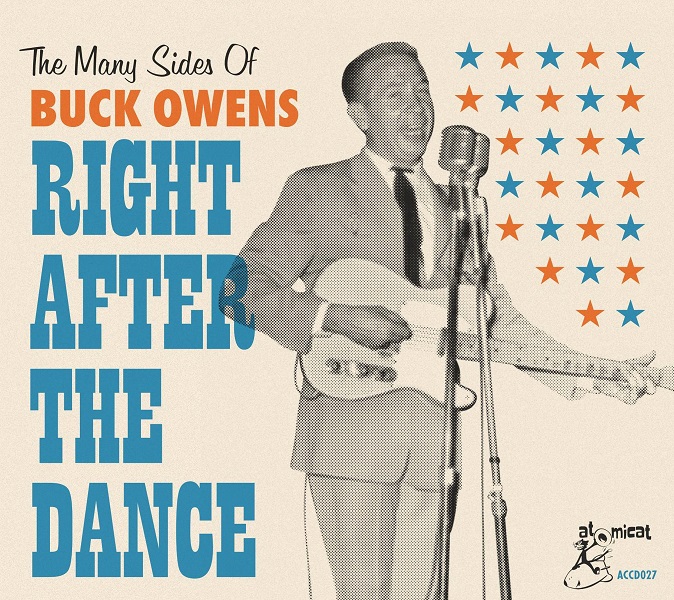 |
RIGHT
AFTER THE DANCE/ BUCK OWENS
De in 2006 op 76-jarige leeftijd overleden countryzanger Buck Owens
is erg populair in rock 'n' rol kringen omdat zijn goedgeluimde Bakersfield
sound ongecompliceerd rollende uptempo en medium tempo country is
met eenvoudige, welluidende melodietjes en uit het hart gegrepen opgewekte
teksten, het soort muziek waar u zo gek op bent in de uitvoering van
The Country Side Of Harmonica Sam. Die populariteit is opmerkelijk
omdat Owens' carrière piekte van de eerste helft van de jaren
'60 tot de eerste helft van de jaren '70, maar als u Owens goed vindt
bent u niet alleen: Buck Owens is de enige countryzanger ooit gecoverd
door The Beatles die zijn Act Naturally uit 1963 in 1965 opnamen als
B-kant van Yesterday. Maar zelfs als u noch van The Beatles noch van
Buck Owens houdt dan nog vindt u daar die enkel en alleen naar rockabilly
luistert de man misschien goed zonder het zelf te weten: Owens nam
in 1956 één rockabilly single op onder de schuilnaam
Corky Jones, en Hot Dog/ Rhythm And Booze is verrekte goed spul. Wie
evenwel hoopte op meer van dat op deze CD is er aan voor de moeite:
naast die single bevat deze door DJ Mark Armstrong samengestelde The
Many Sides Of Buck Owens voor meer dan de helft vroeg Bakersfield
werk zoals Excuse Me, Foolin' Around, Kickin' Our Hearts Around, Nobody's
Fool But Yours, You're For Me en Second Fiddle met inderdaad fiddle,
steel gitaar en alles erop en eraan. Een aantal van die nummers zijn
niet onbekend: Above And Beyond, Under Your Spell Again en Under The
Influence Of Love bijvoorbeeld waren in 1959-1961 dikke country hits.
Down On The Corner Of Love en It Don't Show On Me zijn meer traditionele
klaaglijke country, soms met Hank Williams invloed zoals in Right
After The Dance. Opvallend: een countryversie van Save The Last Dance
For Me van The Drifters met mandoline! Die 16 nummers zijn een deel
van maar niet ál zijn vroegste singles van 1956 tot 1962, inclusief
beide kantjes van zijn duetsingle met Rose Maddox, Mental Cruelty/
Loose Talk uit 1961. Staat hier dan buiten Hot Dog/ Rhythm And Booze
geen rock 'n' roll op? Toch wel: Sweet Thing, in 1957 zijn eerste
Capitol single, is een mooi staaltje existentiële blanke rock
'n' roll (de B-kant, de standaard country ballade I Only Know That
I Love You, staat niét op de CD). In die vroege jaren was Owens
ook vaak te horen als achtergrondzanger of gastmuzikant bij andere
artiesten en daarvan staan op deze CD tien voorbeelden die het hele
gamma overlopen van primitieve rockabilly (Bill Woods' Bop) en rock
'n' roll (Go Crazy Man van diezelfde Bill Woods) over rockende hillbilly
(Cousin Herb Henson’s Trading Post Group's Looking Back To See,
Jean Sheppard's Sad Singin' And Slow Ridin), countrybilly (Tommy Collins'
Whatcha Gonna Do Now, The Farmer Boys' Flash Crash And Thunder) en
country boogie (Bud Hobbs & his Trail Herders' Goose Rock) tot
pure country (Take Me van Owens' echtgenote Bonnie Owens), gestroomlijnde
rock 'n' roll (Tommy Sands' Hey Miss Fannie) en pure rockabilly (Wanda
Jackson's I Gotta Know). Op één nummer doet Owens niet
mee, een cover van Hot Dog door ene Pico Pete die even primitief klinkt
als Owens zelf op zijn eigen Rhythm And Booze. De CD bevat in totaal
30 tracks en als u nog niet teveel van die vroege Buck Owens hebt
kan deze Right After The Dance er gerust bij. Goeie geluidskwaliteit
ook! Info: www.vintagerockinroots.com
(Frantic Franky) Country singer Buck Owens who died in 2006 at the age of 76 is quite popular in rock 'n' roll circles because his optimistic Bakersfield sound is uncomplicated uptempo and medium tempo rollin' country with simple, nice sounding melodies and upbeat lyrics straight from the heart, the type of music you're all crazy about when played by The Country Side Of Harmonica Sam. That popularity is remarkable because Owens' career peaked from the first half of the 1960s to the first half of the 1970s, but if you dig Owens you're not alone: Buck Owens is the only country singer covered by The Beatles who in 1965 recorded his Act Naturally from 1963 as the B-side for Yesterday. But even if you like neither The Beatles nor Buck Owens you there who only listens to rockabilly and nothing else may like the guy without realising it: Owens recorded one rockabilly single in 1956 under the pseudonym Corky Jones, and Hot Dog / Rhythm And Booze is darn good stuff. However if you're expecting more material in that vein you came to the wrong place: more than half of the 30 tracks compiled on The Many Sides Of Buck Owens by DJ Mark Armstrong are early examples of the Bakersfield sound like Excuse Me, Foolin' Around, Kickin' Our Hearts Around, Nobody's Fool But Yours, You're For Me and Second Fiddle with indeed fiddle, steel guitar and all the trimmings. A couple of these sound familiar: Above And Beyond, Under Your Spell Again and Under The Influence Of Love for example were big country hits in 1959-1961. Down On The Corner Of Love and It Don't Show On Me are more traditional plaintive country, sometimes with a Hank Williams influence like in Right After The Dance. Remarkable is a country version of The Drifters' Save The Last Dance For Me with mandolin! Those 16 songs are some but not all of Owens' earliest singles from 1956 to 1962, including both sides of his 1961 duet single with Rose Maddox, Mental Cruelty / Loose Talk. So is there no rock 'n' roll on here except for Hot Dog / Rhythm And Booze? Yes there is: Sweet Thing, in 1957 his first Capitol single, is a fine example of existential white rock 'n' roll (the B-side, the standard country ballad I Only Know That I Love You, is not on the CD). In those early years Owens could often be heard as a backing vocalist or musician for other artists and the CD presents ten such examples, ranging from primitive rockabilly (Bill Woods' Bop) and rock 'n' roll (Go Crazy Man by the same Bill Woods) over rockin' hillbilly (Cousin Herb Henson's Trading Post Group's Looking Back To See, Jean Sheppard's Sad Singin' And Slow Ridin'), countrybilly (Tommy Collins' Whatcha Gonna Do Now, The Farmer Boys' Flash Crash And Thunder) and country boogie (Bud Hobbs & his Trail Herders' Goose Rock) to pure country (Take Me by Owens' wife Bonnie Owens), streamlined rock 'n' roll (Tommy Sands' Hey Miss Fannie) and pure rockabilly (Wanda Jackson's I Gotta Know). On one track Owens does not participate himself, a cover of Hot Dog by one Pico Pete who sounds as primitive as Owens himself on his own Rhythm And Booze. If you haven't got too much of that early Buck Owens already, this Right After The Dance is a worthy addition. Good sound quality too! Info: www.vintagerockinroots.com (Frantic Franky) |
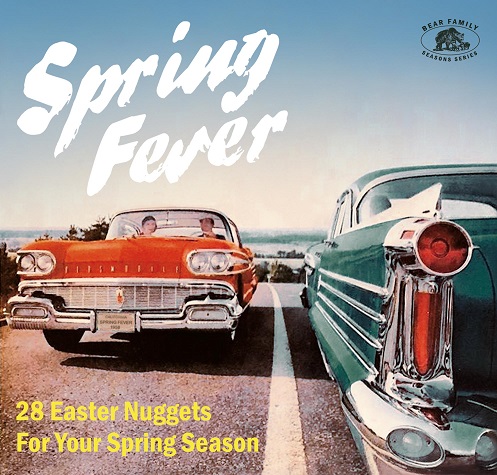 |
SPRING
FEVER De
lente is in't land maar 't zijn momenteel vooral aprilse grillen:
de ene week barbecueën in de tuin in je short en de week erna
sneeuw, hagel en storm! Gelukkig brengt Bear Family na seizoensgroeten
uit de zomer, de herfst en de winter (diverse kerst CD’s) het
zonnetje in huis met deze lente CD, tegelijk de opvolger voor hun
paas-CD Easter Bunny Hop (BCD17507) want meer dan één
derde van de 28 tracks 1936-1963 gaan over kippen, hanen en konijnen.
Twee gaan er zelfs over eieren met bijvoorbeeld The Charioteers wier
rustige vocal harmony swing One Fried Egg de schoonheid van een gebakken
ei bezingt. Gelukkig zaten ze niet met de gebakken peren, hahaha.
Pakweg de helft van de nummers zijn ongebreideld romp en stompende
rock 'n' roll zoals The Pentagons' It's Spring Again, Vilas Craig
& the Kollege Kings' ietwat King Creole-achtige Spring Fever en
The Jaye Brothers' joviale jiver Ain't Nobody Here But Us Chickens,
afgewisseld met rockabilly van op de boerderie (Ray Coleman &
his Skyrockets' Rock Chicken Rock), country boogie (Chuck Bowers'
Ole Mister Cottontail), big band rock 'n' roll (Ray Anthony's instrumentale
Bunny Hop Twist) en gitaarinstro’s (Jimmie Volk & the Matched
Aces' Spring Time Rock). Met instrumentals kan je titelgewijs alle
kanten uit, wat betekent dat er tien instrumentals op deze CD staan.
De chicken reel is een bekende fingerpicking oefening om je gitaar
te doen kakelen als een kip zoals Les Paul demonstreert in het tekenfilmachtige
Chicken Reel, een techniek die ook in de rockabilly zijn vruchten
afwierp, luister maar naar Fat Daddy Holmes' fantastische Chicken
Rock. Nog kipcorn instrumentals: Link Wray's ultieme vechtnummer Run
Chicken Run, Ike Turner's meesterwerk van twangy gitaar en wailende
sax The Rooster, en omdat kippen eieren leggen gitaarrocker Egghead
van Al Allen. Spring
is in the air but at the moment it's real shitty weather: one week
B-B-Q in the garden in bermuda shorts and Hawaiian shirt, the next
week snow, hail and thunderstorms! Fortunately after season's greetings
from summer, autumn and winter (various Christmas CDs) Bear Family
is on hand to bring us some sunshine with this spring CD, at the same
time the unofficial successor to their easter CD Easter Bunny Hop
BCD17507 as one third of the 28 tracks 1936-1963 are about chickens,
roosters and rabbits. Two are even about eggs, like The Charioteers'
calm vocal harmony swing One Fried Egg which celebrates the beauty
of a fried egg. Roughly half the songs are unbridled romp and stompin'
rock 'n' roll like The Pentagons' It's Spring Again, Vilas Craig &
the Kollege Kings' somewhat King Creole-esque Spring Fever and The
Jaye Brothers' jovial jiver Ain't Nobody Here But Us Chickens, interspersed
with down on the farm rockabilly (Ray Coleman & his Skyrockets'
Rock Chicken Rock), country boogie (Chuck Bowers' Ole Mister Cottontail),
big band rock 'n' roll (Ray Anthony's instrumental Bunny Hop Twist)
and guitar instros (Jimmie Volk & the Matched Aces' Spring Time
Rock). With the titles of instrumentals you can evoke everything,
which means there are ten instrumentals on the CD. The chicken reel
is a well known fingerpicking exercise to make your guitar cluck like
a chicken as demonstrated by Les Paul in the cartoon-like Chicken
Reel, a technique also used in rockabilly, just listen to Fat Daddy
Holmes' fantastic Chicken Rock. More corn fed instrumentals: Link
Wray's ultimate fighting song Run Chicken Run, Ike Turner's masterpiece
of twangy guitar and wailing sax The Rooster, and because chickens
lay eggs Al Allen's guitar rocker Egghead. |
7 aprill 2021
![]()
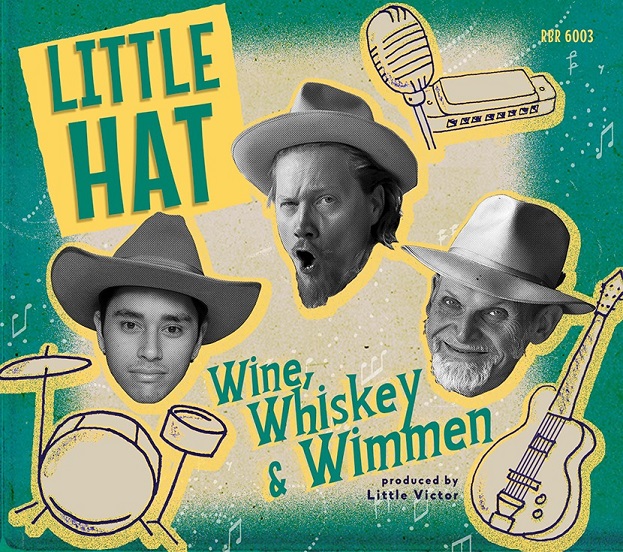 |
WINE,
WHISKEY & WIMMEN/ LITTLE HAT
Little Hat is een Nederlands bluestrio dat debuteerde in 2017 waar
iedereen blijkbaar nogal wild van is, en in zulk geval beschouwen
wij het als onze plicht mee te luisteren, ook al omdat u dit ongetwijfeld
gaat tegenkomen in de bakken: hun debuut is uit op rock 'n' roll label
Rhythm Bomb en het artwork ziet er ten zeerste rockabilly uit. Opvallend:
voor dat debuut huurde Little Hat als producer Little Victor alias
Victor Mac in, de Beale Streat Blues Bopper die als geen ander thuis
is in de oude bluesstijlen waarin Little Hat grossiert. Blues dus,
wat niet verrast want Machiel Meijers (zang, mondharmonica) en Willem
van Dullemen (gitaar) komen uit de in Chicago blues gespecialiseerde
band Stackhouse (twee CD’s, Big Fish Boogie in 2013 en Tailgatin'
in 2016), en ook Paolo de Stigter (drums) zat in het blues roots idioom
met de Thomas Toussaint Band (de 6 track CD Groovin' On Up in 2016).
Geen bassist, wat betekent dat alles terugvalt op mondharmonica en
gitaar, en dat levert een zeer scherp klinkende CD op met een energieke
live feel. Little Hat is a Dutch blues trio which debuted in 2017 that everyone seems to be pretty wild about, and in such a case we consider it our duty to give it a listen, also because you're bound to come across this in the bins: their debut is out on rock 'n' roll label Rhythm Bomb and the artwork looks very rockabilly. Noteworthy: for their debut Little Hat hired Little Victor aka Victor Mac as producer, the Beale Streat Blues Bopper who is more than anyone else at home in the old blues styles in which Little Hat specialises. So this is indeed blues, not a big surprise as Machiel Meijers (vocals, harmonica) and Willem van Dullemen (guitar) come from the Chicago blues band Stackhouse (two CDs, Big Fish Boogie in 2013 and Tailgatin' in 2016) while Paolo de Stigter (drums) was also involved in the blues roots idiom with the Thomas Toussaint Band (the 6 track CD Groovin' On Up in 2016). That's right, no bass, which means everything falls back on harmonica and guitar, resulting in a very sharp sounding CD with an energetic live feeling. The CD contains 14 covers, all with mouth harp of course, hipswinging to on the one hand uptempo material like Little Walter's Just Keep Lovin' Her, blues rockers like Jerry Morris' Clema, Little Junior Parker's Barefoot Rock, Joe Hill Louis' Boogie In The Park and Sunnyland Slim's Highway 61, and scorching slide blues trashers like Jerry McCain's Cutie Named Judy and Hound Dog Taylor's Gimme Back My Wig, and on the other hand to calmer atmospheric blues like Little Walter's Ora Nelle Blues and medium tempo boogie like Titus Turner's Big John From Mississippi and Alexander "Papa" Lightfoot's Wine Whiskey & Wimmen. Things slow down with a couple of blues ballads like Lazy Lester's If You Think I've Lost You and Blue Smitty's Elgin Movements, Dr. Ross' Cat Squirrel is a blues bopper with a psychedelic voodoo beat, and Clarence "Bon Ton" Garlow's Sound The Bell even adds a touch of gospel. Nothing new under the blues sun, but solidly executed and therefor good news for all of you out there who dig, say, The Kokomo Kings. If it has to be blues then I prefer these blues, for I am beginning to understand why people like guitarist Joe Sixpack are raving about this. The official release date is April 30. Info: www.littlehatband.com en www.vintagerockinroots.com (Frantic Franky) |
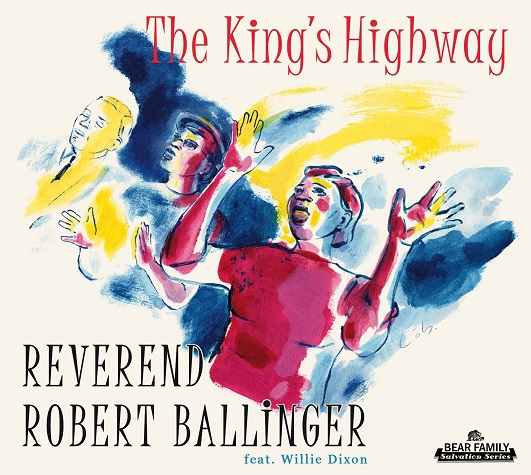 |
THE
KINGS'S HIGHWAY/ New
on Bear Family: the Salvation gospel series! My introduction to gospel
like probably for many of you were Elvis' gospel albums and the early
recordings of Sam Cooke when he fronted The Soul Stirrers, but this
double CD with approx. 90 minutes of music has nothing to do whatsoever
with Sam Cooke's honey-voiced praising of the Lord. Yes, this is glory
to the Lord up above, sure, but if you never delved deeper into gospel
than James Brown in The Blues Brothers this singing pastor will scare
you shitless. The King's Highway contains Reverend Robert Ballinger's
complete officially released recordings, recorded from 1952 to 1963
for Chess, Peacock, United and Artistic, good for two LP’s,
Swing Down Chariot and Little Black Train, and four singles, not counting
singles that were also on those LP’s. All of these are on this
double album, supplemented by five songs that were not released until
1997. Reading the 32 page booklet, however, this is not Ballinger's
complete work, as there are apparently still unreleased Chess and
United recordings. Despite that output we don't know who Reverend
Robert Ballinger was: there was no picture of him on those records
and the detectives from Bear Family haven't been able to dig up a
photo of him either. All tracks are studio recordings with a high
live factor and electrifying vocals worthy of a blues shouter on top
of a pumping brothel piano (sometimes an organ), with never more than
a trio line-up of piano, double bass and drums, sometimes accompanied
by a vocal gospel quartet. I can hear a bit of Ray Charles in it,
but of course Charles was also completely steeped in gospel. The Chess
recordings (one single) were done under the supervison of producer
and double bassist Willie Dixon who must have been listening carefully
when Ballinger canned the Rosetta Tharpe cover This Train, because
Dixon reworked that song to put his own composition My Babe, first
recorded by bluesman Little Walter before it became a rock 'n' roll
classic, into its definitive form. Sinners, this is the real deal,
with a raw intensity that would scare the devil himself and has more
to do with blues power than with the sanctified soul of The Five Blind
Boys Of Mississippi, Alabama or anywhere else. The booklet puts the
recordings in perspective and Bear Family producer Nico Feuerbach
managed to find some announcements of Ballinger's sermons in old newspapers,
but a proper bio is still missing. Whether any of Ballinger's family
is still alive is not mentioned: Ballinger himself died in 1965 at
the age of only 44 (cause of death unknown), his son died in 2013. |
|
|
JUMP,
JIVE & WAIL: THE VERY BEST OF/ LOUIS PRIMA
Toen ik een eeuwigheid geleden in de rock 'n' roll begon was trompettist
Louis Prima al een buitenbeentje: onwaarschijnlijk swingende muziek
gebracht door een opa met een duivenmelkerspet op, maar de disk jockey
kon op elk trouw- of communiefeest de dansvloer in een mum van tijd
vol laten lopen door Buona Sera op te leggen. De platen waren courant
verkrijgbaar en dus kocht ik ze, en het duurde niet lang of ik wou
dat ik net als Louis Prima Italiaans bloed door mijn aderen had stromen.
Het werk van Louis Prima is denk ik sinds de jaren '50 nooit uit de
handel geweest en nog steeds courant te verkrijgen op een niet aflatende
stroom re-issues, dus waarom nog drie Louis Prima CD’s erbij
kopen? Nou, omdat een mens nooit genoeg prima Prima in huis kan hebben
(de drie CD’s samen bevatten 83 tracks), omdat Jasmine toch
weer een aparte invalshoek vond, omdat deze drie CDs multi-labelig
zijn en niet alleen de bekende Capitol opnames maar ook materiaal
verschenen op RCA Victor, Mercury, Prima's eigen Robin Hood label,
Columbia, Decca en Jubilee bevatten, en natuurlijk niet in de laatste
plaats omdat dit de swingendste rock 'n' roll ooit gemaakt is, niet
verwonderlijk als je weet dat Prima in de jaren '50 al een veteraan
was met meer dan twintig jaar op de teller: hij begon zijn carrière
reeds in de eerste helft van de jaren '20 en maakte zijn eerste plaatopnames
in 1933! En eigenlijk heeft ie al die tijd gewoon exact hetzelfde
gedaan, dus tegen midden jaren '50 zat de routine er echt wel in gebakken
en leidde koning Louie een show die uitzonderlijk goed gerodeerd was.
Veel van zijn klassiekers had ie trouwens al eerder opgenomen in de
jaren '40, zoals u ongetwijfeld weet als u al eens een budget CD'tje
van hem kocht. Als u wil weten hoe goed Prima's timing en hoe humoristisch
zijn optredens waren, zoek dan op YouTube naar de vele live clipjes
(pas op, als je die begint te kijken kan je niet stoppen) en besef
dat Louis Prima veel meer was dan zomaar een entertainer: hij was
een showman par excellence die als geen ander zijn publiek aanvoelde,
en bovendien de hipste aller cats. When
I first got into rock 'n' roll an eternity ago, trumpeter Louis Prima
was already not your average rock 'n' roll star: incredibly swinging
music performed by a grandfather wearing a milkman's cap, but at any
wedding or family gettogether the disc jockey could fill the dance
floor in no time by playing Buona Sera. His records were readily available
so I bought them, and it wasn't long before I wished I had Italian
blood running through my veins just like Louis Prima. To my knowledge
his body of work has never been out of print since the 1950s and it's
still widely available on a never-ending stream of re-issues, so why
buy three more Louis Prima CDs? Well, because one can never have enough
Prima (these three CDs together contain 83 tracks), because Jasmine
found a different angle, because the CDs are not restricted to the
well known Capitol recordings but also contain material released on
RCA Victor, Mercury, Prima's own Robin Hood label, Columbia, Decca
and Jubilee, and of course because this is the swinginest rock 'n'
roll ever made, which should come as no surprise given the fact that
in the 1950s Prima was already a veteran with over twenty years under
his belt: his career started in the first half of the 1920s and he
made his first recordings in 1933! In fact he had been doing exactly
the same thing all this time, so by the mid-fifties he knew all the
tricks of the trade and King Louie was running a show that was exceptionally
well put together. Many of his classics he'd already recorded before
in the 1940s, as I'm sure you know if you ever bought one of the many
Louis Prima budget CDs. If you want to know how good Prima's timing
was and how humorous his performances, search YouTube for the many
live clips (beware, once you start watching them you can't stop) and
realize that Louis Prima was much more than just an entertainer: he
was a showman par excellence who felt the pulse of his audience like
no one else, and he was also the hippest of the cats. |
![]()
Streaming Recensie
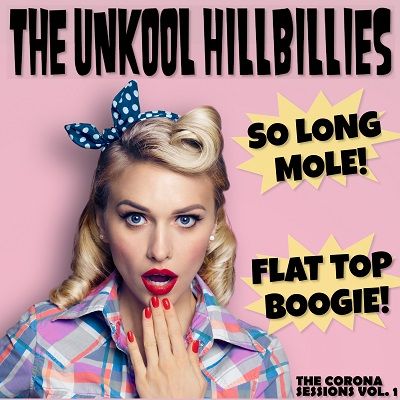 |
FLAT TOP BOOGIE/ THE UNKOOL HILLBILLIES
Volgend jaar vieren ze hun twintigste verjaardag, de bijzonder coole
Unkool Hillbillies, de Zweedse band die wel rock 'n' roll maar geen
hillbilly speelt en dat ook al bij ons deed op onder meer Rock Around
Giethoorn en Sweetlake Rock 'n' Roll Revival in Zoetermeer.
Next year they will celebrate their twentieth anniversary, The Unkool
Hillbillies, the cool Swedish band that plays rock 'n' roll but not
hillbilly. This digital only release is from their first recording
session in five years and the subtitle The Corona Sessions Vol. 1
indicates there's more to follow, maybe even a sixth album to celebrate
that 20th anniversary in style. For the moment being they present
two brand new songs of which Flat Top Boogie was written by pianist
Anders Umegård together with ex-bassist Ove Andersson, a nice
fast straightforward piano rocker with a driving rhythm, stop/start
pattern and two flashing guitar solos of which one alternates with
steel guitar. So Long Mole by British songwriter Patrick Gubbins whom
I never heard of, was written specifically for The Unkool Hillbillies,
which means it's very similar to Flat Top Boogie, just like many songs
on their albums are often in the same style. This song features sax
(Otto Gryting who honk for The Unkool Hillbillies before), a twisting
drumbeat and a piano solo. There's no harmonica or other extra instruments
unlike usually on their albums and both tracks are less wild than
the wall of sound that characterized especially their first albums.
The vocals vibrate a bit and sometimes seem not 100% in sync with
the rhythm. Both songs are crammed in under / just over two minutes
and the endings are not really inspired because both songs, well,
just kinda stop. Nevertheless: play loud and this sounds nice, and
therefore it's a nice digital Spotify treat for fans of solid gold
jukebox rock 'n' roll. |
31 maart 2021
![]()
CD Recensies
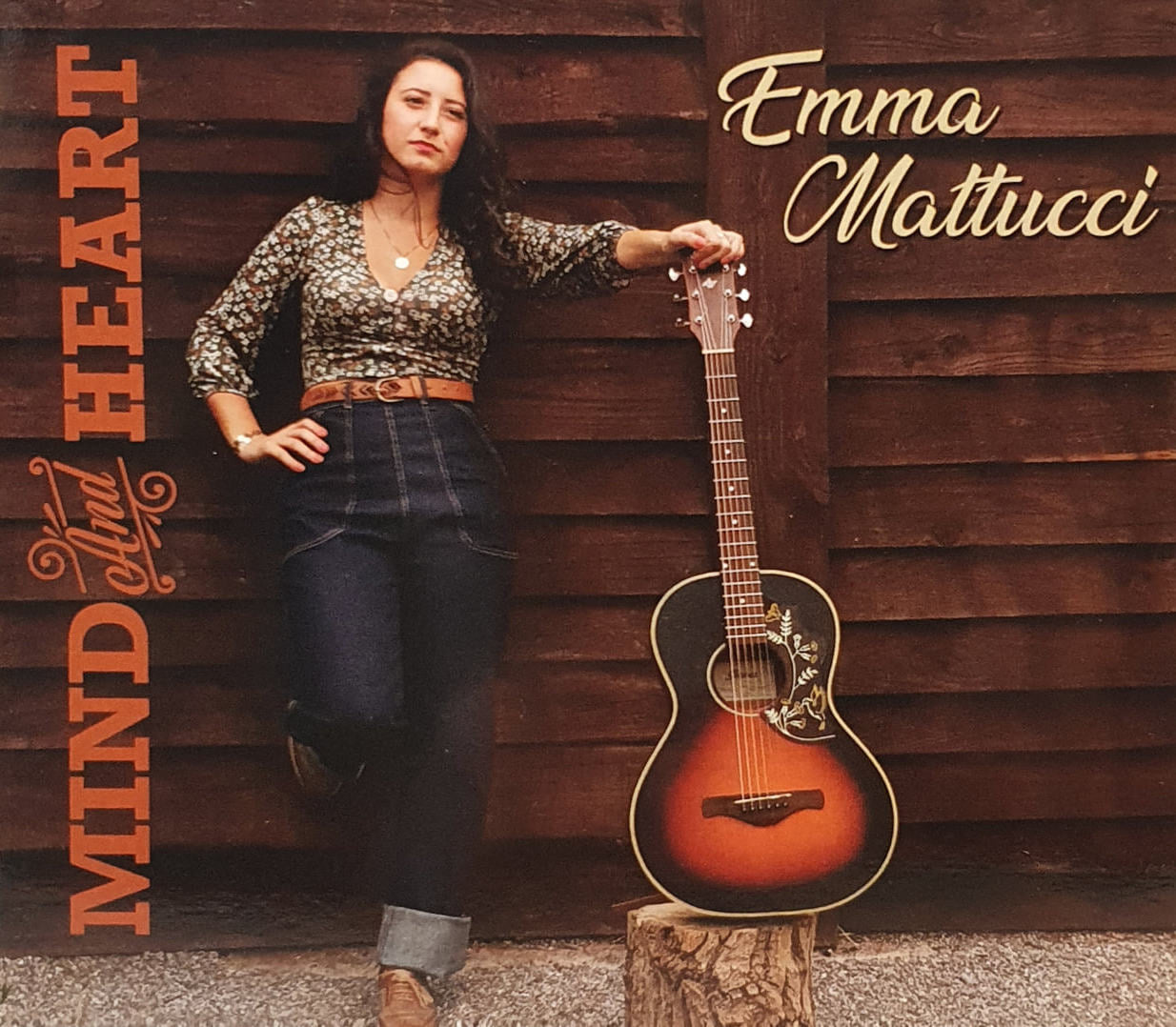 |
MIND
AND HEART/ EMMA MATTUCCI
Rock 'n' roll bloed kruipt waar het niet gaan kan: Emma Mattucci is
de dochter van Mario Mattucci, al 40 jaar (!) gitarist en bezieler
van de Belgische authentieke rockabillyband The Be-Bop's. Ze heeft
het dus van geen vreemden, en we zagen haar van kleins af op de optredens
van The Be-Bop's waar ze van zodra ze op een podium kon staan ook
een liedje mocht meezingen: we hebben hier nog een demo steken uit
2008 toen ze amper 10 jaar jong was en samen met Be-Bop's drummer
Roland Vandy's toen twaalfjarige dochter Laurie als The Ukelele Girls
The Collins Kids achterna deed. Emma zingt nog steeds, speelt intussen
ook piano, en brengt nu haar debuutalbum uit op het Britse label CJRO.
Het goeie aan dat album is dat het niet de voor de hand liggende standaard
female rockabilly is waar Emma zich op stort, maar ze haar inspiratie
zoekt in een breed scala aan countryswing stijlen van jaren '50 vocal
harmony tot jaren '60 country. Rock
'n' roll blood is thicker than water: Emma Mattucci is the daughter
of Mario Mattucci, guitarist and driving force of the Belgian authentic
rockabilly band The Be-Bop's for 40 years (!). We saw her from an
early age at the Be-Bop's' gigs where as soon as she could stand up
on a stage was allowed to sing along: we still have a demo from back
in 2008 when she was just 10 years young and sang together with Be-Bop's
drummer Roland Vandy's then 12 year old daughter Laurie calling themselves
The Ukelele Girls and copying The Collins Kids. Emma is still singing,
in the meantime she also plays the piano, and now she's releasing
her debut album on the British label CJRO. The good thing about that
album is that it's not the standard female rockabilly fare Emma is
throwing herself into, but she looks for inspiration in a wide range
of country swing styles from fifties vocal harmony to sixties country.
Mind And Heart contains six originals composed by Emma herself and
seven covers of which Teenager In Love is the best known. Obviously
at this moment she can't yet compete with Dion (Mario takes care of
all the Belmonts), but it's in the unfamiliar covers that Emma excels,
partly due to the teenage innocence that shines through the songs.
Datin', a 1953 obscurity from Sunshine Ruby, is calm medium tempo
honky tonkabilly with a catchy guitar hook, Lookout Heart is a perfect
rocka-hillbilly boogie jiver, originally from Coy Jackson in 1965.
The irresistible Candy Kisses is a cover from the contemporary Truly
Lover Trio, played slower than Marcel Riesco's boppin' rhythm and
sounding more vintage with lots of acoustic guitars, even a solo on
acoustic guitar, and a dash of Johnny Horton. Patsy Cline's I Love
You Honey gets a more little girlie version. A ballad had to be included
and it's Jan Howard's country torcher The Real Me from 1968 with an
enchanting Hawaiian guitar. One More Year To Go is originally a slow
song by Janis Martin sped up in a kind of Elvis way, and the influence
of Janis Martin can also be heard in the calm rocker Jealous Guy,
which brings us to Emma's own songs. Title track Mind And Heart is
catchy old-fashioned vocal harmony of the kind that The Be-Bop's were
also able to perform in a wonderful way but to my personal taste didn't
play nearly enough. You is a slower tempo shuffle waltz, Just Only
You does the mambo in a slightly exotic style, and Hey Daddy plays
on the daughter-father theme (daddy's little girl wants to borrow
the car) and could have been a poppy 1950s Collins Kids country tune.
|
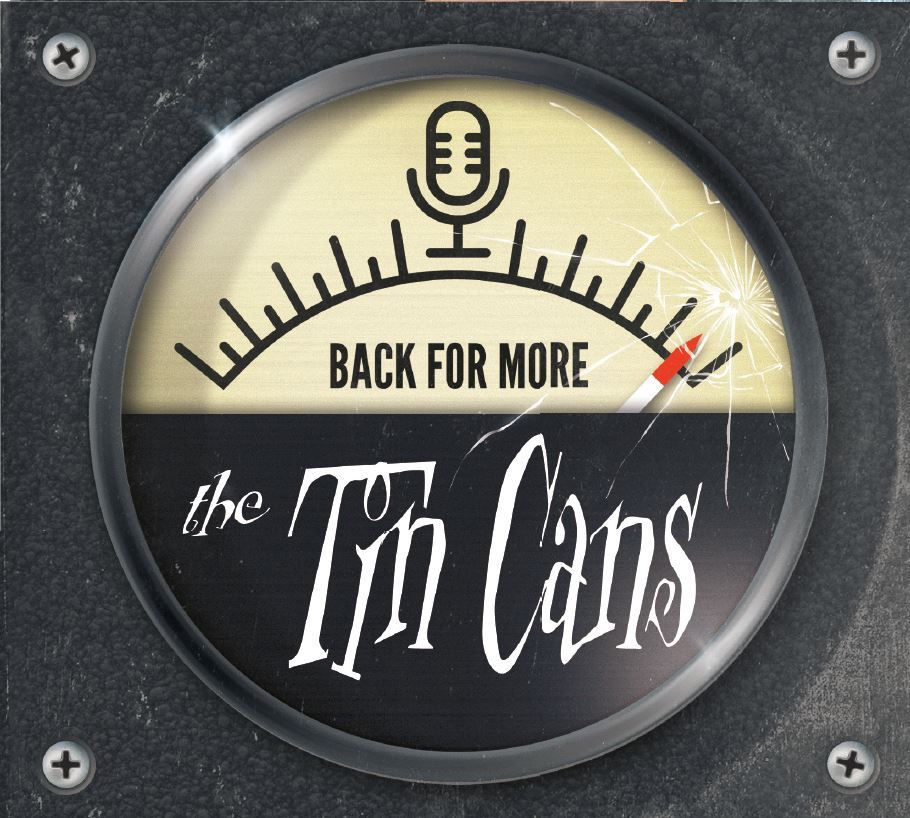 |
BACK
FOR MORE/ THE TIN CANS
Vijf jaar na het wat ons betreft niet echt denderend Honest &
Crafted is dit Duitse trio terug voor meer met hun achtste album sinds
Speak Easy uit 1998. Die hebben wij niet allemaal om de eenvoudige
reden dat we ze niet allemaal even goed vinden, maar voor deze nieuwe
verdienen contrabassist-zanger Claude Wolke, gitarist Sebastian Glenz
en drummer Martin Putela een pluim, want Back For More sluit nog het
meest aan bij de energieke sound van Still Rockin en Unbreakable van
een dikke tien jaar geleden.
Five years after the in our humble opinion not exactly world shattering Honest & Crafted, the German trio is back for more with their eighth album since 1998's Speak Easy. We do not own them all for the simple reason that we do not like them all as much, but for this new one double bassist-vocalist Claude Wolke, guitarist Sebastian Glenz and drummer Martin Putela deserve kudos, because Back For More goes back to the energetic sound of Still Rockin and Unbreakable from a good ten years ago. Opener The Time Is Right is rock with blues bop influence but played rock 'n' roll / rockabilly style, which sets the tone for an album which is not only neo but also includes fresh, expertly played modern rockabilly (Boppin' On) and elements of uptempo swamp rock (Lost In Swamp). Poor Man's Blues and Anyway are a modern interpretation of blues bop, and Ship Of Lost Souls, You Drag Me Down and Sound Of The Highway are rock disguised as rock 'n' roll. "Rock" is here not meant negatively: songs like I Need To Know, The Girl Next Door, Illusive Love or the melodic Free As A Bird are very consumer friendly and almost commercial, or at least I would say so if that also didn't have such a bad connotation. Together they make twelve own compositions that finish off with the only cover here, Please Mr. Postman, the Motown song by The Marvelettes from 1961, getting a ska treatment that works out well. The Tin Cans' sound, vocals and musical performance on Back For More are flawless, so if you like your rockabilly modern and contemporary you know where to spend your hard earned money wisely. A vinyl version of only 200 copies is said to be on its way! Info: www.part-records.de (Frantic Franky) |
|
|
THE
LEGENDARY CAPITOL RECORDS DOUBLE BASSIST AND MORE/ CLIFFIE STONE
Bear Family en Atomicat brengen gelijktijdig een CD uit van westernswing
bandleider en studiocontrabassist Cliffie Stone die zijn vinger in
nog meer pappen had dan Johnny Horton bassist Tillman Franks en nog
het best te vergelijken valt met de veel bekendere Willie Dixon aan
de overzijde van het muzikale spectrum. Stone leerde het vak in de
jaren '30 als bassist in de big band van boogiewoogie pianist Freddie
Slack en was vanaf midden jaren dertig zes decennia lang actief als
zanger, muzikant, producer, radio DJ, TV presentator (van 1949 tot
1959 had hij zijn eigen countryshow op TV), muziekuitgever, labeleigenaar
en countrykomiek. Vanaf 1946 werkte hij bij de afdeling Artiesten
& Repertoire van Capitol Records en hij staat geboekstaafd als
de ontdekker van Tennessee Ernie Ford, Hank Thompson, Tommy Sands
en komiek Stan Freberg. Zelf nam hij minstens zes LP’s op onder
namen als Cliffie Stone's Square Dance Band, Cliffie Stone & his
Orchestra, Cliffie Stone & his Barn Dance Band, Cliffie Stone
& his Hometown Jamboree Gang, Cliffie Stone & his Hepcats,
Cliffie Stone's Music en Cliffie Stone's Country Hombres. Hij schreef
twee boeken (Everything You Always Wanted To Know About Songwriting
But Didn't Know Who To Ask en You Gotta Be Bad Before You Can Be Good:
Talent Shows And Beyond) en heeft een ster op de Hollywood Walk Of
Fame. Meer dan wij kunnen zeggen... Een succulente selectie van zijn
eigen songs en van nummers waarop hij baste voor andere artiesten
vonden hun weg naar deze twee CD’s. Bear
Family and Atomicat simultaneously release a CD dedicated to western
swing bandleader and studio double bassist Cliffie Stone who had his
finger in even more pies than Johnny Horton's bass player Tillman
Franks and can be best compared to the much better known Willie Dixon
at the other end of the musical spectrum. Stone learned the trade
in the 1930s as bass player in boogie woogie pianist Freddie Slack's
big band and worked from the mid-1930s on during six decades as a
singer, musician, producer, radio DJ, TV host (from 1949 to 1959 he
had his own country show on TV), music publisher, label owner and
country comedian. Starting in 1946 he worked for Capitol's Artists
& Repertoire department where he is credited with discovering
Tennessee Ernie Ford, Hank Thompson, Tommy Sands and comedian Stan
Freberg. He recorded at least six albums under such names as Cliffie
Stone's Square Dance Band, Cliffie Stone & his Orchestra, Cliffie
Stone & his Barn Dance Band, Cliffie Stone & his Hometown
Jamboree Gang, Cliffie Stone & his Hepcats, Cliffie Stone's Music
and Cliffie Stone's Country Hombres, wrote two books (Everything You
Always Wanted To Know About Songwriting But Didn't Know Who To Ask
and You Gotta Be Bad Before You Can Be Good: Talent Shows And Beyond)
and has a star on the Hollywood Walk Of Fame. That's more than we
can say... A succulent selection of his own songs as well as songs
on which he played bass for other artists found their way onto these
two CDs. The Atomicat CD contains eight Cliffie Stone songs and 22
songs featuring Stone as double bassist for others from 1947-1958,
Bear Family on the other hand offers 23 "solo" recordings
(at least six of which are actually sung by guest vocalists not listed
on the tracklisting on the back) and eight songs as studio musician
from 1947-1956. On first listen I count ten doubles. The Bear Family
release in their Gonna Shake This Shack Tonight series includes Stone's
1948 hit Peepin' Thru The Keyhole (Watching Jole Blon) but not Silver
Stars Purple Sage Eyes Of Blue (1947) and When My Blue Moon Turns
To Gold Again (1948), Atomicat does not include any of those three
hits. Barracadu is not on Atomicat either, which is a pity because
it's a great example of irresistible deliciously swinging big beat
country bop with both steel guitar ànd sax, although we have
to add that Barracuda was on Atomicat's recent similar CD Climb Aboard
The Hell Train dedicated to guitarist Billy Strange. On the Bear Family
CD, songs like Roly Poly, Sugar Hill, B-One Baby, Sugar Pie and the
square dance Watch It Neighbor are polonaise charleston country with
accordion, fiddle and trumpet with especially Peepin' Thru The Keyhole
(Watching Jole Blon) and the humorous T-N-Teasin' Me as standouts.
Domino from 1947 is already a real boogie and two other early highlights
are Tater Pie from december 1950 and Jump Rope Boogie from 1951. Everyone's
Sweetheart And Nobody's Gal is a two step and Dirty Dishes is hillbilly
boogie, but Please Please and Blue Moon Of Kentucky from 1954 are
already proto-rock 'n' roll bop, with Blue Moon Of Kentucky especially
notable as this was recorded one month after Elvis did his rockabilly
thing with it on Sun Records. A bassist has a supporting rhythmic
role and can't put his mark on the group sound like a guitar player
can, which is why it's best not to listen to these CDs as Cliffie
Stone on bullfiddle accompanied by other musicians but rather as collections
of the best uptempo country of the forties and fifties, even though
Cliffie Stone was reportedly the best country double bass maestro.
Of the artists for whom Cliffie Stone played bass, the great Tennessee
Ernie Ford is the best known, and he's present with five songs on
the Bear Family CD. Shot Gun Boogie and Catfish Boogie are well known,
and Country Junction and I Don't Know are in the same relaxed rock
solid style. Philosophy on the other hand is an uptempo interpretation
of the singing cowboy sagas in duet with Merle Travis and guitarist
Eddie Kirk. Singer Judy Hayden's He's A Real Gone Oakie sounds guitar-wise
very rockin' for 1947, Les Gotcher's Square Dance Boogie harks back
to 1930s old timey country, Ferlin Husky sang the uptempo train ditty
Tennessee Central (Number 9) thru his nose when he was still called
Terry Preston, and there's not exactly subtle country comedy with
Stan Freberg's Bored Of Education and the grumpy The Grunt Song. Jeanne
Gayle's Bim Bam Baby is big band swing, and finally there are four
songs by one Bob Roubian whose voice sounds amazingly similar to Jackson
Sloan's, and once you realize this his four songs like Gonna Mary
That Gal are also completely in the style of Jackson Sloan! His most
remarkable song is Blue Suede Shoes in an over the top performance
with a big band rock 'n' roll orchestra behind it. It sure sounds
different! |
24 maart 2021
![]()
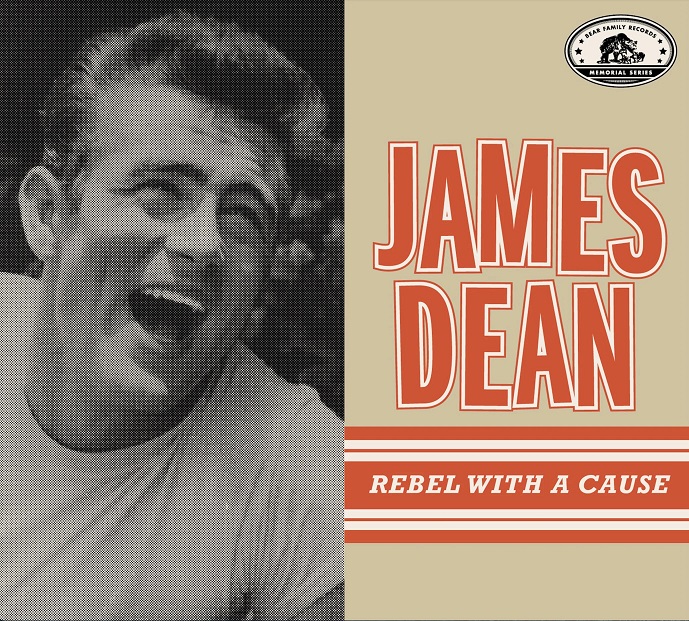 |
REBEL
WITH A CAUSE/ JAMES DEAN
Als tiener die de rock 'n' roll ontdekte verzamelde ik rigoureus alles
wat van ver of nabij te maken had met James Dean, de acteur die een
icoon werd op basis van de slechts drie films die hij maakte in 1954-1955
alvorens zichzelf op 30 september 1955 op 24-jarige leeftijd onsterfelijk
te maken door ironisch genoeg om het leven te komen in een auto-ongeval.
Was dat niet gebeurd dan was hij op 8 februari jongstleden 90 jaar
geworden! Nu ik veel te oud ben geworden om nog jong te sterven maakt
Bear Family de steeds dieper in mij verscholen tiener wakker met deze
CD die mét goedkeuring van James Dean Inc, het bedrijf dat
de rechten op James Dean' naam en beeltenis exploiteert, de erfenis
van James Dean illustreert op diverse muzikale vlakken. Enerzijds
is er 33 minuten filmmuziek met een selectie muzikale thema’s
uit de soundtracks van de drie James Dean films East Of Eden, Rebel
Without A Cause met zijn geniale Nederlandstalige titel Botsende Jeugd,
en Giant met onder meer de gezongen Yellow Rose Of Texas en The Eyes
Of Texas Are Upon You - Elvis zou ze later als een medley zingen in
de film Viva Las Vegas. Er is ook 10 minuten soundtrack muziek uit
de documentaire The James Dean Story uit 1957, zijnde bebop jazz uitgevoerd
door de James Dean van de jazz, trompettist Chet Baker, maar het door
Tommy Sands gezongen Let Me Be Loved thema uit die docu staat niet
op deze CD. Al even instrumentaal zijn de vijf minuten home recordings
van James Dean op conga’s, privé-opnames live in een
Hollywood nachtclub waar Dean meejamde met fluitist Bob Romeo (hij
speelde in 1954 naar verluidt de fluit op de soundtrack van de Humphrey
Bogart film The Barefoot Contessa), opnames die best kunnen worden
omschreven als jungle drums en een oosterse pitta fluit in barre geluidskwaliteit.
Na Dean's dood verschenen die twee tracks op single, maar het klinkt
nu nog steeds nergens naar. Nee, dan is het interessanter even te
luisteren naar de zes minuten interviewfragmenten waaronder het bekende
TV interview met het voorlichtingsfilmpje voor de verkeersveiligheid
waarin Dean de profetische woorden "take it easy driving, the
life you might save might be mine" orakelt.
Discovering
rock 'n' roll as a teenager I solemnly collected anything even remotely
related to James Dean, the actor who became an icon based on the three
films he made in 1954-1955 before immortalizing himself on September
30, 1955 at the tender age of 24, ironically enough by being killed
in a car accident. Had this not happened he would have turned 90 last
February 8! Now that I'm slowly becoming an old man who can no longer
die young, Bear Family wakes up the teenager hidden always deeper
inside me with this CD, approved by James Dean Inc., the company that
exploits the rights to James Dean's name and likeness, which illustrates
the legacy of James Dean on various musical levels. There is 33 minutes
of film music with a selection of musical themes from the soundtracks
of the three James Dean films East Of Eden, Rebel Without A Cause
and Giant including the vocal Yellow Rose Of Texas and The Eyes Of
Texas Are Upon You from Giant - Elvis would later sing them as a medley
in the film Viva Las Vegas. There is also 10 minutes of soundtrack
music from the 1957 documentary The James Dean Story, bebop jazz performed
by the James Dean of jazz, trumpeter Chet Baker, but Tommy Sands'
Let Me Be Loved theme from that documentary is not on this CD. Also
instrumental are the five minutes' worth of home recordings of James
Dean playing the congas, private recordings live at a Hollywood nightclub
where Dean jammed along with flutist Bob Romeo (he reportedly played
the flute in 1954 on the soundtrack of the Humphrey Bogart film The
Barefoot Contessa), recordings best described as jungle drums and
an oriental pita flute in awful sound quality. After Dean's death
these two tracks appeared on a vinyl single, but it still sounds like
shit now. It's more interesting to listen to the six minutes of interview
fragments including the famous TV interview with the road safety film
in which Dean utters the prophetic words "take it easy driving,
the life you might save might be mine". |
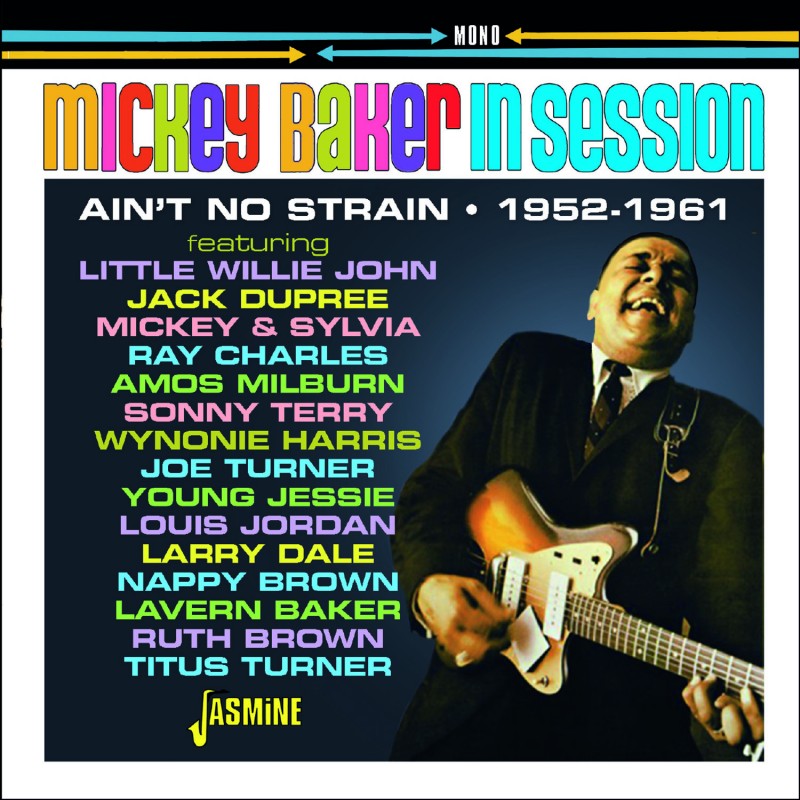 |
AIN'T
NO STRAIN, IN SESSION/ MICKEY BAKER
Het Britse re-issue label Jasmine Records bracht eerder al In Session
CD’s uit van blues- en rhythm 'n' blues artiesten Eddie Taylor,
Jody Williams, Otis Spann, Big Walter Horton en Matt Guitar Murphy,
nu is gitarist Mickey Baker aan slag, de helft van Mickey & Sylvia
van Love Is Strange uit 1956, het duo dat door Jasmine werd geprofileerd
op een dubbel-CD die uiteraard de titel Love Is Strange (JASCD3093)
meekreeg, ondertitel "All the Hit Singles A's & B's And More
1950-1962". Daarnaast is er op Jasmine ook de Mickey Baker CD
Return Of The Wildest Guitar (JASCD979) die focust op Baker's solowerk
1952-1959. Nu dus Baker als studiomuzikant (volgens de hoesnota’s
was hij in de jaren '50 de drukst bezette studiogitarist in New York),
met de nadruk op songs met gitaarsolo’s die knisperen als een
kroket in frituurvet of op zijn minst met interessante onderliggende
gitaarpartijen. Aangezien Baker zwart was is het logisch dat de CD
ondanks Ruth Brown's opener (Mama) He Treats Your Daughter Mean begint
met blues, ja zelfs met trage pianoblues als Champion Jack Dupree's
Please Tell Me Baby. Ook Ray Charles houdt het in Funny (But I Still
Love You) rustig aan de piano, maar merkwaardig genoeg in een lossere,
beetje New Orleans-achtige speelse sfeer, en Amos Milburn's originele
versie van het bekende One Scotch One Bourbon One Beer is een goeie
medium tempo uitvoering opnieuw met piano. Da's veel piano voor een
gitaar CD, maar het is natuurlijk juist het samenspel tussen die twee
instrumenten die een extra dimensie geeft. Ook met piano maar met
mondharmonica als hoofdinstrument is de pure blues van Sonny Terry's
I'm Gonna Rock Your Wig die niets met rock of rock 'n' roll te maken
heeft, al kon je met diezelfde instrumenten ook uitstekend bluesboppen,
getuige Square Walton's uptempo Bad Hangover. Nog meer trage blues
is er met Stick McGhee's I'm Doin' All This Time (And You Put Me Down),
doch via de swingblues van Wynonie Harris' Please Louise en Milt Trenier's
Straighten Up Baby evolueren we naadloos naar de zwarte rock 'n' roll
waartoe Baker meer dan één steentje bijdroeg, bijvoorbeeld
op Paul Williams' misogyne Women Are The Root Of All Evil. Dickie
Thompson was de originele uitvoerder van het meer rhythm 'n' blues
mambo swing met een zwoel exotisch tintje gerichte origineel van het
door Bill Haley als B-kant voor Rock Around The Clock gecoverde Thirteen
Women, en Ann Cole brengt een rock 'n' roll versie van Got My Mojo
Working. Van Mickey & Sylvia bevat de CD één nummer,
de knappe stop-start rocker No Good Lover. Bekende nummers hier waarop
Baker meespeelde zijn Big Joe Turner's Shake Rattle And Roll, Lavern
Baker's (geen familie) Little Sister antwoord Hey Memphis, Young Jessie's
Hit Git And Split, Louis Jordan's big band swing heropname uit 1956
van zijn eigen Caldonia, en Nappy Brown's nonsensikale goedgezinde
Don't Be Angry. Maar ook tussen de minder bekende songs zit goed spul,
samen goed voor in totaal 29 zwarte rock 'n' roll en rhythm 'n' blues
tracks 1952-1961 en daar zit geen enkele stinker tussen.
British
re-issue label Jasmine Records already released In Session CDs showcasing
blues and rhythm 'n' blues artists Eddie Taylor, Jody Williams, Otis
Spann, Big Walter Horton and Matt Guitar Murphy, and now it's guitarist
Mickey Baker's turn, well known as half of Mickey & Sylvia from
1956's Love Is Strange, the duo profiled by Jasmine on a double CD
not surprisingly titled Love Is Strange JASCD3093, featuring "All
the Hit Singles A's & B's And More 1950-1962." On top of
that there's the Jasmine Mickey Baker CD Return Of The Wildest Guitar
JASCD979 which focuses on Baker's solo work 1952-1959. In Session
spotlights Baker as studio musician (according to the liner notes,
he was the busiest studio guitarist in New York in the 1950s), with
an emphasis on songs with guitar solos that crackle like frying battered
chicken or at least with interesting underlying guitar parts. Since
Baker was black it comes as no surprise that despite Ruth Brown's
opener (Mama) He Treats Your Daughter Mean the CD starts with blues,
even slow piano blues like Champion Jack Dupree's Please Tell Me Baby.
Ray Charles takes it easy on the 88 keys in Funny (But I Still Love
You), but curiously enough in a looser, somewhat New Orleans-like
playful mood, while Amos Milburn's original version of the familiar
One Scotch One Bourbon One Beer is a good medium tempo rendition again
with piano. That's a lot of piano for a guitar CD, but it's the interplay
between the two instruments that adds the extra dimension. Also with
piano but with harmonica as its main instrument is the pure blues
of Sonny Terry's I'm Gonna Rock Your Wig which has nothing to do with
rock or rock 'n' roll, even though one can use the same instruments
to do some serious blues bopping as demonstrated by Square Walton's
uptempo Bad Hangover. There's more slow blues with Stick McGhee's
I'm Doin' All This Time (And You Put Me Down), but via the swing blues
of Wynonie Harris' Please Louise and Milt Trenier's Straighten Up
Baby we dive straight into black rock 'n' roll to which Baker contributed
more than his share, for example on Paul Williams' misogynistic Women
Are The Root Of All Evil. Dickie Thompson did the more rhythm 'n'
blues mambo swing with a sultry exotic touch styled original of Thirteen
Women as covered by Bill Haley for the B-side of Rock Around The Clock,
and Ann Cole does a rock 'n' roll version of Got My Mojo Working.
The CD contains one Mickey & Sylvia song, the exquisite stop-start
rocker No Good Lover. Well known songs here on which Baker played
are Big Joe Turner's Shake Rattle And Roll, Lavern Baker's (no relation)
Little Sister answer Hey Memphis, Young Jessie's Hit Git And Split,
Louis Jordan's 1956 big band swing re-recording of his own Caldonia,
and Nappy Brown's nonsensical good-natured Don't Be Angry. There's
high grade stuff among the lesser known songs as well, totalling 29
black rock 'n' roll and rhythm 'n' blues tracks 1952-1961 with not
a single dud. |
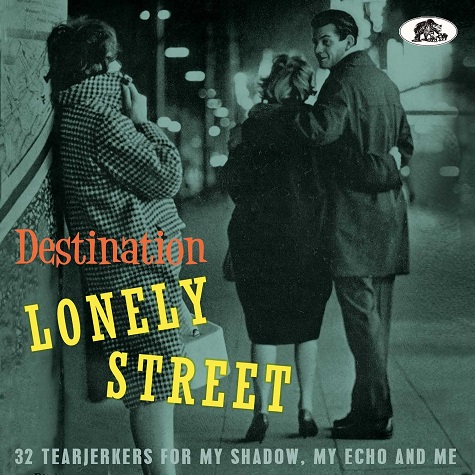 |
DESTINATION
LONELY STREET
"32 tearjerkers for my shadow, my echo and me", zo luidt
de ondertitel van deze CD overlopend van eenzaamheid, wanhoop, verslagenheid,
het noodlot, tegenslag, gebroken harten en getormenteerde zielen,
een onuitputtelijke inspiratiebron voor liedjesmakers want als er
één onderwerp is waarover meer liedjes zijn geschreven
dan over de liefde dan is het wel de onbeantwoorde en afgewezen liefde.
"32
tearjerkers for my shadow, my echo and me" is the subtitle of
this CD oozing with loneliness, despair, defeat, fate, misfortune,
broken hearts and tormented souls, an never ending source of inspiration
for songwriters because if there is one subject about which more songs
have been written than about love, it's unanswered and rejected love.
|
|
|
KILLER
B's - U.S. POP HITS
De gelijktijdig verschenen Killer B's - U.S. R & B Hits doet hetzelfde,
niet met rhythm 'n' blues maar met 32 shotjes zwarte popmuziek 1954-1962,
vaak op het scherp van de snee tussen rock 'n' roll en wat later in
de jaren '60 zou komen als Dee Clark's I Want To Love You, Johnny
"Guitar" Watson's Broke And Lonely, Jackie Wilson's Never
Go Away, Lloyd Price's You Need Love, Etta James' Street Of Tears,
Maxine Brown's Now That You've Gone, Little Esther Phillips' Don't
Feel Rained On, Ben E. King's The Hermit Of Misty Mountain, Jerry
Butler & the Impressions' vokale hoogstandje Sweet Was The Wine
en de vroege Motown klanken van The Miracles' Happy Landing, Mary
Wells' I'm Gonna Stay en The Marvelettes' All The Love I've Got. In
Ruth Brown's Somebody Touched Me, The Shirelles's Look A Here Baby
en Lavern Baker's onweerstaanbare Dix-A-Billy horen we doo-wop, genre
waartoe ook ballades als The Falcons' plechtige Goddess Of Angels
en The Fiestas' Last Night I Dreamed behoren. Deze CD bevat sowieso
veel ballades zoals Roy Hamilton's The Right To Love, Dee Dee Sharp's
Set My Heart At Ease, Little Willie John's Now You Know , Bobby Bland's
You're The One (That I Need), Chuck Jackson's The Prophet, The Drifters'
Another Night With The Boys en Joe Henderson's Brook Benton soundalike
If You See Me Cry. Ray Charles mixt jazz, soul en gospel in I Believe
To My Soul en de invloed van gospel horen we ook in Clyde McPhatter's
I Can't Stand Up Alone. Blues is er met Freddy King's I Love The Woman,
en er is vroeg werk van Ike & Tina Turner uit 1960 (The Way You
Love Me) en James Brown uit 1961 (I'll Never Never Let You Go). Rock
'n' roll staat er nauwelijks op U.S. R & B Hits, maar uit een
hoempa vaatje rockt Big Joe Turner in Midnight Cannonball, terwijl
Bo Diddley een flink eind bluesbopt in Bring It To Jerome.
It's often said that the B-side of a single were fillers, songs without hit potential. But it is just as often argumented that many of those B-sides are hidden gems, as proven by the fact that in the 1950s sometimes both sides of a single became a hit (artists like The Everly Brothers, Connie Francis and Brenda Lee scored more double-sided than single-sided hits) and quite a few B-sides became hits after radio deejays turned the single over. I mean: can you imagine that Roy Orbison's majestic Love Hurts was "just" the B-side of Running Scared???? B-sides or not, many of these songs have been compiled so many times in the intervening sixty years that they grew into classics themselves. Killer B's - U.S. Pop Hits, a CD containing 32 "B-sides that adorned the flip of a significant US Top 100 hit 1956-1962 that somehow failed to register under their own steam" is therefor in part a collection of bona fide rock 'n' roll such as Buddy Holly's Tell Me How (under the Crickets banner), The Coasters' That Is Rock 'n' Roll, Jerry Lee Lewis's Sun rocker It'll Be Me, Johnny Cash's Sun rocker Get Rhythm, Chuck Berry's Reelin' And Rocking, Johnny & the Hurricanes' underappreciated Red River Rock flip Buckeye, Jack Scott's Baby Baby, Freddy Cannon's June July And August, Link Wray's instro stomper The Swag and The Ventures' sympathetic guitar instro No Trespassing. Less known is Duane Eddy's menacing guitar/sax/piano instro Stalkin'. The flip of a single was often a ballad like Dion's romantic Runaway Girl, The Everly Bothers' sad Maybe Tomorrow, Ral Donner delivering an almost perfect Elvis in So Close To Heaven, or Conway Twitty at his ballad best in I'll Try which was originally even the topside until deejays turned the record over and discovered It's Only Make Believe. Rather more unexpected is the pré-folk of Bobby Darin anno 1962 in Jailer Bring Me Water. Johnny Burnette's Cinccinnati Fireball is highschool rock but a great stroller, and a fair chunk of the CD is pop like Jay & the Americans' Dawning (based on the allegretto pastoral Morning Mood suite from Edvard Grieg's Peer Gynt from 1875! ), The Drifters' Nobody But Me, Sam Cooke's Farewell My Darling, Gene Pitney's Take It Like A Man, Ben E. King's On The Horizon, The Crystals' What A Nice Way To Turn Seventeen, The Shirelles' The Things I Want To Hear (Pretty Words), Dee Dee Sharp's Baby Cakes, The Four Seasons' Connie-O, The Hollywood Argyles' Sho' Know A Lot About Love and The Orlons' The Conservative. The
simultaneously released Killer B's - U.S. R & B Hits does the
same, not with rhythm 'n' blues but with 32 shots of black pop music
1954-1962, often on the cutting edge between rock 'n' roll and the
music that would arrive later in the sixties like Dee Clark's I Want
To Love You, Johnny "Guitar" Watson's Broke And Lonely,
Jackie Wilson's Never Go Away, Lloyd Price's You Need Love, Etta James'
Street Of Tears, Maxine Brown's Now That You've Gone, Little Esther
Phillips' Don't Feel Rained On, Ben E. King's The Hermit Of Misty
Mountain, Jerry Butler & the Impressions' vocal masterpiece Sweet
Was The Wine and the early Motown sounds of The Miracles' Happy Landing,
Mary Wells' I'm Gonna Stay and The Marvelettes' All The Love I've
Got. In Ruth Brown's Somebody Touched Me, The Shirelles' Look A Here
Baby and Lavern Baker's irresistible Dix-A-Billy we hear doo-wop,
genre which also encompasses ballads like The Falcons' solemn Goddess
Of Angels and The Fiestas' Last Night I Dreamed. The CD contains a
lot of ballads anyway such as Roy Hamilton's The Right To Love, Dee
Dee Sharp's Set My Heart At Ease, Little Willie John's Now You Know
, Bobby Bland's You're The One (That I Need), Chuck Jackson's The
Prophet, The Drifters' Another Night With The Boys and Joe Henderson's
Brook Benton soundalike If You See Me Cry. Ray Charles mixes jazz,
soul and gospel in I Believe To My Soul and the influence of gospel
can also be heard in Clyde McPhatter's I Can't Stand Up Alone. There's
blues with Freddy King's I Love The Woman and early recordings by
Ike & Tina Turner from 1960 (The Way You Love Me) and James Brown
from 1961 (I'll Never Never Let You Go). U.S. R & B Hits does
not contain a lot of rock 'n' roll, but Big Joe Turner chugs along
nicely in Midnight Cannonball while Bo Diddley delivers a mean bluesbopper
with Bring It To Jerome. |
10 maart 2021
![]()
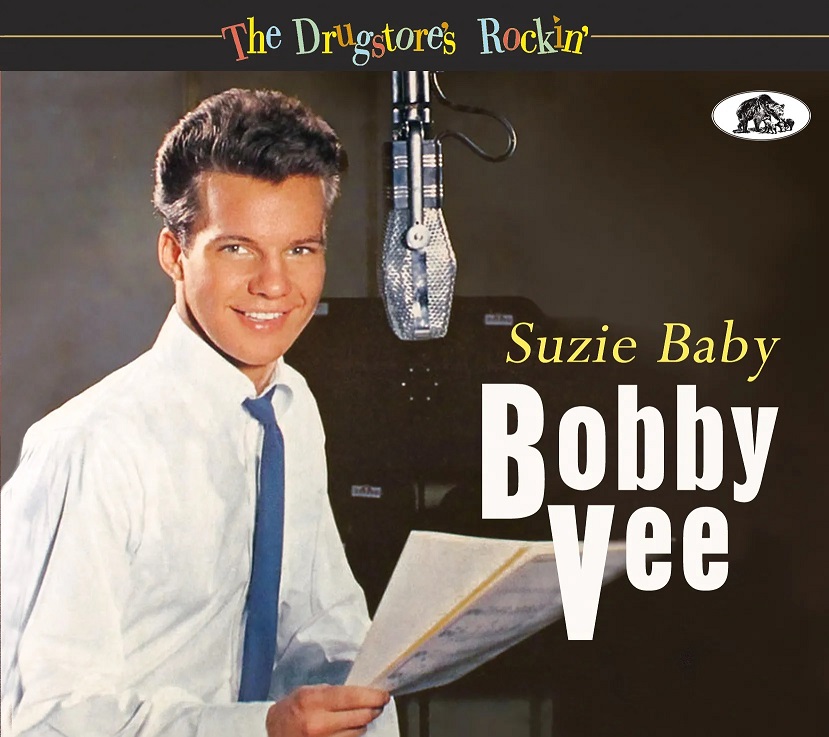 |
SUZIE BABY/ BOBBY VEE
Eén keer heb ik Bobby Vee live gezien, begin jaren '90 op een
various artists oldies show, een optreden waarvan ik me vooral de
grote opblaasbare "rubber balls" herinner die over het podium
stuiterden. Wie houdt van Bobby Vee's popstijl zal ongetwijfeld al
wel iets van hem in huis hebben want er zijn natuurlijk veel Bobby
Vee CD’s in omloop. Wat rechtvaardigt dan deze nieuwe verzamelaar?
Nou, de royale 34 songs 1959-1962, het mooie full colour booklet van
34 pagina’s en de gebruikelijke Bear Family kwaliteit.
I
only saw Bobby Vee live once, in the early nineties at a various artists
golden oldies show, a performance of which I mostly remember the large
inflatable "rubber balls" that bounced across the stage.
If you like Bobby Vee's pop style you will undoubtedly already have
something from him in your collection because his music has been avalaible
for a long time and there are many Bobby Vee CDs out there. So what
justifies this new compilation? Well, the generous 34 songs 1959-1962,
the beautiful full color 34 page booklet and the usual Bear Family
quality. Bobby Vee's music was highschool rock, a commercial pop-oriented
style that in the 1950s quickly curtailed the pure rock 'n' roll at
the urgency of the record companies, which is why this CD appears
in Bear Family's The Drugstore's Rockin' series that focuses on the
softer side of the rock 'n' roll coin. Vee began his career at the
age of fifteen replacing Buddy Holly on the fatal Winter Dance Party
tour in early 1959, and Holly's spirit would cross Vee's musical path
several times in the ensuing years. His music is characterized by
rich arrangements, lavish violin parts and backing vocals, and Vee's
classics Rubber Ball, Take Good Care Of My Baby, Devil Or Angel, More
Than I Can Say, Run To Him , Please Don't Ask About Barbara and The
Night Has A Thousand Eyes are of course present, supplemented by many
more beautiful songs in the same likeable style like In My Baby's
Eyes, Punish Her, Walkin' With My Angel, Sharing You, I Can't Say
Goodbye, the cha cha cha One Last Kiss and Stayin' In in which he
punches his love rival right on the nose in the school cafetaria!
In addition to the playful melody line of Vee's charming semi-acoustic
debut single Suzie Baby, the CD pays much attention to Vee's more
rock 'n' roll oriented songs such as the guitar instrumental Flyin'
High featuring Bobby's brother Bill Velline on lead guitar. Compiler
Nico Feuerbach clearly opted for Vee's covers of well-known songs
like Summertime Blues, Little Star, Tears On My Pillow, Will You Love
Me Tomorrow, You Better Move On, Susie Q, Sixteen Candles, Chuck Berry's
School Day, Buddy Holly's Raining In My Heart, Paul Anka's Diana in
a striking arrangement with Peggy Sue-like drumming, the Adam Faith
cover What Do You Want and Johnny Ace's Pledging My Love. The CD also
includes six songs from the 1961 LP Bobby Vee Meets The Crickets:
Vee's original version of the Lookin' For Love written by Roy Orbison
but never recorded by The Big O himself, When You're In Love, the
Chuck Berry cover Little Queenie, the Linda Lu-like stroll Someday
(When I'm Gone From You), I Gotta Know (Cliff Richard in 1959, Elvis
in 1960) and Ral Donner's Girl Of My Best Friend (okay, Elvis sang
it before Ral Donner). The liner notes teach us that only one original
Cricket ended up playing on that LP, drummer Jerry Allison. Guitarist
Tommy Allsup only played with Buddy Holly during the Winter Dance
Party tour, and in the background chorus we find Jerry Naylor, Crickets
singer from 1961 to 1965. There are no songs on the CD from that other
concept album, 1963's Bobby Vee Meets The Ventures. As a bonus there
is a radio spot for the 1961 LP Take Good Care Of My Baby with excerpts
from four songs, all of which are included here. |
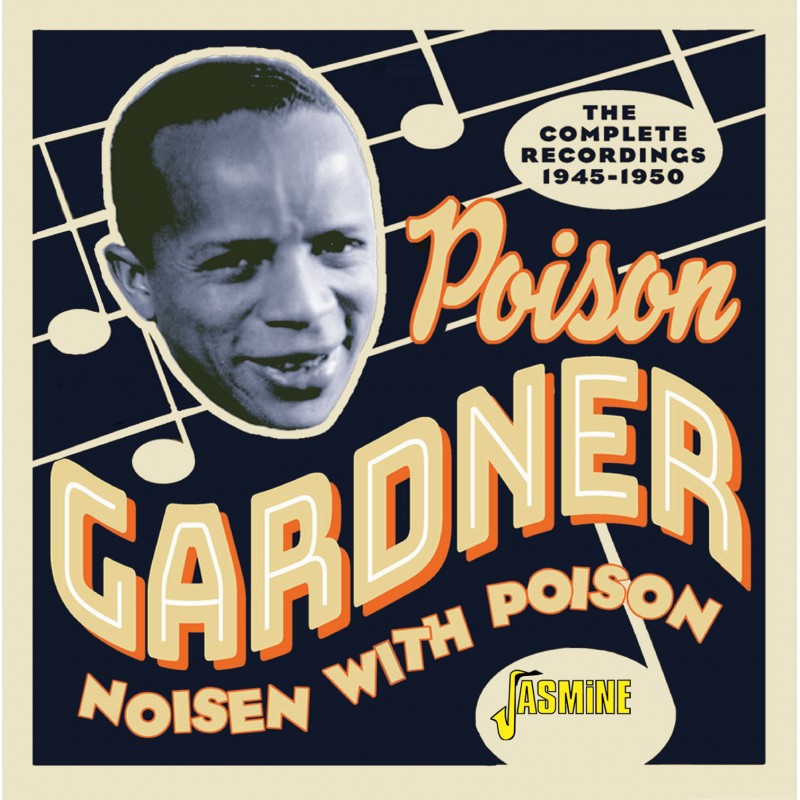 |
NOISEN
WITH POISON/ POISON GARDNER
Ik had nog nooit van de hier als "een van de grote onbekenden
van de blues en de boogie" omschreven pianist Poison Gardner
gehoord en dit blijkt inderdaad zijn eerste verzamel-CD te zijn, met
bovendien zijn volledige opname output voor zover bekend. Die in totaal
27 tracks bestaan uit enerzijds in rhythm 'n' blues jive gedrenkte
instrumentale piano boogies (Poison's Boogie, Noisen With Poison,
Medium Fast Boogie, Empire Boogie, Lenox Avenue Boogie, Mobile Boogie)
en anderzijds rustige gezongen boogie jive zoals Workingman's Blues,
Big Leg Mama Blues, House Rent Blues, Doublecrossin' Woman, Eviction
Blues, So Many Women, Mean Old World, het licht exotische My Baby's
Gone Away en het bluesy Between Midnight And Day, dat alles steeds
met de piano in de hoofdrol en met nagenoeg alle vocale nummers gezongen
door Gardner's bandleden. De CD bevat ook vrolijke vaudeville nummers
als Second Piece Of Pie waardoor ik in eerste instantie dacht dat
Gardner Brits was en het instrumentale 52nd Street Jump, en uiteraard
ook vaak een mengvorm van deze genres zoals het instrumentale Melody
In F Boogie. Echte rhythm 'n' blues swing zoals bijvoorbeeld Gotta
Find My Baby, de instrumentals One O'Clock Jump en Ten O'Clock Jump
of het gospelachtige Camp Meetin' wordt het slechts zelden, en het
is allicht geen toeval dat dat meestal de recentste nummers zijn,
al is "recent" uiteraard relatief als je praat over muziek
van meer dan 70 jaar oud. I
had never heard of pianist Poison Gardner, described here as "one
of the great unknowns of blues and boogie," and this CD is indeed
his first compilation, containing his entire known recording output.
His legacy totals 27 tracks consisting on the one hand of rhythm 'n'
blues jive soaked instrumental piano boogies (Poison's Boogie, Noisen
With Poison, Medium Fast Boogie, Empire Boogie, Lenox Avenue Boogie,
Mobile Boogie) and on the other hand calm vocal boogie jive such as
Workingman's Blues, Big Leg Mama Blues, House Rent Blues, Doublecrossin'
Woman, Eviction Blues, So Many Women, Mean Old World, the slightly
exotic My Baby's Gone Away and the bluesy Between Midnight And Day,
always with the piano in the lead and with almost all the vocal numbers
sung by Gardner's band members. The CD also includes upbeat vaudeville
numbers like Second Piece Of Pie which initially made me think Gardner
was British and the instrumental 52nd Street Jump, and of course often
a hybrid of these genres like the instrumental Melody In F Boogie.
True rhythm 'n' blues swing as for example Gotta Find My Baby, the
instrumentals One O'Clock Jump and Ten O'Clock Jump or the gospel-tinged
Camp Meetin' are the exceptions here, and it's probably no coincidence
that these are usually the most recent songs, although "recent"
is of course relative when you're talking about music over 70 years
old. |
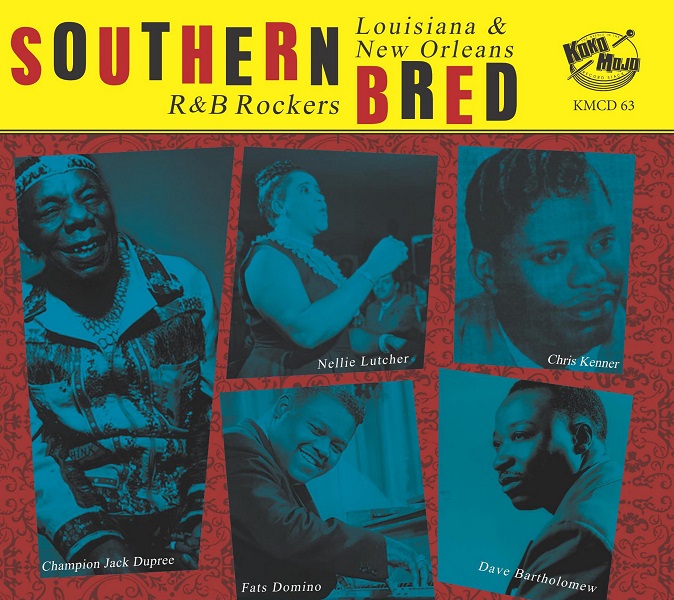 |
SOUTHERN
BRED:
Op de Southern Bred CD’s staat geen nummering, maar voor wie
ze verzamelt (en we kunnen u geen ongelijk geven) is deze eerste Louisiana
CD volume 13. Na vijf volumes Southern Bred gewijd aan Mississippi
en zeven volumes gewijd aan Texas graaft samensteller DJ Mark Armstrong
(GB) zich nu een weg richting Louisiana om uit te komen in New Orleans,
muziekstad bij uitstek met een volstrekt uniek herkenbaar geluid,
een gumbo van dixieland jazz, swing, rhythm ‘n’ blues
en fanfares die resulteerde in een swingende rock 'n' creool stijl
gebaseerd op piano en veel saxofoons, hier geïllustreerd aan
de hand van 28 nummers 1947-1963.
The
Southern Bred CDs are not numbered, but for those of you who collect
them (and we can't blame you), this first Louisiana CD is volume 13.
After five Southern Bred volumes devoted to Mississippi and seven
volumes devoted to Texas, compiler DJ Mark Armstrong (GB) now digs
his way towards Louisiana ending up in New Orleans, music city par
excellence with a completely unique and instantly recognizable sound,
a gumbo of dixieland jazz, swing, rhythm 'n' blues and brass bands
that created a swinging rock 'n' creole style based on piano and lots
of saxophones, illustrated here by 28 songs 1947-1963. |
3 maart 2021
![]()
CD Recensies
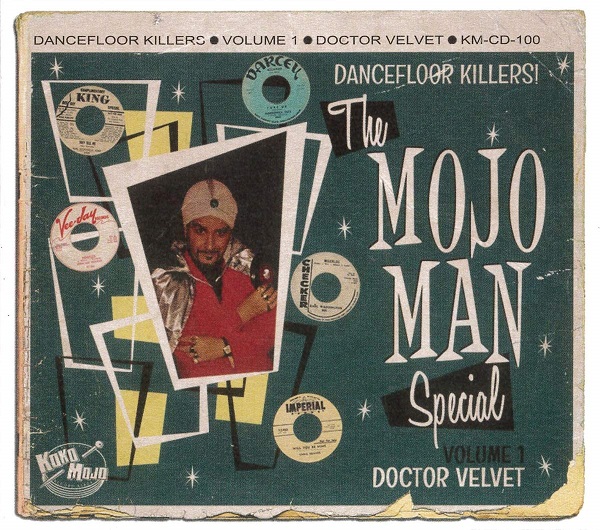 |
THE
MOJO MAN SPECIAL VOLUME 1: Na
30 volumes Koko Mojo, 13 volumes Southern Bred (er staan er nog zeven
in de planning) en 10 volumes Boss Black Rockers vinden ze het bij
Koko-Mojo tijd voor een nieuwe reeks en daarvoor mocht Mojo Man Little
Victor Mac, de Italiaans-Amerikaanse Beale Street Blues Bopper, diep
in zijn muziekarchief duiken voor nog eens 10 x 24 zwarte rock 'n'
roll tracks. Naast een handvol bekende nummers als Jesse Powell's
originele The Walking Blues met zang van Fluffy Hunter, Jimmy Liggins'
I Ain’t Drunk en Teddy (Mr. Bear) McCrae's Hi Fi Baby bevat
de CD vooral vergeten zwarte rock 'n' roll parels als Mike Robinson's
Lula, Chris Kenner's Will You Be Mine, Ray Johnson's stroll Shake
A Little Bit en de als een gemenere versie van The Treniers klinkende
Nite Riders op visite bij Doctor Velvet. Veel nummers zijn beïnvloed
door de zwarte muziek van begin jaren '60, bijvoorbeeld Little Betty's
Twistin’ School op een twist ritme, The Volcanos' Oh Oh Mojo,
Bobby Hendricks' Molly Be Good, Earl (Connelly) King's They Tell Me,
Huey Smith & the Clowns' Genevieve, Henry Strogin's Misery en
de smooth stylings van Eddie Barnes die in Sweet Lover Brook Benton
naar de kroon steekt. Daarnaast is er de kruisbestuiving van bluesrock
als John Lee Hooker's Dimples, Larry Bright's Way Down Home en Smokey
Smothers' Twist With Me Annie dat niets met twist te maken heeft,
alsmede van strollende doo-wop die zou evolueren tot soul zoals The
Gay Poppers' You Got Me Uptight. U mag de grap zelf bedenken! Uit
de oneindige nalatenschap van alles waar Johnny Otis een vinger in
de pap had komt de rhythm 'n' blues jiver Little Red Hen van het orkest
van Johnny Otis met zang van Redd Lyte, Harmonica Fats klinkt in het
uiteraard van mondharmonica voorziene Tore Up nog meer als schuurpapier
dan Hank Ballard, en de Misirlou van Earl Washington is geen surf
maar popcorn noir exotica. In dezelfde exotische stijl maar dan sneller
en op een strollende rock 'n' roll beat is Sugar Boy Williams' Little
Girl.
After 30 Koko Mojo volumes, 13 Southern Bred volumes (plus seven still to go) and 10 Boss Black Rockers volumes the good folks at Koko-Mojo Records think it's time for a brand new series, so they sent out Mojo Man Little Victor Mac, the Italian-American Beale Street Blues Bopper, on another expedition into his music archives for another 10 x 24 black rock 'n' roll tracks. In addition to a handful of familiar tunes like Jesse Powell's original The Walking Blues with vocals by Fluffy Hunter, Jimmy Liggins' I Ain't Drunk and Teddy (Mr. Bear) McCrae's Hi Fi Baby volume 1 contains for the most part forgotten black rock 'n' roll gems like Mike Robinson's Lula, Chris Kenner's Will You Be Mine, Ray Johnson's stroll Shake A Little Bit and The Nite Riders who sound like a meaner version of the Treniers on a visit with Doctor Velvet. Many songs are influenced by early sixties black music, like for example Little Betty's Twistin' School with a twist rhythm, The Volcanos' Oh Oh Mojo, Bobby Hendricks' Molly Be Good, Earl (Connelly) King's They Tell Me, Huey Smith & the Clowns' Genevieve, Henry Strogin's Misery and the smooth stylings of Eddie Barnes whose Sweet Lover rivals Brook Benton. The CD also shows the cross-pollination of blues rock with John Lee Hooker's Dimples, Larry Bright's Way Down Home and Smokey Smothers' Twist With Me Annie which has nothing to do with the twist, as well as strolling doo-wop that would evolve into soul like The Gay Poppers' You Got Me Uptight. From the bottomless pit of recordings Johnny Otis was involved in comes the rhythm 'n' blues jiver Little Red Hen from The Johnny Otis Orchestra with vocals from Redd Lyte, Harmonica Fats' Tore Up with obligatory mouth harp sounds even more like sandpaper than Hank Ballard, and Earl Washington's Misirlou is not surf but popcorn noir exotica. In the same exotic style but faster and with a strolling rock 'n' roll beat is Sugar Boy Williams' Little Girl. This is a no-brainer: volume 1 marks the start of a very promising new series for the fans of all types of black rock 'n' roll music! Volume 2 and 3 are already out too. Info: www.vintagerockinroots.com (Frantic Franky) |
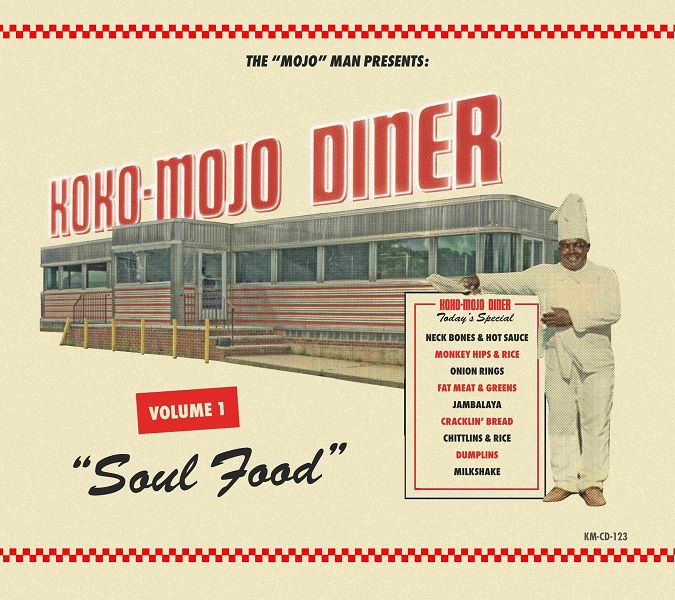 |
KOKO-MOJO
DINER VOLUME 1: SOUL FOOD Een nieuwe worp Koko-Mojo CDs en hop, daar verschijnt een nieuwe reeks aan de einder, dit keer gewijd aan culinaire genoegtes. Dat er een massa songs werden opgedragen aan eten weten we sinds de Frolic Diner reeks en met vrolijke opgewekte sax en orgel heupwiegers als L. Anderson & the Tarnadoes' Neck Bones And Hot Sauce Part 1, The Earthworms' Mo' Taters, Noble “Thin Man” Watts' Hot Tamales, Willie Egan's Chitlins, King Curtis' Chili, Doc Bagby's slurper Dumplin’s (Bagby was co-auteur van het van Bill Haley bekende Rock The Joint) en een rhythm 'n' blues gitaarbrander als Freddy King's Onion Rings zitten we inderdaad helemaal op Frolic Diner terrein, met dien verstande dat die reeks vooral instrumentaal Vegas grind gericht was. Op Koko-Mojo wordt er daarentegen ook volop uit volle borsten gezongen, aangezien ook vocale liedjes veelvuldig gewijd werden aan het versterken van de innerlijke mens, bij voorkeur met de vette hap: je zal hier geen liedjes vinden over slaatjes of Griekse yoghurt. Koko-Mojo Diner Volume 1 in een reeks van (voorlopig) vier presenteert 28 nummers uit de tijd toen niemand nog had gehoord van bio, suikervrij, glutenvrij, lactosevrij, koolhydraat-arm, vegetarisch of veganistisch (niets eten wat een schaduw werpt) en je nog vlees moest eten om groot en sterk te worden, of dacht u dat John Wayne eigenhandig de tweede wereldoorlog won op een dieet van humus, fetarolletjes en wortelquinoa? Elke maaltijd werd voorafgegaan door een of meerdere aperitiefjes en afgesloten met een digestiefje, het cocktailuurtje duurde tot de laatste aanwezige omverviel, en mannen legden hun haar nog in de juiste plooi met margarine, behalve op zondag want dan gebruikten ze echte boter. U valt compleet uit de lucht? Slechts één woord: Jambalaya van de grote Hank Williams, de creoolse rijstschotel uit Louisiana bezongen door iedere rock 'n' roll artiest, ook door Fats Domino wiens versie op deze CD staat, Fats Domino die een niet onverdienstelijk amateurkok was (dat was er ook aan te zien) die op tour zijn eigen potten, pannen en bonen meenam. Andere bekende nummers op de menukaart zijn Andre Williams' Bacon Fat, Smokey Joe's Café van de pré-Coasters Robins en Booker T. & the MGs' orgel instrumental Green Onions, terwijl de tweede gang bestaat uit rhythm 'n' blues jive (Cecil Payne's Ham Hocks, Clyde Bernhardt's Cracklin’ Bread, Champion Jack Dupree's Chitlins And Rice), uptempo soul (The Mighty Cravers' Soul Food), vaudeville (Lil Johnson's dubbelzinnige Sam The Hot Dog Man, The Four Clefs' I Like Pie I Like Cake), popcorn noir (Shorty Long's Burnt Toast And Black Coffee, Varetta Dillard's Good Gravy Baby dat duidelijk niét over saus gaat) en piano boogie (The Beale Street Gang's Fatstuff Boogie). Als toetje worden nummers uit diverse zwarte muzikale rock 'n' roll keukens geserveerd zoals Chico Chism & his Jetanairs' Hot Tamales Bar-B-Que, The 5 Royales' Monkey Hips And Rice, The Aladdins' Munch en The Clickettes' Jive Time Turkey. Rita Valk's De Liefde Van De Man Gaat Door De Maag is daarbij schandelijk over het hoofd gezien, maar onafgezien daarvan is dit een smakelijke compilatie waar ik verdorie honger van heb gekregen. Op naar de frituur voor een portie met stoofvleessaus en dubbele mayonaise! Info: www.vintagerockinroots.com (Frantic Franky)
A new batch of Koko-Mojo CDs and lo and behold, a new series appears on the horizon, this time devoted to culinary delights. We've known since the Frolic Diner series that a huge quantity of songs have been dedicated to food and with cheerful upbeat sax and organ hip swingers like L. Anderson & the Tarnadoes' Neck Bones And Hot Sauce Part 1, The Earthworms' Mo' Taters, Noble "Thin Man" Watts' Hot Tamales, Willie Egan's Chitlins, King Curtis' Chili, Doc Bagby's slurper Dumplin's (Bagby co-authored Bill Haley's well known Rock The Joint) and a rhythm 'n' blues guitar burner like Freddy King's Onion Rings we are indeed deep into Frolic Diner territory, with the understanding that the Frolic Diner series primarily focused on instrumental Vegas grind. This Koko-Mojo CD on the other hand also features plenty of hot blooded vocals , as also vocal tunes were frequently devoted to strengthening the inner man, preferably with some greasy chow: you won't find any songs here about salads or Greek yogurt. Koko-Mojo Diner Volume 1 in a series of four presents 28 songs harking back to the days when no one had heard of organic, sugar-free, gluten-free, lactose-free, low-carb, vegetarian or vegan (don't eat anything that casts a shadow) and you still had to eat lotsa meat to get big and strong, or do you think John Wayne won World War II singlehandedly on a diet of hummus, feta rolls and carrot quinoa? Every meal was preceded by at least one and preferably more aperitifs and ended with a digestif, the cocktail hour lasted until last man standing, and men still used margarine to comb their hair, except on Sundays when they used real butter. Not a clue what I'm talking about? Let me sum it up in one word: Jambalaya by the great Hank Williams, the creole rice dish from Louisiana every rock 'n' roll artist has sung, including Fats Domino whose version is on this CD, Fats Domino who was an enthusiastic amateur chef (it showed) who brought his own pots, pans and beans on tour. Other well known songs here are Andre Williams' Bacon Fat, Smokey Joe's Café by the pre-Coasters Robins and Booker T. & the MGs' organ instrumental Green Onions, while the second course consists of rhythm 'n' blues jive (Cecil Payne's Ham Hocks, Clyde Bernhardt's Cracklin' Bread, Champion Jack Dupree's Chitlins And Rice), uptempo soul (The Mighty Cravers' Soul Food), vaudeville (Lil Johnson's double entendre Sam The Hot Dog Man, The Four Clefs' I Like Pie I Like Cake), popcorn noir (Shorty Long's Burnt Toast And Black Coffee, Varetta Dillard 's Good Gravy Baby which is clearly not about sauce) and piano boogie (The Beale Street Gang's Fatstuff Boogie). For dessert songs from a variety of black musical rock 'n' roll cuisines are served up such as Chico Chism & his Jetanairs' Hot Tamales Bar-B-Que, The 5 Royales' Monkey Hips And Rice, The Aladdins' Munch and The Clickettes' Jive Time Turkey. Despite the shameful omission of Weird Al Yankovic's Lasagna this is a tasty compilation that left me bloody hungry. Off to the fish and chips shop! Info: www.vintagerockinroots.com (Frantic Franky) |
![]()
Vinyl Recensies
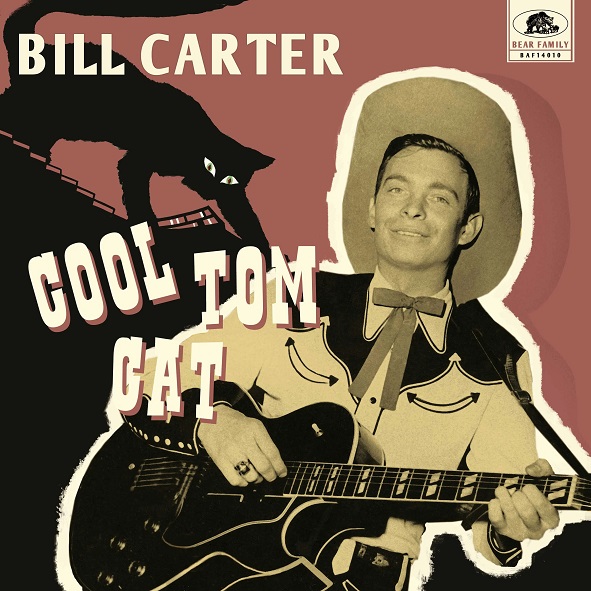 |
COOL
TOM CAT/ BILL CARTER
Van Bill Carter zijn er een achttal nummers in omloop op verzamelalbums
van Bear Family, Collector, Buffalo Bop, Cactus en Classics waarvan
Cool Tom Cat uit 1959 het bekendste is, maar dit is de eerste keer
dat er een verzamelalbum van hem verschijnt, met daarop de meeste
maar niet alle acht van die nummers. De Bear Family reputatie getrouw
is dat een luxueuze uitgave geworden, namelijk een 10 inch vinyl vergezeld
van een CD en diverse goodies. Carter nam van 1953 tot in de jaren
'60 op voor minstens 22 verschillende kleine labels waarvan hij er
een deel zelf had opgestart, en zijn beste uptempo nummers vormen
nu bijna 70 jaar later de 12 nummers 1954-1961 op deze 10 inch. Eén
van de nummers, het indianenverhaal A Woman's Way (hier toegeschreven
aan enerzijds Bill Carter en anderzijds Big Jim DeNoone, dat is een
beetje onduidelijk) verscheen in 1954 zelfs enkel als promo en niet
in de reguliere handel - onbegrijpelijk als je de kwaliteit van dat
nummer hoort! Dat dozijn songs zijn evenwel niet allemaal Cool Tom
Cats met zijn gemene gitaar, een drumsolo, lyrics over een "real
cool kitty from hep cat city" en een melodie die wat weg heeft
van Johnny Burnette's rockabilly klassieker Your Baby Blue Eyes. Cool
Tom Cat klinkt trouwens verbazingwekkend wild voor 1959, zeker in
vergelijking met het gestroomlijnde I Wanna Feel Good uit 1957 waaraan
ze overduidelijk een vlot handjeklap Elvis arrangement inclusief Jordanaires
backings hebben willen geven. Daarnaast is er de bizarrobilly Baby
Brother en de honky tonk piano boogie rocker I Used To Love You, maar
toch zijn dit buitenbeentjes in Carter's oeuvre want op de meeste
nummers klinkt hij exact zoals hij waarschijnlijk ook in levende lijve
was, namelijk een joviale rondborstige zanger van wat in de hoesnota’s
wordt omschreven als "tough guy hillbilly noir", bijvoorbeeld
de rustige honky tonk-iënde hillbilly boogie You Ain't Got My
Address met Hank Garland op gitaar, de medium tempo cowboy western
saga Jailer Man en het boom-chicka-boom Shot Four Times And Dyin'
met een jonge Del Reeves op gitaar. Seven Years is een trein song,
Secret Date is pure medium tempo country, Ramblin' Fever klinkt als
uptempo Sun country, en Don't Monkey With My Widder (van The Carolina
Drifters met Bill Carter op tweede stem) begint als klaaglijke gospel
alvorens een rock 'n' roll gitaar boogie te worden. About eight of
Bill Carter's songs have been circulating on Bear Family, Collector,
Buffalo Bop, Cactus and Classics compilations, the best known of which
is 1959's Cool Tom Cat, but this is the first time a single artist
best of by him has been released, featuring most but not all eight
of those songs. True to Bear Family's reputation this is a deluxe
release consisting of a 10 inch vinyl accompanied by a CD and various
goodies. Carter recorded from 1953 into the 1960s for at least 22
different small labels, some of which he started himself, and almost
70 years later his best uptempo songs make up the 12 songs 1954-1961
on this 10 inch. One of the songs, the indians' tale A Woman's Way
(attributed here to both Bill Carter and Big Jim DeNoone, it's a bit
unclear) appeared in 1954 only as a promo and not as a regular release
- incomprehensible when you hear the quality of this song! Not all
of this dozen songs are however Cool Tom Cats with its mean guitar,
a drum solo, lyrics about a "real cool kitty from hep cat city"
and a melody that resembles Johnny Burnette's rockabilly classic Your
Baby Blue Eyes, a song that sounds amazingly wild for 1959, especially
compared to the streamlined I Wanna Feel Good from 1957 to which they
obviously wanted to give a smooth hand clapping Elvis arrangement
including Jordanaires backings. There's also the bizarrobilly Baby
Brother and the honky tonk piano boogie rocker I Used To Love You,
yet these are exceptions in Carter's oeuvre because on most songs
he sounds exactly like he probably was in person, a jovial good natured
happy go lucky singer of what the liner notes describe as "tough
guy hillbilly noir" such as the relaxed honky tonk-ying hillbilly
boogie You Ain't Got My Address with Hank Garland on guitar, the medium
tempo cowboy western saga Jailer Man and the boom-chicka-boom Shot
Four Times And Dyin' with a young Del Reeves on guitar. Seven Years
is a train song, Secret Date is medium tempo country, Ramblin' Fever
sounds like uptempo Sun country and Don't Monkey With My Widder (by
The Carolina Drifters with Bill Carter on second voice) starts out
as plaintive gospel before turning into a rockin' guitar boogie. |
17 februari 2021
![]()
Vinyl Recensies
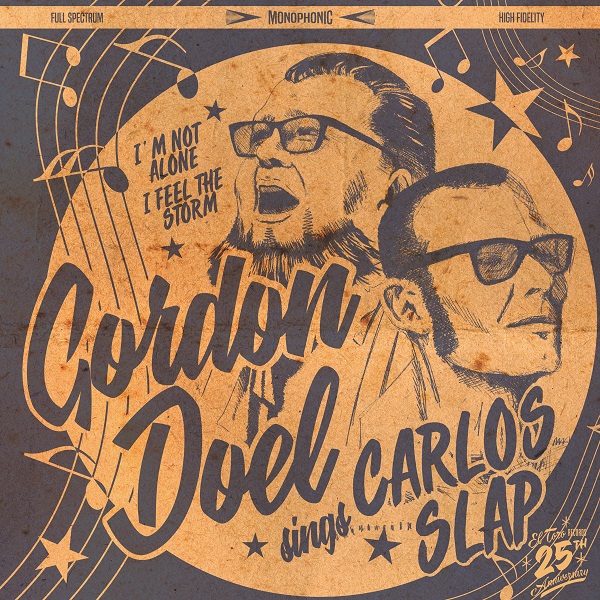 |
SINGS
CARLOS SLAP/ GORDON DOEL
Carlos López alias Charlie Slap uit Madrid is de contrabassist
van The Lucky Dados en de meer psycho gerichte Speedsickers, en na
vinyl singles waarop hij samenwerkte met Charlie Hightone (GB), Marcel
Bontempi (D) en Spencer Evoy (GB) is het nu de beurt aan Gordon Doel
van de Britse band The Doel Brothers. Het basisprincipe daarbij is
dat er twee nieuwe songs van Spaanse origine worden opgenomen in Spanje
met Spaanse muzikanten, of is dit door de wonderen der digitale techniek
apart opgenomen tijdens de lockdown? De mij onbekende muzikanten komen
deels uit rock 'n' roll bands (Fever Band, Mad Martin Trio), deels
uit niet-rock 'n 'roll bands en ongetwijfeld deels uit niet-rock 'n'
roll bands waar Carlos Slap zelf bij speelt, maar dat van die niet-rock
'n' roll is er gelukkig niet aan te horen. Op luistergebied zijn er
geen verrassingen want de muziek is door western swing geïnspireerde
rock 'n' roll met steel gitaar, helemaal in de stijl van de albums
van The Doel Brothers, met twee nummers in de verhalende stijl van
Tennessee Ernie Ford perfect op maat van Gordon Doel geschreven maar
door Doel hoger gezongen dan Tennessee Ernie Ford. I'm Not Alone is
twee minuten rocka-hillbilly feel, het soort melodietje waar een Deke
Dickerson wel raad mee weet, B-kant I Feel The Storm is melodieuze
uptempo countrypicking boogie op boom-chicka-boom ritme in een western
setting, net als in I'm Not Alone met een prominente steel in samenspel
met de elektrische gitaar.
Carlos
López aka Charlie Slap from Madrid is the double bass player
of The Lucky Dados and the more psychobilly oriented Speedsickers,
and after vinyl singles on which he collaborated with Charlie Hightone
(GB), Marcel Bontempi (D) and Spencer Evoy (GB) he is now joined by
Gordon Doel of the British band The Doel Brothers. The basic principle
is that two new songs of Spanish origin are recorded in Spain with
Spanish musicians, or was this thanks to the wonders of digital technology
recorded separately during the lockdown? I don't know any of the musicians
involved who are partly from rock 'n' roll bands (Fever Band, Mad
Martin Trio), partly from non-rock 'n' roll bands and undoubtedly
partly from non-rock 'n' roll bands in which Carlos Slap himself plays,
but you can't hear this on the recordings. No surprises here as the
music is western swing inspired rock 'n' roll with steel guitar completely
in the style of The Doel Brothers' albums, with two songs in the narrative
style of Tennessee Ernie Ford perfectly tailored to Gordon Doel but
sung higher by him than Tennessee Ernie Ford would. I'm Not Alone
is a two minutes of rocka-hillbilly feel kind of Deke Dickerson type
of tune, while B-side I Feel The Storm is melodic uptempo countrypicking
boogie on a boom-chicka-boom rhythm in a western setting, just like
I'm Not Alone with a prominent steel intertwining with the electric
guitar. |
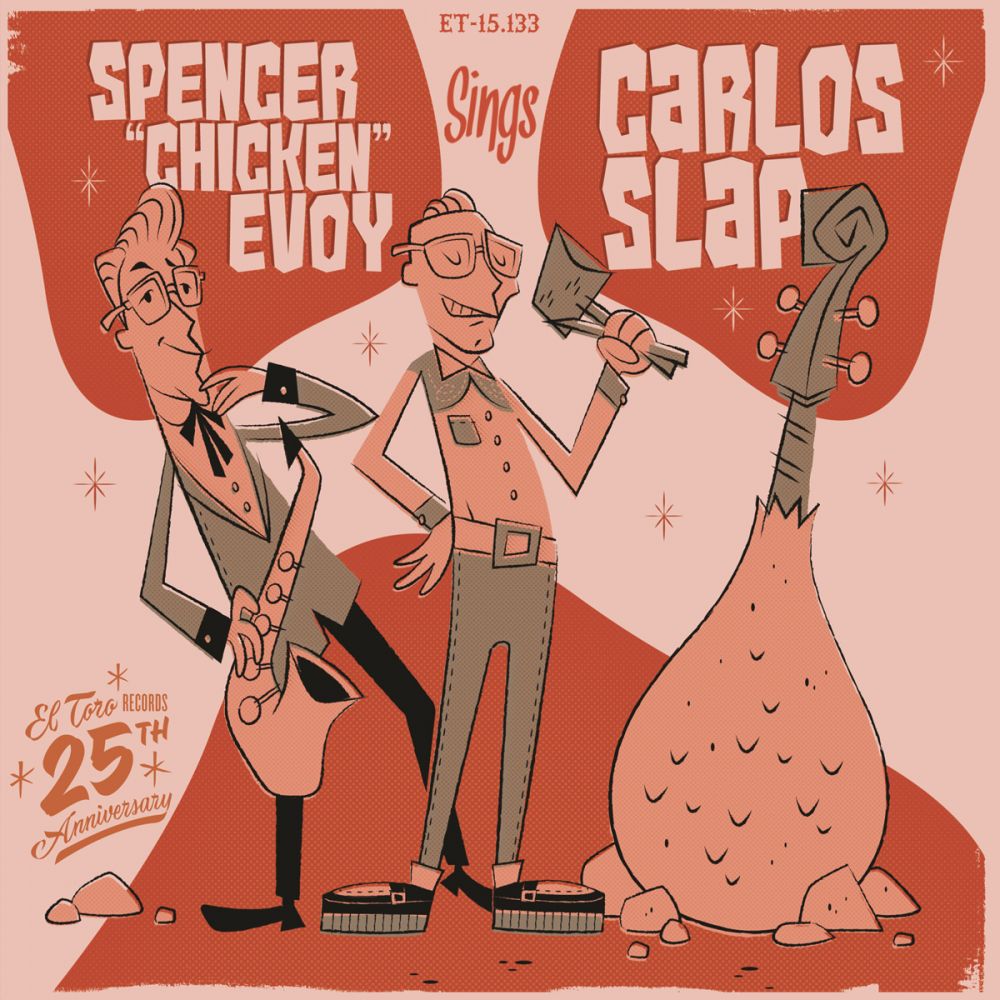 |
SINGS
CARLOS SLAP/ SPENCER "CHICKEN" EVOY Carlos López alias Charlie Slap uit Madrid is de contrabassist van The Lucky Dados en de meer psycho gerichte Speedsickers, en na vinyl singles waarop hij samenwerkte met Charlie Hightone (GB), Marcel Bontempi (D) en Gordon Doel van The Doel Brothers (GB) is het nu de beurt aan Spencer Evoy, met als basisprincipe dat er twee nieuwe songs van Spaanse origine worden opgenomen in Spanje met Spaanse muzikanten, of is dit door de wonderen der digitale techniek apart opgenomen tijdens de lockdown? Evoy is de zanger en saxofonist van de Britse band MFC Chicken, een frontman met een verbazingwekkend zware brullende sixties stem voor zo'n magere kippenborst, en MFC Chicken, de laatste paar jaar een sensatie op rock 'n' roll festivals, is een fratrockband die het beste van jaren '60 bands als The Fabulous Wailers, The Sonics, The Kingsmen, The Troggs en Sam The Sham & the Pharaohs in zich verenigt. De mij onbekende Spaanse muzikanten komen deels uit rock 'n' roll bands (Fever Band, Mad Martin Trio), deels uit niet-rock 'n' roll bands en ongetwijfeld deels uit niet-rock 'n' roll bands waar Carlos Slap zelf bij speelt, maar dat van die niet-rock 'n' roll is er gelukkig niet aan te horen. Dat dit echter geen standaard rock 'n 'roll is geworden moge evenwel duidelijk zijn voor wie het feestrecept van MFC Chicken kent. A-kant The Monkey Shotgun drijft op orgel en sax maar klinkt als een zichzelf niet al te serieus nemende light versie van The Sonics, terwijl een begeleidende piano voor de roll zorgt. B-kant Down In Mexico (geschreven door Franco Angás, zanger-gitarist van de Spaanse surfgroep Los Twangs) is rustiger in de soulvolle stijl van de zwarte muziek begin jaren '60. Fans van MFC Chicken zullen niet teleurgesteld zijn. Info: www.eltororecords.com en www.facebook.com/carlos.slap.5 (Frantic Franky)
Carlos López aka Charlie Slap from Madrid is the double bass player of The Lucky Dados and the more psychobilly oriented Speedsickers, and after vinyl singles on which he collaborated with Charlie Hightone (GB), Marcel Bontempi (D) and Gordon Doel of The Doel Brothers (GB) it's Spencer Evoy's turn, with the basic premise that two new songs of Spanish origin are recorded in Spain with Spanish musicians, or was this recorded separately during the lockdown through the wonders of digital technology? Evoy is the singer and saxophone player of the British band MFC Chicken, a frontman with an amazingly heavy booming sixties voice for such a skinny chicken breast, while MFC Chicken, a sensation at rock 'n' roll festivals the last few years, is a frat rock band incorporating the best of sixties bands like The Fabulous Wailers, The Sonics, The Kingsmen, The Troggs and Sam The Sham & the Pharaohs. I don't know any of the Spanish musicians involved who come partly from rock 'n' roll bands (Fever Band, Mad Martin Trio), partly from non-rock 'n' roll bands and undoubtedly partly from non-rock 'n' roll bands in which Carlos Slap himself plays, but luckily you can't hear this in the music. Nevertheless it will be obvious for those who know MFC Chicken's party recipe that this is not your avarage standard rock 'n roll. A-side The Monkey Shotgun is heavy on organ and sax but sounds like a not-too-serious version of The Sonics light, while an accompanying piano provides the roll. B-side Down In Mexico (written by Franco Angás, singer-guitarist of Spanish surf group Los Twangs) is calmer in the soulful style of early sixties black music. Fans of MFC Chicken will not be disappointed. Info: www.eltororecords.com en www.facebook.com/carlos.slap.5 (Frantic Franky) |
![]()
CD Recensies
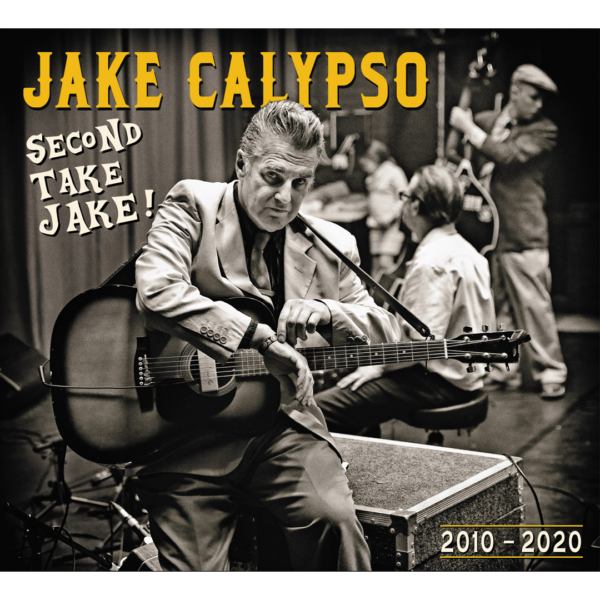 |
SECOND
TAKE JAKE 2010-2020/ JAKE CALYPSO
Na One Take Jake uit 2018 is dit de tweede Jake Calypso "best
of" met 25 tracks die de zeven Jake Calypso albums verschenen
van 2009 (zijn debuutalbum Grandaddy's Grease) tot 2020 (het op slechts
50 exemplaren verschenen Lockdown Sessions) overloopt en de vinyl
singletracks Who Knocks On My Door, When We Cross Our Eyes en Babe
Babe Baby bevat, met speciaal voor u daar die trouw alle Jake Calypso
albums en singles kocht verschillende hermixte en geremasterde en
drie onuitgebrachte nummers. Jake Calypso is sinds 2009 het alter
ego van Hervé Loison (F) die sinds begin jaren '80 opnam met
The Corals, Teddy Best, Mystery Train en Hot Chickens. Het oorspronkelijke
Jake Calypso concept in 2009 was het spelen van authentieke rockabilly,
maar dat idee liet Loison snel varen en Jake Calypso werd een fictief
personage dat intussen zowat alle rock 'n' roll stijlen onder handen
nam. Dat weerspiegelt zich uiteraard op deze CD waarop naast geflipte
rammel rockabilly (Cinderella, I'm A Real Cool Cat, Gonna Bring You
Back, That's All Right) en primitivo bop (Tell Me Lou, de geniale
meestamper Passion And Fashion) ook rechtdoor glam rock 'n' roll (When
I Was 15), melodieuze medium tempo gospel ballades (Milky White Way),
teenrock (You Killing Me) en Elvis gefluister (het gevoelige Home
Is Where The Heart Is, het onuitgebrachte That's When Your Heartaches
Begin op één akoestische gitaar) de revue passeren,
maar evengoed zwarte strollers (Addiction Baby), semi-akoestische
countryblues (Louise Blues, het hypnotiserende Don't Miss The Train
Man), bluesbop (Hey Barber Barber) en country (To My Son And Daughter).
De twee andere onuitgegeven songs naast That's When Your Heartaches
Begin komen van de sessies voor de Lockdown Sessions CD, namelijk
het uptempo country Little Cabin On The Hill en een meer Charlie Feathers
geïnspireerde alternatieve If I Had Me A Woman. Het is daarbij
duidelijk dat Jake Calypso de dementerende krankjorum rockabilly steeds
meer achter zich laat om zich reflectiever te uiten. Komt de wijsheid
dan toch met de jaren? Misschien wel, maar gelukkig blijven het onbegrijpelijke
gebrabbel en de occasionele jodel behouden. In elk geval is er nog
hoop voor de rock 'n' roll zolang er Hervé Loisons op deze
aardkloot rondlopen, want dankzij artiesten zoals hij behouden wij
het geloof in de bovennatuurlijke kracht van rock 'n' roll.
Following 2018's One Take Jake, this is the
second Jake Calypso "best of" with 25 tracks spanning the
seven Jake Calypso albums released from 2009 (his debut Grandaddy's
Grease) to 2020 (Lockdown Sessions of which only 50 copies were pressed)
and including the vinyl single tracks Who Knocks On My Door, When
We Cross Our Eyes and Babe Babe Baby, with especially for all you
folks out there who faithfully bought all Jake Calypso albums and
singles several remixed and remastered and three unreleased tracks.
Jake Calypso has been the alter ego of Hervé Loison (F) who
since the early 1980s recorded with The Corals, Teddy Best, Mystery
Train and Hot Chickens. The original Jake Calypso concept in 2009
was to play authentic rockabilly, but Loison quickly dropped that
idea and Jake Calypso became his alter ego who has since taken on
just about every rock 'n' roll style. That is reflected on this CD
which apart from flipped out rattling rockabilly (Cinderella, I'm
A Real Cool Cat, Gonna Bring You Back, That's All Right) and primitivo
bop (Tell Me Lou, the brilliant feet stompin' Passion And Fashion)
features not only straight ahead glam rock 'n' roll (When I Was 15),
melodic medium tempo gospel ballads (Milky White Way), teen rock (You
Killing Me) and Elvis whispers (the sensitive Home Is Where The Heart
Is, the unreleased That's When Your Heartaches Begin on one acoustic
guitar) but also black strollers (Addiction Baby), semi-acoustic country
blues (Louise Blues, the hypnotising Don't Miss The Train Man), blues
bop (Hey Barber Barber) and country (To My Son And Daughter). The
two other unreleased songs besides That's When Your Heartaches Begin
stem from the sessions for the Lockdown Sessions CD: the uptempo country
Little Cabin On The Hill and a more Charlie Feathers inspired alternative
If I Had Me A Woman. It's clear that Jake Calypso is increasingly
leaving the demented crazy rockabilly behind to express himself more
reflectively. Does wisdom come with age after all? Perhaps, but fortunately
the incomprehensible gibberish and the occasional yodel remain. In
any case, as long as there are Hervé Loisons walking this earth
there is still hope for rock 'n' roll, because thanks to artists like
him we keep our faith in the supernatural power of rock 'n' roll. |
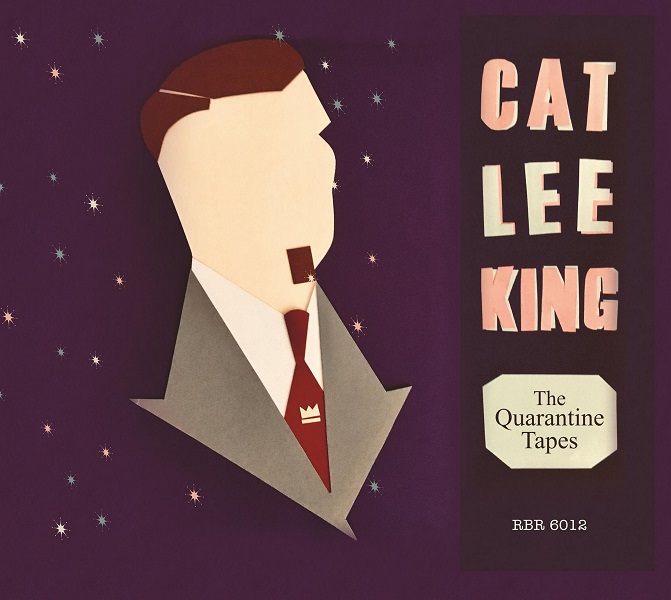 |
THE
QUARANTINE TAPES/ CAT LEE KING
Eerste soloalbum van Cat Lee King, de frontman, pianist en zanger
met de grofkorrelige stem van de Duitse band Cat Lee King & his
Cocks, met King nu niet alleen op piano maar ook op gitaar en drums,
met gastbijdragen van Ray Collins en Cat Lee King & his Cocks
gitarist Tommy J. Croole. Het enige Cat Lee King & his Cocks album
nu toe, Cock Tales (RBR 5887) uit 2018, is de betere rock 'n' roll
op basis van boogie woogie piano met gitaarsolo’s die af en
toe maar gelukkig niet te vaak richting rhythm ‘n’ blues
gingen. Een paar nummers op Cock Tales helden over naar de rhythm
‘n’ blues en enkele andere songs vertoonden de invloed
van (neo)swing, en laten dat nu juist de pijlers zijn waarop dit soloalbum
steunt.
First solo album from Cat Lee King, the gravel voiced frontman, piano player and singer of German band Cat Lee King & his Cocks, with King now not only on piano but also on guitar and drums, with guest contributions from Ray Collins and Cat Lee King & his Cocks guitarist Tommy J. Croole. The only Cat Lee King & his Cocks album to date, 2018's Cock Tales RBR 5887, is excellent boogie woogie piano based rock 'n' roll with guitar solos that occasionally but thankfully not too often veer in the direction of rhythm 'n' blues. A few songs on Cock Tales tilted toward rhythm 'n' blues and a few others showed the influence of (neo)swing, and whaddaya know: those two genres are the very pillars on which this solo album rests. Alberta Hunter's My Castle's Rockin' is a barrelhouse crooner with jazzy sax, 4 O' Clock Blues attributed to Count Basie's jazz guitarist Eddie Durham is bluesy with deep blowing horns, and there's more blues with Herbert Beard's Gal You Need A Whippin' and Zuzu Bollin's uptempo Why Don't You Eat Where You Slept Last Night. Willie Dixon's quiet, hauntingly beautiful Violent Love we know from Dr Feelgood and Indigo Swing but gets a somewhat bluesy interpretation thanks to the guitar. Other crooners are the familiar On The Sunny Side Of The Street and the quiet Close To Me with vibraphone, bizarrely enough a sensitive sixties song from mass murderer Charles Manson, even though all Manson did was to put new lyrics to the early sixties Latin American bolero Sabor A Mi, the same song that was covered in 1978 by Los Lobos on their debut LP Just Another Band From East LA. Manson's version from +/- 1967 is an oddity among his recordings, for in Close To Me he sounds more like Willie Nelson than like himself. Blues and crooners come together in Ain't Nobody's Business which in the early 1920s became one of the first blues standards, performed here again with a blues solo on the guitar but with gospel overtones on piano. Arbee Stidham's Meet Me Half Way from 1956 is a stop/start blues in the style of the better known Get Out Of The Car (Treniers, Richard Berry) and one of the best songs on the CD as it is the closest to Cock Tales. All of these songs are covers with the best known cover being Hank Williams' Hey Good Looking in a piano boogie version with uptempo blues guitar, but The Quarantine Tapes also contains three original songs: the uptempo blues Final Call, the old fashioned swing Whoever Made You with harmony vocals that would fit perfectly on the setlist of Cat Lee King & his Cocks, and the swinging instrumental Virologoy with fingerpicking blues guitar. The sound of the CD is less streamlined than Cock Tales and more like a demo, as if it came blaring out of an old transistor radio, partly because King is better on piano than on guitar and because the saxes sometimes squeak. The sound of voices and laughter in the background give it a live feel as if this was recorded in a smoke filled pub. The vinyl version is supposed to be on its way. Info www.vintagerockinroots.com en www.facebook.com/catleekingandhiscocks (Frantic Franky) |
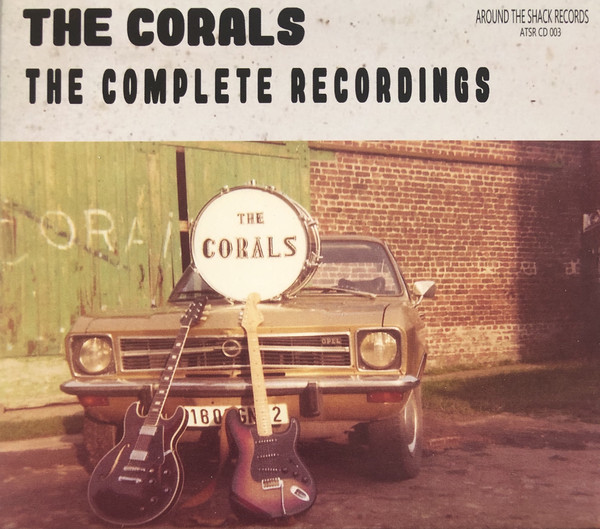 |
THE
COMPLETE RECORDINGS/ THE CORALS
Afdeling jeugdsentiment: deze CD bevat de complete opnames van The
Corals (F), de eerste groep van Hervé Loison, later bij Teddy
Best, Mystery Train, Hot Chickens en tot op heden zeer actief als
Jake Calypso. The Corals waren een instrumentaal kwartet met twee
elektrische gitaren en Hervé Loison op basgitaar dat van 1981
tot 1985 volledig bestond uit prille tieners. De complete output van
The Corals, één single en één LP, verscheen
op Mac Records, het in 1971 opgerichte artisanale Belgische label
van de in 2016 overleden Mac Bouvrie, de immer razend enthousiaste
kerel in maatpak die in die dagen op elk rock 'n' roll festival zijn
vinylwaren vanuit zijn kraampje aan de man bracht.
Nostalgia
department: this CD contains the complete recordings of The Corals
(F), the first group of Hervé Loison, later with Teddy Best,
Mystery Train and Hot Chickens and to this very day still very active
as Jake Calypso. The Corals were an instrumental quartet with two
electric guitars and Hervé Loison on bass guitar, consisting
of young teenagers and active from 1981 to 1985. The entire recorded
legacy of The Corals, one single and one LP, appeared on Mac Records,
the artisanal Belgian label founded in 1971 by Mac Bouvrie, the ever
enthusiastic guy in the business suit who sold his vinyl goods from
his stall at every rock 'n' roll festival in those days. |
17 februari 2021
![]()
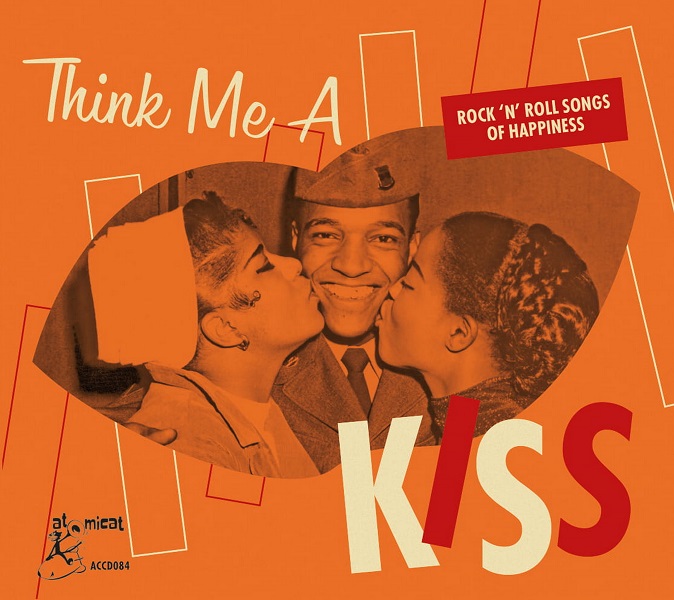 |
THINK
ME A KISS
Op tijd verschenen voor valentijn maar te laat door ons gerecenseerd
(wij waren te druk bezig met tinderen): deze CD, losjes gewijd aan
de liefde. Met dat thema kan je uiteraard alle richtingen uit, maar
voor u richting nooduitgang rent geven we meteen mee dat de melige
ballade hier niet aan de orde is. Een flink deel van de muziek op
deze door DJ Mark Armstrong samengestelde CD situeert zich in de zwarte
muziek uit het kantelmoment tussen de jaren '50 en de jaren '60, zoals
Little Frankie Brunson's opgewekte How Can I Please You met zijn opvallende
sax rif, David Gates' uptempo The Happiest Man Alive met violen, Sam
Cooke's You Send Me gecoverd door Cornell Gunter van The Coasters
voor één keer in een serieuze bui, en Clyde McPhatter's
Think Me A Kiss. McPhatter krijgt op de hoes een smakkerd van zijn
Atlantic stalgenotes Ruth Brown en LaVern Baker, beide eveneens aanwezig
met respectievelijk het supersnelle Hello Little Boy en het A Help
Each Other Romance duet met Ben E. King. Daarnaast doet McPhatter
het ook met Ruth Brown in het duet I Gotta Have You. Er is uptempo
female rock 'n' roll met sax met The Charmers' Oh Yes en The Harris
Sisters' Kissin' Bug, een goeie jiver zoals er hier wel meer op staan
want jongetje + meisje = dansen en dat kan je op The Sparks' A Cuddle
And A Kiss en Murray Schaff & his Aristocrats' Ooh How I Love
You. Meisjes die liever strollen kunnen hun gang gaan op I Found My
Girl van The Kents. Songs als The Four Marksmen' The Birth Of Love,
Sylvester Bradford's I Like Girls, John T. Webster's Gotta Make Love
To You, The Squires' Sweet Girl, Stanley Mitchell & the Tornados'
Would You Could You en The Tenderfoots' Kissing Bug (hetzelfde beestje
als bij The Harris Sisters maar geheel anders uitgevoerd) komen uit
de doo-wop, maar 't is heus niet alleen zwarte muziek hier: Sanford
Clark laat zich in Ooo Baby eens een keertje van zijn snelle kant
horen, Sleepy LaBeef stelt zich in You're So Easy To Love verrassend
teder op, en My Steady Baby is blanke boogie bop van de als Rudy Grayzell
klinkende Ray Pennington & his Western Rhythm Boys. Het opvallend
dromerige My Heart van Vilas Craig & the Vi Counts klinkt zijn
tijd ver vooruit voor 1959 en zou je eerder uit midden jaren '60 verwachten!
Released
in time for valentine's day but reviewed too late by us (we were too
busy tindering) comes this CD loosely devoted to love, a theme that
can lead you in any direction, but before you run towards the emergency
exit let's make it clear that this CD is not about the romantic ballad.
Much of the music here compiled by DJ Mark Armstrong is situated on
the tipping point between the 1950s and the 1960s, such as Little
Frankie Brunson's upbeat How Can I Please You with its striking sax
riff, David Gates' uptempo The Happiest Man Alive with violins, Sam
Cooke's You Send Me covered by Cornell Gunter of The Coasters for
one time only in a serious mood, and Clyde McPhatter's Think Me A
Kiss. On the cover McPhatter gets a big fat kiss from his Atlantic
stablemates Ruth Brown and LaVern Baker, both also present with respectively
the super fast Hello Little Boy and the A Help Each Other Romance
duet with Ben E. King. On top of that McPhatter also does it with
Ruth Brown in the duet I Gotta Have You. There's sax led uptempo female
rock 'n' roll with The Charmers' Oh Yes and The Harris Sisters' Kissin'
Bug, one of several good jivers here as boy + girl = dancing and you
can do exactly that on The Sparks' A Cuddle And A Kiss and Murray
Schaff & his Aristocrats' Ooh How I Love You. Girls who prefer
to stroll can get their kicks on I Found My Girl by The Kents. Songs
like The Four Marksmen' The Birth Of Love, Sylvester Bradford's I
Like Girls, John T. Webster's Gotta Make Love To You, The Squires'
Sweet Girl, Stanley Mitchell & the Tornados' Would You Could You
and The Tenderfoots' Kissing Bug (the same little pest as The Harris
Sisters' but sang completely different) come straight out of doo-wop
land, but it's by no means only black music here: Sanford Clark demonstrates
his fast side in Ooo Baby, Sleepy LaBeef is surprisingly tender in
You're So Easy To Love, and My Steady Baby is white boogie bop from
the Rudy Grayzell sounding Ray Pennington & his Western Rhythm
Boys. The strikingly dreamy My Heart by Vilas Craig & the Vi Counts
is way ahead of its time for 1959 and sounds like it could be from
the mid 1960s! |
 |
SHOW
AFFECTION: THE TEN COMMANDMENTS OF ROCK 'N' ROLL COMMANDMENT FOUR
Op basis van het hoesje en het tijdstip van verschijnen rekenen wij
deze CD tot de valentijn releases, maar als het vierde van de tien
rock 'n' roll geboden "show affection" is fronsen wij onze
wenkbrauwen, want toen wij onze kleine catechismus deden luidde dat
"vader, moeder zult gij eren". Waarschijnlijk is samensteller
DJ Mark Armstrong opgegroeid in een andere denominatie. In elk gevallen
zagen we allebei het licht en vereren wij enkel en alleen de rock
'n' roll, en deze CD reeks is een mooi offer op dat altaar. Volume
4 biedt 30 tracks 1953-1961, opent met blanke rock 'n' roll in de
vorm van de rechtdoor rocker My Little Jewel van Tommy "Jim"
Beam & the Four Fifths op het - we kid you not - 100 Proof label
en een interessante cover van Peggy Sue door Jackie Walker, twee nummers
waarbij de zang niet helemaal synchroon lijkt met de begeleiding.
Er is nog meer rechtdoor blank rock 'n' roll geweld met Phil Barclay
& the Sliders' Short Fat Ben en Johnny Amelio's Jo Ann Jo Ann,
en daartussen zit uitstekend spul verscholen als Sonny Anderson's
Yes I'm Gonna Love You. Onbegrijpelijk en zonde dat zo'n solide nummer
niet bekender is! Misschien is het wel zo goed omdat het werd geschreven
door Johnny en Dorsey Burnette, al namen ze het bij mijn weten nooit
zelf op. Naast zwarte jivers als The Flairs' Steppin' Out en Jimmie
Lee's That's Fat Jack en strollers als Little Willie John's Take My
Love (I Want To Give It All To You) is er veel rockende doo-wop met
Roy Teo's Mama Doll, The Del Vikings' Pretty Little Things Called
Girls, The Champions' Come On And Love Me, The Five Keys' From The
Bottom Of My Heart, The Mellows' Pretty Baby What's Your Name en The
Joytones' Gee What A Boy, en aan de andere kant van de balans rockabilly
met Burrie Manso & the Bonnivilles' My Woman. Toeval of niet,
maar Conway Twitty's zelfgeschreven Hey Miss Ruby uit 1960 heeft wat
weg van Ruby Baby van Dion uit 1962, al was dat uiteraard een cover
van een nummer van The Drifters uit 1956. Billy & Don Hart's Rock-A-Bop-A-Lina
uit 1959 is dan weer in de stijl van Ronnie Self's in 1958 verschenen
Bop-A-Lena. Rustiger werk is Ray Ellington's Don't Burn Me Up, Bull
Moose Jackson's If You Ain't Lovin' (You Ain't Livin') en Priscilla
Bowman's I Ain't Givin' Up Nothin'. De big beat is in kundige handen
met The Jodimars' Boom Boom My Bayou Baby, Johnny Devlin's I'm Gonna
Love You is een early sixties Buddy Holly cloon, en voor de betere
teen rock zorgt de immer betrouwbare Narvel Felts met Cutie Baby.
Dale Hawkins koppelde in 1959 in het ook van Fats Domino bekende Liza
Jane een Bo Diddley beat aan New Orleans rock 'n' roll en merkwaardigerwijze
ook aan een erg sixties gerichte gitaargroove, en al even buiten de
platgetreden akkoorden treden Dave Rich's Rosie Let’s Get Cozy,
Robert Luke Harshman's Love Whatcha' Doin' To Me en de soulvolle blues
stomper Get Your Clothes And Let's Go van Crown Prince Waterford.
Het tegenovergestelde zijn enkele grote klassiekers als Jimmie Rodgers'
Kisses Sweeter Than Wine, Bobby Rydell's variété rocker
Wild One en Glen Glenn's melodieuze rockaballad Laurie Ann.
On the basis of the cover picture and time of release we count this
among the valentine's day releases, but if the fourth of the ten rock
'n' roll commandments is "show affection" we frown, because
when we went to sunday school we learned it was "thou shalt honor
thy father and mother " Probably compiler DJ Mark Armstrong grew
up in a different denomination. In any case both of us saw the light
and worship only rock 'n' roll, and this CD series is a nice offering
on that altar. Volume 4 offers 30 tracks 1953-1961, opening with white
rock 'n' roll in the form of the straight ahead rocker My Little Jewel
by Tommy "Jim" Beam & the Four Fifths on the - we kid
you not - 100 Proof label and an interesting cover of Peggy Sue by
Jackie Walker, two songs where the vocals don't seem quite in sync
with the accompaniment. There's more straight ahead white rock 'n'
roll violence with Phil Barclay & the Sliders' Short Fat Ben and
Johnny Amelio's Jo Ann Jo Ann, and tucked in between is excellent
stuff like Sonny Anderson's Yes I'm Gonna Love You. It's both incomprehensible
and a shame that such a solid song isn't better known! Maybe it's
so good because it was written by Johnny and Dorsey Burnette, though
to my knowledge they never recorded it themselves. Besides black jivers
like The Flairs' Steppin' Out and Jimmie Lee's That's Fat Jack and
strollers like Little Willie John's Take My Love (I Want To Give It
All To You) the CD offers a lot of rockin' doo-wop with Roy Teo's
Mama Doll, The Del Vikings' Pretty Little Things Called Girls, The
Champions' Come On And Love Me, The Five Keys' From The Bottom Of
My Heart, The Mellows' Pretty Baby What's Your Name and The Joytones'
Gee What A Boy, and on the other side of the balance rockabilly with
Burrie Manso & the Bonnivilles' My Woman. Coincidence or not,
but Conway Twitty's 1960 self-written Hey Miss Ruby is a bit like
Dion's 1962 Ruby Baby, though of course that was a cover of a 1956
song by The Drifters. Billy & Don Hart's 1959 Rock-A-Bop-A-Lina
is on the other hand in the style of Ronnie Self's 1958 release Bop-A-Lena.
More calm is Ray Ellington's Don't Burn Me Up, Bull Moose Jackson's
If You Ain't Lovin' (You Ain't Livin') and Priscilla Bowman's I Ain't
Givin' Up Nothin'. The big beat is in capable hands with The Jodimars'
Boom Boom My Bayou Baby, Johnny Devlin's I'm Gonna Love You is an
early sixties Buddy Holly clone, and the ever reliable Narvel Felts
provides quality teen rock with Cutie Baby. In 1959 Dale Hawkins coupled
a Bo Diddley beat with New Orleans rock 'n' roll to Liza Jane, a song
we also know from Fats Domino, topping it off with a very sixties
oriented guitar groove.Equally off the beaten track are Dave Rich's
Rosie Let's Get Cozy, Robert Luke Harshman's Love Whatcha' Doin' To
Me and the soulful blues stomper Get Your Clothes And Let's Go by
Crown Prince Waterford. The opposite are a couple of great classics
like Jimmie Rodgers' Kisses Sweeter Than Wine, Bobby Rydell's variety
rocker Wild One and Glen Glenn's melodic rockaballad Laurie Ann. |
10 februari 2021
![]()
CD Recensies
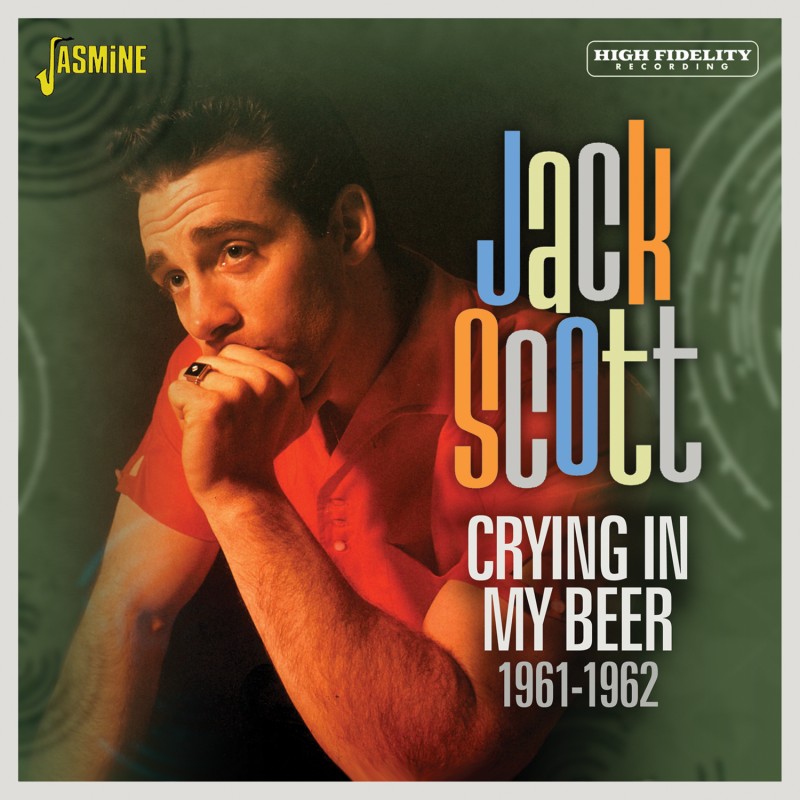 |
CRYING
IN MY BEER 1961-1962/ JACK SCOTT Voor een rock ‘n’ roll held heeft de in 2019 overleden Jack Scott, een van de coolste Italo-Amerikanen ooit, bijzonder weinig rock 'n' roll opgenomen. Maar wát voor rock 'n' roll! Niemand zal het ons kwalijk nemen als wij Jack Scott een balladeer gespecialiseerd in sfeervolle melodramatische mini-operettes noemen, want weinigen konden zo traag en ingetogen intrieste nummers vertolken, met die verfijnde dictie en dat moeiteloos glijden tussen de toonhoogtes van laag naar hoog, met een gesproken tussenstuk en een knik in de empathische stem alsof ie op het punt staat finaal de pedalen te verliezen, meestal met gebromde backing vocals erachter en vaak met een onderhuids dreigend, broeierig randje (Grizzly Bear), als een op uitbarsten staande vulkaan. De 24 track CD bevat Scott's complete Capitol opnames, maar niet zijn voor Top Rank opgenomen nummers als Burning Bridges en What In The World's Come Over You die op Capitol verschenen toen dat label in 1961 zijn Top Rank contract overnam. Snelle nummers zijn Now That I met een bijna Roy Orbison arrangement met strijkers en een James Burton-achtige country leadgitaar, voor Jack Scott typische strolls als Strange Desire, One Of These Days en Meo Myo, en perfect popwerk als Steps One And Two, Cry Cry Cry, You Only See What You Wanna See, Sad Story en I Can't Hold Your Letters (In My Arms). Dat hier echter meer trage dan snelle nummers op staan komt niet als een verrassing voor wie thuis is in het werk van Jack Scott. Tragische trage nummers en ballades zijn het van strijkers voorziene If Only en A Little Feeling (Called Love) en de één tegel schuifelaars My Dream Come True en The Part Where I Cry. Eigen aan de periode waarin deze nummers werden opgenomen is de countrywind die door songs als Green Green Valley, Laugh And The World Laughs With You, Strangers en All I See Is Blue waait. Er was maar één Jack Scott en de songs hier zijn uit duizenden te herkennen perfectionistisch Jack Scott materiaal, maar géén Leroy's, The Way I Walk's of Geraldine's. Wel krijg je zes oorspronkelijk onuitgebrachte songs: een alternatieve A Little Feeling (Called Love) en If Only (het verschil zit 'em in de achtergrond arrangementen), de easy listening country ballade Fancy Meeting You Again, het bluesy Go Away From Here (Cryin' In My Beer) dat ondanks het volledig uitgewerkte arrangement door de mindere geluidskwaliteit in vergelijking met de rest van het album klinkt als een uit de vuilbak geredde demo, en het uptempo True True Love in twee significant verschillende uitvoeringen. Voor wie een zwak heeft voor de betere ballades is dit kwaliteit gegarandeerd, en het staat in je CD kast perfect naast Jasmine's 64 tracks tellende Jack Scott dubbel-CD Touch Me Baby, I Go Hog Wild 1957-1960 (JASCD178). Info: www.jasmine-records.co.uk (Frantic Franky)
For a rock 'n' roll hero Jack Scott, one of the coolest Italo-Americans to ever walk the face of the earth, recorded surprisingly little rock 'n' roll, but the rock 'n' roll he did record remains stellar. No one is going to want to kill us for calling Jack Scott a balladeer specializing in atmospheric melodramatic mini-operettas, as few singers could interpret sad story songs so slowly and reflective, with that refined diction and that effortless glide between the low and the high registers, a spoken interlude and a empathic voice on the verge of breaking as if he was about to finally lose his sanity, usually with hummed doo-wop backing vocals and often with a underlying threatening, brooding edge (Grizzly Bear), like a volcano that's going to erupt. The 24 track CD contains Scott's complete Capitol recordings, but not the songs recorded for Top Rank like Burning Bridges and What In The World's Come Over You that were released by Capitol when they took over his Top Rank contract in 1961. Uptempo songs are Now That I with an almost Roy Orbison arrangement with strings and a James Burton-like countryfied lead guitar, typical Jack Scott strolls like Strange Desire, One Of These Days and Meo Myo, and perfect pop material like Steps One And Two, Cry Cry Cry, You Only See What You Wanna See, Sad Story and I Can't Hold Your Letters (In My Arms). Yet it should not come as a surprise to those who are familiar with Scott's work that the CD contains more slow than fast songs. Tragic ballads include If Only and A Little Feeling (Called Love) with strings and the one tile slows My Dream Come True and The Part Where I Cry. Typical for the time frame in which these songs were recorded is the country wind that permeates songs like Green Green Valley, Laugh And The World Laughs With You, Strangers and All I See Is Blue. There was only one Jack Scott and the material collected here is instantly recognisable perfectionist Jack Scott stuff, but no Leroy's, The Way I Walk's or Geraldine's. We do get six originally unreleased songs however: an alternative A Little Feeling (Called Love) and If Only (the difference is in the background arrangements), the easy listening country ballad Fancy Meeting You Again, the bluesy Go Away From Here (Cryin' In My Beer) which despite the fully worked out arrangement sounds like a demo rescued from the trash can due to the inferior sound quality as compared to the rest of the album, and the uptempo True True Love in two significantly different versions. Those of you who like quality ballads will dig what this CD has to offer, and it continues the Jack Scott story where Jasmine's 64 track Jack Scott double CD Touch Me Baby, I Go Hog Wild 1957-1960 JASCD178 left off. Jack Scott passed away in 2019. Info: www.jasmine-records.co.uk (Frantic Franky) |
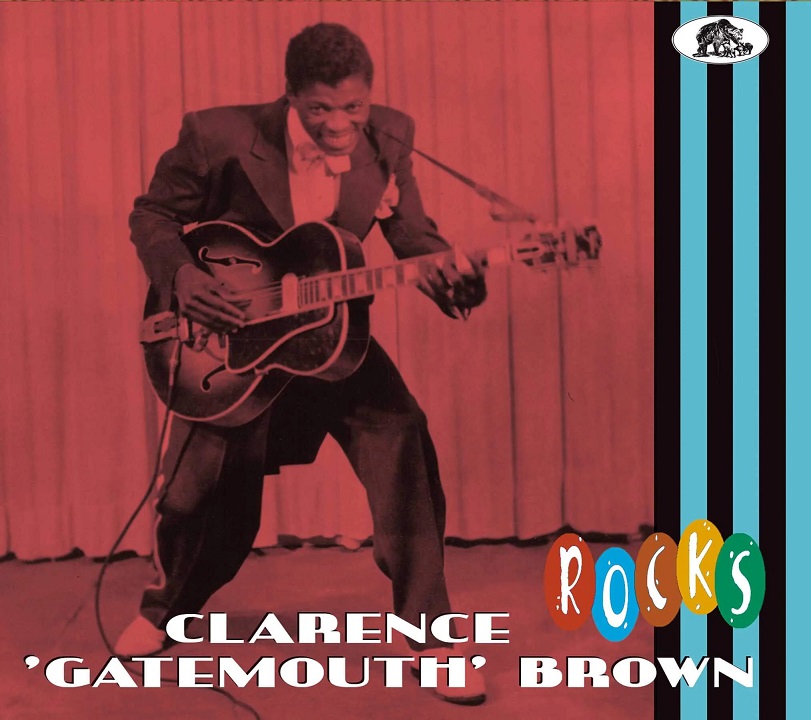 |
ROCKS/
CLARENCE "GATEMOUTH" BROWN
Clarence "Gatemouth'" Brown, dat is toch een bluesman? Heeft
de Texaanse gitarist die zich vanaf zijn comeback in de jaren '70
tot zijn dood aan longkanker in 2005 middels een hele reeks albums
niet vast liet pinnen op één genre door probleemloos
country, jazz, cajun en calypso in zijn gitaarspel te verwerken dan
genoeg rock 'n' roll opgenomen om een CD in Bear Family's Rocks reeks
te rechtvaardigen? Isn't
Clarence "Gatemouth'" Brown a blues artist? So is the Texas
guitarist who on a series of albums since his comeback in the 1970s
until his death from lung cancer in 2005 effortlessly incorporated
so much country, jazz, cajun and calypso into his guitar playing that
he couldn't be pinned down to one genre rock 'n' roll enough to justify
a CD in Bear Family's Rocks series? The CD spotlights the uptempo
material from his earliest work recorded between 1947 and 1960 (the
funky Slop Time, the blues fiddle of Just Before Dawn) for Aladdin
and Peacock, opening with the instrumental Okie Dokie Stomp, merciless
rhythm 'n' blues swing with a strong backbeat and of course the electric
guitar up front, but also featuring a whole army of horns chasing
that guitar. The vocal Baby Take It Easy pairs fireworks on the guitar
with a boogie piano, and those two opening tracks are pretty much
the blueprint for the entire CD. What is officially labeled "postwar
electric Texas blues" we on the other hand simply call rhythm
'n' blues rock 'n' roll with innovative guitar work influenced by
but more unpredictable than T-Bone Walker, propelled by horns and
spiced up with piano (Pale Dry Boogie, I Live My Life, Mary Is Fine,
You Got Money). Only one song bears the word "rock" in its
title, 1955's Rock My Blues Away, but even the slower and more bluesy
songs like Without Me Baby swing thanks to the horns. Medium tempo
material like Too Late Baby, Just Got Lucky and Boogie Rambler or
a sax instrumental like Ain't That Dandy are more boogie woogie, but
as usual all those genres blend to culminate in a steamy super fast
instro like Gate Walks To Board that can still teach many a guitarist
a thing or two. Brown's She Walk Right In became something of a blues
boogie classic, the instrumental Boogie Uproar was covered in between
all the Gene Vincent stuff by The Blue Cats on their first LP in 1980,
and That's Your Daddy Yaddy Yo was covered by The Paladins. Technically
none of this is real rock 'n' roll but as far as rhythm 'n' blues
swing goes this certainly rocks a long way, and all his fast songs
together on one CD are the perfect introduction for newbies, if you
don't mind a couple of slow blues numbers like Gate's Salty Blues
with harmonica, Dirty Work At The Crossroads and Depression Blues.
And if you don't know this pioneer of the electric blues guitar yet,
you can read all about him in the deluxe 34 page CD booklet. |
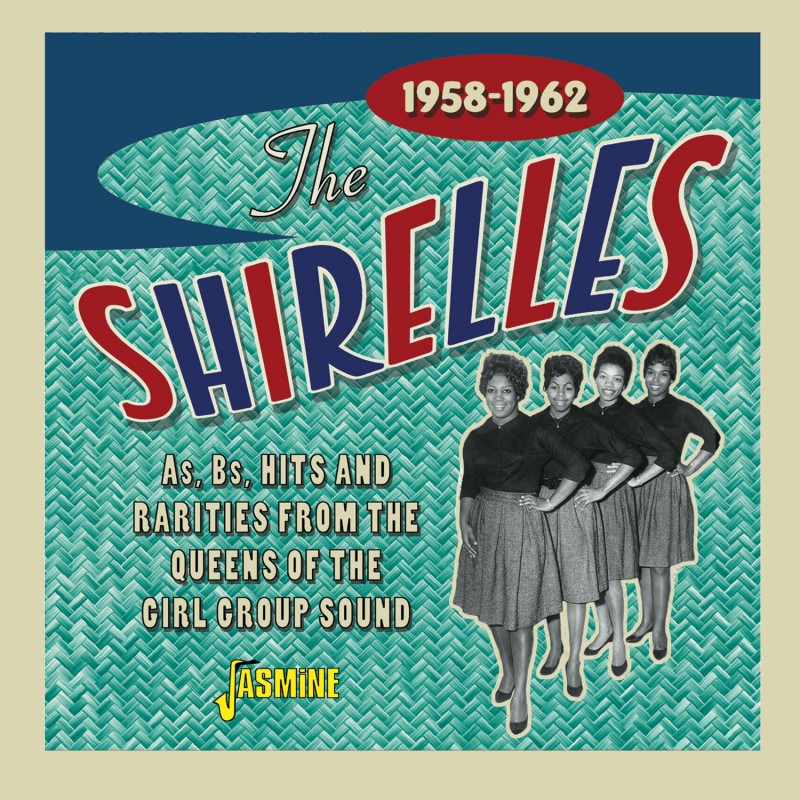 |
As,
Bs, HITS AND RARITIES 1958-1962/ THE SHIRELLES
The Shirelles staan in de rangorde der meidengroepen op dezelfde hoogte
als enerzijds The Chiffons en The Shangri-Las en anderzijds de Phil
Spector groepen als The Ronettes en The Crystals, met dien verstande
dat The Shirelles eerst waren. Met Will You Love Me Tomorrow (de eerste
Billboard Hot 100 nummer 1 van een zwarte meidengroep) en Soldier
Boy hebben ze twee klassiekers op hun naam staan, maar ook Tonight's
The Night, Mama Said, hun Five Royales cover Dedicated To The One
I Love en hun door niemand minder dan The Beatles gecoverde Boys zijn
veel meer dan voetnoten in het grote boek van de popgeschiedenis.
En Please Be My Boyfriend kent u misschien als Please Be My Girlfriend
van The Jets! In
the girl group pecking order The Shirelles are on the same level as
on the one hand The Chiffons and The Shangri-Las and on the other
hand the Phil Spector groups like The Ronettes and The Crystals, except
that The Shirelles were first. With Will You Love Me Tomorrow (the
first Billboard Hot 100 number 1 by a black girl group) and Soldier
Boy they have two classics to their name, but also Tonight's The Night,
Mama Said, their Five Royales cover Dedicated To The One I Love and
their Boys which was covered by none other than The Beatles are much
more than footnotes in the encyclopedia of pop history. This CD with
a generous 32 tracks (for comparison: there are triple Shirelles CDs
available with a total of.... 36 tracks!) opens with their debut single
I Met Him On A Sunday / I Want You To Be My Boyfriend and contains
both sides of all their 45s up to 1962, an impressive selection from
their output. The sheer volume alone of that output already proves
that The Shirelles were good, otherwise the record companies wouldn't
keep pumping money into them, simple as that. That means that musically
there is little to fault in their pop style clearly based on doo-wop,
an influence heard in songs like My Love Is A Charm, Slop Time and
Stop Me, but curiously enough also often unobtrusively rooted in Brazilian
rhythms. Stylistically their singing style is characterized by a combination
of romantic surrender, longing and fragile, naive innocence (partly
a result of the fact that they sometimes sang a tiny bit out of tune),
in stark contrast to the underlying sexual themes and messages of
some of their songs. As the years progress their music becomes more
pop oriented with the addition of for example trumpets (Blue Holiday)
but especially violins (Twenty-One, The Dance Is Over) which often
gives a Drifters effect (What A Sweet Thing That Was, A Thing Of The
Past, Stop The Music), so keep in mind that roughly half of this CD
is pop music. The Shirelles released some 40 singles and eight LP’s
up to 1965 and therefor it's easy to complain that not all of your
favorites are on here (I would have loved to hear some of their twist
songs) but you can't have everything in this life. Let it inspire
you to further explore The Shirelles! As far as we know two original
Shirelles, Shirley Owens aka Shirley Alston Reeves and Beverly Lee,
are still active in two different Shirelles groups. |
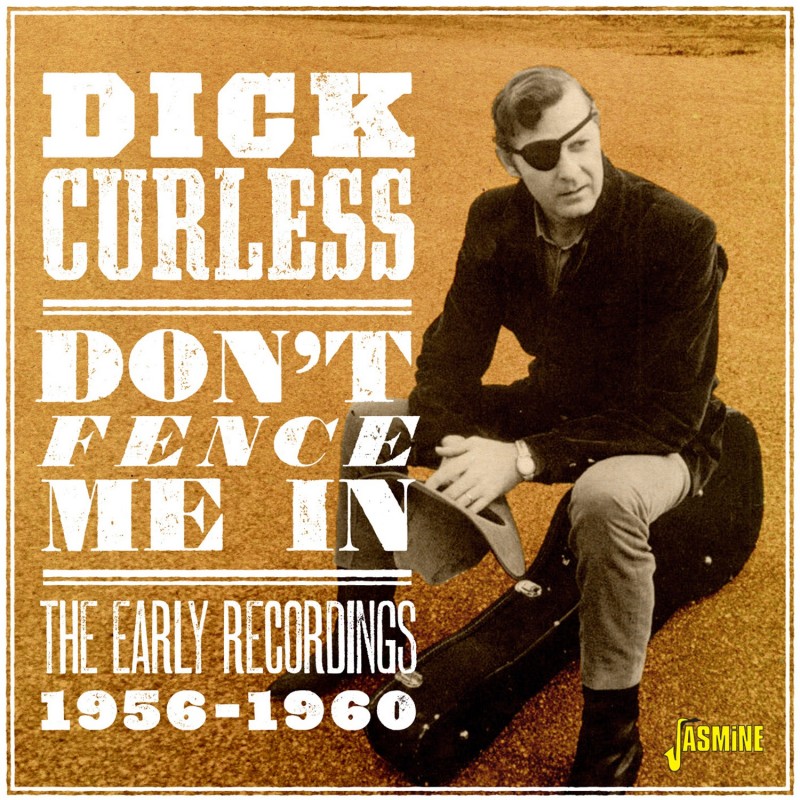 |
DON'T
FENCE ME IN/ DICK CURLESS De in 1995 aan maagkanker overleden Dick Curless, de zanger met het piratenooglapje (hij was deels blind in zijn rechteroog), was in de tweede helft van de jaren '60 een van de belangrijkste vertegenwoordigers van de truckin' country met als bekendste nummer A Tombstone Every Mile uit 1965, de grootste van zijn in totaal 22 Billboard Top 40 hits. Zijn carrière begon evenwel al 15 jaar vóór A Tombstone Every Mile, want hij maakte zijn eerste opnames in 1950 als lid van de groep The Trail Riders. Die minstens één 78 toeren plaat staat niet op deze CD met zijn "early recordings 1956-1960", in concreto zijn eerste twee solo singles uit 1956-1957 en zijn eerste twee LP’s, Songs Of The Open Country en Singing Just For Fun uit 1960 die integraal op de CD staan. Een derde LP uit 1960, de gospelplaat I Love To Tell The Story, staat er niét op. Die twee LP’s bestaan volledig uit covers en traditionals en een aantal van de songs kennen we uit de rock 'n' roll en de rockabilly: Crawdad Song is goeie uptempo country, Rock Island Line kennen we van Johnny Cash maar leunt bij Dick Curless meer aan bij Lonnie Donegan's skiffle versie, Rovin' Gambler is niet onbekend van The Everly Brothers en de killer versie van Marvin Rainwater, Little Liza Jane is ook gedaan door Fats Domino, en Red River Valley was uiteraard de inspiratie voor Johnny & the Hurricanes' instrumental Red River Rock. Bij Dick Curless hebben ze logischerwijs allemaal een country inslag. Bekende country covers zijn Don't Fence Me In, Buffalo Gal, San Antonio Rose, High Noon, Home On The Range, het van Hawaiiaanse steel voorziene On Top Of Old Smokey en een sympathiek uptempo Big Rock Candy Mountain. De minder bekende songs passen naadloos in het beeld van de zingende cowboy, net als de single The Streets Of Laredo/ The Foggy Foggy Dew uit 1956 die helemaal in dezelfde stijl is, in tegenstelling tot het erg knappe medium tempo China Nights uit 1957 dat stilistisch afwijkt van de rest van de CD, terwijl B-kant Blues In My Mind zelfs al richting uptempo countryrock en daarmee ook richting rock 'n' roll gaat. Wat jammer genoeg ontbreekt is de eveneens uit 1957 daterende single met de country boppin' Merle Travis cover Nine Pound Hammer, met op de B-kant You Never The Water (Till The Well Runs Dry) dat hoewel in de stijl van deze CD ligt toch meer bluesy klinkt. Ook een single uit 1960 met covers van de country songs I Dreamed Of A Hillbilly Heaven en Deck Of Cards ontbreekt. De CD wordt gekenmerkt door Curless' welluidende diepe stem à la Junior Brown en zijn vriendelijk vlotte, kalme melancholische interpretatie. Als je in een slechte bui bent zou je kunnen aanvoeren dat alle 28 tracks zo gelijkaardig zijn dat ze in één sessie opgenomen lijken, maar dat is uiteraard detailkritiek: als je dit goed vindt krijg je er niet genoeg van. Ik vind het goed, maar wegens meer trage dan snelle nummers vooral in de categorie rustige zondagochtend muziek. Info: www.jasmine-records.co.uk (Frantic Franky)
|
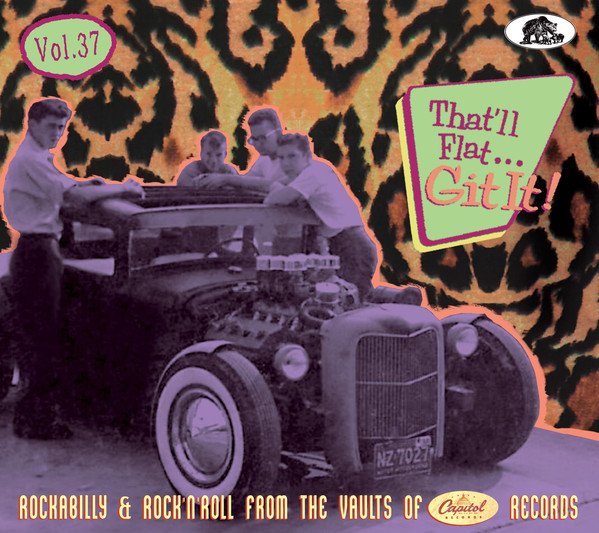 |
THAT’LL
FLAT GIT IT Vol. 37:
Hé, waar is Volume 36 gebleven? We hebben 'em niet gemist,
dus het zal wel iets met rechten te maken hebben. Het is immers niet
de eerste keer dat er sprongetjes worden gemaakt in de nummering van
deze Bear Family reeks omdat er nog rechten dienen gecleared: de voorlopige
releasedatum voor Volume 36 is nu 5 maart en die CD zal gewijd zijn
aan TNT Records. De CD die nu voor ons ligt is de tweede CD in de
multi label reeks gewijd aan Capitol Records (de eerste was Volume
3 in 1992!), sinds de jaren '40 het grootste en belangrijkste label
aan de Amerikaanse westkust en beschikkend over state of the art studios,
wat er samen voor zorgde dat wat hier niet alleen aan rock 'n' roll
maar aan alle muziekgenres werd opgenomen kwalitatief niets te kort
kwam: Capitol was geen klein primitief labeltje gevestigd in een achterkamertje
met een bezemhok als opnamestudio waar de plaatselijke boerenlullen
op een verloren maandag tussen de soep en de aardappelen door hun
ding mochten komen doen. De twee rockabilly troefkaarten van Capitol:
Gene Vincent en Wanda Jackson. Hey, what happened to Volume 36? We didn't miss out on it so it must have something to do with the rights. It's not the first time there have been jumps in the numbering of this Bear Family series because rights still had to be cleared. The tentative release date for Volume 36 is now March 5 and that CD will be dedicated to TNT Records. The CD we're holding now is the second CD in this multi label series dedicated to Capitol Records (the first was Volume 3 in 1992! ), since the 1940s the biggest and most important label on the American west coast with state of the art studios, which ensured the high quality of not only the rock 'n' roll but all music genres recorded at Capitol: Capitol was not a small primitive label located in a back office with a broom closet serving as the recording studio for local hicks doing their rusty thing on a blue monday in between delivering a calf and milking the cows. Capitol's two rockabilly trump cards: Gene Vincent and Wanda Jackson. The CD kicks off with Bessie Baby, a decent but forgotten rocker from 1958 but no When I Found You from Jerry Reed, indeed the very same Jerry Reed who would write Guitar Man for Elvis and star in the Smokey And The Bandit movies. Also on this CD: Reed's original of the Paladins covered You Make It They Take It. More consumer friendly rock 'n' roll is Darrell McCall's (What'll I Do) Call The Zoo featuring Hank Garland on guitar, Ronnie & Roy's Big Fat Sally, Gary Von Ilg's Early Next Mornin', Bobby Louis' Cell Of Love (his Adult Western is a rocker about the Lone Ranger), Kenny Loran channeling his best Tommy Sands in Top Man written but to my knowledge - correct me if I'm wrong - never recorded by The Louvin Brothers, and Tommy Sands himself with the powerhouse I Ain't Gittin' Rid Of You and the equally bluesy Is It Ever Gonna Happen. At Capitol many (sometimes future) famous names found shelter, for example the pure rockabilly of Skeets McDonald's You're There featuring Joe Maphis on guitar, Wanda Jackson's Baby Loves Him and her monster bopper Honey Bop also with Joe Maphis on guitar, Gene Vincent's Flea Brain and his still impressive Cat Man, Rose Maddox with a snappy Move It On Over, Jack Scott with his menacing Grizzly Bear and the stroll One Of These Days, The Jodimars' Bill Haley imitation Natural Natural Ditty and their jubilant Well Now Dig This, Bob Luman with a civilised Everybody's Talkin', Rudy "Tutti" Grayzell when his name was still Rudy Gray with the country stomper You Better Believe It, the future country star Del Reeves with the civilised Baby I Love You (his My Baby Loves To Rock 'n' Roll featuring Buck Owens on guitar is a fine piece of uptempo memphisbilly), the very different from Elvis sounding Jordanaires' strolling original of Sugaree three years before Rusty York, and Hank Thompson's honky tonk classic A Six Pack To Go featuring Merle Travis on guitar. Yes, every country singer tried his best to get his piece of the rock 'n' roll pie, even the above any suspicion Hank Thompson whose Lost John, country with a backbeat and boogie woogie piano, is very rockabilly inspired. And who would have thought that velvet voiced Sonny James ever recorded a rockabilly song, the quiet but impressive I Can't Stop Loving You (not the Ray Charles song), while future country guitarist Roy Clark performs a for 1962 surprisingly black rocking cover of Ruth Brown's As Long As I'm Movin'. And if you think there's nothing more to add, on top of that you get Johnny Fallin's dark exotic Wild Streak, Ray Stanley's almost parodic Let's Get Acquainted, hillbily bop with Billy Strange's Let Me In There Baby and mysterious big band bop with Bob Roubian's Here Comes The Train. After more than 35 volumes That'll Flat Git It is still an exemplary series and the musical level remains high, not to mention the quality of the releases themselves, a handsome digipack with an illustrated 34-page booklet with track-by-track annotation. Info: www.bear-family.com (Frantic Franky) |
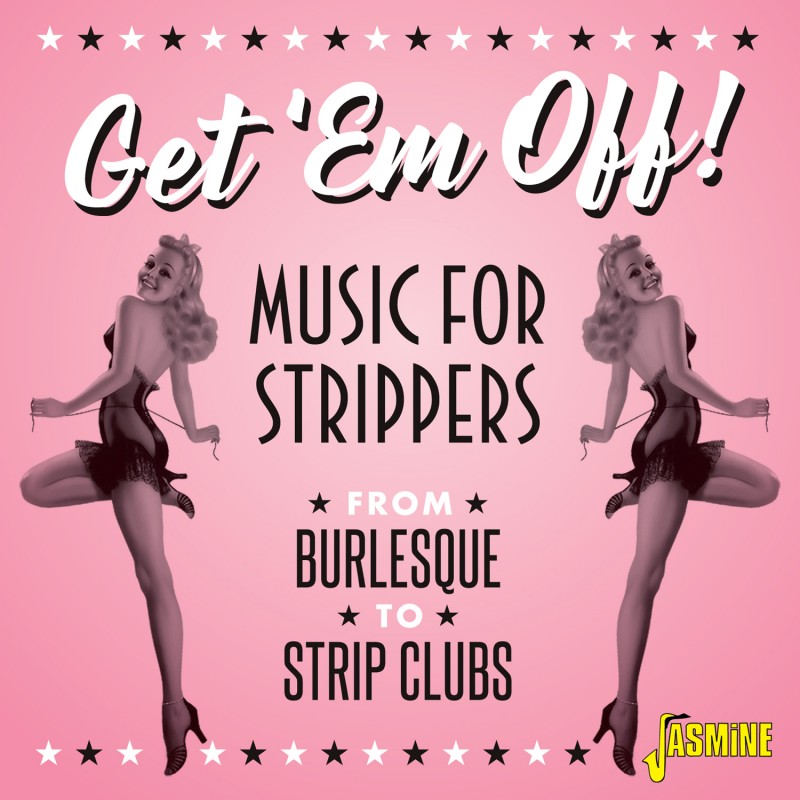 |
GET
'EM OFF
Striptease: the noble art of seductively undressing without leaving your undies on the floor like a pile of garbage, all of this set to music. There have been several striptease "soundtrack" CDs before but there can never be too many, because there can never be enough clothes taken off. Striptease should be done to sultry and groaning rhythm 'n' blues, big band and jazz saxophone blows, and you'll hear plenty of those on this CD. In a way it's a pity that the compilers feel the need in these PC Me Too times to - albeit tongue-in-cheek - defend themselves against possible accusations of misogeny. How did it come to this, he asked nodding his head. Get 'Em Off opens with The Stripper by David Rose from 1958 which became a hit in 1962, a title that may not mean anything to you but is indeed the most famous striptease instrumental of all time: hear those big band saxophones and that pounding on the timpani and you'll see the garments fly right past your nose, as there can't be a show ballet on TV without this song and if they need a striptease song in a movie 99 times out of a 100 it's this one. Of the same ilk are Noble "Thin Man" Watts' Easy Going Part 1, Sam "The Man" Taylor's Real Gone and Sonny Lester's Shivas Regal, For Strippers Only, Bumps And Grinds and Blues To Strip By (not blues but big band swing), as well as regular sax honkers like Big Jay MacNeely's Cherry Smash and his cartoon-like Let's Split, and Buddy Lucas's Big Bertha. By contrast, in Ernie Freeman's uptempo Night Train the lead instrument is the hammond organ. Only four of the 28 tracks on offer are vocal and they're all fairly well known: Joe Liggins' The Honeydripper, Cab Calloway's Minnie The Moocher, The Coasters' Three Cool Cats and Little Willie John's original version of Fever. None of these is necessarily a striptease number per se, but those who really want to strip can of course, do so to any song. Another well known tune on offer is Harlem Nocturne, here in a version by Johnny Otis that has nothing to do with his rock 'n' roll legacy. A real rock 'n' roll song is the excellent uptempo stroll Take It Off by The Genteels, more Vegas Grind is Noble "Thin Man" Watts' Hot Tamales. His Pig Ears And Rice, Buddy Lucas' Let's Go and Big Jay McNeely's Deacon's Groove have a slower, more bluesy approach, while a tune like Sonny Lester's Lament has more to do with detective swing noir or in the case of Bobby Summers' Pad with spy surf. Sonny Lester's A Pretty Girl Is Like A Melody can even be described as easy listening. The use of trumpets makes for a lot of lazy charleston like Sonny Lester's Lonely Little G-String, Walkin And Strippin' and For Strippers Only, the same For Strippers Only by Ernie Freeman, and the CD ends with Freeman's charleston version of The Stripper, the same number with which Get 'Em Off opened. If you noticed that the name Sonny Lester appears frequently in this review, you're right: he's on here with eight of the 12 songs from his How To Strip For Your Husband, Music To Make Marriage Merrier LP from +/- 1962, the first of his no less than seven striptease and belly dance LP’s. This CD offers an interesting different perspective, so for those who like instrumentals with horns, the message is: put some spice in your valentine's day! Info: www.jasmine-records.co.uk (Frantic Franky) |
3 februari 2021
![]()
CD Recensies
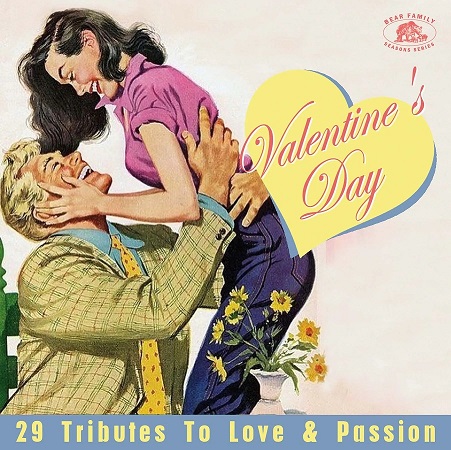 |
VALENTINE’S DAY Nauwelijks is de kerstversiering opgeborgen of daar doemt de volgende commerciële hoogdag reeds op: Valentijn. Aan ons is dat niet besteed omdat wij álle vrouwen élke dag gaarne zien, maar uiteraard zijn er zeer veel liedjes die de liefde bezingen - sinds Thomas Edison in 1877 de fonograaf uitvond (néé, het was niet Philips Eindhoven) zijn er over geen enkel ander onderwerp meer liedjes ingeblikt, en in de country schijnt dat zelfs één op de twee te zijn. Keuze genoeg voor een CD in Bear Family's genre-overlappende Season's Greetings Series, goed voor 29 tracks 1936-1964, en het mag geen verwondering wekken dat een flink deel daarvan teruggrijpt naar pop (George & Earl's Eleven Roses (And The Twelfth Is You), Sue Thompson' My Hero) en crooners. Opener Perfume, Candy And Flowers van Guy Mitchell is een uptempo variété popcrooner, Ed Townsend's For Your Love, Cathy Carr's First Anniversary, The Skyliners' This I Swear, Billy Walker's Forever en Jodie Sands' niet onbekende Love Me Forever zijn pop ballades. Ook het oudste nummer is uiteraard een crooner, There's Something In The Air van het orkest van Artie Shaw met zangeres Peg La Centra uit 1936, maar het valt mee dat er slechts één vooroorlogse kraker op de CD staat, al heeft Jimmy Wakely's I'm Sending You Red Roses uit 1944, country uit de oude hoedendoos, ook nog de oorlog meegemaakt. Gelukkig bevat de CD ook goeie uptempo blanke rock 'n' roll (She's The One For Me van The Aquatones), uptempo vocale surfrock (Tom Dorsam's Baby Of Mine), doo-wop (I'm So Happy (Tra-La-La-La-La), de debuutsingle van Lewis Lymon & the Teenchords), western swing (Pee Wee King's I Don't Mind) en good old country (Hank Williams' Baby We're Really In Love), maar evengoed doo-wop ballades (My Love Will Never Die van The Channels) en pop rock 'n roll (Jimmie Maddin's Tongue Tied). Een hoogtepunt voor mij is Liebestwist, een twangy uptempo gitaar versie van Liszt's Liebestraum Nr 3 uit 1850 (geen idee waarom het 16 pagina’s tellende booklet het toeschrijft aan Jacques Offenbach) door de Zweedse groep The Violents. Dezelfde klassieke melodie zou trouwens in 1963 voor Elvis bewerkt worden tot Today Tomorrow And Forever. Helaas bevat de CD ook easy listening met de filmmuziek van Frank Chacksfield's Love Is A Many Splendored Thing en het Mary Kaye Trio's My Funny Valentine dat ik liever hoor in de versie van Frank Sinatra. Ook jazztrompettist Chet Baker heeft dat opgenomen, maar hij staat op de CD met het gefezelde jazzy There Will Never Be Another You. Nee, dan liever een swingende meezingcrooner als And Her Tears Flowed Like Wine van Anita O'Day met het orkest van Stan Kenton. Grote klassiekers zijn Paul Anka's ultieme plakker You Are My Destiny, Etta James' majestueuze At Last, de wonderschone technicolor romantiek van The Paris Sisters' I Love How You Love Me (het muzikale equivalent van een mok warme melk met honing), en de dam-doobie-dam-dams van Come Softly To Me van The Fleetwoods. Een bekend nummer maar niet in deze versie is Arthur Prysock's bronstige cover van I Just Want To Make Love To You. U merkt het: deze CD mikt cupido-gewijs op de romantische zielen en de verzamelaars van teenrock. Info: www.bear-family.com (Frantic Franky)
We only just stored away the christmas decorations and here's already the next commercial holiday: valentine's day. We personally don't care much for valentine's day because we love àll women évery day, but we obviously dig songs about love, and the list is endless - ever since Thomas Edison invented the phonograph in 1877 there hasn't been another subject about which more songs have been recorded, and in country music the ratio evens seems to be every one in two songs. There's more than enough choice to put together a CD in Bear Family's genre-crossing Season's Greetings Series, hence this selection of 29 tracks 1936-1964, and it should not come as a surprise that a good portion of them delve into pop (George & Earl's Eleven Roses (And The Twelfth Is You), Sue Thompson' My Hero) and crooners. Opener Perfume, Candy And Flowers by Guy Mitchell is an uptempo variety pop crooner, Ed Townsend's For Your Love, Cathy Carr's First Anniversary, The Skyliners' This I Swear, Billy Walker's Forever and Jodie Sands' not unfamiliar Love Me Forever are pop ballads. The oldest song is obviously also a crooner, There's Something In The Air by Artie Shaw's orchestra with singer Peg La Centra from 1936, but fortunately there is only one pre-war tune on the CD, even though Jimmy Wakely's I'm Sending You Red Roses from 1944, country from out of the old hat box, saw action during the war years as well. Luckily the CD does feature quality uptempo white rock 'n' roll (She's The One For Me by The Aquatones), uptempo vocal surf rock (Tom Dorsam's Baby Of Mine), doo-wop (I'm So Happy (Tra-La-La-La-La), Lewis Lymon & the Teenchords' debut 45), western swing (Pee Wee King's I Don't Mind) and good old country (Hank Williams' Baby We're Really In Love), apart from doo-wop ballads (My Love Will Never Die by The Channels) and pop rock 'n roll (Jimmie Maddin's Tongue Tied). A highlight for me is Liebestwist, a twangy uptempo guitar version of Liszt's Liebestraum Nr 3 from 1850 (no idea why the 16 page booklet attributes it to Jacques Offenbach) by Swedish group The Violents. The same classic composition would in 1963 be adapted into Today Tomorrow And Forever for Elvis. Less interesting is the inclusion of easy listening with Frank Chacksfield's film music-styled Love Is A Many Splendored Thing and the Mary Kaye Trio's My Funny Valentine which I prefer to hear in Frank Sinatra's version. Jazz trumpeter Chet Baker also recorded it but he's on the CD with the whispered jazzy There Will Never Be Another You. Thanks but no thanks, I'll stick with a swinging sing-along crooner like And Her Tears Flowed Like Wine by Anita O'Day with Stan Kenton's orchestra. Classic hits included are Paul Anka's ultimate slow You Are My Destiny, Etta James' majestic At Last, the wonderful technicolor romance of The Paris Sisters' I Love How You Love Me (the musical equivalent of a mug of warm milk with honey), and the dam-doobie-dam-dams of The Fleetwoods' Come Softly To Me. A familiar song but not in this version is Arthur Prysock's horny cover of I Just Want To Make Love To You. Yes, you guessed it, this CD aims just like Cupid himself for the romantic souls and the collectors of teen rock. Info: www.bear-family.com (Frantic Franky) |
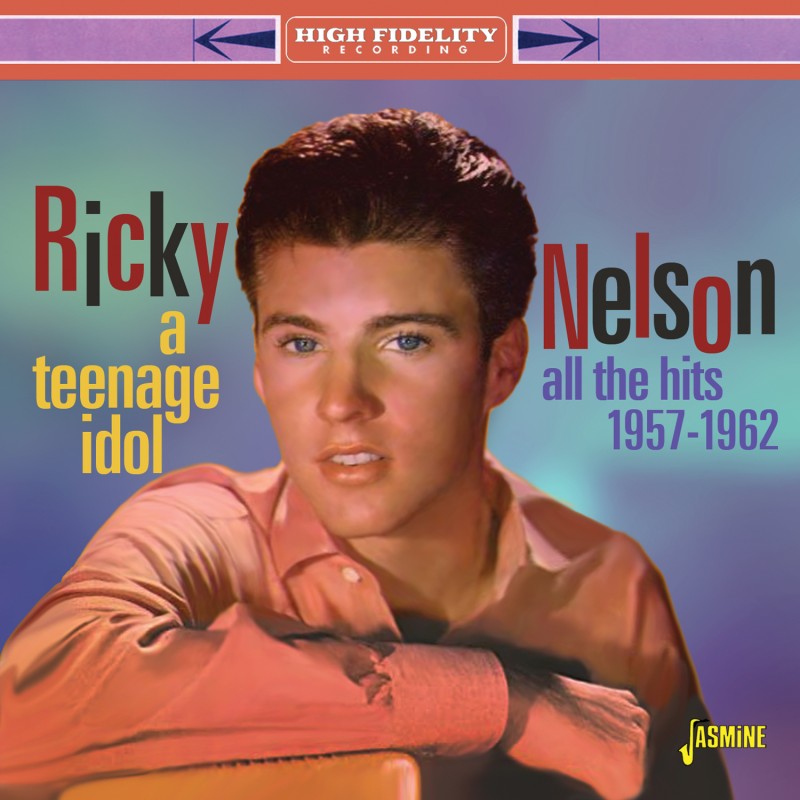 |
A
TEENAGE IDOL:
De muzikale nalatenschap van de op 31 december (gelukkig nieuwjaar)
1985 op 45-jarige leeftijd bij een vliegtuigongeval omgekomen Ricky
Nelson is al vaak en op diverse manieren herverpakt, en deze CD vertrekt
vanuit zijn hitnoteringen, te beginnen met zijn eerste single in 1957,
de start van een bijzonder succesrijke carrière waarvan gezegd
wordt dat Nelson in de tweede helft van de jaren '50 de populairste
artiest was na Elvis. Of dat zo is is misschien moeilijk te bewijzen,
maar feit is dat zijn eerste negen singles millionsellers waren en
Nelson tot 1962 33 keer de hitlijsten haalde. Die 33 nummers staan
op deze CD en omdat Jasmine ze echt elke keer vult tot het gaatje
staat er ook nog een 34ste nummer op, Someday, dat in Engeland de
Top 10 haalde maar in Amerika niet op single verscheen. Nelson torst
de negatieve reputatie dat ie pronkte met andermans veren en grossierde
in afgeroomde covers van andermans' hits als I'm Walkin' (Fats Domino),
My Bucket's Got A Hole In It (Hank Williams) en Have I Told You Lately
That I Love You (Elvis). Dat is waar, maar het betreft slechts een
minderheid van zijn output. Enkele van de songs hier kregen terecht
de status van rock 'n' roll classic (Be-Bop Baby, Believe What You
Say, It's Late) en zelfs rockabilly classic (Stood Up, Waitin' In
School), al is een flink deel van zijn output inderdaad de meer proper
achter de oren gewassen rock 'n' roll variant als I Got A Feeling,
Just A Little Too Much, Mighty Good en Right By My Side. Eigen aan
de hitbenadering van deze CD is evenwel dat hier nogal wat ballads
en medium tempo nummers op staan. In die dagen was het gebruikelijk
op single een snel nummer te koppelen aan een traag, en vaak waren
het die trage nummers die de hit werden. Voorbeelden hier zijn A Wonder
Like You, You Are The Only One, A Teenager's Romance, Poor Little
Fool, Young Emotions, I'm Not Afraid, Teenage Idol, het mooie Never
Be Anyone Else But You, het door doo-wop beïnvloede You're My
One And Only Love, het sinds Pulp Fiction cult Lonesome Town, het
vergelijkbare Sweeter Than You en het zwoele swing noir I Wanna Be
Loved. Wie maagzuur krijgt van ballades kan argumenteren dat Shirley
Lee en If You Can't Rock Me hier niet op staan en zal meer aan zijn
trekken komen met Ricky Nelson verzamelaars die op zijn rock 'n' roll
opnames focussen zoals Rockin' With Ricky (Ace CDCHD 85) en Ricky
Rocks (Bear Family BCD16856) of Jasmine's eigen dubbelaar Rockin'
& Boppin': Best Of The Early Years (ASCD529) die de nadruk legt
op zijn eerste drie LP’s uit 1957-1958 maar 15 nummers bevat
die ook op A Teenage Idol staan. Objectief beluisterd is deze nieuwe
A Teenage Idol echter even goed of zelfs beter dan die rock 'n' roll
CD’s door zijn royale 34 songs en door het feit dat hier een
aantal songs op staan die je niet zo courant tegenkomt zoals zijn
excellente rock 'n' roll versie van de charleston Yes Sir That's My
Baby of zijn exotische Summertime. En je kan zeggen wat je wil en
voor of tegen de Rickster zijn, maar Hello Mary Lou blijft een wereldschijf,
hij kon zingen, en al deze plaatjes, ook degene die meer richting
variété uitgaan, zijn bijzonder professioneel opgenomen
en ingespeeld. James Burton op gitaar: need I say more? Echt? Vooruit
dan: Milk Cow Blues. Tijd voor een Ricky Nelson revival! The
musical legacy of Ricky Nelson, who died in a plane crash on december
31 (happy new year) 1985 at the age of 45, has been repackaged many
times and in various ways, and this CD is based upon his hit records,
beginning with his first single in 1957, the start of a particularly
successful career that is said to have made Nelson the most popular
artist after Elvis in the second half of the 1950s. That may be difficult
to prove, but it's a fact that his first nine singles were millionsellers
and that he made the charts 33 times up to 1962. Those 33 songs are
on this CD and because Jasmine really fills them to the brim there
is even a 34th song, Someday, which made the Top 10 in England but
did not appear on a 45 in America. Nelson suffers from a negative
reputation for flaunting other people's feathers and churning out
flat covers of other people's hits like I'm Walkin' (Fats Domino),
My Bucket's Got A Hole In It (Hank Williams) and Have I Told You Lately
That I Love You (Elvis). This is true but only applies to a small
part of his output, and some of the songs here were rightfully given
the status of rock 'n' roll classic (Be-Bop Baby, Believe What You
Say, It's Late) and even rockabilly classic (Stood Up, Waitin' In
School), though it's fair to say that a large portion of his recordings
are indeed the more clean behind the ears rock 'n' roll style like
I Got A Feeling, Just A Little Too Much, Mighty Good and Right By
My Side. As a result of the hit approach of this CD there are quite
a few ballads and medium tempo songs, since in those days it was common
to pair a fast song with a slow one, and often it was the slow song
that became the hit. Examples here are A Wonder Like You, You Are
The Only One, A Teenager's Romance, Poor Little Fool, Who Someday,
Young Emotions, I'm Not Afraid, Teenage Idol, the beautiful Never
Be Anyone Else But You, the doo-wop influenced You're My One And Only
Love, the since Pulp Fiction cult Lonesome Town, the similar sounding
Sweeter Than You and the sultry swing noir I Wanna Be Loved. Those
of you who get reflux from ballads can argue that Shirley Lee and
If You Can't Rock Me aren't on here and will be better served by Ricky
Nelson compilations that focus exclusively on his rock 'n' roll songs
like Rockin' With Ricky (Ace CDCHD 85) and Ricky Rocks (Bear Family
BCD16856) or Jasmine's own double CD Rockin' & Boppin': Best Of
The Early Years ASCD529 which is based on his first three LP’s
from 1957-1958 but contains 15 songs that are also on A Teenage Idol.
However, objectively speaking this new A Teenage Idol is just as good
or even better than those rock 'n' roll CDs because of its generous
34 songs and the fact that there are a number of songs on here that
you don't come across very often, like his excellent rock 'n' roll
version of the charleston Yes Sir That's My Baby or his exotic Summertime.
And you can say what you want and be for or against the Rickster,
but Hello Mary Lou remains a world class record, the guy could sing,
and all these records, even the ones that go more in the direction
of pop music, were recorded and performed very professionally. James
Burton on guitar: need I say more? Do I really? Okay: Milk Cow Blues.
Time for a Ricky Nelson revival! |
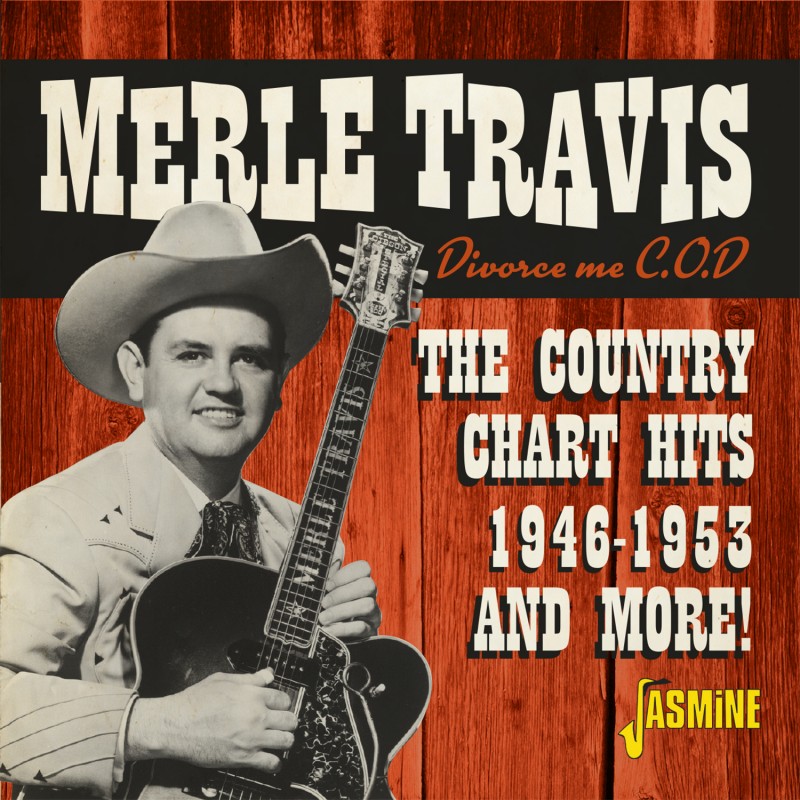 |
DIVORCE
ME C.O.D.: THE COUNTRY CHART HITS 1946-1953 AND MORE/ MERLE TRAVIS Countryartiest Merle Travis bracht zijn eerste plaat uit in 1945 en deze CD bevat al zijn Billboard country charthits uit de jaren '40 (Cincinnati Lou, No Vacancy, Divorce Me C.O.D., Missouri, So Round So Firm So Fully Packed) die toen nog de Hillbilly Hit Parade heette, zijn beste nummers uit de periode 1946-1952 die de hitlijsten niét haalden, de acht uptempo folksongs van zijn invloedrijke en baanbrekende Songs From The Hills album origineel verschenen in 1947 als vier 78 toeren platen, zijn door hem geschreven originele versie van Sixteen Tons, Dark As A Dungeon en Muskrat die u kent van respectievelijk Tennessee Ernie Ford, Johnny Cash en The Everly Brothers, aangevuld met zoveel mogelijk klassieke Capitol kantjes als er nog plaats was tot je een CD van 28 tracks krijgt. Veel van die songs zou je Crazy Boogie kunnen noemen zoals een van de songtitels hier luidt, gezellige gezapige uptempo country met accordeon en charleston trompet, soms met honkytonk piano, maar ook met gitaarpicking, want dat was een van de fortes van Merle Travis wiens op ragtime gebaseerde "travis style picking" nog steeds een referentie is voor countryboogie gitaristen, luister maar naar het bekende supersnelle Merle's Boogie Woogie, een nog steeds indrukwekkend voorbeeld van multispeed en multitracking uit 1947. U kent Chet Atkins? Nou, Merle Travis was eerst! De sterkte van deze CD is Travis' relaxte zangstem die het allemaal moeiteloos doet lijken, het uptempo oorvriendelijke en vrolijke materiaal, een overload aan Travis picking, en een fantastische geluidskwaliteit voor zo'n oude opnames. Merle Travis overleed in 1983 op 65-jarige leeftijd aan een hartaanval. Info: www.jasmine-records.co.uk. (Frantic Franky) Country artist Merle Travis released his first record in 1945 and this CD contains all his Billboard country chart hits from the 1940s (Cincinnati Lou, No Vacancy, Divorce Me C.O.D., Missouri, So Round So Firm So Fully Packed) which in those days was still called the Hillbilly Hit Parade, his best songs from 1946-1952 that didn't make the charts, the eight uptempo folk songs from his influential and groundbreaking Songs From The Hills album originally released in 1947 as four 78 RPM records, the original versions that he wrote and recorded of Sixteen Tons, Dark As A Dungeon and Muskrat which you know from Tennessee Ernie Ford, Johnny Cash and The Everly Brothers, plus as many classic Capitol sides as there was room for until you get a 28 track CD. Many of these songs could be called Crazy Boogie after the title of one of the tunes here, cozy relaxed uptempo country with accordion and charleston trumpet, sometimes with honky tonk piano, but also with guitar picking, as that was one of the fortes of Merle Travis whose ragtime based "Travis style picking" is still a reference for country boogie guitarists, just listen to the famous super fast Merle's Boogie Woogie, a still impressive example of multispeed and multitracking from 1947. You know Chet Atkins? Well, Merle Travis was first! The strength of this CD is Travis' laid-back singing style that makes it all seem effortless, the uptempo ear-friendly and upbeat material, an overload of Travis picking, and fantastic sound quality for such old recordings. Merle Travis died of a heart attack in 1983 at the age of 65. Info: www.jasmine-records.co.uk. (Frantic Franky) |
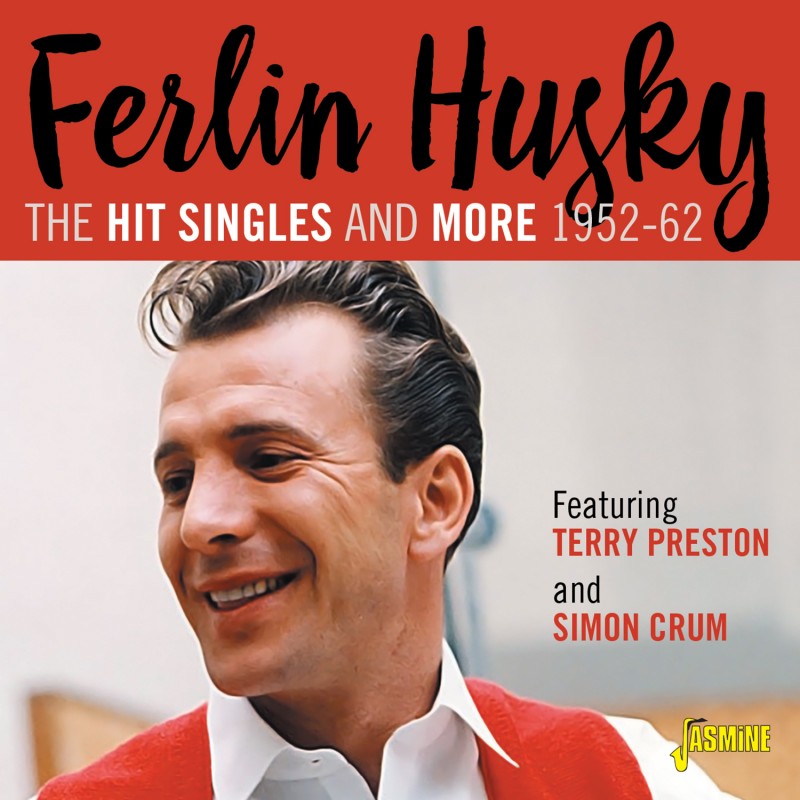 |
THE
HIT SINGLES AND MORE 1952-62/ FERLIN HUSKY
De in 2011 op 85-jarige leeftijd overleden Ferlin Husky was een countryzanger
die zoals alle countryzangers van zijn generatie ook hillbilly opnam
en zich net als al zijn collega’s heel sporadisch richting rock
'n' roll begaf om zijn graantje mee te pikken van de rage. Tussen
1953 en 1975 scoorde hij met zijn in totaal 50 hitnoteringen twee
dozijn Top 20 countryhits en het is dan ook logisch dat deze CD vooral
zijn countrycarrière belicht die begon onder het pseudoniem
Terry Preston, naam waaronder hij vanaf 1949 een dozijn singles uitbracht
op 4-Star Records en die hij in eerste instantie bleef gebruiken toen
Capitol hem in 1951 tekende. Op deze CD staat één Terry
Preston nummer, Time, dat verscheen in januari 1952 en trage old time
country is. Zijn echte naam zal hij gebruiken vanaf maart 1953, de
dagen waarin de pas overleden Hank Williams een superster was, en
een volledig uit Hank Williams songtitels bestaande tribute als Hank's
Song uit begin 1953 past helemaal in dat kraam, ook al begint het
met een Jimmie Rodgers jodel op de gitaar. Over old time country gesproken:
nog zo eentje met twee gesproken tussenstukken (het is geen echte
country als er geen parlando in voorkomt) is het A Dear John Letter
duet met Jean Shepard uit 1953 dat zich afspeelt tegen de achtergrond
van de oorlog, naar ik aanneem de Koreaanse oorlog vanwege de zinsnede
"overseas in battle, the fighting was all over and the battle
had been won". In die brief laat Shepard Husky weten dat ze met
hem breekt omdat ze gaat trouwen met zijn broer! Kan het nog méér
country? Ja, dat kan: A Dear John Letter was blijkbaar zulk een grote
hit dat er een vervolg getiteld Forgive Me John kwam waarin Shepard
breekt met zijn broer en hem smeekt terug te komen, wat Husky prompt
weigert omdat hij zijn broer niet kan aandoen wat zijn broer hém
aandeed... waarna hij bijtekent! Zo uit het leven gegrepen worden
ze sinds Tante Leen & Johnny Jordaan niet meer gemaakt - dat is
namelijk verboden door het vakverbond. Deze CD bevat er zo nog enkele,
zoals Little Tom over arme kindjes uit gebroken gezinnen ("brought
up in a home of sin"), en vooral The Drunken Driver, een gesproken
tragisch moraalverhaal met veel bloederige details. Van die Hank Williams
country naar boppin' hillbilly en vandaar in één sprintje
richting proto-rockabilly was voor Husky slechts een kleine stap maar
een grote sprong voor de mensheid (I Wouldn't Treat A Dog Like You're
Treatin' Me), passerend via vlot gestroomlijnde uptempo hillbilly
boogie zoals het door Johnny Cash gecoverde I Feel Better All Over.
Ferlin Husky who died in 2011 at the age of 85 was a country singer who, like all the country singers of his generation, also recorded hillbilly and who, like all of his colleagues, occasionally turned to rock 'n' roll in order to get his piece of the rock 'n' roll pie. Between 1953 and 1975 his 50 hitparade entries scored him two dozen Top 20 country hits and therefor it makes sense that this CD mainly highlights his country career that began under the pseudonym Terry Preston, the name under which he released a dozen singles starting in 1949 on 4-Star Records and which he initially continued to use when Capitol signed him in 1951. This CD contains one Terry Preston song, Time, which was released in January 1952 and is slow old time country. He started using his real name from March 1953, the days when the recently deceased Hank Williams was a superstar, and a tribute like Hank's Song from early 1953 consisting entirely of Hank Williams song titles tapped right into the feeling that swept the nation, even though it starts with a Jimmie Rodgers yodel on the guitar. Speaking of old time country: another one of those tunes with two spoken interludes (it's not real country if it doesn't include a parlando) is 1953's A Dear John Letter duet with Jean Shepard set against the backdrop of war, I assume the Korean War because of the phrase "overseas in battle, the fighting was all over and the battle had been won." In the letter Shepard lets Husky know that she is breaking up with him because she is going to marry his brother! Can it get any more country? Yes, it can: A Dear John Letter was apparently such a big hit that there was a sequel entitled Forgive Me John in which Shepard breaks up with his brother and begs Husky to come back, which he promptly refuses because he can't do to his brother what his brother did to him... after which he re-enlists! They just don't make tearjerkers like this anymore - it's forbidden by the union. This CD includes a couple more, such as Little Tom about poor children from broken families ("brought up in a home of sin"), and especially The Drunken Driver, a spoken tragic morality tale with many gory details. From Hank Williams country to boppin' hillbilly and then straight forward into proto-rockabilly was only a small step for Husky but a giant leap for mankind (I Wouldn't Treat A Dog Like You're Treatin' Me), along the way taking in smooth streamlined uptempo hillbilly boogie like the Johnny Cash covered I Feel Better All Over. This kind of music, in itself verging on the comic, lent itself easily to persiflage, and Husky simultaneously had a second career as a country comedian under the pseudonym Simon Crum, a kind of local yokel hillbilly village idiot who released songs like Cuzz Yore So Sweet and the Deck Of Cards parody A Hillbilly's Deck Of Cards. This kind of jokes usually don't stand the merciless test of time, but the Simon Crum recordings still hold up more than sixty years later, a testimony to both the musical quality and the high level of the humor. Simon Crum's highlights here: his genius Poetry In Motion parody Enormity In Motion, and Bop Cat Bop, a rock 'n' roll parody so good it became a perfect bopper. Just as good as Bop Cat Bop but serious and under the name Ferlin Husky is the bopper Wang Dang Doo, and in a completely different style the fresh melodic country rocker I Will. Two more such tracks are My Reason For Livin' and the countrybilly Draggin' The River, though these are countered by plenty of mainstream country heralding the beginning of the Nasville sound like It Was You, This Moment Of Love, Prize Possession, A Fallen Star, Sinful Secret and Willow Tree, waltzes like Somebody Save Me and the gospel Wings Of A Dove, the solemn ballad Gone, and even medium tempo pop rock 'n' roll like What'cha Doin' After School. A number of what I consider to be essential songs are missing here though such as Eli The Camel (a kind of Kawliga but about a camel), the pure rockabilly number Slow Down Brother, the boppin' hillbilly I'll Be Here For A Lifetime, and the Simon Crum rocker Stand Up Sit Down Shut Your Mouth. Nevertheless, the CD gives a broad picture of all the country and rock 'n' roll styles Husky, the first country singer to receive a star on the Hollywood Walk Of Fame, stood for, and with this CD you're in perfect pole position to start exploring the rest of his legacy. Info: www.jasmine-records.co.uk. (Frantic Franky) |
20 januari 2021
![]()
LP Recensie
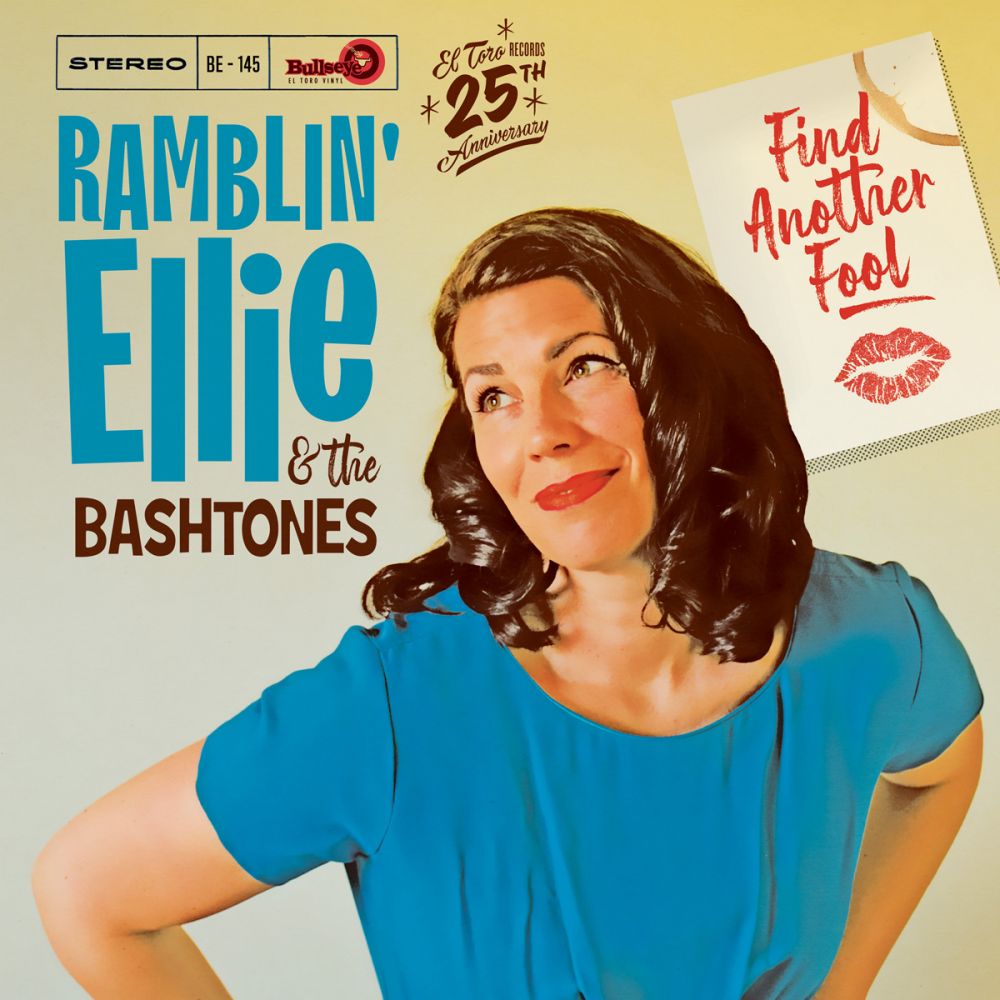 |
FIND
ANOTHER FOOL/ Ramblin'
Ellie & the Bashtones zijn een minder bekende Zweedse band onder
leiding van zangeres Simone Simonsson die mogelijk minder bekend is
omdat dit bij mijn weten hun eerste release is, een titelloze 5-track
demo-CD uit 2014 niet te na gesproken. Zo lang zijn ze immers al bezig:
de band ontstond begin 2013 en ze hebben één keer bij
ons in de buurt gespeeld, in 2014 op het Hook Rock festival in het
Belgische Diepenbeek. Die demo was meer rockabilly getint dan deze
LP die zich muzikaal situeert in het grensgebied tussen cleane rock
'n' roll en teenrock. Er staan enkel covers op de LP, twaalf in totaal,
met Bigelow 6200 van Brenda Lee als bekendste, maar de heldere, mooie
en ook mooi klinkende stem van de relaxt zingende Ramblin' Ellie die
meer aan Connie Francis dan aan Brenda Lee doet denken zoekt ook inspiratie
bij de rustige rockabilly van Ricky Nelson (One Of These Mornings).
Met de productie van de originele uitvoeringen van die twee songs
in de grote studio’s van de grote platenlabels kunnen Ramblin'
Ellie & the Bashtones zich niet meten, maar dat betekent niet
dat het muzikaal niet goed in elkaar zou steken of dat ze geen aardige
rock 'n 'roll sound weten neer te zetten, met bovendien een piano
en een lichte contrabas die het geheel ook een lichte rockabillytoets
geeft. Wat het album daarnaast ook optilt boven het gemiddelde is
het geslaagde gebruik van achtergrondkoortjes, waarvoor ze niet de
minsten hebben ingehuurd, namelijk The Velvet Candles uit Spanje.
Veel bom-bom-boms en wap-shoo-waps dus, en dat is in deze op zich
rustige muziek zeker een meerwaarde, luister naar hun versies van
Barry Mann's Find Another Fool en Dickey Lee's Dreamy Nights dat in
1958 Sun 297 was - wie herinnert zich dat er bij Sun Records ook doo-wop
werd opgenomen? Find Another Fool bevat nog een tweede Sun cover,
namelijk Sun 345, de melodieuze semi-ballade Is It Me van Tracy Pendarvis.
Die teen rock 'n' roll wordt vervoegd door een paar songs die elementen
uit country bevatten zoals het opnieuw erg melodieuze Night Without
End van Bob Luman, terwijl Skeeter Davis' oorspronkelijk erg Nancy
Sinatra klinkend If I Had Wheels uit 1966 door Ramblin' Ellie als
rockabilly wordt gespeeld. Idem ditto voor Connie Smith's I'll Come
Running uit 1967. Enkel covers dus, maar dat is niet erg omdat het
vooral tamelijk onbekende songs zijn, of kan u uit volle borsten Bobby
Helms' Hurry Baby, doo-wop groep The Senators' It Doesn't Matter of
Don Estes' Felice & Boudleaux Bryant compositie Moonsick meezingen?
Ramblin' Ellie wel en ze doet dat goed, al laat ze soms in de hoge
regionen een steekje vallen zoals in Terry Noland's Worrying Kind-achtige
Long Gone Baby, tenzij het daar meer zou opvallen wegens de spaarzamere
begeleiding.
Ramblin' Ellie & the Bashtones are a lesser known Swedish band
led by singer Simone Simonsson, perhaps lesser known because to my
knowledge this is their first release besides a self-titled 5 track
demo CD from 2014. Yes, that's how long they've been around: the band
formed in early 2013. That demo was more rockabilly tinged than this
LP which musically is situated in the border regions between clean
rock 'n' roll and teen rock. The album contains only covers, twelve
in total, with Brenda Lee's Bigelow 6200 ranking as the best known,
but the clear, beautiful and nice sounding voice of the relaxed singing
Ramblin' Ellie who reminds me more of Connie Francis than of Brenda
Lee also seeks inspiration from the calm rockabilly of Ricky Nelson
(One Of These Mornings). Ramblin' Ellie & the Bashtones can't
compete with the production of the original versions of those two
songs in the big studios of the big record labels, but that doesn't
mean that their covers aren't well put together or don't have a decent
rock 'n' roll sound, augmented by a piano and a light double bass
that gives the whole thing a light rockabilly touch. What also lifts
the album above the average is the successful use of backing vocals,
for which they hired not the least, The Velvet Candles from Spain.
A lot of bom bom boms and wap shoo waps certainly add value to this
in itself quiet music, just listen to their versions of Barry Mann's
Find Another Fool and Dickey Lee's Dreamy Nights that was Sun 297
in 1958 - who remembers Sun Records also recorded doo-wop? Find Another
Fool also contains a second Sun cover, Sun 345, Tracy Pendarvis' melodic
semi-ballad Is It Me. Apart from this teen rock 'n' roll a couple
of songs contain elements of country music like Bob Luman's again
melodic Night Without End, while the band tackles Skeeter Davis' originally
very Nancy Sinatra sounding 1966 If I Had Wheels as rockabilly. The
same goes for Connie Smith's 1967 I'll Come Running. Only covers,
but that's not too bad a thing because most of them are fairly unknown,or
can YOU sing along to Bobby Helms' Hurry Baby, doo-wop group The Senators'
It Doesn't Matter or Don Estes' Felice & Boudleaux Bryant composition
Moonsick? Ramblin' Ellie can and she does it well, even though she
sometimes slips in the high notes, for example in Terry Noland's Worrying
Kind-like Long Gone Baby, unless this would be more noticeable here
because of the sparser accompaniment. |
![]()
CD Recensies
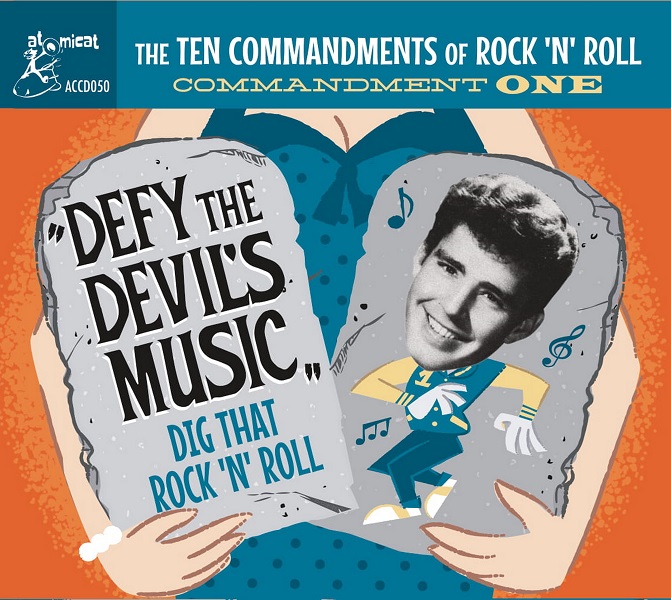 |
DEFY
THE DEVIL'S MUSIC: THE TEN COMMANDMENTS OF ROCK 'N' ROLL COMMANDMENT
ONE
De Rhythm Bomb labels Atomicat en Koko-Mojo besteedden in het recente
verleden al veel aandacht aan zowel zwarte rock 'n' roll met onder
meer de Boss Black Rockers, Southern Bred en Rockin' Soul Party reeksen,
als aan rockabilly en hillbilly met onder meer de Hillbilly Boogie
And Jive en Hillbilly And Rustic Rockabilly Bop reeksen. De essentie
wordt evenwel niet uit het oog verloren, namelijk ons aller rock 'n'
roll, middels een nieuwe reeks met een knipoog opgehangen aan de tien
geboden. De zeven hoofdzonden waren misschien toepasselijker geweest,
hahaha! Drie zijn er reeds uit maar wij zijn zo neurotisch dat we
graag chronologisch te werk gaan en stoppen met reeksen te kopen als
we er eentje missen, dus beginnen wij hier met nummer 1, er van uitgaand
dat de eerste in een reeks ook vaak de beste is. De CD bevat 30 tracks
1955-1962 met als gemeenschappelijke factor dat ze niet alleen rock
‘n’ roll zijn maar allemaal ook die rock 'n' roll bezingen
tot meerdere eer en glorie van de afgod genaamd rock 'n' roll: 17
van de 30 tracks hebben het woordje "rock" of een variatie
daarop in de titel. Alle rock 'n' roll stijlen komen aan bod, met
zwart en blank klinkende uptempo doo-wop of nummers die daar elementen
van incorporeren in jive (Norman Fox & the Rob Roys' Dance Girl
Dance, The Bay Bops' To The Party, The Adventurers' lekker klinkende
Rock 'n' Roll Uprising, The Clouds' Rock 'n' Roll Boogie), maar evengoed
met rockabilly (Little Jimmy Dempsey's Bop Hop, Gene Ray's Rock 'n'
Roll Fever, The Javalans' Come Dance With Me) en female rockabilly
als Sparkle Moore's niet echt briljante Rock-A-Bop. Lorelei Lynn &
the Sparkles doen het in het gelijkaardig getitelde Rock 'A' Bop beter,
maar die song situeert zich meer in de rock 'n' roll. Er is Sun rock
'n' roll met Bill Pinkney's After The Hop, Joe Boot & the Fabulous
Winds' Rock 'n' Roll Radio heeft een licht skaritme, en er is zwarte
rock 'n 'roll (Joe Gregory's Gonna Rock This Mornin') en zwarte uptempo
strolls (Willie Egan's Rock 'n' Roll Fever, Earl Wade's I Dig Rock
'n' Roll). Een supersnelle Hippy Hippy Shake door The Maori Hi Five
uit Nieuw-Zeeland klinkt meer white rock dan hun naam doet vermoeden
- als je hun foto googlet zien ze er uit als een variété
orkest! Ook Juke Box Rock van Dick Seaton & the Mad Lads en Bop
Bop Bop van Paul Anthony neigen naar de white rock, en aan de andere
kant van de rock 'n 'roll regenboog heerst big band rock 'n' roll
swing met The Blockbusters' I Wanna Rock Now en big band fanfare met
Jésus Ramirez wiens Rock 'n' Roll vreemd genoeg in het Frans
is en klinkt alsof het een van de eerste plaatjes moet geweest zijn
waarin een Frans orkest probeerde de rock 'n' roll na te spelen. Ook
wie graag de beentjes uitslaat komt op deze compilatie aan zijn/haar
trekken met jive als Willie Headen's Turn The Hi Fi Down en light
rockers als Terry Wayne's Slim Jim Tie, niet bepaald het best gespeelde
nummer dat ik ooit hoorde, maar daar staan parels als Bill Darnel's
Rock 'n' Roll Baby tegenover. Het meeste materiaal hier is minder
bekend maar zeker goed, en daarom is't een beetje jammer dat er ook
een paar overbekende klassiekers op staan die u ongetwijfeld al hebt
zoals Chuck Berry's Rock 'n' Roll Music en in iets mindere mate Ruth
Brown's This Little Girl's Gone Rockin’ en Neil Sedaka's You
Gotta Learn Your Rhythm 'n' Blues. Een bekend nummer maar niet noodzakelijk
in deze uitvoering is Edna McGriff's Dance With Me Henry (volgens
de tracklisting Nancy Holloway's Rock The Bop maar dat is niet correct),
nog bekende namen maar niet noodzakelijk met deze nummers zijn Buddy
Knox' vrij standaard gitaarboogie Rockabilly Walk (ik hoor liever
een improvisatie als The Beat van The Rockin' R's) en Carl Mann's
originele opname van Gonna Rock 'n' Roll Tonight, misschien het rockendste
wat ie ooit deed. De afsluiter slaat als een tang op een varken: Jeder
Tag Geht Zu Ende van Earl Grant is een in het Duits gezongen schlagerballade,
de vertaling van zijn eigen (At) The End (Of The Rainbow). Om uit
te rusten op het einde van de party?
Rhythm
Bomb labels Atomicat and Koko-Mojo have devoted considerable attention
to both black rock 'n' roll with the Boss Black Rockers, Southern
Bred and Rockin' Soul Party series and more, and to rockabilly and
hillbilly with the Hillbilly Boogie And Jive and Hillbilly And Rustic
Rockabilly Bop series and more. At the same time they do not lose
sight of the main thing, our dear rock 'n' roll, et voilà,
a new series is introduced, loosely based on the ten commandments.
The seven deadly sins might have been more appropriate, hahaha! The
first three volumes are already out but we are so neurotic that we
like to work chronologically and stop buying series if we miss one
volume, so let's start here with number 1, assuming that the first
release in a series is often the best. The CD contains 30 tracks 1955-1962
which not only have in common that they're rock 'n' roll, but they're
also about rock 'n' roll, praising the glory of the demon called rock
'n' roll: 17 out of the 30 tracks have the word "rock" or
a variation thereof in the title. All rock 'n' roll bases are covered,
with black and white sounding uptempo doo-wop and songs that incorporate
elements of doo-wop into jive (Norman Fox & the Rob Roys' Dance
Girl Dance, The Bay Bops' To The Party, The Adventurers' tasty sounding
Rock 'n' Roll Uprising, The Clouds' Rock 'n' Roll Boogie) but also
showcasing rockabilly (Little Jimmy Dempsey's Bop Hop, Gene Ray's
Rock 'n' Roll Fever, The Javalans' Come Dance With Me) and female
rockabilly like Sparkle Moore's not exactly brilliant Rock-A-Bop.
Lorelei Lynn & the Sparkles' similarly titled Rock 'A' Bop fares
better but leans more towards rock 'n' roll. There's Sun rock 'n'
roll with Bill Pinkney's After The Hop, Joe Boot & the Fabulous
Winds' Rock 'n' Roll Radio has a light ska rhythm, and there's black
rock 'n' roll (Joe Gregory's Gonna Rock This Mornin') and black uptempo
strolls (Willie Egan's Rock 'n' Roll Fever, Earl Wade's I Dig Rock
'n' Roll). A super fast Hippy Hippy Shake by The Maori Hi Five from
New Zealand sounds more white rock than their name suggests - if you
google their picture they look like a variety orchestra! Juke Box
Rock by Dick Seaton & the Mad Lads and Bop Bop Bop by Paul Anthony
also tend towards white rock and at the other end of the rock 'n'
roll rainbow there's big band rock 'n' roll swing with The Blockbusters'
I Wanna Rock Now and a marching band led by Jésus Ramirez whose
Rock 'n' Roll is strangely enough in French and sounds like it must
have been one of the first 45s on which a French orchestra tried to
play rock 'n' roll. Those who like to stretch their legs will be in
for a treat with jive like Willie Headen's Turn The Hi Fi Down and
light rockers like Terry Wayne's Slim Jim Tie, not exactly the best-played
song I ever heard, but that's compensated for by gems like Bill Darnel's
Rock 'n' Roll Baby. Most of the material here is not well known but
quite good, which is why it's a bit of a shame there's a couple of
familiar classics that you no doubt already have like Chuck Berry's
Rock 'n' Roll Music and to a lesser extent Ruth Brown's This Little
Girl's Gone Rockin' and Neil Sedaka's You Gotta Learn Your Rhythm
'n' Blues. A familiar song but not necessarily in this rendition is
Edna McGriff's Dance With Me Henry (the tracklisting incorrectly states
Nancy Holloway's Rock The Bop), familiar artists but not necessarily
with these songs are Buddy Knox' rather standard guitar boogie Rockabilly
Walk (I prefer an improvisation like The Beat from The Rockin' R's)
and Carl Mann's original recording of Gonna Rock 'n' Roll Tonight,
perhaps the rockinest thing he ever did. The closing track sounds
out of place: Earl Grant's Jeder Tag Geht Zu Ende is a schlager ballad
sung in German, the translation of his own (At) The End (Of The Rainbow).
To cool down when the party's over? |
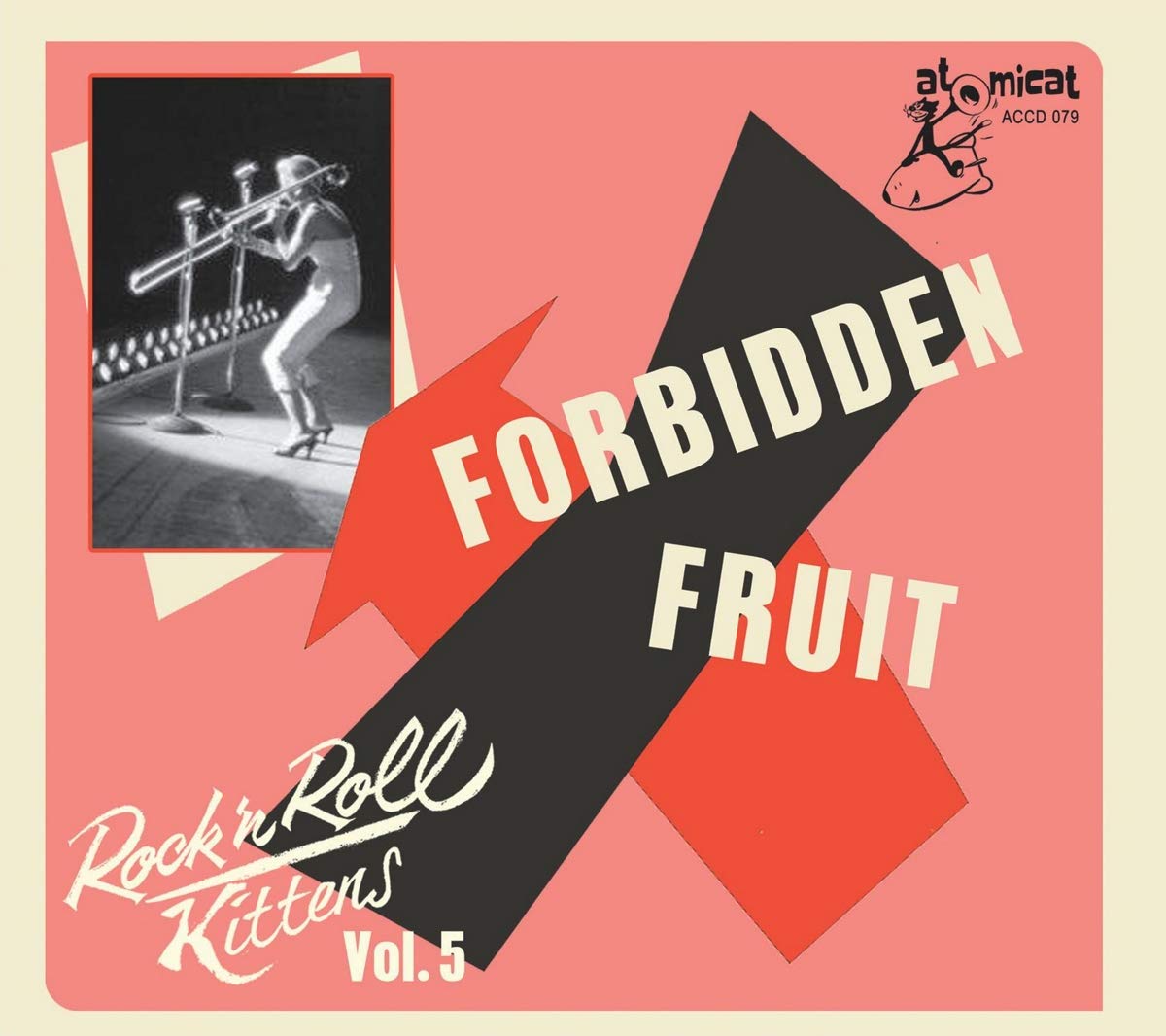 |
FORBIDDEN
FRUIT: ROCK 'N ROLL KITTENS VOL. 5
De vijfde en de laatste Rock 'n' Roll Kittens (maar dat zeiden ze
ook van Volume 4, hahaha) opent met de vlam in de pijp met Barbara
Greene, een schreeuwende zangeres die echter overduidelijk kan zingen,
met een stel gezellige doo-wop kikkers als koortje: Little Richard's
Long Tall Sally is al tot in den treure gecoverd maar dit blijft een
van de allerbeste versies. 't Is meteen het bekendste nummer, in tegenstelling
tot de vorige volumes waarop steevast een Wanda Jackson, Brenda Lee
of Patsy Cline te noteren viel. De CD bevat 25 tracks 1954-1963 maar
slechts twee nummers uit de jaren '60, namelijk beide kantjes van
die single van Barbara Greene uit 1963 (B-kant Slippin’ And
Slidin’ is al heel wat kalmer) die echter puur fifties klinkt.
De CD bevat voorts slechts één nummer uit 1959 en één
uit 1954, al de rest is 1955-1958. Barbara Greene's Long Tall Sally
is ook zo ongeveer het wildste nummer want de rest van de dames klinken
veel beschaafder, al is duidelijk dat een aantal onder hen op de eerste
rij stonden toen de stembanden werden uitgedeeld. Op veel nummers
worden ze geruggesteund door grote orkesten die het tempo er flink
in houden. Veel tracks vallen dan ook eerder onder de bigband rock
'n' roll en de verboden vruchten in de titel beloven meer dan de CD
kan waarmaken: hier is niks verbodens aan. Die uptempo crooners zaten
ook al voor een stuk in de eerdere volumes, maar daar werden ze meer
dan hier gebalanceerd door rock 'n' roll, rockabilly en rhythm 'n'
blues jive. Het grote voordeel is echter dat dit allemaal plaatjes
zijn gemaakt door orkesten die echt wel konden spelen en alles dus
erg professioneel klinkt. Enkele voorbeelden: Bonnie Davis's bigband
versie van Pepper-Hot Baby dat de meesten onder u zullen kennen als
rockabilly door Phil Gray, en Bunny Paul's big band uitvoering van
Bill Haley's Whatcha Gonna Do. Ook altijd interessant zijn onbekende
covers zoals Mama (He Treats Your Daughter Mean) door Bette Anne Steele,
Feel So Good door Joyce Romero & Bill Marine, en Will You Willyum
door Joan Hager, om maar enkele van de nummers te noemen waarvan je
hier kan genieten. En als we dit nu allemaal kopen komt er misschien
nog een zesde deeltje!
|
13 januari 2021
![]()
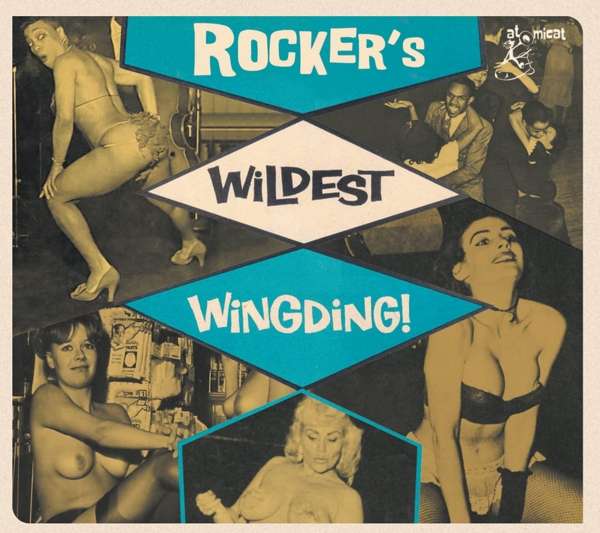 |
ROCKER'S
WILDEST WINGDING
U zit pas in de rockabilly (pas op, u geraakt er nooit meer uit) en
weet niet welke CD te kiezen uit die ellenlange bak bij de gespecialiseerde
platenboer? Neem deze CD en laat 'm niet meer los, want dit bevat
allemaal krakers die al decennia lang hun groot gelijk hebben bewezen,
in sommige gevallen al sinds de revivaldagen van de jaren '70. Dit
is allemaal 200% onverbloemde rockabilly en rock 'n' roll: Dale Hawkins'
Little Pig en Broken Heart van The Moonlighters (hun Rock-A-Bayou
Baby staat hier ook op) waarvoor in de jaren '80 de bands in de rij
stonden om het te coveren, GL Crockett's pikzwarte rockabilly Look
Out Mabel, primitivo boppers als I'm Out van The Surf Riders, echo
fests als Boppin' To Grandfather's Clock van Sidney Jo Lewis alias
Hardrock Gunter, en rechtdoor rock 'n' roll als Baby Why Did You Have
To Go van Bob & the Rockbillies. Verdomd, Big Sandy van Bobby
Roberts klinkt nog steeds even opwindend als toen wij het voor eerst
hoorden (ik weet het nog goed: het was op een mooie dag in 1986 op
de verzamel LP Sin Alley en de wereld was nooit meer hetzelfde) en
dat zegt toch wel iets over de eeuwigheidswaarde van deze nummers.
Probeer u voor te stellen hoe Gene La Marr's Crazy Little House On
The Hill met het geluidsvolume van een opstijgend vliegtuig vlijmscherp
door metershoge boxen klinkt: zo was Hemsby in zijn hoogdagen. Songs
als Jimmy Carroll's Big Green Car en Peanuts Wilson's Cast Iron Arm
Peanuts Wilson doen al járen de ronde maar blijven het effect
behouden van een mokerslag in je maag. Medium tempo betekent in deze
niet flauw: met Henrietta van Jimmy Dee & the Offbeats kan je
een dove opnieuw doen horen. Please Give Me Something van Bill Allen
& the Backbeats is zo verschroeiend dat het werd gepikt door zowel
The Stray Cats (voor Crawl Up And Die) als door The Cramps (voor Drug
Train). Ik ga hier niet alle 27 nummers lyrisch beschrijven, maar
geef toch graag mee dat ook Enie Meanie Minie Mo van Hoyt Johnson,
Hot Dog van Corky Jones alias Buck Owens pré-Bakersfield, het
intense quintessentiële Rock Rock van Johnny Powers en boppers
als Go Away Hound Dog van Cliff Johnson en Riverside Jump van Jackie
Lee Cochran van de partij zijn. Dit zijn geen Happy Days jukebox golden
oldies, maar het wildste en luidste uit 1956-1958 met één
boppend zijsprongetje naar 1953, I Got Nine Little Kisses van Shorty
Long. Als u driekwart van deze 27 nummers nog niet hebt, ga dan heen
en komt me niet meer onder de ogen tot u uw fout hebt rechtgezet.
You only recently got into rockabilly (careful, you'll never get out again) and don't know which CD to choose from that long box at the record stall? Take this CD and don't let go of it, for it contains all the nuggets that have proven their worth for decades, sometimes already since the revival days of the seventies. This is 200 % pure and true rockabilly and rock 'n' roll: Dale Hawkins' Little Pig and Broken Heart by The Moonlighters (their Rock-A-Bayou Baby is also featured here) for which in the eighties the bands lined up to cover it, GL Crockett's pitch black rockabilly Look Out Mabel, primitivo boppers like I'm Out by The Surf Riders, echo fests like Boppin' To Grandfather's Clock by Sidney Jo Lewis aka Hardrock Gunter, and straight rock 'n' roll like Baby Why Did You Have To Go by Bob & the Rockbillies. Damn, Big Sandy by Bobby Roberts still sounds as exciting as the day when we first heard it (I remember it well: it was on a beautiful day in 1986 on the vinyl compilation Sin Alley and the world was never the same again) which says a lot about the eternal appeal of these songs. Try to imagine how razor sharp Gene La Marr's Crazy Little House On The Hill sounds through a stack of speakers three metres high at the volume level of a jumbo jet taking off: that's what Hemsby was like in its heyday. Songs like Jimmy Carroll's Big Green Car and Peanuts Wilson's Cast Iron Arm Peanuts Wilson have been doing the rounds for years but still generate the effect of a sledgehammer blow in your stomach. Medium tempo doesn't equal soft here: Jimmy Dee & the Offbeats' Henrietta could make a deaf person hear again. Please Give Me Something by Bill Allen & the Backbeats is so blistering that it was nicked by both The Stray Cats (for Crawl Up And Die) and The Cramps (for Drug Train). I'm not going to lyrically describe all 27 tracks, but I do like to mention that Hoyt Johnson's Enie Meanie Minie Mo, Hot Dog by Corky Jones aka Buck Owens pré-Bakersfield, Johnny Powers' intense quintessential Rock Rock and boppers like Cliff Johnson's Go Away Hound Dog and Jackie Lee Cochran's Riverside Jump are also present. These are not Happy Days jukebox golden oldies but the wildest and loudest sounds from 1956-1958 with one bopping side-jump to 1953, Shorty Long's I Got Nine Little Kisses. If you do not already own three quarters of these 27 songs, then go and don't come back until you have corrected your mistake. Info: www.atomi-c.at (Frantic Franky) |
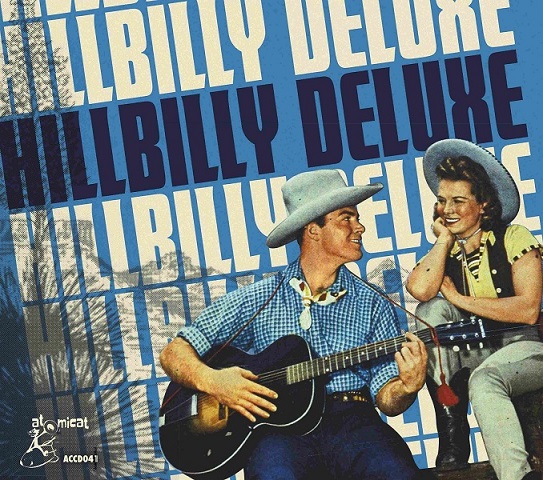 |
HILLBILLY
DELUXE
Hillbilly Deluxe is de titel van het Dwight Yoakam album uit 1987
dat volgde op zijn grote doorbraak Guitars Cadillacs Etc Etc, maar
daar heeft deze CD totaal niets mee te maken. Dit is gewoon een verzamelaar
met buitengewone hillbilly boogie en countrybop, 26 tracks die niet
hadden misstaan op Atomicat's Hillbilly And Rustic Rockabilly Bop
reeks en in 2017-2018 verschenen op 4 Star Boogies & Jumpin' Hillbilly
en de twee volumes Hillbilly Goes Electric op Richard Weize Archives,
net als Atomicat een onderafdeling van moederconcern Rhythm Bomb,
thans allemaal gegroepeerd onder de noemer Rockstar Records. Het feit
dat die twee Hillbilly Goes Electric's toen enkel verschenen op vinyl
rechtvaardigt evenwel deze heruitgave, en een aantal van de nummers
hier leerden wij sowieso voor het eerst kennen eind jaren '80 begin
jaren '90 op White Label's Boppin' Hillbilly LP reeks. De CD klinkt
zoals de cassettes die wij in het pré-digitale tijdperk voor
elkaar opnamen en uitwisselden en bevat als pintje bij paaltje komt
veel meer dan enkel hillbilly. Het hele scala recht van onder de koe
vandaan stijlen van pakweg eind jaren '40 tot midden jaren '50 komt
immers aan bod, met veel boogies (Jack Rowe & his Wichita Mountain
Boys' Bomb Bosh Boogie, Tiny Stokes & the Frontiersmen's Blackfoot
Boogie, Reese Shipley's originele uitvoering van de Tennessee Ernie
Ford hit Catfish Boogie) en semi-akoestische medium tempo boogie woogies
(Johnny Daume & his Ozark Ridge Runners' Boogie Woogie Blonde)
over semi-akoestische fox chases (Bill Tutt's Sixty Days) tot howdy
neighbor Dave & Deke materiaal uit de tijd toen dat nog modern
was (Wally Fowler & his Georgia Clodhoppers' Mountain Boogie),
dat alles uiteraard handelend over de belangrijke dingen des levens
zoals daar zijn vissen (Claudie Ham's Fisherman's Blues), te snel
rijden met de duivel op je hielen (Kelly West & his Friendly Country
Boys' moralistische Drive Slow Baby) en bingo (Tommy Mooney with Bobby
Mooney & his Automobile Babies' Bingo Boogie). Krasse countryknarren
die zich tegoed deden aan zwarte rhythm 'n' blues hielpen en passant
zonder het te beseffen mee de rockabilly uitvinden, vraag maar aan
Tommy Scott & his Ramblers met Dance With Her Henry uit 1955 (ook
zijn Jumpin' From Six To Six staat hier op, de zang is twee keer van
Tex Harper). Ja, dit soort muziek droeg zeker zijn steentje bij aan
de basis van de rockabilly, en als bewijsstukken legt Hillbilly Deluxe
een Crawdad Hole uit 1947 door Jack Grant & his 7-V-4 Ranch Boys
op tafel, samen met Jimmy Short & the Silver Saddle Ranch Boys'
Everybody's Trying To Be My Baby uit 1950... zes jaar vóór
Carl Perkins! Naast Tommy Scott zijn de enige andere bekende namen
Bob Wills' jongste broer Billy Jack Wills met een variatie op de Chew
Tobacco Rag getiteld Tobacco Chewing Boogie, Eddie Noack als zanger
bij RD Hendon & his Western Jamboree Cowboys in de Hank Snow cover
Music Making Mama From Memphis, en gitarist Joe Maphis in het gezongen
Lonesome Train Boogie met een opvallender rol voor de piano dan voor
de gitaar, en een tweede keer met een prominentere gitaar als zanger
op Sunshine Sue & her Rangers' Barn Dance Boogie. Art Gunn &
the Arizona Playboys' Sugar Cane Boogie gaat over de cajuns in de
bayous, en Pal Thibodeaux' Port Arthur Boogie is gezongen in een soort
onverstaanbaar Frans koeterwaals. Associeert u dit alles met ouderwets
en overdekt met kobbewebben? Nou, dankzij de mastering door de mij
onbekende The Studio That Time Forgot in El Paso, Texas die al meer
werkten voor Rhythm Bomb knettert en knalt dit als vuurwerk op oudjaar.
Alle 26 goed, tenzij u de builenpest krijgt van accordeon trio’s,
krassende violen en zelfs jazzy trompetten en klarinetten, met pedal
steels als glijmiddel.
Hillbilly Deluxe is the title of Dwight Yoakam's 1987 follow up album to his big breakthrough Guitars Cadillacs Etc Etc, but this CD has absolutely nothing to do with that. This is simply a compilation with extraordinary hillbilly boogie and country bop, totalling 26 tracks that wouldn't be out of place on Atomicat's Hillbilly And Rustic Rockabilly Bop series and appeared in 2017-2018 on the Richard Weize Archives releases 4 Star Boogies & Jumpin' Hillbilly and the two volumes of Hillbilly Goes Electric. Like Atomicat RWA is a subdivision of parent company Rhythm Bomb which has now grouped all its labels under the name Rockstar Records. The fact that those two Hillbilly Goes Electric's only appeared on vinyl justifies this re-release, and some of the songs here we first became aware of in the late eighties and early nineties on White Label's Boppin' Hillbilly LP series anyway. The CD resembles the cassettes we taped for each other and exchanged in that pre-digital era and contains much more than just hillbilly. The whole range of down on the farm styles from roughly the end of the forties to the middle of the fifties is covered with a lot of boogies (Jack Rowe & his Wichita Mountain Boys' Bomb Bosh Boogie, Tiny Stokes & the Frontiersmen's Blackfoot Boogie, Reese Shipley's original version of the Tennessee Ernie Ford hit Catfish Boogie) and semi-acoustic medium tempo boogie woogies (Johnny Daume & his Ozark Ridge Runners' Boogie Woogie Blonde) over semi-acoustic fox chases (Bill Tutt's Sixty Days) to howdy neighbor Dave & Deke material from back in the days when that was still modern (Wally Fowler & his Georgia Clodhoppers' Mountain Boogie), all of this of course dealing with the important things in life like fishing (Claudie Ham's Fisherman's Blues), driving too fast with the devil on your heels (Kelly West & his Friendly Country Boys' moralistic Drive Slow Baby) and bingo (Tommy Mooney with Bobby Mooney & his Automobile Babies' Bingo Boogie). Cool country cats who dug black rhythm 'n' blues helped invent rockabilly without even realizing it, just ask Tommy Scott & his Ramblers with Dance With Her Henry from 1955 (his Jumpin' From Six To Six 6 is also present, the vocals in both cases provided by Tex Harper). Yep, this type of music certainly contributed to the foundations of rockabilly, as evidenced by a 1947 Crawdad Hole courtesy of Jack Grant & his 7-V-4 Ranch Boys and Jimmy Short & the Silver Saddle Ranch Boys' Everybody's Trying To Be My Baby from 1950... six years before Carl Perkins! Apart from Tommy Scott the only other famous names are Bob Wills' youngest brother Billy Jack Wills with a Chew Tobacco Rag variation titled Tobacco Chewing Boogie, Eddie Noack as singer with RD Hendon & his Western Jamboree Cowboys on the Hank Snow cover Music Making Mama From Memphis, and guitarist Joe Maphis in the vocal Lonesome Train Boogie with a bigger role for the piano than for the guitar, and with a more prominent guitar as the featured singer on Sunshine Sue & her Rangers' Barn Dance Boogie. Art Gunn & the Arizona Playboys' Sugar Cane Boogie is about the cajuns in the bayous, and Pal Thibodeaux' Port Arthur Boogie is sung in some kind of uncomprehensible French patois. You associate all of this with old-fashioned and covered with cobwebs? Thanks to the mastering by the completeley unknown to me The Studio That Time Forgot in El Paso, Texas who also upgraded the sound on other recent Rhythm Bomb CDs these tracks explode like fireworks on New Year's Eve. All 26 tracks are good unless you get the bubonic plague from accordion trios, scratchy violins and even jazzy trumpets and clarinets, with pedal steels as lubrificant. Info: www.atomi-c.at (Frantic Franky) |
7 januari 2021
![]()
|
|
GUITAR
TOWN/ PEKKA TIILIKAINEN & BEATMAKERS
Scandinavian countries have a long tradition
when it comes to instrumental guitar rock. Most famous are of course
The Spotnicks, and from Finland we remember sixties band The Sounds
who scored a national hit with Emma/ Mandschurian Beat in 1963. In
Finnish guitar rock is called rautalanka (wire), in Danish it's called
pigtrad (barbed wire). Those wires on the guitar do indeed give us
electric shocks, because in the sixties they managed to hit the right
string. That still goes nowadays: traditions are to be kept high,
and in Finland this task is done by Pekka Tiilikainen & the Beatmakers,
a band that already exists since 1988, the last days of the rock 'n'
roll revival, a striking name because apart from the rhythm guitar
guitars do not provide the beat but shape the melody line, and it's
the melody which, with a certain twang or tremelo, made and still
makes guitar rock part of the rock 'n' roll genre, even though rhythmically
it's not always pure rock 'n' roll. This instrumental album is the
latest in an impressively long series of at least 20 albums and compilations
to which the band who also perform vocally and played in Holland in
2017 at the 63rd Cliff & the Shadows Fan Meeting (gig available
on their Live in Holland CD) cooperated at home and abroad. Of the
original 1988 line-up only Jori Venemies (bass guitar) and Juha Heinonen
(lead guitar) remain. Pekka Tiilikainen (rhythm guitar) joined the
band in 1998 and Mikko Lund (drums) is the youngest member of the
band since 2009, as you can check on their Finnish wikipedia page
- contrary to popular belief we do not know everything. The CD is
in the line of the well known Dixie Aces who for several years produced
these type of albums on the assembly line. The thing with guitar rock
these days is that it sometimes sounds poppy, occasionally it's jazzy,
and at other times it's purely rocking. This album is very varied
in sound and the band obviously knows what they're doing. The mid
paced opener Golden Days is a nod to the band that kickstarted the
whole rautalanka craze in Europe, The Shadows. 1963 is a lot spicier,
a cheerful uplifting tune with the Fender stratocaster melodically
taking center stage. Out of the Vox amps pops Do The Woddle, in the
tradition of the land of a 1000 dances as the USA profiled itself
in 1961-1965. These dances crossed over to Europe, with especially
the hully gully, the slop, the madison and of course the twist becoming
very popular. Do The Woddle rocks nicely and is a real foot tapper.
I Love You Anyway has an obvious poppy undertone. From a band from
the extreme cold up north you expect heartwarming music with southern
sounds like El Baile De La Cobra, a quiet dreamy song with elements
from The Shadows' Apache. The decent mid paced rocker Musta Ruusu
(black rose) is very reminiscent of Hollands' Jumping Jewels. Song
For Wendy on the other hand is a pure pop song, not bad at all but
a matter of taste, as stratocaster aficionados will enjoy themselves
with this one. The cool sixties twist The Road To Bodie is a pure
Jumping Jewels clone, although the band probably never heard of them.
Popcorn is the well known Hot Butter instrumental from 1972, the days
when I was a little kid and sat in front of the Dutch TV watching
a series that always started with an ambulance with flashing lights
driving through the streets, accompanied by the Popcorn tune. The
Finns now made a great sixties Fender version of it. Guitar Town is
another twist, while Elena is again a pop-style tribute to a presumably
lovely young lady, but without a petticoat. The last track is called
Archipelago. Archipels are normally to be found in warm places, and
this slow rocker exudes exactly that atmosphere. Noblesse oblige:
all in all, this is quite a good album, as you may expect from scene
veterans. |
|
|
ROCKIN'
MOVIE SOUNDTRACKS Ik
heb reeds vaak de verzuchting geslaakt waarom er geen soundtracks
bestaan van die vele rock 'n' roll films uit de jaren '50 zoals -
om gelijk de beste van die films te noemen - The Girl Can't Help It
(1956). Het zal wel met rechten te maken hebben, want in The Girl
Can't Help It zaten zoveel songs van verschillende platenmaatschappijen
dat dat nu allemaal hopeloos ingewikkeld zal zijn, al zijn er wel
degelijk een paar van die soundtracks. De Rock Rock Rock (1956) LP
is een beroemd voorbeeld, en recente uitgaves waren de Bear Family
(BAF11023) 10 inch van Don't Knock The Rock (1956) en Jasmine Records'
recente James Burton CD Cannonball Rag (JASCD1086) die (bijna) alle
songs uit de film Carnival Rock (1957) bevatte, maar het is dus echt
wel zoeken geblazen. Hoogstens krijg je zo'n filmversie eens een keertje
als bonus op een CD van een bepaalde artiest: zo dook Ruth Brown's
live uitvoering van Mama He Treats Your Daughter Mean uit de film
Rock 'n' Roll Revue (1955) pas nog op op haar gelijknamige Bear Family
Juke Box Pearls CD (BCD17542). Ik zal wel niet de enige zijn die er
zo over denkt en Jasmine komt ons tegemoet, niet met complete soundtracks,
maar met een dubbel-CD met 58 songs uit rock 'n' roll en aanverwante
films, en het opvallende hierbij is dat de CD niet zozeer de studioversies
van de in de films gebruikte songs bevat (die vaak verschilden van
de filmversies) maar voornamelijk opnames rechtstreeks uit de beschikbare
DVDs geknipt, dus mét bijvoorbeeld de typerende aankondigingen
door Alan Freed, soms met applaus op 't einde, soms met filmdialoog
in het midden van de songs of met in de handen klappen op de maat
van de muziek. Dat is voor de liefhebbers uiteraard best charmant,
maar het betekent ook dat de geluidskwaliteit soms wat minder dynamisch.
De meesten onder ons zullen een deel van de studionummers hier trouwens
ongetwijfeld toch al hebben, zoals bijvoorbeeld de geniale Bill Haley
instrumental Goofin' Around. Toch is er iets vreemds aan de hand:
Eddie Cochran's Twenty Flight Rock hier, duidelijk afkomstig uit The
Girl Can't Help It, bevat wel degelijk de gitaarsolo die in de film
ontbreekt. Op YouTube staan er clipjes waarbij die solo er middels
clevere editing opnieuw werd ingelast... Deze CD is met andere woorden
een speeltje "zoek de zeven verschillen"!
I've
often wondered how come there are so few soundtrack albums available
for the many 1950s rock 'n' roll movies like - just to name the most
famous of them all - The Girl Can't Help It (1956). Guess it has to
do with the licensing rights, as The Girl Can't Help It contains so
many songs from different record labels that it will be hopelessly
complicated to sort out now, although there exist at least a few soundtracks.
The Rock Rock Rock (1956) LP is well known, a recent one was Bear
Family's (BAF11023) vinyl 10 inch of Don't Knock The Rock (1956),
and Jasmine's recent James Burton CD Cannonball Rag (JASCD1086) contained
(almost) all the songs from the movie Carnival Rock (1957). Still,
it's like searching for needles in a haystack. You're already lucky
to find one of those movie tunes as a bonus on a compilation: Ruth
Brown's live version of Mama He Treats Your Daughter Mean from the
movie Rock 'n' Roll Revue (1955) recently turned up on her eponymous
Bear Family Juke Box Pearls CD (BCD17542). I'm sure I'm not the only
one who digs rock 'n' roll movies and Jasmine spoils us, not with
complete soundtracks, but with a double CD containing 58 songs culled
from rock 'n' roll and related films, and what's nice is that the
CD does not so much contain the studio versions of the songs used
in the films (which often differed from the film versions) but mainly
recordings cut straight from the available DVDs, which means for example
including Alan Freed's typical announcements, sometimes with applause
at the end, sometimes with film dialogue in the middle of the songs
or with hands clapping along to the beat. This is quite fun if you
like it, but it also means that the sound quality is sometimes a bit
less dynamic. Most of us will have at least some of the studio versions
of these songs anyway, like for example the genius Bill Haley instrumental
Goofin' Around. Still there is something strange: Eddie Cochran's
Twenty Flight Rock , clearly straight out of The Girl Can't Help It,
does contain the guitar solo that was cut from the movie. On YouTube
there are clips where that solo has been added again through clever
editing... In other words, this CD is a kind of "spot the seven
differences"! |
|
|
CHERRIES
ON THE LOSE VOLUME 2
Volume 2 van 3 in een reeks met 3 x 28 originele uitvoeringen van
songs die bekender zijn geworden in andermans' versies, of hoe je
een hit kan scoren door te gaan lopen met de pluimen van een ander.
De originele uitvoerder werd daarbij vaak vergeten, over het hoofd
gezien, of viel - zo gaat dat in de gehaaide muziekbusiness - financieel
uit de boot, tenzij hij het geluk had het liedje in kwestie ook zelf
te hebben geschreven én zijn zaakjes goed op orde had. De CD
biedt een mooi evenwicht tussen bekende en minder bekende originele
uitvoeringen: Chan Romero's Hippy Hippy Shake, Bobby Charles' See
You Later Alligator en Smiley Lewis' One Night en I Hear You Knocking
kent eenieder, dat Kansas City niet van Wilbert Harrison maar van
Little Willie Littlefield is is minder geweten. Even zwart en even
gezellig is Feel So Fine van Shirley & Lee waar Johnny Preston
Feel So Good van maakte, maar wist u dat I‘m Gonna Knock On
Your Door niet van Eddie Hodges is maar reeds in 1959 werd opgenomen
door de later welbekende Isley Brothers? En dat Twist And Shout dan
weer niet van The Isley Brothers was maar van de op en top soul klinkende
Top Notes een jaartje eerder in 1961 en die zo te horen ook inspiratie
vonden bij La Bamba en andere Trini Lopez klanken? Ja, zo leert een
mens nog eens wat. Er is trage country (Hank Locklin's Send Me The
Pillow You Dream On) en honky tonk piano country (Slim Willet's Dont
Let The Stars Get In Your Eyes), maar Cherries On The Lose gaat stilistisch
nog veel breder door ook crooners (Vaughn Monroe's Mr. Sandman) en
plechtige vocal harmony folk (The Weavers' Kisses Sweeter Than Wine,
Sealed With A Kiss niet van Brian Hyland maar van The Four Voices)
te incorporeren. En meer dan één wenkbrauw zal gefronst
worden bij het aanhoren van I Call Your Name van Billy J. Kramer &
the Dakotas uit 1963 dat pure (rustige) beat muziek is, al vermoed
ik dat vooruitstrevende Britse DJ’s het wel eens zouden kunnen
gebruiken als stroll. U kent dat niet? Als pure rock 'n' roller strekt
u dat tot eer, want het is een Lennon/ McCartney compositie die The
Beatles pas zelf opnamen ná Billy J. Kramer & the Dakotas.
Uit de in een vergeten hoekje aangetroffen oude doos waar eerst een
dikke laag stof diende afgeblazen vond samensteller Mark Armstrong
tenslotte de prehistorische akoestische countryblues oerversies van
Corrine Corrina (Bo Carter & Charlie McCoy in 1928) en Walk Right
In (Cannon's Jug Stompers in 1929).
Volume
2 out of 3 in a series featuring 3 x 28 original versions of songs
that became more famous sung by others artists, or how to score a
hit with someone else's blood and sweat. In doing so the original
performer was often forgotten, overlooked or - that's the way it goes
in the music business -cheated out of money, unless he was lucky enough
to have written the song himself and smart enough to have his affairs
in order. The CD offers a nice balance between well known and lesser
known original performances: everybody knows Chan Romero's Hippy Hippy
Shake, Bobby Charles' See You Later Alligator and Smiley Lewis' One
Night and I Hear You Knocking, but not necessarily that Kansas City
is not from Wilbert Harrison but from Little Willie Littlefield. Feel
So Fine by Shirley & Lee, redone by Johnny Preston as Feel So
Good, is just as black and cozy as these, but did you know that I'm
Gonna Knock On Your Door is not from Eddie Hodges but had already
been recorded in 1959 by The Isley Brothers before they hit the big
time? And that Twist And Shout is not from The Isley Brothers but
from The Top Notes a year before in 1961 with a high soul factor while
at the same time sounding like it was inspired by La Bamba and other
Trini Lopez sounds? You learn something new every day. There's slow
country (Hank Locklin's Send Me The Pillow You Dream On) and honky
tonk piano country (Slim Willet's Dont Let The Stars Get In Your Eyes),
but Cherries On The Lose goes stylistically much broader by incorporating
crooners (Vaughn Monroe's Mr. Sandman) and solemn vocal harmony folk
(The Weavers' Kisses Sweeter Than Wine, Sealed With A Kiss not by
Brian Hyland but by The Four Voices). More than one eyebrow will be
raised when hearing 1963's I Call Your Name by Billy J. Kramer &
the Dakotas which is pure (quiet) beat music, although I suspect progressive
British rock 'n' roll DJs might use it as a stroll. You don't know
that song? As a pure rock 'n' roller that does you credit, because
it's a Lennon/Mccartney composition which The Beatles only recorded
after Billy J. Kramer & the Dakotas. From an old box covered with
a thick layer of dust found in a forgotten corner compiler Mark Armstrong
dug up the prehistoric acoustic country blues versions of Corrine
Corrina (Bo Carter & Charlie McCoy in 1928) and Walk Right In
(Cannon's Jug Stompers in 1929). |
![]()

